

RESEARCH REPORT 2024
CPUT DEVELOPS GROUNDBREAKING
3D MEASURING MACHINE TO BOOST
LOCAL INDUSTRY

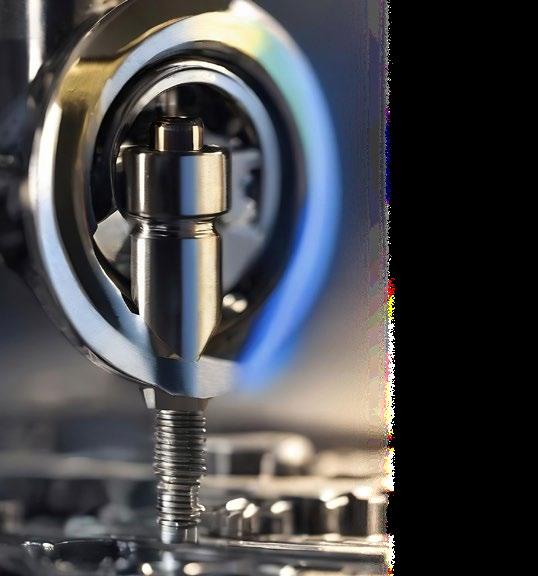





Precision, Locally Engineered: South Africa’s Coordinate Measuring Machine for Industry 4.0
As the manufacturing industry advances, it demands ever greater accuracy, speed, and cost efficiency – especially in quality control. In response, CPUT has developed a pioneering, locally designed 3D Coordinate Measuring Machine (CMM). Engineered with a single sensor and based on Abbe’s principle of measurement, this innovative system offers highly precise inspection for industrial components, helping to drive forward a smarter, more competitive manufacturing sector.
Coordinate Measuring Machines play a critical role in modern industry. They measure the geometry of objects – such as lengths, diameters, and angles – to verify that components meet design specifications. Unlike traditional inspection tools like micrometres or height gauges, CMMs deliver much higher accuracy and speed. However, until now, South African manufacturers have had to rely on expensive imported systems that are not only costly but also difficult to maintain or repair. The lack of a local alternative has created a major gap in the market – one that CPUT is now closing.
Using a probing arm and a displacement sensor, the new CPUT CMM captures key points on an object’s surface to perform fast, reliable inspections. While traditional 3D systems typically require three sensors, CPUT’s version achieves full 3D metrology using just one. This simplifies the design, reduces costs, and makes the machine easier to build and maintain – without compromising on performance.
Its design is anchored in Abbe’s principle, which ensures that measurements are made along the same axis as displacement, reducing potential errors and enhancing precision.
The result is a high-performance CMM that rivals imported systems – at a significantly lower cost. Because it is entirely locally manufactured, the machine avoids the usual pitfalls of international procurement such as long wait times, high shipping fees, or unavailable servicing. For smallto medium-sized South African manufacturers, this means better access to world-class metrology tools with reliable, local support.
Industries where precision is critical – like aerospace, automotive, tooling, and high-end manufacturing – stand to gain the most. In these sectors, even the smallest deviation from design can lead to failures or serious safety concerns. Having a dependable, locally supported CMM helps prevent such issues, while also strengthening local supply chains by enabling in-country inspection capacity.
By providing affordable, high-precision measurement technology, the CPUT 3D CMM empowers smaller manufacturers to meet the growing quality standards of advanced industries. It’s a step forward not just for manufacturing, but for innovation and economic resilience in South Africa.
In short, the CPUT 3D CMM is more than a machine – it’s a strategic enabler for industrial growth. By making cutting-edge metrology technology accessible at home, CPUT is helping to build a stronger, more competitive future for South African manufacturing.
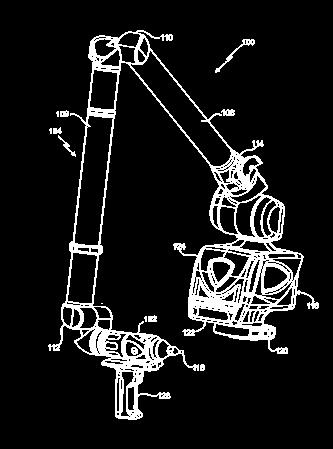
FOREWORD BY THE VICE-CHANCELLOR
PROF CHRIS NHLAPO
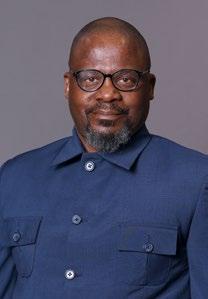
As Vice-Chancellor of the Cape Peninsula University of Technology (CPUT), it is with immense pride and anticipation that I present this annual institutional Research Report. This document is more than just a compilation of statistics and project summaries – it is a testament to our unwavering commitment to becoming a leading university of technology (UoT) on the African continent, an institution renowned for its innovation, impact and entrepreneurial spirit – a ‘0ne Smart CPUT’ that rivals the best technical universities globally, such as the Massachusetts Institute of Technology (MIT).
At CPUT, we firmly believe that research is not merely an academic exercise but a powerful engine for economic growth, for addressing societal challenges, and for empowering our communities. As we transform into the continent’s leading UoT and move towards becoming the MIT of Africa, these values must sit at the heart of the work of all our researchers, academics, postdoctoral fellows and postgraduate students.
This year’s Research Report showcases the diverse range of research endeavours undertaken by our talented faculty, students and research partners. From cuttingedge explorations in Science, technology, engineering and mathematics (STEM) fields to innovative solutions
for pressing socio-economic issues, our researchers are making a tangible difference to the lives of individuals and communities across our region and beyond.
As CPUT continues on its path to becoming a premier UoT, we will continue to prioritise several key areas of strategic focus:
• We aim to instil an entrepreneurial mindset in our students and researchers, encouraging creative thinking, opportunity recognition and the translation of knowledge into innovative products, services and solutions.
• We are committed to supporting research that is directly applicable to real-world problems and capable of creating clear economic and social benefits.
• We aim for our research to have a visible impact on our communities, our region and the world – engaging stakeholders, translating findings into practice, and actively sharing knowledge with the public.
• CPUT plays a vital role in addressing the specific challenges and opportunities of our local communities and regions. Through a deep understanding of their needs and a steadfast commitment to relevant, sustainable solutions, we demonstrate – to those within and beyond our institution – that we are a university dedicated to advancing others through our work.
VC hosts local principals and community leaders
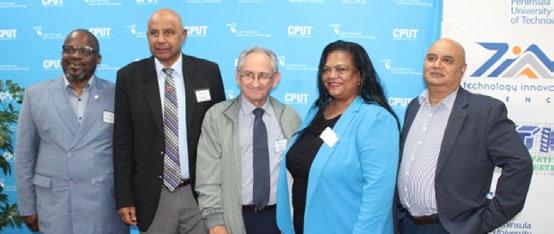
Many of CPUT’s top students come from significant feeder schools, particularly in the Western and Eastern Cape, that produce strong students who easily adapt to the academic demands of the institution. Therefore, the Office of the VC hosted a breakfast engagement in June with high school principals and community leaders from the feeder schools. The event took place at the Bellville Campus. This annual event is one of VC Prof Chris Nhlapo’s initiatives designed to strengthen relationships with stakeholders and facilitate dialogues to identify areas for support and collaboration.
The Western Cape Education Department Council, high school principals, and community leaders attended the event. It was a resounding success, bringing together a diverse group of stakeholders, and the discussions were lively, fostering meaningful connections for mutual benefit. In her opening address, Prof Driekie Hay-Swemmer, Executive Director: Office of the VC, expressed enthusiasm, “I am so excited to see that community, university, the Chair and Deputy Chair of the Western Cape Education Department are here, because we also want to share our story and our passion, particularly in making a difference in our surrounding schools. And more importantly, specifically, in terms of STEAM [science, technology, engineering, arts and mathematics].”
In his keynote address, Prof Nhlapo stated that there is a looming teacher crisis, particularly concerning teachers in mathematics and science. “We want to produce engineers… so the dream is to make sure that we can actually have a STEAM institute and help all the students in this region of the country. We have had a number of interventions across the peninsula and outside the province.”
The guests were taken on a tour of CPUT’s Clothing and Textile Technology laboratories as well as the Food Technology Station.
If our research is not experienced to have a social impact, then CPUT needs to rethink its mandate. Our work should enable people to live better lives, pursue more fulfilling careers, enjoy longer life expectancy, and experience improved living conditions. Our contributions in the following areas are instrumental to our success:
• STEM Education: Building skills to catalyse new thinking
• Bio Health: Advancing well-being and innovation for healthier lives
• Food Security: Ending hunger and ensuring access to nutritious food
• Environmental Issues: Contributing to a sustainable future for all South Africa’s children
• Satellite Technology: Reaching new worlds and inspiring new dreams
• Economic Inequalities: Creating equal rights and opportunities for all
As you review this Annual Research Report, I encourage you to consider the profound impact that research has on our university, our communities and our world. This is the essence of One Smart CPUT and the foundation of our collective vision, fostering a culture of innovation, collaboration and social responsibility.
I have every confidence that we can empower our students and researchers to become agents of change, making a lasting contribution to the advancement of our society.
Prof Chris Nhlapo with guests from WCED and community leaders
VOORWOORD DEUR DIE VISIEKANSELIER
PROF CHRIS NHLAPO

As Visekanselier van die Kaapse Skiereiland Universiteit van Tegnologie (KSUT), is dit met geweldige trots en afwagting dat ek hierdie jaarlikse institusionele navorsingsverslag aan u voorlê. Hierdie dokument is meer as net ‘n samestelling van statistieke en projekopsommings – dit is ‘n bewys van ons onwrikbare toewyding om ‘n toonaangewende universiteit van tegnologie op die Afrika-vasteland te word, ‘n instelling bekend vir sy innovasie, impak en entrepreneuriese gees, ‘n “slim universiteit” wat meeding met die beste tegniese universiteite wêreldwyd, soos die Massachusetts Institute of Technology (MIT).
By KSUT glo ons vas dat navorsing nie bloot ‘n akademiese oefening is nie, maar ‘n kragtige dryfveer vir ekonomiese groei, vir die aanspreek van maatskaplike uitdagings en vir die bemagtiging van ons gemeenskappe. Soos ons transformeer tot die vasteland se toonaangewende universiteit vir tegnolgie en vorder op die pad om die MIT van Afrika te word, moet hierdie waardes die kern vorm van die werk van al ons navorsers, akademici, postdoktorale genote en nagraadse studente.
Vanjaar se navorsingsverslag stel die wye verskeidenheid navorsing wat deur ons talentvolle personeel, studente en navorsingsvennote onderneem word ten toon. Van baanbrekende verkennings in velde soos wetenskap, tegnologie, ingenieurswese en wiskunde tot innoverende oplossings vir dringende sosio-ekonomiese kwessies, maak ons navorsers ‘n tasbare verskil in die lewens van individue en gemeenskappe regoor ons streek en ook verder.
Soos wat KSUT voortgaan op die pad om ‘n vooraanstaande universiteit vir tegnologie te word, sal ons voortgaan om verskeie sleutelgebiede van strategiese fokus te prioritiseer:
• Ons doel is om ‘n entrepreneuriese ingesteldheid by ons studente en navorsers te kweek, en om kreatiewe denke, die raaksien van geleenthede en die omskepping van kennis in innoverende produkte, dienste en oplossings aan te moedig.
• Ons is daartoe verbind om navorsing te ondersteun wat direk van toepassing is op werklike probleme en in staat is om duidelike ekonomiese en sosiale voordele te skep.
• Ons doel is dat ons navorsing ‘n sigbare impak op ons gemeenskappe, ons streek en die wêreld moet hê – deur belanghebbendes te betrek, deur navorsingsbevindinge in praktyk te omskep en kennis aktief met die publiek te deel.
• KSUT speel ‘n belangrike rol in die aanspreek van die spesifieke uitdagings en geleenthede van ons plaaslike gemeenskappe en streke. Deur ‘n diepgaande begrip van hul behoeftes en ‘n standvastige verbintenis tot relevante, volhoubare oplossings, demonstreer ons – aan diegene binne en buite ons instelling – dat ons ‘n universiteit is wat toegewy is aan die bevordering van ander deur ons werk.
Indien ons navorsing nie ervaar word as dat dit ‘n sosiale impak het nie, moet KSUT sy mandaat heroorweeg. Ons werk moet mense in staat stel om beter lewens te lei, meer vervullende loopbane na te streef, ‘n langer lewensverwagting te geniet en
CPUT honours first VC’s Excellence Award winners
The winners of the inaugural VC’s Excellence Awards were announced during a ceremony at the Bellville Campus in December, recognising exceptional student leaders and dedicated administrative staff. Explaining the background to the awards, Prof Driekie HaySwemmer, Executive Director in the Office of the VC, said the initiative aimed to ignite a spark that encourages even greater efforts. She continued, “Recognition serves as a reminder that hard work does not go unnoticed and that every step towards excellence is worth celebrating.”
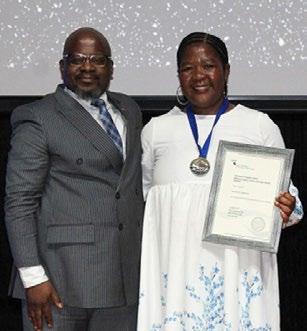
VC Prof Chris Nhlapo described it as an incredible honour and privilege to be part of the event, noting that it had been “long in the making”. He commended the CPUT community for having diligent staff and students who consistently exceed their job descriptions and go beyond the proverbial extra mile. “As the VC and principal of this majestic institution, the MIT of Africa, I want all of us to embrace excellence,” he said.
Staff category winners
1st place – Ms Nomalizo Mapasa 2nd place – Mr David Haarhoff 3rd place – Mr Isaac Paul 4th place – Mr Selema Molopa and Mr Tumiso Mfisa
Student category winners
1st place – Ms Bulela Limba: Chair of the Student Christian Organisation, leading a team that hosts spiritual and community events for over 100 members. She is also the Western Cape Provincial Chair of Make a Mark Africa, directing volunteer teams and coordinating youth empowerment programmes for underprivileged communities, and is a member of the Golden Key International Honour Society.
2nd place – Mr Athenkosi Sobada: Member of the Golden Key Honour Society CPUT chapter, and teaching assistant at CPUT, providing academic support and pastoral care to students. He also serves on the Bellville Campus first aid responders team.
3rd place – Mr Rorisang Makgana: Founder of campus-based tutoring classes attended by many students, creator of a YouTube channel to make his tutoring accessible to a wider audience, and Golden Key member.
The ceremony also saw the presentation of the VC’s Excellence in Quality Awards. Dr Siyanda Makaula, Director: Quality Management Directorate, said, “You can’t define excellence without taking into consideration quality. You can’t define quality without taking into consideration excellence.”
verbeterde lewensomstandighede te ervaar. Ons bydraes op die volgende gebiede is instrumenteel tot ons sukses:
• Wetenskap-, Tegnologie-, Ingenieurs- en Wiskundeonderwys:
Bou vaardighede om nuwe denke te stimuleer
• Biogesondheid:
Bevordering van welstand en innovasie vir gesonder lewens
• Voedselsekerheid:
Beëindig honger en verseker toegang tot voedsame voedsel
• Omgewingskwessies:
Dra by tot ‘n volhoubare toekoms vir alle Suid-Afrikaanse kinders
• Satelliettegnologie:
Bereik nuwe wêrelde en inspireer nuwe drome
• Ekonomiese Ongelykhede:
Skep gelyke regte en geleenthede vir almal
Terwyl u deur hierdie jaarlikse navorsingsverslag lees, moedig ek u aan om na te dink oor die diepgaande impak wat navorsing op ons universiteit, ons gemeenskappe en die wêreld rondom ons het. Dit vorm die kern van ons bedrywighede by KSUT en die grondslag van ons visie, wat ‘n kultuur van innovasie, samewerking en sosiale verantwoordelikheid bevorder.
Ek is vol vertroue dat ons ons studente en navorsers kan bemagtig om agente van verandering te word en ‘n blywende bydrae tot die vooruitgang van ons samelewing te lewer.
Prof Chris Nhlapo with Ms Nomalizo Mapasa
AMAGQABANTSHINTSHI NGUSEKELATSHANSELA
NJING CHRIS NHLAPO
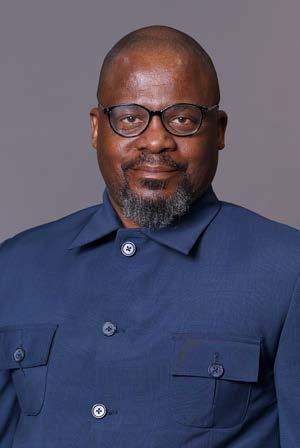
NjengoSekela-Tshansela weYunivesithi yezobuChwepheshe kaSingasiqithi weKapa (iCPUT), ndiziva ndineqhayiya nokuzingca okukhulu ukunikezela le Ngxelo yoPhando yeziko yonyaka. Olu xwebhu aluphelelanga nje ekubeni lubalomanani nezishwankathelo zeeprojekthi – koko lububungqina lokuzinikela kwethu okungenamida ekubeni yiyunivesithi ekhokelayo kwezobuchwepheshe kwizwekazi leAfrika, iyunivesithi ehlonitshwe ngenxa yokubungangamsha bayo ekusunguleni izinto ezintsha, igalelo layo eluntwini kwanenkuthazo yayo ekuziyileleni kwabantu izinto ezinokubaphuhlisa – “iCPUT enokuHlakanipha” ekhuphisana noongqaphambili beeyunivesithi zobuchwepheshe kwihlabathi ngokubanzi, nezifana neMassachusetts Institute of Technology (iMIT).
ECPUT sikholelwa kwelokuba uphando aluphelelanga nje ekubeni ngumsebenzi wezemfundo, koko lukwasisixhobo esinamandla ekukhuliseni uqoqosho, esidakanca izisombululo kwimingeni yentlalo, kwaneso sixhobisa uluntu ngokubanzi. Nanjengoko ke sitshintshela ekubeni yiyunivesithi yezobuchwepheshe ekhokelayo kwizwekazi, sisiya ekubeni yiMIT yaseAfrika, zonke ezi nqubo kumele zibe zezona zingundoqo koko kwenziwa ngabo bonke abaphandi bethu, abahlohli bethu, oogxa bethu abasele bethweswe izidanga zobugqirhalwazi kuquka nabafundi bethu abenza izidanga ezikwinqanaba labo sele bezithwesiwe izidanga zabo zokuqala.
Ingxelo yoPhando yalo nyaka ibonakalisa imisebenzi eyahlukeneyo eyenziwe ngabaphandi bethu abanezakhono ezihle, abafundi bethu kwanamaqabane ethu esisebenzisana nawo kuphando.
Ukusukela kuphononongo olugqwesileyo olukhokelayo kwimimandla yobuNzululwazi, ubuchwepheshe, ubunjineli nezibalo (imfundo iSTEM ngamafutshane kwisiNgesi) ukuya kwizisombululo ezibonakalisa utshintsho kwiimeko ezinzima zentlalo noqoqosho, abaphandi bethu benza umahluko obonakalayo noncomekayo kubomi babantu nakwiindawo zoluntu ukusukela kwingingqi esikuyo ukuya nakwezinye.
Ngeli thuba iCPUT iqhubekeka ngokuziphuhlisa ekubeni yeyona Yunivesithi yezobuChwepheshe ingungqaphambili, siza kuqhubekeka ngokugxininisa kweyona mimandla iliqela engundoqo neyile:
• Sijolise ekubeni sibethelele ezingqondweni zabafundi nabaphandi bethu izakhono zokuziyilela izinto, sibakhuthaze ekucingeni ngokuphangaleleyo, ekuqapheleni amathuba amahle, baze bakwazi ukusebenzisa ulwazi abaluzuzileyo ekuyileni nasekuveliseni izinto, ekusunguleni iinkonzo eluntwini nasekusunguleni izisombululo kwiintsindabadala zobomi ngokubanzi.
• Sizimisele ekuxhaseni uphando olujolise ngqo ekusombululeni iingxaki ezibonakalayo kwilizwe elisingqongileyo, kwanolo lukwaziyo ukuza nenzuzo kwezoqoqosho nasentlalweni.
• Iinjongo zethu zisekubeni uphando lwethu lube negalelo elibonakalayo kuluntu lwethu, kwingingqi esikuyo nakwilizwe ngokubanzi – lubandakanye abaxhasi bethu, luze luguqulele iziphumo zophando ezifunyenweyo zibe zezo zinokusetyenziswa, luze lukwazi nokwabelana ngolwazi olufunyenweyo noluntu lonke.
• ICPUT idlala indima ephambili ekusombululeni imingeni ethile nasekunikezeleni ngamathuba amahle kuluntu lwethu nakwiingqingqi ezikufuphi kuthi. Oku sikwenza siziqonda kakuhle izinto ezidingwa luluntu wethu, sikwazinikele ekuvezeni ezona zisombululo zifanelekileyo nezizinzileyo, sibe sibonakalisa kwakolu luntu lweziko lwethu nolo lungaphandle kwalo – ukuba siyiyunivesithi ezimiseleyo ekukhuthazeni wonke ubani sigxile kwimisebenzi yeziko lethu esiyenzayo.
Ukuba uphando lwethu lubonwa njengolo lungenagalelo lihle entlalweni, oku kuthetha ukuba iCPUT kufuneka iyicingisise imigomo yayo. Imisebenzi yethu kufuneka ibangele abantu ukuba baphile ubomi obungcono, bafunzele kumakhono emisebenzi anelisayo, bonwabele ubomi obude, baze babe namava okuphila ubomi obuphuhlisiweyo nobungcono. Igalelo lethu kule mimandla ilandelayo ibalulekile kwimpumelelo esijolise kuyo:
• Imfundo yeSTEM:
Ukwakha izakhono ezikhuthaza indlela entsha yokucinga
• Impilo yabantu:
Ukuphuhlisa impilo engcono nokutshintshela kubomi obusempilweni
• Ukuba nokutya okwaneleyo nokusempilweni:
Ukuphelisa indlala nokuqinisekisa ukuba kuyafumaneka ukutya okunesondlo
• Imiba yokusiNgqongileyo:
Ukuba negalelo kwikamva elizinzileyo labo bonke abantwana boMzantsi Afrika
• UbuChwepheshe beSathelayithi:
Ukufikelela kumazwe amatsha nokukhuthaza amaphupha amatsha
• Ukungalingani kwezoQoqosho:
Ukuqinisekisa ukuba bonke abantu banamalungelo alinganayo kwaye bazuza amathuba alinganayo
Ngeli xesha uphonononga le Ngxelo yoPhando yoNyaka, ndiyakukhuthaza ukuba uqaphele nefuthe elikhethekileyo lophando kwiyunivesithi yethu, kuluntu lwethu, nakwilizwe lethu. Oku kuyingxam yeCPUT Enye enokuHlakanipha (iOne Smart CPUT) kwaye kukwasisiseko sombono wethu ohlangeneyo, ukuzinziswa komoya wokuyilwa kwezinto ngokutsha, intsebenziswano kwanokuthatha uxanduva entlalweni.
Ndiqiniseke ngokungathandabuzekiyo ukuba singabaphuhlisa abafundi nabaphandi bethu ukuze babe ngoovulindlela botshintsho, benze negalelo eliya kuhlala lihleli neligxile ekuphuculweni kwentlalo.
IN THE NEWS
VC’s Prestigious Achievers celebrated
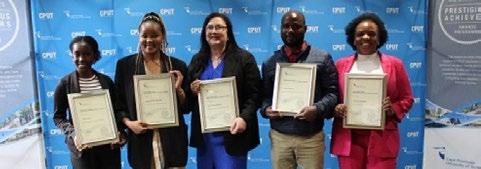
Five exceptional postgraduate students have received the VC’s Prestigious Achievers Awards for 2024, in recognition of their academic excellence and embodiment of CPUT’s graduate attributes. This year saw a record 38 applications from students across the continent. The recipients were honoured at a ceremony on the Bellville Campus in November, where each presented their research topics.
• Ms Nomnqophiso Zantanta (Doctor of Horticulture) – ‘The feasibility of soilless cultivation of selected indigenous legumes for small-scale livestock farming in the Eastern Cape, South Africa’
• Mr Kudzai Mugejo (Doctor of Engineering in Civil Engineering) – ‘Infrastructure performance and water governance for climate change adaptation in smallholder farms in the Western Cape, South Africa’
• Ms Rentia van Heerden (Doctor of Business and Management Sciences) – ‘Influences of occupational health and safety for flexible work in the public health sector’
• Mr Sivuyise Mbedla (Master of Food Science) –‘Properties of gluten-free bread from Bambara groundnut, sorghum, cassava, and cocoyam flour’
• Ms Phakama Ngwane (Master of Business Management in Hospitality) – ‘The effect of sustainable practices on hotel performance in Cape Town’
Prof Joseph Kioko, Chair of the Awards Committee, said it was a privilege to lead the process and noted that all recipients were cum laude graduates who truly reflect CPUT’s values. Since the programme’s inception, 26 awards have been granted to 11 graduates.. “I implore all recipients to contribute, in your own way, to the success of others,” he urged.
VC Prof Chris Nhlapo encouraged the awardees to “transform your daily grind into daily joy”, striving for continuous improvement and allowing their values to define their identity. He also expressed gratitude to the Mauerberger Foundation Fund and its Chairperson, Adv Dianna Yach, for their continued support of the programme.
Proud recipients of the VC’s Prestigious Achievers Awards
Graduate pledges to uphold values of VC’s Medal
Mr Joshua Overmeyer, recipient of the VC’s Medal, graduated with an Advanced Diploma in Nature Conservation during the April Autumn Graduation. He described the award as an honour that carries with it a responsibility to continue striving for excellence while upholding the values it represents.
Mr Overmeyer completed the Diploma in 2021 with distinctions in all 25 subjects, graduating summa cum laude. He then earned distinctions in all nine subjects of the Advanced Diploma, again graduating summa cum laude, with an overall average of 85.3%. He is currently enrolled for a Postgraduate Diploma in Conservation Science under the supervision of Prof Frans Radloff, who described him as humble and diligent. “His success stems from a sharp mind and a strong work ethic.”
Initially studying towards an LLB, Mr Overmeyer changed paths after rediscovering his passion for nature. He found the Nature Conservation course at CPUT aligned with his goals due to its strong practical approach. He completed his work-integrated learning at Karoo Ridge Conservancy.
Reflecting on his time at CPUT, he noted it was a transformative period that shaped his environmental commitment. He credited his academic success to the unwavering support of his family and lecturers. “My family’s encouragement and sacrifices were the bedrock of my journey.”
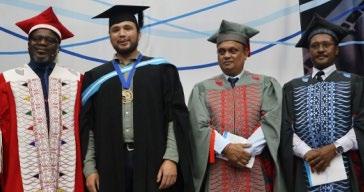
Graduate shines with VC’s award
A deep-rooted family foundation of unity, resilience, and shared experience has shaped the personal and academic journey of Dr Melody Mukandi, recipient of the VC’s Prestigious Achievers Award. She graduated with a DEng in Chemical Engineering in April. The Zimbabwean-born graduate reflected, “Every family harbours a unique essence that propels its members through life’s demands. For me, it was a maternal figure – having lost her mother at a young age, my mother took it upon herself to support us unconditionally. That gave me an intrinsic drive, free from external validation.”
Dr Mukandi began her journey at CPUT with a Diploma in Biotechnology in 2011, graduating in 2014. She went on to complete a BTech in Biomedical Technology and a Master of Engineering in Chemical Engineering – both with distinction. Her doctoral research produced several publications in top-tier scientific journals.
She attributes her progress to resilience and support from supervisors Prof Karabo Ntwampe and Prof Mushe Basitere, along with her family and friends. “My mother remains my greatest inspiration, always prioritising my well-being.”
Dr Mukandi was one of the first Mwalimu Nyerere African Union Scholarship recipients at CPUT. Receiving the VC’s Prestigious Achievers Award was a significant highlight. “It provided critical financial relief at a difficult time. I’m deeply grateful to the VC and his team,” she said.
VC Appointed as Chair of USAf
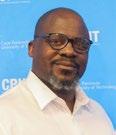
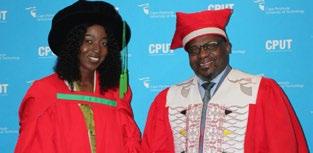
She also acknowledged the guidance and technical assistance of CPUT staff, particularly Mrs Hannelene Small, Mr Alwyn Bester, and the Biotechnology team. “The Bioresource Engineering Research Group became a home and an environment that nurtured high-level research.”
Dr Mukandi expressed hope that future initiatives would help integrate award recipients into the workforce, enhancing the university’s social impact. She also recommended greater support for students pursuing theses-bypublication to raise the institution’s research profile.
VC Prof Chris Nhlapo reached another significant milestone in December when he was appointed Chair of the Finance and Investment Committee of Universities South Africa (USAf). In this key leadership role, he is now responsible for guiding the organisation’s financial stability and investment strategy. USAf is the umbrella body representing the country’s 26 public universities and plays a vital role in advocating for the higher education sector to national and international stakeholders.
Prof Nhlapo also serves as Chair of the Technological Higher Education Network South Africa (THENSA), a collective of all technology-focused universities in the country. As VC of one of South Africa’s largest universities, he is well-versed in managing the financial responsibilities of a major institution and ensuring compliance with regulatory requirements. Under his firm and strategic leadership, CPUT has consistently achieved unqualified audits and earned a strong reputation for financial prudence.
Expressing his gratitude for the appointment, Prof Nhlapo said he would work to ensure that USAf maintains and strengthens its financial position while advancing the interests of all 26 member universities.
Dr Melody Mukandi with Prof Chris Nhlapo
Prof Chris Nhlapo
Prof Chris Nhlapo, Mr Joshua Overmeyer, Prof Rishidaw Balkaran and Prof Joseph Kioko
MESSAGE FROM THE DEPUTY VICE-CHANCELLOR: RESEARCH, TECHNOLOGY INNOVATION & PARTNERSHIPS (DVC: RTIP)
PROF MARSHALL SHELDON
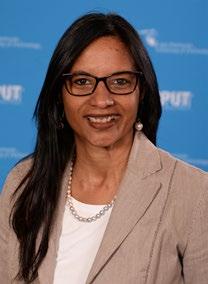
As the Deputy Vice-Chancellor: Research, Technology Innovation & Partnerships, I am delighted to present the CPUT Research Report for 2024. This report reflects the remarkable progress we have made in advancing our Vision 2030 and the RTIP Blueprint 3.0. It celebrates a year of significant progress and groundbreaking achievements – a testament to the collective vision, dedication, and ingenuity of our academic community.
The past year has been defined by resilience, innovation, and impact. Despite challenges and constraints, the CPUT community has once again demonstrated its unwavering commitment to producing research that is not only of a global standard but also deeply relevant to our society. Our contribution to research and innovation excellence has been reinforced by the expanding cohort of NRF-rated researchers and our Research Chairs, along with the improved number of academic staff who obtained their doctoral qualifications and increased funding.
Our research output continued its upward trajectory, with 348.87 DHET units submitted in 2024, reflecting a steady increase in journal articles, books, and conference proceedings. The Faculty of Engineering & the Built Environment led with over 100 units, and the Faculty of Applied Sciences increased their output per capita to 0.65, demonstrating the continued strength of our applied research. In the Faculty of Health & Wellness Sciences, the SAMRC Cardiometabolic Research Unit was upgraded to a full extramural unit. These achievements underpin our commitment to knowledge creation that is relevant, responsive, and transformative.
We made significant strides in supporting nearly 1 200 master’s and doctoral enrolments, with over R2.7 million in bursaries to financially needy postgraduate students. The Centre for Postgraduate Studies delivered 58 training workshops that reached over 2 400 participants.
Our Technology Transfer Office achieved a historic milestone with the full assignment of the FlowViz IP Portfolio to an international partner – a blueprint for translating academic innovation into commercial global impact. We were also proud to have launched the Institutional Industry Advisory Forum, a vital platform for dialogue that strengthens the synergy between our academic programmes and the demands of the job market. This commitment to partnerships and economic activation is further reflected in the work of our Technology Transfer Office, which continues to drive innovation and commercialisation, and advance our third-stream income strategy.
CPUT has made significant strides in harnessing technology for societal impact. From the development of our locally engineered 3D Coordinate Measuring Machine, empowering small-to-medium manufacturers, to the establishment of the new Centre for Intelligent Systems & Emerging Technologies, we are at the forefront of the digital revolution. Our commitment to sustainability is underscored by the high-value Department of Science, Technology, and Innovation–Japan International Cooperation Agency (DSI–JICA) SATREPS Project on carbon recycling, a R60 million initiative offering innovative solutions for a decarbonised society. In addition, the Centre for Water and Sanitation Research secured a new R7 million grant to establish a Community of Practice in Water Governance, further affirming our leadership in addressing one of South Africa’s most critical national priorities.
Our strategic focus on building transformative partnerships has yielded remarkable results. Locally, collaborations with industry leaders ensure that our research directly addresses real-world challenges and prepares our graduates as global citizens.
Internationalisation remains a key driver of our strategic agenda. The Directorate for Strategic Initiatives & Partnerships concluded multiple global partnerships, expanded African collaborations, and facilitated staff and student mobility programmes. Our strong relationships with universities in BRICS countries such as China; in the North with France, Germany, the Netherlands, and Belgium; our participation in the DAAD; and our involvement in networks such as SANORD and SASUF, have expanded our global footprint and enriched our academic programmes. We were especially honoured to host the 8th International U6+ Conference, which reaffirmed our leadership role among African universities and reinforced our commitment to African-led engagements.
CPUT’s 2024 Research Festival, themed ‘Relevant, responsive and focused research and innovation for societal impact’, showcased the breadth of our research and innovation excellence and the critical role of multi-, inter-, and transdisciplinary collaboration. This event, which included the Research Excellence Awards, celebrated the outstanding contributions of our academics, postgraduate students, and quintuple partnerships.
This report is a tribute to the inspiring work of our academic staff and researchers, the diligence of our students, and the invaluable support of our partners. I extend my sincerest appreciation to the staff in the RTIP portfolio, whose tireless work provides essential support towards these successes and achievements.
As we reflect on these achievements, we remain committed to nurturing the next generation of researchers, innovators, and future professors as we continue to drive CPUT’s transformation journey towards becoming Africa’s leading university of technology.
Our strategic focus on building transformative partnerships has yielded remarkable results. Locally, collaborations with industry leaders ensure that our research directly addresses realworld challenges and prepares our graduates as global citizens.
MESSAGE FROM THE DIRECTOR: DIRECTORATE RESEARCH DEVELOPMENT
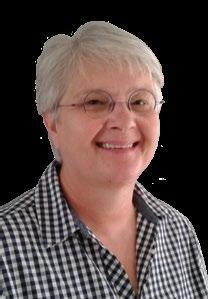
It is with immense pride that I reflect on the wealth of research and innovation showcased in this year’s Research Report. This document is a powerful demonstration of the CPUT community’s dedication to discovery and excellence, and it stands as a testament to what can be achieved when a vibrant research culture is effectively supported.
Our directorate is committed to providing the infrastructure and support systems that enable our researchers and academics to thrive. This year, we have seen the results of these efforts in the impressive research outputs, the numerous accolades received, and the significant progress made across all faculties. The Research and Innovation Fund for Teaching and Learning (RIFTAL) continues to enable staff-led scholarly projects, while the success of our Article Writing Accelerator Programme has directly enhanced research output and supported our scholars in publishing in accredited journals. These initiatives underscore our focus on building researcher capacity from within and equipping our academics for continued success. A central focus for our team in 2024 has been the ongoing
advancement of research excellence and integrity. We have strengthened our systems and processes to meet both national and international standards. I am particularly proud that CPUT Libraries secured international CoreTrustSeal certification for our institutional data repository, eSango – a significant milestone that enhances the credibility and longterm preservation of our research data. These efforts ensure that the CPUT research environment remains robust and reliable, a strength reflected in the impressive results of the latest DHET Publications Audit.
Importantly, our work is not confined to the university itself. We are actively fostering innovation and community engagement – two areas that define a truly responsive university of technology. We are privileged to support research that delivers real-world solutions and contributes to societal well-being. A notable example is the DAAD-funded CESAR project, which in collaboration with international partners, applies social entrepreneurship to address critical challenges in our communities. Such partnerships, often enabled through
PROF DINA BURGER
our grants administration, illustrate the direct link between academic work and tangible community impact.
I want to extend my deepest gratitude to the entire CPUT research community – from our emerging scholars to our seasoned professors – for their commitment and passion. Your efforts are the driving force behind our institution’s progress. I would also like to thank the dedicated team within the Directorate Research Development for their hard work and unwavering support. Together, we are building a research environment that is collaborative, innovative and positioned for sustained success.
Staff member earns a PhD despite heartbreaking loss
Dr Clement Matasane’s journey to a PhD stands as a testament to extraordinary dedication and resilience in the face of profound personal tragedy. Alongside the social, mental, emotional, and psychological challenges of pursuing doctoral studies, he endured the loss of five siblings and navigated the disruptions of the Covid-19 pandemic. The weight of these circumstances led to a year-long study break. Yet, through unwavering commitment and determination, he prevailed –graduating with a PhD in Electrical Engineering in December.
A devoted husband and father to five daughters and one son, Dr Matasane fondly recalled his late father’s conviction that education is “a weapon for a black, disadvantaged, and rural child”. Reflecting on his journey, he said, “This path required immense dedication and perseverance, along with a strong support system. I’ve felt a deep sense of accomplishment and a renewed purpose.”
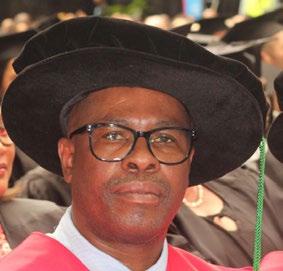
Offering advice to prospective PhD candidates, Dr Matasane encouraged them to “maintain a healthy work-life balance and believe in yourself”. He continued, “Embrace training opportunities and engage with others through workshops, symposiums, conferences, and research exchanges.”
Dr Matasane’s research focused on GIS Decision Support Systems for rural renewable energy deployment, providing clarity on resource distribution and potential electricity generation, and offering options for energy distribution. The findings are set to inform future projects and assist stakeholders in evaluating sustainable solutions.
Dr Matasane began his academic journey at Lerotholi Polytechnic, earning a Diploma in Electrical Engineering and Electronics. He attended Peninsula Technikon in 1994 for a National Diploma in Electrical Engineering, later obtaining a BTech (1998) and an MEng (2002). Since joining CPUT in 2017 as a Research Manager, he has presented at five international conferences, co-authored seven publications, and secured funding for the Wetland Assessment and Monitoring Platform for Transboundary River Basins in Southern Africa.
Dr Clement Matasane
MESSAGE FROM THE DIRECTOR: CENTRE FOR POSTGRADUATE STUDIES (CPGS)
PROF IZAK VAN ZYL

2024 marked another year of progress and growth for the Centre for Postgraduate Studies (CPGS). Two years into my appointment as Director, I continued implementing a comprehensive 5-year strategic plan, coined #OneSmartCPGS, in alignment with the institutional Vision 2030. This strategic blueprint expresses our commitment to nurturing a postgraduate cohort (master’s and doctoral students) that embodies the ethos of innovative research.
It is a critical pillar in the university’s aspiration to emerge as Africa’s leading smart university of technology (UoT). Embracing the principles of human-centricity and open innovation, the #OneSmartCPGS framework sets the stage for human-centric innovation within our postgraduate community.
At the core of this framework are three overarching objectives:
• To increase both the number and calibre of postgraduate students
• To raise the quality and volume of research, innovation, and creative outputs
• To enrich the overall postgraduate experience, including that of supervisors and academic staff
It is important to emphasise that these objectives are not standalone pursuits, but interconnected facets that shape and guide our activities. Throughout 2024, we maintained a clear focus on these goals while also responding to the evolving needs of our stakeholders.
One of our key achievements in 2024 was the ongoing optimisation and use of our student data management portal, Higher Degrees Committee (HDC) Digital. With just under 1 200 postgraduate enrolments in 2024, HDC Digital remains instrumental in effectively monitoring and tracking student progress across the university, enabling timely interventions and support.
We have also made preparations to migrate our postgraduate students to Converis – an integrated module within the broader Clarivate suite. In doing so, we have aligned with other UoTs in the administration of academic progress at the postgraduate level.
Master’s and doctoral enrolments across CPUT in 2024:
VC champions culture of academic excellence
Our staff also published several outputs during this period, and these are outlined in terms of DHET unit value below:
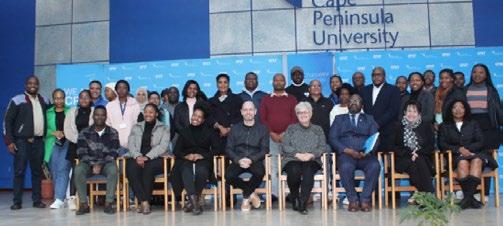
address key issues impacting postgraduate students (master’s and PhDs), researchers, and postdoctoral fellows. The session aimed to foster a strong culture of academic excellence and to produce graduates who are recognised for their expertise and contributions to their fields. Dr David Phaho, DVC: RTIP, remarked, “Our acclaimed Vision 2030 strategy places strong emphasis on engagement, focusing particularly on smart student engagement and enriching learning experiences.”
* unaudited at time of writing
Prof Van Zyl also successfully supervised a doctoral student, Dr Chinonye Leuna Obioha, who graduated with a PhD in Informatics in December 2024.
CPGS participated in several research initiatives this year, including an exchange visit to EHL Lausanne, Switzerland – one of the world’s leading hospitality business schools. In collaboration with Prof Alessandro Inversini (EHL) and Prof Anneli Douglas (UP), Prof Van Zyl is developing an exciting bilateral project on regenerative tourism and hospitality. Prof Inversini presented the project at the 2024 CPUT Research Festival, and we hope to secure official funding for it in 2025.
Dr Phaho noted that Focus Area 3 of the strategy clearly articulates CPUT’s strategic intent to foster “a Smart RTIP Agenda that is relevant and excellent in its knowledge production”. He stressed that creating an enabling environment for postgraduate students is critical, stating that without it, some of the strategic goals would remain unfulfilled. He added that all stakeholders had been informed of the goal to double the number of postgraduate students at master’s and doctoral levels by 2030, using the 2022 baseline as a starting point. Dr Phaho confirmed that CPGS, led by Prof Izak van Zyl, and DRD, under the leadership of Prof Dina Burger, are actively initiating programmes to support this goal,
Delivering the keynote address at the annual VC’s Postgraduate Engagement, Prof Nhlapo said, “Postgraduate students, I salute you all on this auspicious occasion.” He underlined the importance of the VC’s office in providing an open forum for dialogue on the future of the university and postgraduate education at CPUT. He also shared valuable insights into the challenges facing postgraduate education and highlighted the institution’s ongoing commitment to research excellence. Prof Nhlapo concluded the session by engaging directly with postgraduate students during a lively Q&A led by Prof van Zyl.
VC Prof Chris Nhlapo and his EM team hosted a strategic session in August to
Guests at the annual VC’s Postgraduate Engagement
Deans’ medal winners honoured at Autumn Graduation
Six exceptional students were awarded Dean’s Medals at the Autumn Graduation in April – one from each faculty:
• Ms Rebekah Maeder of FID achieved a Diploma in Architectural Technology (2021) with a total average of 81% and all distinctions, graduating summa cum laude. She participated in competitions such as CIFA Homeless and PG Bison 2023.
• Mr Thomas Pegg of FAS completed a Diploma in Horticulture (2023) with distinctions in all 27 subjects and an overall average of 88.2%. He is now pursuing an Advanced Diploma in Horticulture.
• Ms Sushmita Nowases of FEBE completed her NDip in Maritime Studies (2022) with an average of 88.9% and 28 distinctions out of 29 subjects.
• Ms Shanai Vos of the Faculty of Education earned a BEd in Foundation Phase with 35 distinctions from 35 subjects, finishing with an aggregate of 89.22% over four years and graduating summa cum laude.
• Ms Alida Gouws of FBMS returned to study at CPUT in 2021 after completing several qualifications at NWU and UNISA. She achieved 12 distinctions during her studies at CPUT.
• Ms Ameeroh Osman of FHWS completed a Diploma in Somatology (2023), earning 24 distinctions from 28 subjects. She is now pursuing an Advanced Diploma in Somatology and plans to specialise in Advanced Aesthetic Therapies.
CPUT is extremely proud of these graduates who exemplify academic excellence and are poised to make meaningful contributions in their respective fields.

As part of the Research Festival, we hosted the 2024 Annual Postgraduate Symposium from 29 October to 1 November. The Symposium was themed ‘Relevant, responsive and focused research and innovation for societal impact’. With industry representatives, researchers, the Cape Higher Education Consortium (CHEC), Sisonke, and Internationalisation exhibitions on display throughout the event, postgraduate students from all faculties and institutes showcased their research activities.
In line with our commitment to capacity building, CPGS continued to design and deliver a range of training interventions tailored to the needs of our postgraduate cohort. These initiatives included workshops covering topics such as research proposal development, research methodology, academic writing, and the use of data analysis software. Furthermore, our statistical consultation services –extended to staff and postgraduate students – significantly enhanced research quality and output across the university.
This year, the CPGS’s investment in postgraduate capacity development exceeded R1.38 million, funded by the University Capacity Development Grant (UCDG). These funds were allocated to essential services, including language editing, methodology consultations, and training workshops. We facilitated 58 training workshops, reaching over 2 400 participants. We also supported the editing of 75 master’s and doctoral theses. Through our methodology consultations initiative, we provided over 175 hours of support to 16 postgraduate students. In parallel, we successfully piloted the first 8-day Article Writing Accelerator Programme, which produced 15 draft manuscripts and resulted in five articles being accepted by DHET-accredited journals.
CPGS administered 61 internally funded bursaries, to the value of R2.71 million, to assist financially needy
postgraduate students in completing their studies. After receiving 280 applications and completing a rigorous evaluation process, 43 master’s and 18 doctoral students were awarded bursaries. We also administered 65 NRFfunded postgraduate bursaries for honours, master’s, and doctoral students, totalling R9.97 million.
As we reflect on the achievements and milestones of 2024, we remain committed to advancing the goals outlined in the #OneSmartCPGS strategic plan. We are well-positioned to build on this foundation, driving innovation and excellence in postgraduate education while contributing to the realisation of CPUT’s broader vision.
FUNDING
RESEARCH OUTPUT
MESSAGE FROM THE DIRECTOR: TECHNOLOGY TRANSFER & INDUSTRIAL LINKAGES
DR REVEL IYER
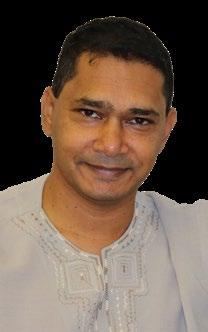
The Technology Transfer Office at CPUT plays a pivotal role in bridging the gap between academic research and industry application. Its primary mission is to facilitate, protect, and enhance the transfer of intellectual property (IP) from CPUT to the business sector, thereby promoting commercialisation that benefits both the university and the communities it serves. By supporting research units, centres, and faculties, the TTO encourages researchers to take their work beyond academic publication, fostering innovation through the commercialisation of technology. In addition, the TTO facilitates the establishment of research partnerships with the business sector – particularly where intellectual property is likely to be generated through licensing agreements – and supports the creation of business units and spin-off companies.
Deepening commercial impact through the assignment of FlowViz IP portfolio
One of the most significant developments in 2024 was the assignment of the FlowViz portfolio of technologies to Incipientus Ultrasound Flow Technologies AB, marking a
watershed moment in CPUT’s IP commercialisation efforts. FlowViz, a patented platform of non-invasive ultrasound flow measurement technologies, was co-developed by CPUT and RISE (Research Institutes of Sweden) over a decadelong collaboration. Initially licensed in 2017, the technology continued to mature through ongoing innovation and validation, positioning it for global deployment.
The assignment of this IP portfolio – an outcome of sustained support from the TTO – grants Incipientus full rights to scale the innovation and respond with agility to growing global demand in the process industries. This transition from academic IP to industry-owned technology exemplifies a successful public–private partnership in research commercialisation. It also serves as a blueprint for how South African research can be translated into high-impact international products.
This achievement highlights the strategic role of CPUT’s TTO in providing long-term support through patent management, deal structuring, and compliance with the IPR Act 51 of 2008, while ensuring alignment with national economic priorities.
Cultivating industry partnerships for societal innovation
In alignment with Vision 2030, CPUT has intensified its efforts to foster university–industry research collaboration as a cornerstone of innovation for societal benefit. Recognising that meaningful partnerships can accelerate the translation of knowledge into real-world solutions, the TTO has actively cultivated new relationships with key economic stakeholders, most notably the Department of Trade, Industry and Competition (DTIC).
This initiative forms part of a broader strategy to position the university as a dynamic contributor to South Africa’s innovation ecosystem, particularly by leveraging national mechanisms such as the Technology and Human Resources for Industry Programme (THRIP). The partnership seeks to align institutional research strengths with industry needs, promoting the co-development of solutions in priority sectors such as health, energy, agriprocessing, and digital innovation.
In 2024, the TTO and DTIC deepened their engagement through structured roundtable discussions and collaborative project scoping sessions involving researchers and industry partners. These efforts are aimed at building longterm, demand-led research programmes that can attract co-investment, enhance innovation uptake, and support industrial modernisation.
For more detail, see: TTO strengthens relationship with DTIC
Advancing economic activation through EDHE
The Economic Activation Office (EAO) at CPUT, housed within the Office of the VC and administratively supported by the TTO, is rapidly becoming a strategic vehicle for realising the university’s goal of producing both employable graduates and future employers. As part of the national Entrepreneurial Development in Higher Education (EDHE) initiative, the EAO connects students and staff with entrepreneurship-related opportunities, fostering a culture of innovation and economic participation.
Established in 2021 and further strengthened in 2024, the EAO operates as a strategic connector – identifying, amplifying, and channelling opportunities from government, industry, and development partners to relevant internal stakeholders. These include research groups, student development units, and centres for entrepreneurship across faculties.
During 2024, the EAO expanded its listening post capabilities and piloted internal mechanisms to surface scalable student ventures and social innovation ideas. These initiatives are integral to realising CPUT’s Vision 2030 focus areas, such as:
• Preparing students for the future
• Readiness for the world of work
• Relevant research and innovation focus areas
• Social, cultural, and economic growth
By embedding entrepreneurship into the institutional DNA and strengthening its integration with research commercialisation pathways, the EAO plays a vital role in shaping CPUT into a truly entrepreneurial university –one that delivers both economic and social value.
Looking ahead: The TTO vision and our role in national development
The TTO is committed to strategically embedding the intellectual property and commercialisation function across the entire research lifecycle – from idea conception to real-world impact. Our long-term vision is to ensure that CPUT’s innovations deliver measurable value for the ordinary South African by:
• Growing the economy (GDP)
• Creating new businesses and jobs
• Improving quality of life
• Contributing to national transformation
This vision, aligned with CPUT’s Vision 2030, is grounded in the belief that universities must go beyond knowledge creation to play a pivotal role in driving inclusive economic development and national competitiveness. Our approach is guided by five core pillars:
1. Driving research relevance and societal impact
By aligning research with national priorities and supporting the translation of outputs into practical innovations, we ensure both relevance and realworld impact
2. Strategic and sustainable IP management
We implement evidence-based IP strategies, tiered licensing models, and streamlined commercialisation pathways to maximise value and accessibility
3. Building financial sustainability through innovation
Through venture-building, spin-off development, and third-stream income generation, we position
the university as a catalyst for local economic growth
4. Scaling local innovation for global impact
Our commercialisation efforts are designed to balance local deployment with international scalability, leveraging global alumni networks and IP partnerships
5. Fostering an entrepreneurial and innovation culture
We are nurturing a pipeline of innovators by embedding IP literacy, innovation fellowships, and entrepreneurial thinking throughout the university
In essence, the TTO’s mission extends beyond the protection and commercialisation of intellectual property – it seeks to harness innovation as a transformative force within South African society. Through strategic partnerships, the creation of new avenues for economic participation, and alignment with CPUT’s Vision 2030, the TTO is helping to shape a more inclusive and innovative future – one breakthrough at a time.
TTO strengthens relationship with DTIC
DVC: RTIP, Dr David Phaho, has announced that university management is actively promoting the need for a Third-Stream Income Strategy across CPUT, in response to the ongoing decline in government funding for higher education through grants and subsidies. He explained that a key element of this strategy is fostering closer collaboration with industry.
Speaking at the Technology and Human Resources for Industry Programme (THRIP) Interactive Session on new and active projects, Dr Phaho highlighted the programme’s long history as a catalyst for uniting universities and industry to pursue relevant research, drive innovation, and enhance competitiveness, while also contributing to human development through the production of master’s and doctoral graduates. He added that THRIP encourages academics to undertake research and innovation that directly addresses industry needs. The event was also attended by representatives from the Department of Trade, Industry and Competition (DTIC), who provided a detailed overview of the THRIP programme, its objectives, and the KIPP programme for grassroots innovators.
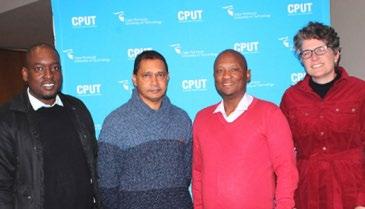
The industry engagement workshop organised by the TTO aimed to strengthen ties between CPUT and the DTIC, with a particular focus on THRIP. Senior Technology Transfer Officer, Ms Jayde Barends, said the primary objective was to showcase the benefits and opportunities the programme offers, including funding for collaborative research, access to advanced facilities and expertise, skills development and training, and the commercialisation of research outcomes. The workshop also provided insights into successful THRIP-funded projects, addressed challenges and non-fundable aspects, and outlined the application process. In collaboration with industry partners, CPUT presented four potential projects for THRIP funding, demonstrating the diversity of opportunities for partnership.
“The ultimate goal was to equip participants with a thorough understanding of the THRIP programme, encouraging more robust, high-quality, and relevant applications from industry partners seeking collaboration with universities such as CPUT,” Ms Barends explained. She added that the event was well received, achieving its aim of delivering a comprehensive overview of THRIP, with presentations and discussions clearly communicating its objectives and potential. The workshop, she concluded, successfully raised awareness of the programme’s benefits and is likely to inspire greater interest and participation in future funding calls.
Mr Dion Mphahlele (former DTIC), Dr Revel Iyer (CPUT TTO Director), Dr Zuko April (DTIC) and Mrs Helene Linki Nel (industry partner, CEO at Algaeholix)
MESSAGE FROM THE DIRECTOR: STRATEGIC INITIATIVES & PARTNERSHIPS
PROF DINA BURGER (ACTING DIRECTOR)

During 2024, significant strides were made to advance strategic initiatives and partnerships at CPUT. The Research Uptake and International Relations portfolios continued to engage in a range of activities aligned with Vision 2030 and the National Framework for Higher Education Internationalisation. Various initiatives were undertaken to promote capacity-building efforts with notable success and impact.
Likewise, the Internationalisation portfolio pursued several carefully selected partnerships with esteemed national and international universities. These collaborations are set to extend our impact both nationally and globally, enhancing our reputation as an engaged institution committed to sustainable, scalable, and mutually beneficial partnerships that support the academic project and elevate the standing of CPUT.
I wish to express my sincere gratitude to the staff of the Directorate: SIP, as well as to the faculties and research entities, for their dedication to supporting and expanding strategic initiatives and partnerships locally and internationally.
The report below offers an overview of the Research Uptake and International Relations portfolios in support of the academic project across CPUT’s faculties and
research areas. Ongoing training workshops, seminars, and stakeholder engagement sessions remain central to enhancing research uptake, utilisation, and impact. These efforts are aligned with the National Framework for Higher Education Internationalisation, particularly in promoting capacity-building initiatives.
The International Relations portfolio has continued to establish and deepen global partnerships, with a growing emphasis on African collaborations to support staff and student mobility. Particular attention was given to strengthening SADC diplomatic engagement, which was a strategic objective for 2024. Data on partnerships and mobility indicate growing momentum, which will further promote strategic collaboration.
The global footprint of CPUT has expanded through the Directorate’s active participation in numerous forums, including THENSA, AIEA, EAIE, NAFSA, IEASA, SARIMA, SDSN, Bellville Higher Education, and consortia such as SASUF, CHEC, and Mellon-funded decolonial initiatives.
Strategic research initiatives towards ‘Smart RTIP’
The Research Uptake portfolio supports the Directorate: SIP and collaborates with faculties, research institutes, centres,
and units to assist researchers. This includes coordinating national partnerships, capacity development, and research initiatives to strengthen CPUT’s research uptake in alignment with Vision 2030.
Research Incoko
Research Incoko is a platform for quarterly research engagements on a variety of researchrelated topics to develop CPUT’s research capacity from within and allow research-related issues to be addressed using a transdisciplinary approach. Three Research Incokos were hosted on 12 March, 28 May, and 26 September.
Science Communication
This is a platform for engagements and talks on various research-related topics that encourage research impact. Prof Jeanine Marnewick, Director: AMHBI and Research Chair: Biotechnology, presented on ‘Health benefits of our proudly South African herbal tea: Rooibos’.
University Capacity Development Grant: Project 5
The Directorate: SIP provides capacity development for researchers focusing on developing and facilitating activities and appropriate systems to promote and support research uptake. Three workshops were conducted – ‘Dissemination of findings’, ‘Science communication’, and ‘Social influence and societal impact of research’.
CPUT–FEDRATI Research Uptake Seminar
The Directorate: SIP, in collaboration with the Centre for Sustainable Oceans, hosted a Research Uptake Seminar under the theme ‘Enhancing Relevance and Research Impact’ in November. The purpose of the seminar was to:
• provide a platform for postgraduate students to showcase their research
• enhance research uptake from the onset and during the research cycle
• encourage emerging researchers to understand the value of research uptake and impact
Approximately 15 CPUT students who received bursaries from the Fisheries Economic Development Research Advisory and Training Institute (FEDRATI), under CPUT’s
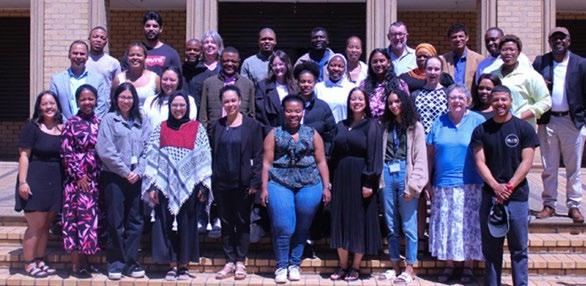
Centre for Sustainable Oceans, delivered presentations on their research. The presenters emphasised the alignment of their work with CPUT’s Research Focus Areas and the Sustainable Development Goals (SDGs), as well as the potential societal impact of their findings. Dr Mark Botha, Executive Director of FEDRATI, provided an overview of the institute’s background and future plans, and shared his impressions of the scope and quality of the student presentations. Also in attendance were Dr Nathalie Viljoen, Head of Research at the Two Oceans Aquarium Foundation, along with supervisors, and CPUT colleagues.
Smart Internationalisation
The International Relations portfolio supports the Directorate: RTIP-SIP in advancing CPUT’s comprehensive internationalisation initiatives. This involves developing strategic initiatives in the international arena across research, learning and teaching, and community engagement partnerships, in alignment with the national framework for internationalisation. Internationalisation remains a unifying theme that underpins all CPUT’s activities.
Delegates at the CPUT–FEDRATI Research Uptake Seminar
Partnership agreements concluded in 2024
The partnership strategy, alongside the guiding principles, provides a context for the data shared on national and international partnerships in the portfolios of International Relations and Research Uptake to strengthen CPUT’s global reputation and profile.
International partnerships
Africa
The University of Ngaoundéré Cameroon (FAS)
Ladoke Akintola University of Technology, Ogbomoso Oyo State, Nigeria (FAS)
World Fair Trade Organization Africa and Middle East Africa (FAS)
University of Luanda Angola (SIP)
University of Dar es Salaam Tanzania (FAS)
BRICS
Chongqing University China (SIP)
Vivekanand Education Society’s Business School India (FID)
Peter The Great St Petersburg Polytechnic University Russia (FEBE)
Chandigarh University India (Education)
Acordo De Cooperação
Específico Entre O Centro Federal De Educação
Tecnológica De Minas Gerais EA, Brazil Brazil (FID)
Lomonosov Moscow State University Russia (FBMS)
Lobachevksy State University Russia (FED)
Global North
University of Catania Italy (FAS)
University of Florence Italy (FAS)
Ecole Supérieure des Agricultures, ESA – Angers Campus France (FAS)
L’Institut Agro (IA) France (FAS)
Technische Hochschule Köln (TH Köln), Faculty of Cultural Sciences, Köln International School of Design (KISD) Germany (FID)
Western Norway University of Applied Sciences Norway (FHWS)
Erasmus Hogeschool School of Applied Sciences Brussels (FAS)
University of South Alabama USA (SIP)
Fashion Institute of Technology, State University of New York USA (FID)
Montana State University International Programs USA (FAS)
Karel De Grote University of Applied Sciences and Arts Belgium (SIP)
University of Exeter UK (FHWS)
University of Cuyo Argentina (FAS)
University of Bolonga Italy (FAS)
COPAFEU Project Kickoff Workshop and Fund Release EU (FAS)
Hochschule RheinMain
University of Applied Sciences. Germany (FID)
Osnabruck University of Applied Sciences Germany (FAS)
University of West Georgia USA (FED)
Erasmus+ Inter-Institutional Key Action 1
CPUT actively participates in European Union (EU)funded programmes in collaboration with partner countries across Europe. Engagement in these programmes enables CPUT staff and students to expand their global footprint and broaden their academic and cultural horizons. The university also welcomes incoming staff and students from international partners, enriching institutional diversity and fostering intercultural competence within the CPUT community.
National partnerships
Developing linkages within a quintuple helix environment is central to CPUT’s strategic partnerships. This involves building synergies and creating sustainable opportunities for staff and students to engage and collaborate with stakeholders from other higher education institutions, research institutes, industry, government, and civil society.
Agri SETA FAS
Centre for Proteomic and Genomic Research FAS
Centre for Water and Sanitation Research FEBE
College of Cape Town FEBE
Cooperative Agreement CoCT FID
Cornerstone Student Counselling
Council for Scientific and Industrial Research FEBE
Continuing Professional Development Accreditation/ NBC Agreement FID
Department of Science and Innovation FAS
Education, Training and Development Sector Education and Training Authority Human Capital
Higher Education Resource Services South Africa Human Capital
Higher Health University Direct Grant HIV/Aids Unit
Joint Supervision Agreement University of Venda FEBE
Liquid Telecomm Lit Funding Agreement FEBE
North-West University CCEWIL UNIVERSITY CPUT FACULTY/
Passenger Rail Agency of South Africa CCEWIL
Rheinmetall Denel Munition RF Limited FAS
Research, Technology Innovation and Partnerships -Strategic Initiatives and Partnerships Faculty of Education
Service Level Agreement BBBEEE Skills Scorecard Process Human Capital
The Fisheries Economic Development, Research, Advisory Training Institute FAS
The National Indigenous Knowledge Systems Office FAS
The South African Institute for Distance Education Fundani CHED
The South National Energy Development Institute FEBE
The Western Cape Government via its Education Department Faculty of Education
Tshwane University of Technology FAS
Two Oceans Aquarium Foundation FAS
University of KwaZulu-Natal FEBE
University of Limpopo FEBE
University of Pretoria FEBE
University of Zululand FEBE
CPUT deepens engagements with France CPUT explores Swiss partnership opportunities
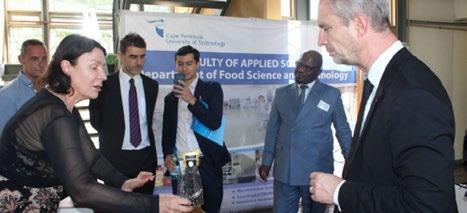
His Excellency Mr David Martinon, the new Ambassador of France to South Africa, Lesotho and Malawi, led a delegation on a visit to CPUT in February, where VC Prof Chris Nhlapo welcomed them. He was joined by Dr David Phaho, DVC: RTIP; Prof Judy Peter, Director: SIP; Prof Joseph Kioko, Dean: FAS; Prof Jessy van Wyk, Project Manager: DFST; Dr George Charimba, Acting HoD: Food Science and Technology; and Prof Suresh Ramsuroop, Dean: FEBE, among others.
The visitors included Mrs Sophie Bel, Consul General of France in Cape Town; Mr Aurelien Leynet, Attaché for Science and Technology; and Dr Paul Cavalier, Attaché for Cooperation and Cultural Programme. The aim was to outline current cooperation between CPUT and French partners, and meet the teams involved. Longstanding partnerships already exist in CPUT’s FEBE and DFST.
In his remarks, Prof Nhlapo emphasised the historic nature of the France–South Africa partnership, especially in institutional exchanges and capacity building. Mr Martinon said he wished to connect with the broader French community in South Africa. Prof Van Wyk gave an overview of her department’s work, followed by a tour of the Food Science laboratories and the Agri-Food Technology Station. The delegation also visited the F’SATI and F’SASEC laboratories, as well as the Product Lifecycle Management Competency Centre.
Reflecting on the visit, Dr Tasmeera Singh, Manager: International Relations, said the meeting had been highly successful. “We continue to welcome the French Ambassador’s visits to CPUT to strengthen our partnerships with France and deepen our engagement with the French Embassy and Consul General.”
In a step towards expanding international collaboration, CPUT engaged with Fernfachhochschule Schweiz (FFHS), a Swiss university of Applied Sciences based in Zürich in March. The meeting was attended by Prof Driekie Hay-Swemmer (Executive Director: Office of the VC), and members of the Directorate: SIP, including Dr Tasmeera Singh (Manager: International Relations). FFHS was represented by Ms Anja Bouron (Head: Corporate and International Relations & Career Services).
Dr Singh noted the alignment between FFHS’ focus areas – including virtual exchanges, collaborative online international learning (COIL), and intercultural competence – and CPUT’s internationalisation priorities. Prof Dina Burger (Director: DRD) welcomed the delegation, “We are very delighted that you chose to visit CPUT, and we are honoured to be joined by Prof Hay-Swemmer today.”
Discussions explored academic synergies such as distance education and high-impact research, particularly research relevant to society and business. Prof Hay-Swemmer highlighted that CPUT is ranked as the top UoT in Africa. A draft MoU was shared for further consideration. Also attending were Dr Nelisiwe Maleka (Manager: Research Uptake) and Mr Dingaan Booi (International Relations Officer).
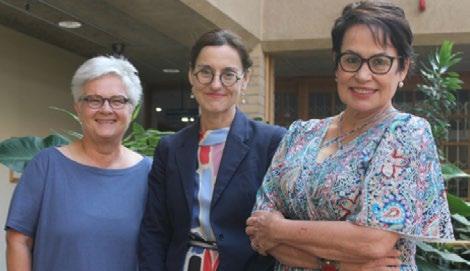
International delegation meeting between CPUT and the Ambassador of France, HE Martinon and team
Prof Dina Burger (DRD) Ms Anja Bouron (Fernfachhochschule Schweiz) and Prof Driekie Hay-Swemmer (Office of the DVC)
CPUT strengthens collaboration with German universities
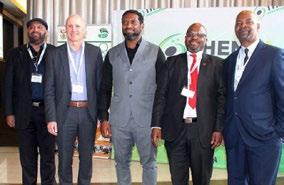
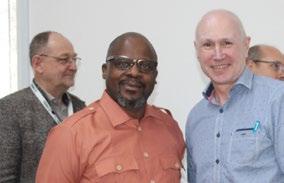
VC Prof Chris Nhlapo led a CPUT delegation in welcoming members of the German University Consortium for International Cooperations (DHIK) to Bellville Campus in March. DHIK, which represents 36 German institutions and one Swiss university of applied sciences, partners globally in double-degree and exchange programmes in applied engineering.
The visit formed part of a broader programme hosted by the Technological Higher Education Network South Africa (THENSA), which held a colloquium at the Cape Town Marriott Hotel Crystal Towers. The event focused on strengthening ties between South African institutions and DHIK. It explored areas for collaboration including student and staff exchanges, joint modules, research partnerships, capacity building, knowledge and technology transfer, and entrepreneurship.
In his address, Prof Nhlapo, who also serves as Chair of THENSA, commended CPUT’s progress under Vision 2030. “We are tapping collective strengths to create a smart university,” he said. Acknowledging cultural and geographic differences, he emphasised shared ambitions. “Our students are native digital citizens. They’re
entrepreneurial, politically aware, and tech-savvy.” He also highlighted THENSA’s MoU with DHIK, noting, “We are proud to collaborate on curriculum development, faculty exchange, student mobility, and joint funding applications.”
Deputy Minister of Higher Education, Science and Innovation, Honourable Buti Manamela, delivered the keynote address. “Opportunities for collaboration abound, and this colloquium will help us refine our efforts to enhance the work of THENSA–DHIK,” he said.
DHIK Chair Prof Dieter Leonhard (HTW Saar) expressed gratitude for the hospitality and confirmed the consortium’s eagerness to explore synergies with South African partners. Faculty representatives also shared insights about their departments before the delegation toured CPUT’s South African Renewable Energy Technology Centre (SARETEC).
Prof Nhlapo concluded by stressing the importance of cementing existing relationships and building new ones with German partners to advance innovation, exchange and joint research.
International students receive warm welcome at CPUT
CPUT’s Directorate: SIP hosted an orientation session for international students in February, which also marked the launch of the Association of International Students (AIS). The event provided valuable information to help students integrate and thrive during their time at the university. Representatives from Admissions and Registration presented on issues including the renewal of study permits. The Division of Student Affairs and the Centre for Diversity, Inclusivity and Social Change outlined their services, while students were introduced to the CPUT BRICS Student Commission. External stakeholders such as Standard Bank and Momentum Medical Scheme also took part, with Q&A sessions offering students the chance to raise concerns.
Dr Tasmeera Singh, Manager: International Relations, encouraged students to take full advantage of the opportunities ahead. Mr Thato Masonganye, International Relations Officer for the Central SRC, added, “We recognise the challenges of studying away from home, but you are not alone. CPUT is committed to supporting your academic, social and personal growth.”
The AIS launch included an address by Bellville Campus Executive member, Mr Mathias Shimwetheleni, who outlined the group’s mission to promote unity, peace and cultural tolerance. “We want to be ambassadors of our branches and the broader international community. Through our actions, we hope to build lasting relationships with both local and global institutions,” he said.
Dr Elma Maleka, Manager: Research Uptake at SIP, thanked internal and external partners for contributing to a successful event.
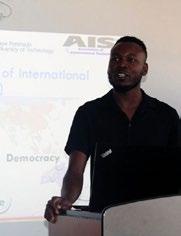
International delegation meeting between CPUT and DHIK, Germany
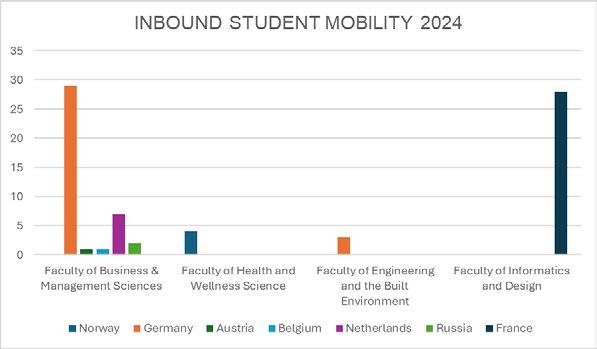
Faculty of Health and Wellness Sciences
Faculty of Engineering & the Built Environment
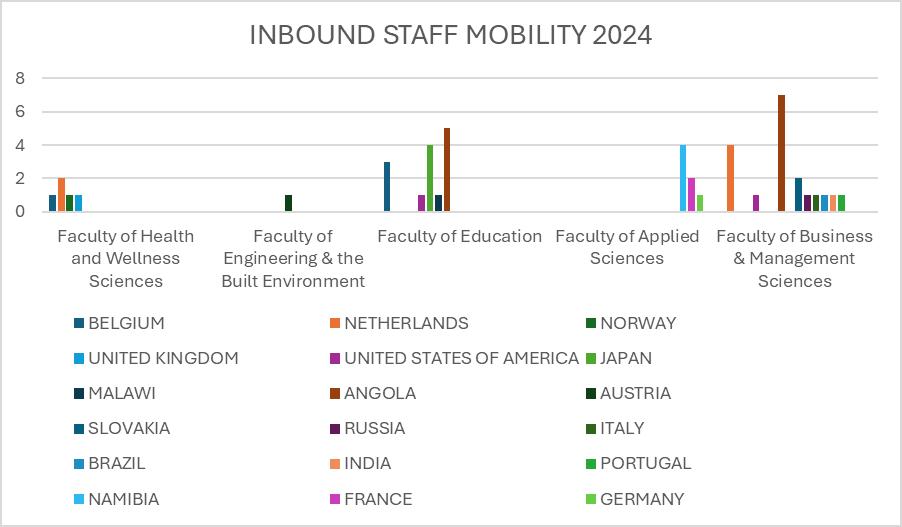
Faculty of Education Faculty of Engineering & the Built Environment
Faculty of Education
Faculty of Applied Sciences
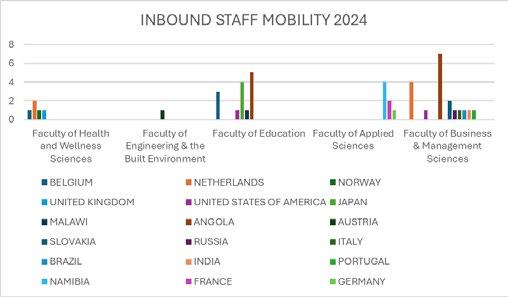

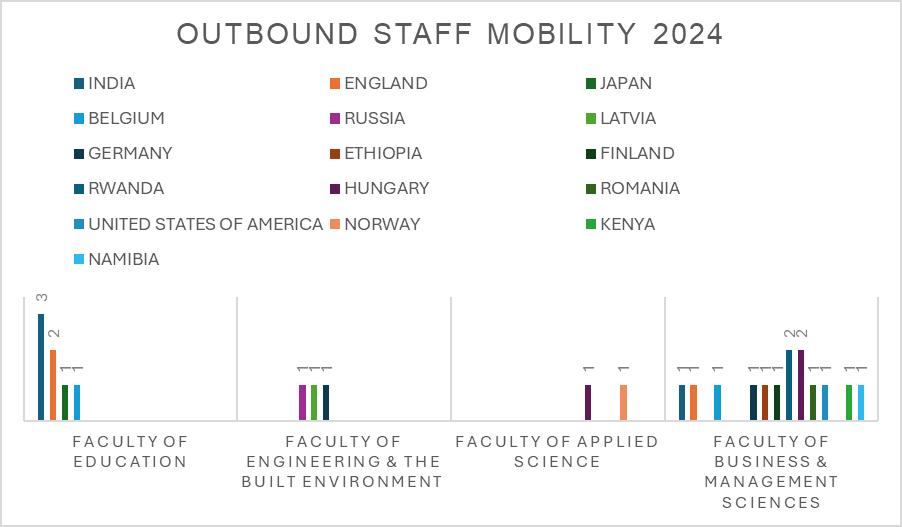
Faculty of Applied Sciences


Faculty of Business & Management Sciences
Faculty of Business & Management Sciences




National engagements – Workshops/seminars/conferences/roundtables
MONTH PRESENTERS/ATTENDEES
April Dr Nelisiwe Maleka
June Dr Devandre Boonzaaier of Education and Dr Maleka
July SIP, DRD, with FBMS, FEBE, FHWS, FID
September Dr Maleka
October Dr Maleka and Prof Rozenda Hendrickse, FBMS
October Dr Maleka
February and October
Prof Pallav Kumar, Ms Maphole Loke, FEBE
Dr Vuyokazi Mntuyedwa, Fundani
Dr Wendy Smidt, Dr Adedayo Theodorio, GITES
Dr Vusi Mshayisa, DFST
Dr Ncediwe Ndube-Tsolekile, Dept of Chemistry
In-person national delegation engagements
ENGAGEMENT TITLE
University–Industry Engagement for Innovation and Impact Forum
A Morning with the SDGs Seminar
Stakeholder engagement: Dept of Human Settlements and HEIs engagement
Southern African Research and Innovation Management Association Conference
Dept of Human Settlements with Sowetan: Research Strategy Launch
Societal Impact of Research Workshop Summit
Internationalisation at Home Forum
DESCRIPTION
A forum on innovative university–industry engagement, hosted by the SA Research and Innovation Management Association
A seminar on the role of HEIs in advancing the SDGs, hosted by Hugenote Kollege
A Department of Human Settlements event to bridge theory and practice in response to government priorities
Dr Maleka presented a paper on ‘Practices for disseminating research: Lessons from the literature’
CPUT participated in the launch, with Prof Hendrickse submitting proposed collaboration areas
Dr Maleka participated in the summit, which was hosted by the NRF and the Organisation for Advancing and Evaluating the Societal Impact of Science
A platform for staff and students returning from international conferences and exchange visits to share cross-cultural learning, global competencies, and insights relevant to CPUT’s RFAs, teaching, research collaboration, and funding opportunities
March An engagement between CPUT and NRF: iThemba Labs to explore areas of collaboration for MoU renewal
April Academic staff and postgraduate students from CPUT visited research facilities at NRF: iThemba Labs
June Bellville Higher Education Forum was hosted at CPUT
Dr Garth Van Gensen of MCD and Dr Maleka also participated in another forum in October
October An online engagement between CPUT and Durban Textile and Leather Incubator to explore possible collaborations
In-person international delegation visits
January Ambassador of France, His Excellency David Martinon and the team
February Ms Anja Bouron, Head of Corporate and International Relations & Career Services, Fernfachhochschule Schweiz, Zürich
March The Hague University of Applied Sciences Presidents of DHBW Ravensburg and DHBW Karlsruhe
Mr Christophe Gargot, Director: International Cooperation, Academic region of Provence Alpes Cote d’Azur (PACA), Mr Christophe Gargot, Director: International Cooperation, Academic region of PACA, and team
DHIK delegation, Germany
April University of Lubumbashi, DRC
May High Commission of Canada
Indiana State University
June Erasmus Brussels University, Belgium
July North Carolina Agricultural and Technical State University
August Tokyo Metropolitan University, Japan
October Rheinmain University of Applied Sciences, Germany
November The Hague University of Applied Sciences
Sanda University, China
Hainan University, China
CPUT forms partnership with American university

The Directorate: SIP hosted North Carolina Agricultural and Technical State University (NC A&T) at Bellville Campus in July. The CPUT delegation, led by Prof Dina Burger, Director: DRD and Acting Director: SIP, welcomed NC A&T’s delegation, which was led by Dr Melody Pierce, VC: Student Affairs, and Prof Tonya Smith-Jackson, Provost and Executive VC: Academic Affairs.
The primary objectives addressed were:
• Advancing engineering and general education
• Developing online programmes and study abroad
• Creating global experiential learning
• Enhancing student success and faculty growth
• Facilitating faculty and student exchanges at all levels
“The end goal was to establish a robust framework for collaboration that would leverage the strengths of both institutions to benefit students, faculty and the broader academic community”, said Mr Dingaan Booi, International Relations Officer: SIP. The event was highly successful and aligned perfectly with SIP objectives. “The level of engagement from both CPUT and NC A&T was exceptional, indicating a strong mutual interest in forging a long-term partnership,” he continued.
At the meeting, Prof Burger noted that the constructive conversations between delegates demonstrated a collaborative spirit, focusing on enhancing educational significance and developing innovation. Mr Booi highlighted in-depth discussions that identified key areas for collaboration, including WIL, Service Learning, youth incubation, micro-credentialing, and philanthropic leveraging for institutional transformation.
The institutions committed to formalising their collaboration. They identified leveraging the US Fulbright Programme for staff and student mobility as a significant opportunity. Recommendations included establishing an MoU between CPUT and NC A&T to formalise the partnership. The Directorate: SIP is engaging with NC A&T to develop a Research Impact Framework to guide future collaborative research, leveraging the Fulbright Programme and other initiatives to enhance global experiential learning opportunities.
“We are confident that these recommendations and outcomes will lay a strong foundation for a fruitful and enduring partnership between CPUT and NC A&T,” stated Mr Booi. He added that the Directorate: SIP was extremely pleased with the outcome of the meeting. “The level of enthusiasm and the depth of the discussions exceeded our expectations. We feel confident that this collaboration will lead to significant advancements in various academic and research areas, benefiting both institutions immensely.”
Representatives from CPUT with the NC A&T delegation
CPUT builds new partnership in Belgium
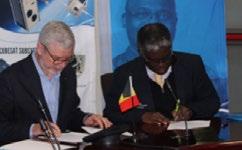
CPUT has signed an MoU with Erasmus Brussels University of Applied Sciences (EhB) to enhance academic cooperation, research, and student exchange. The agreement, finalised during a visit from the Belgian delegation in July, aims to explore collaboration in Nursing, Urban and Regional Planning, and within CPUT’s FA 5: Human, Health & Social Dynamics.
The partnership was initiated by FAS and coordinated by the Directorate: SIP, whose Manager: International Relations, Dr Tasmeera Singh, emphasised the intention to go beyond mobility and include joint research initiatives. VC Prof Chris Nhlapo highlighted the value of internationalisation. “We believe problems are now global in nature... That’s why we subscribe to addressing the sustainable development goals – because problems know no boundaries.”
The delegation toured the Department of Food Science and Technology laboratories, sampling CPUT’s artisanal chocolate and learning about its brewing technologies. Dr Singh added, “Every visit aligns with CPUT’s strategic objectives and our commitment to fruitful partnerships.”
International virtual engagements
January Directorate: SIP met with Dr Deep Mathur from Suresh Gyan Vihar University to explore credit-transfer and exchange programmes.
February Directorate: SIP and DRD met with Dr Gaquere from University of West Georgia, USA to discuss a special project for the Faculty of Education.
Dr Singh and Mr Booi met with the UCDP project team and consortium to discuss the DUT-led ‘AfricanCentred Globalisation’. This is a R11.38 million, three-year DUT-led project involving ten universities, and will build HE international capacity.
Dr Singh and Mr Booi met with Ms Nina Baettler from Lucerne University of Applied Sciences to discuss hosting study abroad students at CPUT.
March Mr Booi and Ms Bashala attended the Erasmus+ Information Session – South Africa, exploring its opportunities and processes. Topics included Capacity Building in HE, Erasmus Mundus Joint Master’s, Jean Monnet Actions, and virtual exchanges.
May Prof Peter engaged with Teacher Edu (PhD), Professor of Marketing and Vice-President: Research, Innovation, and Internationalisation at the Romanian American University. CPUT was invited to join the Demos Kratos European University.
June
Dr Singh had a meeting with Dr Fernando Cassinda Quissanga, Director: Scientific Research at the José Eduardo dos Santos University, Huambob, Angola to discuss partnership opportunities.
Dr Singh met with Ms Kristin Radesjö and Ms Karolina Catoni from the University of Gothenburg, Sweden, following an engagement between CPUT’s VC and the DVC of Gothenburg during the SASUF Research and Innovation Week in Sweden. They discussed academic synergies and potential research collaboration. The Directorate: SIP met with Prof Timothy Olabiyi and Prof Jelili Badmus from Lautech University, Nigeria, and CPUT’s Prof Ahmed Mohammed from FAS, the initiator of the partnership. They discussed the first steps to implement the MoU.
Dr Singh engaged Ms Ida Anderson, the Partnerships and Policy Specialist at Orebro University, Sweden, following an engagement between CPUT’s VC and the DVC of Gothenburg during the SASUF Research and Innovation Week. Dr Singh discussed possible collaboration based on shared academic strengths and research focus areas.
August Dr Singh and Mr Booi met with Dr Nompilo Ndlovu, Centre Director for CIEE Cape Town, and Mr Royston Bergman, Finance Director, to discuss the possibility of CIEE sending study abroad (direct fee-paying) students to CPUT to complete two modules contributing towards their degrees at their home institutions. CPUT and UWC co-hosted a joint COIL workshop facilitated by Dr Daniel Nolan from the University of Minnesota, USA. The workshop was well attended by CPUT staff, and as a key outcome, a community of practice will be established to advance COIL as part of CPUT’s Internationalisation of the Curriculum (IoC) strategy.
CPUT and EhB representatives formalise their new partnership
August Dr Singh and Ms Andiswa Mrasi, FBMS met with Mr Santosh Kumar Chaudary and Dr Dhimanth Ganatra from Jain University, India, to explore partnership opportunities. The meeting followed a visit by Prof Renita Rampersad to Jain University, with discussions focusing on shared academic interests and CPUT’s RFAs.
Dr Singh and Mr Booi attended the SASUF Coordinators Meeting, which focused on planning for the SASUF 2025–2030 initiative. Key outcomes included the establishment of the SASUF Working Group as the initiative’s steering committee, and strategic planning for the future of the SASUF Student Network.
September Prof Burger and Dr Singh attended the virtual Universities South Africa (USAf)–Canada Universities Network (SACUN) webinar. The session aimed to explore opportunities for joint research initiatives and to raise awareness to strengthen bilateral research collaboration between institutions from both countries.
Dr Singh and Mr Booi met with Ms Marine Carbonell from Campus France to discuss the upcoming virtual scholarship session. The Directorate: SIP invited the French Consulate in Cape Town to meet with F’SATI in early December to explore collaborative opportunities and project alignment.
October The Directorate: SIP was invited by FHWS to meet with the Joint Institute for Nuclear Research (JINR), an international intergovernmental scientific centre renowned for integrating fundamental theoretical and exploratory research. The Director of JINR presented potential areas for support, joint innovation, skills development, and knowledge transfer, which could lead to a formalised partnership between CPUT-NRF iThemba Labs and JINR.
Dr Singh attended the online Policy Dialogue 2, hosted by the Embassy of the Netherlands, titled ‘Curriculum design and decolonisation’. The dialogue included colleagues from the Embassy and South African HEIs. The discussion highlighted the need for universities to review their curricula to assess the inclusion of indigenous knowledge systems and, if absent, consider how to address this going forward.
November Prof Dina Burger and Dr Singh met with Prof Dr Bernd Zirkler from Westsächsische Hochschule Zwickau University of Applied Sciences, Germany to discuss possible CPUT participation in the DAAD project on the theme of sustainability.
Dr Singh and Mr Booi met with the SASUF Joint partner meeting of 40 universities to discuss the new launch of SASUF 2030.
November Dr Singh was invited by the Office of the VC to meet with Prof Steve Oliver, VC and Principal of Robert Gordon University, Scotland. The meeting focused on identifying common academic areas of alignment between the universities.
Dr Singh and Mr Booi attended the International Credit Mobility (ICM) meeting with the University of Strasbourg, France, to discuss the initial steps of the project, as well as expectations and deliverables. CPUT has been awarded funding to support student and staff mobility over the next three years.
December The Directorate: SIP facilitated a follow-up meeting with academics from Hainan University, China. CPUT academics from the FEBE and FAS were in attendance. During the meeting, common academic areas were identified as a starting point for partnership. It was also agreed that an MoU be signed to formalise the collaboration.
SIP hosts three prestigious international universities
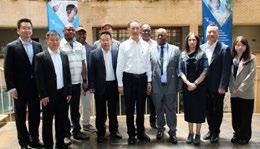
In December, the Directorate: SIP welcomed high-profile delegations from three esteemed international universities: The Hague University of Applied Sciences (THUAS) from the Netherlands, Hainan University, and Sanda University from China.
Hainan University’s delegation arrived with a mandate to strengthen institutional ties through faculty and student exchanges and collaborative research in areas such as agriculture, food sciences, and engineering. Sanda University aimed to establish an intercollegiate relationship, facilitate student mobility, and promote research cooperation. THUAS sought to deepen its collaboration with FEBE and explore new opportunities with FBMS. Their visit, which included productive discussions at Newlands Stadium, is paving the way for a joint Erasmus+ project.
Dr Tasmeera Singh, Manager: International Relations at the Directorate: SIP, emphasised the significance of these engagements, noting that follow-up meetings with CPUT academics are already in progress. She expressed optimism about the future. “We look forward to collaborations in terms of the internationalisation of research and the curriculum.”
Representatives of CPUT with delegates from THUAS, Hainan and Sanda
CPUT RESEARCH FESTIVAL
Celebrating Research Excellence
From publishing research papers to undertaking innovative studies, CPUT academics continue to make the institution proud. This excellence in research was celebrated at the university’s Research Festival, held at the Lecture Theatre Complex on the District 6 Campus, from Tuesday 29 October to Friday 1 November 2024.
One of the ways the institution acknowledges our academics’ outstanding achievements is through the annual Research Excellence Awards.
There are three categories of Research Excellence Awards: Research Output, Postgraduate Supervision, and External Funding. Typically, up to four awards are presented in each category: Platinum, Gold, Silver, and Bronze. A fifth award, the Diamond Award, has recently been introduced to recognise ‘extra outstanding’ achievements.
Research Output
These awards are calculated from the total number of DHET units produced by each author. This includes all output types acknowledged by the DHET, namely:
• Journal Articles
• Books & Chapters in Books
• Conference Proceedings
• Creative Outputs & Innovations
Postgraduate Supervision
These awards are given for the number of postgraduate students supervised. They are calculated based on the total number of units earned by a supervisor.
Supervisors earn:
• One unit for supervision of a master’s degree
• Three units for supervision of a doctorate
External Funding
This category includes funding from industry, as well as grants awarded by universities and research councils.
To be eligible for an award in the External Funding category, a researcher must have secured at least R1 million in funding during the year under review. However, if fewer than four academics meet this threshold, funding amounts exceeding R500 000 may also be considered.
Researchers who have secured R1 million or more will automatically receive an award. Once the top awards have been allocated, any remaining researchers with funding of R1 million or more will receive Bronze Awards.
For those who have secured R5 million or more, a Diamond Award is presented.
AWARDS FOR EXCELLENCE IN RESEARCH ACTIVITIES
RESEARCH PUBLICATION – for 2021 publications
AWARD RECIPIENT FACULTY
Platinum Prof Vipin Balyan Faculty of Engineering & the Built Environment
Gold Dr Velaphi Msomi Faculty of Engineering & the Built Environment
Silver Prof Robertson Tengeh Faculty of Business & Management Sciences
Silver Prof Oluwafemi Oguntibeju Faculty of Health & Wellness Sciences
Bronze Prof Tiko Iyamu Faculty of Informatics & Design
POSTGRADUATE SUPERVISION – Dec 2021 & Apr 2022 graduations
AWARD RECIPIENT FACULTY
Platinum Dr Larry Jowah Faculty of Business & Management Sciences
Gold Prof Tiko Iyamu Faculty of Informatics & Design
Silver Prof Johannes Cronje Faculty of Informatics & Design
Bronze Prof Vipin Balyan Faculty of Engineering & the Built Environment
Bronze Prof Charles Laubscher Faculty of Applied Sciences
Bronze Dr Velaphi Msomi Faculty of Engineering & the Built Environment
RESEARCH PUBLICATION – 2022 publications
AWARD RECIPIENT FACULTY
Platinum Prof Tiko Iyamu Faculty of Informatics & Design
Gold Prof Victoria Jideani Faculty of Applied Sciences
Silver Prof Rodney Duffett Faculty of Business & Management Sciences
Bronze Prof Vipin Balyan Faculty of Engineering & the Built Environment
POSTGRADUATE SUPERVISION – Dec 2022 & Apr 2023 graduations
AWARD RECIPIENT FACULTY
Platinum Dr Larry Jowah Faculty of Business & Management Sciences
Gold Prof Robertson Tengeh Faculty of Business & Management Sciences
Silver Prof Atanda Raji Faculty of Engineering & the Built Environment
Bronze Prof Justine Daramola Faculty of Informatics & Design
Bronze Prof Andre de la Harpe Faculty of Business & Management Sciences
POSTGRADUATE SUPERVISION – Dec 2023 & Apr 2024 graduations
AWARD RECIPIENT FACULTY
Platinum Prof Mohamed Kahn Faculty of Engineering & the Built Environment
Gold Prof Andre de la Harpe Faculty of Business & Management Sciences
Silver Prof Atanda Raji Faculty of Engineering & the Built Environment
Silver Prof Michael TwumDarko Faculty of Business & Management Sciences
Bronze Prof Tiko Iyamu Faculty of Informatics & Design
EXTERNAL FUNDING – for 2023
AWARD RECIPIENT FACULTY
Platinum Dr Conrad Sparks Faculty of Applied Sciences
Gold Prof Tandi Matsha Faculty of Health & Wellness Sciences
Silver Prof Tunde Ojumu Faculty of Engineering & the Built Environment
Bronze Dr Kessie Govender Faculty of Engineering & the Built Environment
Bronze Dr Pamela Welz Applied Microbial & Health Biotechnology
Focus on ethics in research
Day 2 of the 2024 CPUT Research Festival, held at the District 6 Campus, centred on the critical theme of ‘Ethics in research’. The festival, presented under the overarching theme ‘Relevant, responsive and focused research and innovation for societal impact’, spanned four days and featured a diverse line-up of speakers, discussions, and workshops.
Dr Jerome Kiley, a senior lecturer in FBMS’ Human Resource Management Department, delivered a thought-provoking presentation on ‘AI and research ethics’. He emphasised that there is no simple answer to the ethical challenges posed by AI, noting that these issues are complex, context-dependent, and evolving rapidly.
Dr Kiley outlined key areas of concern, including:
• Privacy and consent
• Transparency and disclosure
• Data sensitivity
• Fair use and copyright
• Bias and representation
• Data security and anonymisation
• The impact on online communities
The day also included interactive roundtable discussions, one of which explored informed consent in depth. This session addressed questions such as when the consent process begins and ends, the challenges of obtaining consent from vulnerable participants, and the essential elements that ensure consent is truly informed.
Adding an international perspective, Prof Johan Bester, Associate Dean for Pre-clerkship Curriculum at Saint Louis University School of Medicine, USA
presented online on ‘Autonomy as an ethical principle in research: Why it matters and present challenges’.
Prof Bester’s key take-home messages included:
• Vulnerable people must receive special protection
• Research involving children must prioritise the best interests of the child
• Autonomy is essential, but not the sole ethical consideration; researchers must also uphold beneficence, justice, risk reduction, and risk avoidance
Day two’s focus underscored the CPUT’s commitment to fostering research that is not only innovative and impactful but also guided by the highest ethical standards.
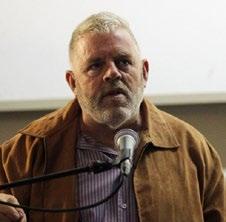
Dr Jerome Kiley
CPUT Research Festival puts innovation for impact in the spotlight
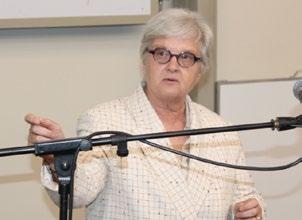
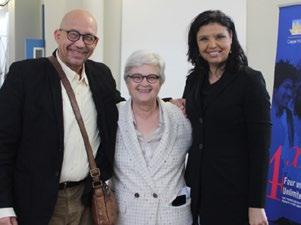
Celebrating excellence and partnerships that improve lives
No single event captures the breadth of CPUT’s intramural and extramural research quite like the annual institutional Research Festival. Held over four days in November this year, the event took place under the theme ‘Relevant, responsive and focused research and innovation for societal impact’. This landmark gathering brought together academics, stakeholders, and partners to celebrate excellence and explore the role of research in transforming communities.
Opening and vision
The festival opened with a welcome address from VC Prof Chris Nhlapo, who reflected on the meaning of excellence in higher education. “The concept of excellence is elusive, often misunderstood, and politicised. Excellence is achieved through training and habituation. The university’s raison d’être is to create a stimulating and rewarding environment.” He also stressed the importance of good governance in sustaining academic quality.
Prof Dina Burger, Director: DRD, described the gathering as the first South African research festival of its scale, underscoring CPUT’s pioneering role in celebrating research that improves lives through quintuple helix partnerships – linking academia, industry, government, civil society, and the natural environment. She noted that the scope of research at CPUT had expanded so greatly that the 2024 festival required multiple days to fully showcase the breadth of work being done.
Prof Burger emphasised the value of evidence-based projects supported by the Cape Higher Education Consortium (CHEC), aligning with CPUT’s Vision 2030 and strengthening transdisciplinary collaboration. The festival, she said, provided a platform for deepening joint commitments to research and innovation, engaging both African and international partners.
Programme highlights
The first day focused on integrating work-focused research with the business sector, celebrating achievements across disciplines. Dr Sharman Wickham from CHEC delivered the keynote address, while Dr Abeda Dawood from the South African Medical Research Council outlined research capacity development grants and programmes. Day 2 addressed ethics in research, reinforcing the importance of integrity and accountability in scholarly work.
On Day 3, the focus shifted to a two-day conference on CPUT’s research areas, where Prof Stephanie Burton from the Academy of Excellence in Research and Scholarship (AECRS) encouraged academics to mentor emerging scholars and highlighted AECRS capacity development platforms. The Deputy Mayor of Cape Town, Alderman Eddie Andrews, presented on ‘Relevant, responsive and focused research’, stressing the need to address urban governance challenges and highlighting collaboration between the city, academia, and the private sector as essential for solving social problems and driving community progress.
The final day featured paper presentations relevant to CPUT’s Research Focus Areas. There was also a reflection session, followed by the annual institutional Research Excellence Awards, acknowledgement of NRFrated researchers, and a certificate ceremony for Sisonke Supervision Mentoring Programme participants.
Prof Burger concluded proceedings saying, “The festival has the potential to engage numerous African and growing international partners. This has been not just a celebration, but a commitment to building stronger, more connected research communities.”
Prof Dina Burger
Dr Garth van Gensen, Prof Dina Burger and Prof Veruscha Fester
DEPARTMENT OF HIGHER EDUCATION & TRAINING (DHET) PUBLICATIONS AUDIT
CPUT JOURNAL RESEARCH UNITS FOR 2024
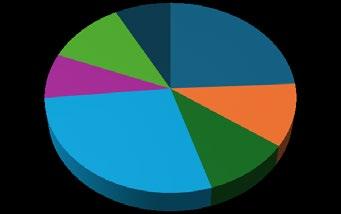
NATIONAL RESEARCH FOUNDATION RATING
The NRF is a national agency for research support and promotion. In addition to funding, human resource development and the provision of research facilities, the NRF annually invites researchers in all academic fields to apply for individual ratings.
THE NRF RATING CATEGORIES
A | Leading international researchers
B | Internationally acclaimed researchers
C | Established researchers
P | Prestigious awards
Y | Promising young researchers
IN THE NEWS
Academics selected for prestigious mentorship programme
Three CPUT academics were selected for a prestigious two-year mentorship programme funded by the British Academy in January. They are Dr Kathleen Naidoo and Dr Heidi Thomas (Medical Imaging and Therapeutic Sciences) and Dr Vuyo Mntuyedwa (Fundani CHED). The programme is titled ‘Strengthening South African writing for academic outputs’ and it aims to support early career researchers from South Africa’s 26 public universities. UK partners include De Montfort University, the University of Sheffield, and the University of Nottingham, while SA partners include Sefako Makgatho Health Sciences University and Stellenbosch University.
Dr Mntuyedwa said the opportunity came at a perfect time in her academic journey, aligning with CPUT’s Vision 2030 goals around internationalisation and research excellence. She noted that participating in the programme would not only strengthen her writing skills but also broaden her global academic networks and visibility. Dr Thomas described the timing of her selection as ideal, as it coincided with the final stages of her PhD, making it a meaningful milestone in her personal and professional development. Dr Naidoo expressed that the mentorship would offer valuable support in refining her academic writing, enhancing the quality and impact of her research publications, and contributing to her continued growth as a scholar.
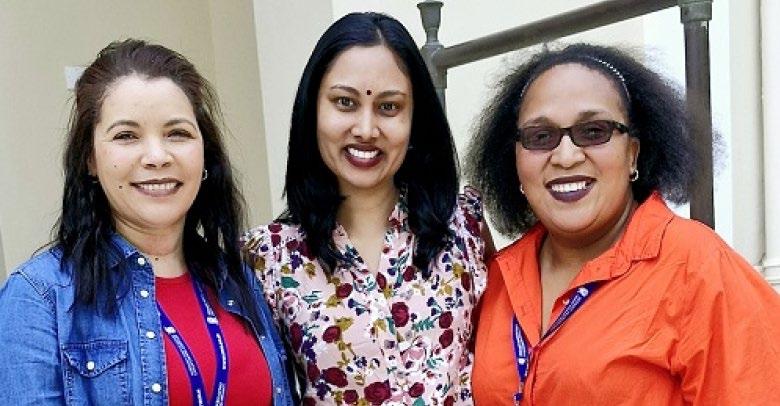
Dr Heidi Thomas, Dr Kathleen Naidoo and Dr Vuyo Mntuyedwa
CPUT contributes to indigenous language preservation

To advance its multilingualism policy, CPUT’s Language Unit hosted a SWiP (SADiLaR-Wikipedia-PanSALB) Project Workshop on the Bellville Campus in April. SWiP is a national initiative by the South African Centre for Digital Language Resources (SADiLaR), Wikipedia, and the Pan South African Language Board (PanSALB), aimed at increasing the digital presence of indigenous languages. The project, launched in 2023 at UNISA, initially focused on isiNdebele, but now promotes all 11 of South Africa’s official languages. It empowers communities to create and edit content on Wikipedia in their native tongues.
Wikipedia trainer Mr Michael Graaf led sessions on Wikipedia’s history, editing tools, translation functions, and article creation. Dr Kabelo Sebolai, head of CPUT’s Language Unit, said the university was one of only ten institutions selected from 26 to host the workshop. “We learned how to use Wikipedia to edit and translate into African languages,” he said. “These strategies will support our efforts to implement the multilingualism policy more effectively.”
NRF-RATED RESEARCHERS IN 2024
Centre for Innovative Educational Technology Prof
Centre for Postgraduate Studies Prof IJ van Zyl
Workshop delegates on the Bellville Campus
Faculty of Education
Dr PH Boer
Prof A Chigona
Prof JL Condy C2
Prof L de Sousa C3
Prof L Hibbert C2
Prof C Livingston C3
Prof ZC Sosibo C3
Dr Z Waghid Y2
Prof C Winberg C1
Faculty of Engineering & the Built Environment
Prof K Aboalez C3
Dr OP Babalola Y2
Prof V Balyan Y2
Dr MR Chowdhury Y2
Prof IEA Davidson C2
Prof VG Fester C2
Prof S Krishnamurthy C2
Dr V Msomi Y2
Prof B Ncube C3
Prof TV Ojumu C2
Prof OO Oyekola C2
Prof A Paliathanasis B2
Prof A Patnaik C2
Dr S Patnaik Y2
Dr AA Periola Y2
Faculty of Health & Wellness Sciences
Prof
Prof K Jooste
Prof T Matsha
Prof OO Oguntibeju
Dr S Raghubeer
Faculty of Informatics & Design
Prof
Prof
Fundani Dr N Norodient-Fataar C2
R132 million raised for underprivileged students
In January, CPUT’s Advancement Department announced that it raised R132 million in 2023 through bursaries, work-integrated learning, internships and community engagement, benefitting over 2 900 financially needy students. The funds came from various government and private donors.
Director Mr Calvin Maseko said, “We are grateful to our donors who helped realise the dreams of our underprivileged students. Thousands of CPUT students are struggling with fees, and the extra hours put in by the department’s staff, with support from colleagues across CPUT, have paid off.”
The funding also directly supported over 400 high school learners from feeder schools. The institution implements maths, science and digital literacy support at these schools as part of its community engagement work.
“I thank all the companies who partnered with us and ensured that we enable our financially disadvantaged students,” said Prof Driekie Hay-Swemmer, Executive Director: Office of the VC. “I invite all our partners to renew their commitment to CPUT in 2024 so we can assist even more students.”
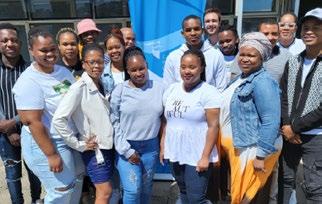
CPUT celebrates the collective effort that secured vital donor funding for underprivileged students
RESEARCH FUNDING 2024
CPUT academics embark on prestigious TAU 5 programme Quality Management Director appointed to NSRC
CPUT has announced that two academics have been selected for the prestigious fifth cohort of the Teaching Advancement at Universities (TAU) programme. Dr Sanet Cox and Dr Bronwyn Swartz were welcomed into the fellowship, aimed at strengthening excellence in teaching and learning across South African universities.
Dr Xena Cupido of Fundani CHED described the selection as a significant milestone for CPUT. “Drs Cox and Swartz’s acceptance into the TAU 5 cohort underscores CPUT’s commitment to academic excellence and its role in shaping the future of higher education in the country.”
Dr Swartz said she had heard about TAU through a colleague who praised it as an “incredibly supportive programme for academics aspiring to improve their Scholarship of Learning and Teaching (SoLT) capabilities”. She added, “The structure includes two projects. I have just started three, and will take advantage of being part of TAU to progress or complete two of them.”
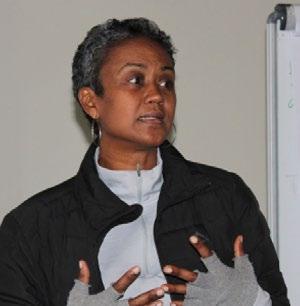
Dr Cox expressed her excitement about researching student support systems and their impact on success and retention. Her TAU project focuses on evaluating the impact of the First-Year Experience (FYE) support programme. Both academics agreed on the value of tailoring projects to the teaching and learning context at CPUT.
Dr Cupido added that TAU helps develop a new generation of senior academics equipped to be scholars, leaders, and agents of change. The 19-month programme includes block sessions, individual and group projects, and reflective reports. “TAU fosters inter-institutional collaboration and promotes social justice in education. To date, ten CPUT academics have completed the programme,” she said.
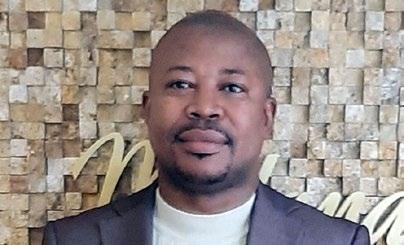
Dr Siyanda Makaula, Director: Quality Management, has been appointed to the National Standards and Reviews Committee (NSRC) of the Council on Higher Education (CHE). The appointment took place in April.
The NSRC is a specialist governance structure of the CHE, supporting the Higher Education Quality Committee (HEQC) in developing qualification standards and overseeing national reviews of programmes and qualifications. It evaluates institutional progress reports and confirms whether quality improvement plans have been effectively implemented. It also makes recommendations to the HEQC, which holds executive authority on quality assurance in the higher education sector.
Dr Makaula, who joined CPUT in June 2019, said he was honoured by the appointment. Asked about the experience he brings to the role, he said, “I’m a higher education leader, a quality management and assurance professional, an advocate for higher education quality through transformation, excellence and accountability. I bring a wide range of experience in the development and implementation of national higher education, and institutional academic policies and quality assurance frameworks.”
Dr Bronwyn Swartz
Dr Siyanda Makaula
Honouring women, advancing equality
In South Africa, Women’s Month is commemorated annually in August, honouring the courage, contributions, and achievements of women, while recognising the challenges that still hinder their advancement. It is rooted in the memory of the 20 000 women who marched to the Union Buildings in 1956 to protest against unjust pass laws, a historic act of defiance that continues to inspire the fight for equality today. Against this backdrop, Women’s Month provides an important platform for reflection, celebration, and renewed commitment to gender justice.
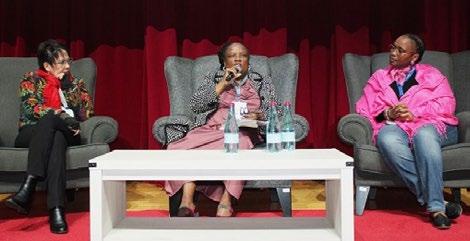
Accelerating women’s empowerment and gender equality was at the heart of the Women’s Month celebrations this year, also celebrating the achievements of ‘SmartCPUTWomen’. The opening event was presented by the Centre for Diversity, Inclusivity and Social Change, in collaboration with the Human Capital and Advancement departments.
In her welcoming address, Prof Driekie Hay-Swemmer, Executive Director: Office of the VC, said that beyond serving as a commemorative event, “days like today should also serve as an occasion for introspection into the progress made since the march of 1956”. She noted that while progress has been made in some areas, there

is still a journey ahead to eradicate gender-based violence (GBV), ensure women receive fair compensation in the workplace, and guarantee recognition across all facets of society. “Though women in Africa are often the backbone of their families and communities, they still face systemic barriers that hinder economic participation, from unequal pay to limited access to resources,” she added.
Prof Hay-Swemmer emphasised the importance of solidarity, urging attendees to support initiatives that empower women and advocate for policies that truly promote gender equality. “My prayer for all of us is to stand in solidarity, reviewing policies time and again and asking ourselves, ‘Are these policies doing what they should be doing?’”
Ms Brightness Mangolothi, Director of HERS-SA, spoke on coaching and mentoring as vital tools for empowerment. She explained that mentorship fosters inclusion and a sense of belonging, and, she added, applying an intersectional lens can elevate institutions to greater heights. Ms Vuyokazi Dwane, Senior Director: HC, addressed the topic of ‘A culture of inclusiveness for neurodivergent women’, while Ms Sixolile Ngcobo, Director: National Strategic Plan – Gender-Based Violence and Femicide Localisation Lab, spoke on women’s empowerment and gender equality in higher education.
Dean of Students, Ms Nonkosi Tyolwana, highlighted GBV as a critical barrier to women’s progress, presenting the findings of the Report of the Ministerial Task Team on Matters of Sexual Harassment and Gender-Based Violence and Harm in South African Universities.
Other speakers included Ms Xoli Fuyani, Director of Black Girls Rising, Ms Lynn Hendricks from the Advancement Office, and Ms Anelisa Frieste from the Bellville Local SRC. The event also provided interactive sessions for engagement, including a finance-focused session presented by Sanlam, as well as fun and creative activities for attendees, reflecting the celebratory and educational spirit of Women’s Month at CPUT.
Celebrating courage, equality and the spirit of ‘Smart CPUT Women’

FACULTY OF APPLIED SCIENCES
DEAN’S REPORT
PROF JOSEPH KIOKO
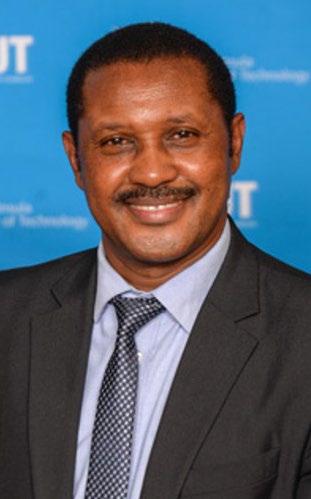
Introduction
In 2024 we were almost halfway through the CPUT Vision 2023 decadal plan, and almost at the end of the faculty’s current Strategic Plan. The time was ripe to reflect on the progress made towards achieving our strategic goals and aspirations. During 2025 we will have a formal review of such progress, but the report that follows will reflect some of our progress so far towards Vision 2030.
Progress in the introduction of new postgraduate qualifications
One of the faculty’s strategic goals is to develop and implement a programme qualification mix (PQM) that prepares our students for the future, as well as to contribute to the production of Modes 2 and 3 knowledge. In that respect, by 2024, we had nine Masters qualifications in the faculty (i.e. in Agriculture, Chemistry, Consumer Science in Food & Nutrition, Conservation Science, Marine Science, Horticultural Sciences, Food Science & Technology, Environmental Management, and Environmental Health); and seven Doctoral qualifications (in Agriculture, Chemistry, Conservation Science, Horticultural Sciences, Food Science & Technology, Environmental Management, and Environmental Health). These are underpinned by the appropriate undergraduate or
postgraduate Diploma qualifications. In addition, in 2024, we received PQM clearance for the Doctor of Marine Science and were awaiting CHE accreditation thereof. The Master of Biotechnology was also at the same approval stage as the Doctor of Marine Science, and we received CHE accreditation for the postgraduate Diploma in Mathematical Sciences. Within the next two years we expect to offer the full suite of postgraduate qualifications which we hoped to offer towards Vision 2030. I wish to thank everyone in the faculty and the support Departments for the invaluable contribution in getting us this far.
Enrolment and graduation of postgraduate students
In 2024, the faculty had 317 postgraduate students out of a total enrolment of 4 048 students in the faculty, constituting a proportion of about 8%. Of the 317 students, 120 were enrolled for Postgraduate Diplomas, 133 for master’s qualifications, and 64 for doctorates. Significantly, female students made up almost two thirds of the enrolment for each of those postgraduate levels. This is in keeping with recent trends in which female students take up the lion’s share of our enrolments at both undergraduate and postgraduate levels. A similar trend holds among the students graduating, and we are very pleased with the uptake of, and success in, our STEM programmes by female students.
During 2024, the faculty continued to maintain seven research entities aligned to two of CPUT’s six research focus areas. The two CPUT focus areas in this case are: Bioeconomy & Biotechnology; and the Environment, Climate Change & Sustainability. The faculty entities in the focus area Bioeconomy & Biotechnology were the AgriFood Technology Station, the Bioresource Engineering Research Group (held jointly with the Faculty of Engineering & the Built Environment), the Functional Foods Research Group, and the Natural Products Chemistry Research Group. In the focus area, the Environment, Climate Change & Sustainability, the faculty had these entities: the Centre for Sustainable Oceans, the Crystal Engineering Research Group, and the Environmental Chemistry, Toxicology & Remediation Research Niche Area. The research entities and the respective leaders during 2024 are listed below, and each of the entities has a report in the Focus Areas section of this Research Report.
RESEARCH ENTITY
Centre for Sustainable Oceans, which hosts the CPUT Research Chair: Oceans Economy
Environmental Chemistry, Toxicology & Remediation Research Niche Area
Crystal Engineering Unit
Agrifood Technology Station
Bioresource Engineering Research Group (joint Research Group with the Faculty of Engineering & the Built Environment)
Functional Foods Research Unit
Natural Products Chemistry Research Group
LEADER RESEARCH FOCUS AREA
Dr C Sparks (Acting) The Environment, Climate Change & Sustainability
Prof J Odendaal
Prof M Wicht
Mr N Mshicileli Bioeconomy & Biotechnology
Prof V Okudoh
Prof M Opperman
Prof A Mohammed
Please note that more information about this faculty’s 2024 research activities can be found in the Focus Areas section of this Research Report
Community members learn horticultural skills
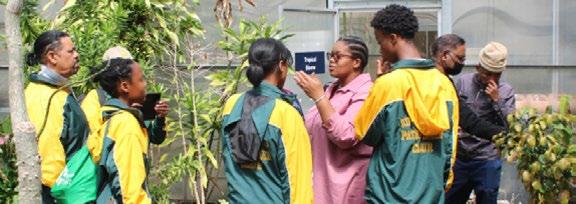
Caring for the environment is crucial, and in October the Department of Horticultural Sciences hosted a workshop at the Bellville Campus nursery to teach community members sustainable gardening techniques, enhance their horticultural skills, and beautify their surroundings. The Horticulture and Landscape Architecture programmes had earlier developed a vegetable garden and landscape design for Good Hope College in Kuils River. Lecturer Mrs Yonela Matanzima explained, “We realised that we cannot always do things for people, as we will not always be there. That is how the idea of the workshop came about. We saw that there were skills and knowledge that we could share with the community.”
The workshop aimed to build skills in landscape maintenance, organic feeding, and pest control. Good Hope College learners attended a dedicated session on food cultivation and plant care, covering topics such as turfgrass maintenance, pruning techniques, and the importance of organic methods. Third-year Landscape Architecture student Mr Siphumelele Chuma presented on turfgrass maintenance, impressing Mrs Matanzima with his confidence and knowledge. “This shows that the lecturers are doing a great job,” she commented.
Guest lecturer Mr Alex Duff from Spectrum Marketing shared his expertise with both students and community members, emphasising the value of serving local communities. In his role as Workplace-Based Learning Programme Coordinator and through involvement in Service-Learning/Community Engagement, he has witnessed first-hand the positive impact such projects can have.
“We saw that there’s a need for sharing knowledge so that they can look after the plants that we were planting there,” Mrs Matanzima said. Community members from Good Hope College, a Christian school that instils values in its learners, expressed their appreciation. Teacher Mr John Eager, said, “Thank you for your thoughtfulness in including us in your field of expertise.” Mrs Matanzima concluded, “In the future, instead of going out to communities and doing the projects for them, we should bring them in and teach them how it is done.”
Research output
The 2024 research output from the faculty, as submitted to DHET for subsidy claims, was 69.71 units, comprising mainly journal articles. This is an increase from the 2023 output, and we hope to keep the upward trajectory going.
Some highlights for 2024
The graduation of postgraduate students and research output are always a highlight for the faculty. In addition, for 2024, I would like to mention a number of other items:
U6+ International Conference
The faculty contributed to hosting the 8th International Conference of the U6+ Consortium of African Universities between 10 to 12 September 2024 at the D6 Campus, attended by over 150 delegates from 22 Institutions representing 5 Countries. The financial report showed that the conference broke even and made a small profit – the first time this has happened during the four times the university has hosted the Conference. Many thanks to the VC Prof Nhlapo, his leadership team, and to everyone from the different Faculties and Service Departments who helped.
NRF-rated researchers
The faculty had 22 NRF-rated researchers in 2024, with eleven C2 ratings, two C3 ratings, one Y1 rating and seven Y2 ratings.
Mrs Yonela Matanzima sharing skills with community members
Prof NB Báthori
Dr C Bvenura
Dr BS Chidi
Prof KP Findlay
Prof S Geerts
Dr EL Ismail
Prof A Jacobs
Prof VA Jideani C2
Prof MO Jimoh Y2
Prof L Kambizi
Prof CP Laubscher
Prof FB Lewu
Dr Y Maphosa
Prof MC Matoetoe
Prof AA Mohammed
Dr VV Mshayisa
Prof F Nchu
Dr N Ndube-Tsolekile
Prof VI Okudoh
Prof BO Opeolu
Dr AB Oyenihi
Dr J Sagbo
Prof VS Somerset
Prof J van Wyk
Well done to all our rated colleagues!
Biennial Customer Satisfaction Survey for Golden Arrow Bus Services (GABS)
As part of a long-standing relationship with Golden Arrow Bus Services (GABS), staff and students from the Department of Maths and Physics did the Customer Satisfaction Survey for the Bus company during September 2024. The results of the survey will be handed over to the GABS Executive Management at a date to be arranged. These surveys are widely acknowledged as playing a key role in strategic decisions for the Bus service.
Installation of NEP-funded equipment
Through the National Equipment Programme (NEP) of the NRF, one of the faculty’s researchers (Prof Maretha Opperman) successfully applied for a tandem quadrupole gas chromatography/mass spectrometry (GC TQ); and the multimillion-rand instrument was installed and commissioned in Prof Opperman’s lab in June 2024. This equipment will boost the faculty’s analytical capacity for related research.
Strategic research partnerships
The faculty maintained a suite of strategic research partnerships and also established new ones. Among the existing partnerships was the U6+ Consortium of African Universities, in which the faculty continues to play a leading role. This includes providing the founding Director, Prof Learnmore Kambizi (Department of Horticultural Sciences), for the Consortium’s African Centre for Herbal Research.
The Centre is based at the University of Ilorin in Nigeria. The centre has already produced several patented products developed from African medicinal plants.
IN THE NEWS
Chemistry lecturer inducted into SAYAS
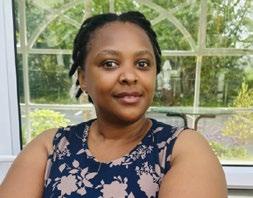
Dr Ncediwe Ndube-Tsolekile, a senior lecturer in the Department of Chemistry, was honoured as one of ten new members inducted into the South African Young Academy of Science (SAYAS) in February. SAYAS, formed under the Academy of Science of South Africa, recognises outstanding young researchers under the age of 40 who demonstrate both scientific excellence and community engagement. The academy works to influence policy, build partnerships, and address national and global challenges.
“To have my scientific and community work recognised nationally is truly an honour,” said Dr Ndube-Tsolekile. She described herself as ambitious, driven, God-fearing, and committed to a balanced academic life.
The recognition highlights the calibre of academic staff at CPUT and the university’s broader contribution to national scientific development.
Dr Ncediwe Ndube-Tsolekile
CPUT wins first prize for Wild African Ale

A bold blend of tradition and innovation has earned CPUT top honours in the national intervarsity brewing and tasting challenge. In November, DFST claimed first prize – and R10 000 in brewing ingredients – for its ‘Wild African Ale’, alongside a second-place win in the Matured category. The two-day event in Bloemfontein brought together teams from 18 institutions for a celebration of creativity, skill, and beer culture, complete with presentations, sensory training, and blind tastings. This year’s theme honoured the African queens who brew umqombothi, a traditional beer predominantly crafted by women. In tribute, the team named one of their creations ‘Queen Modjadji’.
Team mentor Mr Thembelani Xolo explained that preparation involved selecting and training ten students in recipe development and sensory evaluation, ensuring each brew adhered to Beer Judge Certification Programme standards. “The innovation in incorporating traditional umqombothi without losing its essence – using relatable ingredients and authentic taste – was exciting,” he said. “Winning with a product rooted in our research focus is vital for CPUT.”
The competition, now in its 21st year, also celebrated the role of student involvement in advancing brewing innovation. “The students will receive certificates to showcase this achievement on their CVs,” Mr Xolo noted. He emphasised the department’s ongoing mission: to show how sorghum can serve as a primary ingredient in diverse beers, and to remain consistent enough to defend the Wild African Ale title in years to come.
Apart from keeping strong intra-Africa partnerships, in 2024 the faculty also initiated new strategic partnerships across the world, including collaborations with the University of Catania in Sicily, Italy; the Universidad Nacional de Cuyo (UNCUYO) in Argentina; and the Erasmus Brussels University of Applied Sciences and Arts in Brussels, Belgium; among others. Such partnerships are an important avenue towards making an impact nationally, regionally and globally.
Staff development and capacity building
The achievement of the faculty’s research objectives, including postgraduate output and strategic research partnerships, is dependent on staff capacity and commitment. Thus, staff development and transformation are key pillars of our Strategic Plan. We therefore made use of targeted capacity-building programmes for staff.
During 2024, we had academics taking part in the following programmes, all of whom aimed to attain doctoral degrees by the time of completion:
• Black Academic Advancement Programme
• New Generation of Academics Programme (nGap)
• Improvement of Qualifications Programme (IQP)
• Nurturing Emerging Scholars Programme (NESP)
There were also numerous staff members on the NRF Thuthuka postdoctoral and rating tracks.
Looking towards 2030
The faculty’s Strategic Plan, aligned with the
university’s Vision 2030, includes an action plan specifically for Research, Technology Innovation & Partnerships, in line with Focus Area 3 of Vision 2030, i.e., Smart RTIP that is relevant and excellent in its knowledge production. In this regard, the faculty has committed itself to the following:
• Developing the research capacity of the next generation of scholars and innovators – putting the Faculty of Applied Sciences at the forefront of innovation in its broadest sense
• Increasing and strengthening interdisciplinary and transdisciplinary research entities in the faculty
• Creating new opportunities to work in collaboration with industry, business and communities
• Developing commercialisation and other pathways for research impact
• Maintaining a high number of NRF-rated researchers
• Improving research output by academic staff
• Increasing the number of staff qualified to operate leading-edge instrumentation
With commitment to the Strategic Plan and the necessary actions, we are confident that the faculty will continue its positive trajectory in the research arena.
A note of appreciation
To all staff, students and collaborators: Thank you for your commitment, energy, dedication and support in making the year 2024 a success for our faculty.
Proud DFST representatives in Bloemfontein
FUNDING
*Excluding Postdoctoral Funding and Postgraduate Bursaries
CPUT and partners tackle food insecurity

Food security, migration, and environmental management remain pressing concerns in South Africa and beyond. In response, FAS hosted a partner workshop in November for the project ‘Coproducing knowledge on sustainable growth through service-learning pedagogy between African and European higher education institutions’ (COPAFEU). The event, held at SARETEC, formed part of an EU-funded Erasmus+ grant involving nine other universities across Africa and Europe.
An adjunct professor at FAS, Prof Beatrice Olutoyin Opeolu, who co-facilitated the workshop with Dr Ignatius Ticha, Language Coordinator: FAS, welcomed the guests and noted partnerships with institutions in Ethiopia, Nigeria, Tanzania, Greece and Finland. “At CPUT and UFS we are focused on food security, migration, and environmental management because these are relevant to South Africa. We aim to use the project to understand the dynamics among local and migrant food vendors and their practices, and to facilitate cohesion among them using enhanced service learning,” she said.
Prof Opeolu explained that the process involves engaging many stakeholders, with students acting as co-creators of knowledge that can be adapted for teaching and learning elsewhere. While other partner universities address themes specific to their contexts, all agree that entrepreneurial skills are central to the project’s intended outcomes for both students and communities. The workshop successfully achieved its goals. As the Country Leader for the COPAFEU Project in South Africa, Prof Opeolu leads teams from CPUT and UFS. Among the facilitators were representatives from UFS, Hanken University in Finland, and the University of Peloponnese in Greece.
Representatives from CPUT and international partner universities gather at SARETEC for the COPAFEU workshop
CPUT hosts U6+ International Conference
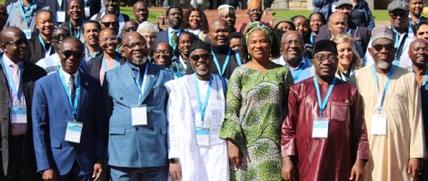
In September, CPUT hosted the 8th International Conference of the U6+ Consortium of African Universities at the District 6 Campus, themed ‘Research, innovation, and technology for African development’.
The U6+ Consortium comprises seven universities, namely, CPUT; Jaramogi Oginga University of Science and Technology, Kenya; Kwara State University, Nigeria; TWC of The Gambia; University of Cape Coast, Ghana; University of Ilorin, Nigeria; and University of Abuja, Nigeria. Launched in 2012 in Ilorin, Nigeria, the consortium aims to foster academic linkages among member universities. The original name, U6, later evolved to U6+ to reflect its expanded membership.
Director Prof Learnmore Kambizi highlighted one of the consortium’s major achievements, “The success story has been the establishment of the Herbal Research Centre at TWC of Ilorin.” Another success is that member institutions have collectively published 15 scientific articles, underscoring the consortium’s collaborative ethos. The conference, which rotates annually among members, was opened by the Chair, Prof Chris Nhlapo. High-quality papers addressed all subthemes, with the Local Organising Committee (LOC) prepared for a hybrid format – although 90% of delegates attended in person.
At the closing ceremony, all seven vice-chancellors affirmed the event’s success, noting in particular the strong participation of postgraduate students as a promising sign for continuity. “The Department of Horticulture was well represented with eight papers from students,” Prof Kambizi noted. The LOC expressed its appreciation for the support of Prof Nhlapo and CPUT Executive Management, and commended the active involvement of LOC members, with over 40 full papers submitted for inclusion in the proceedings.
RESEARCH OUTPUT
(figures
Postgraduate degrees obtained by staff
PhD in Chemistry
CPUT
Surname initial(s)
‘Thesis title’
PhD in Environmental Health
CPUT
Surname initial(s)
‘Thesis title’
PhD in Environmental Health
CPUT
Surname initial(s)
‘Thesis title’
PhD in Environmental Health
CPUT
Surname initial(s)
‘Thesis title’
Representatives from the U6+ Consortium of African Universities at their 8th International Conference
Lecturer wins Best Oral Presentation at NRF Symposium
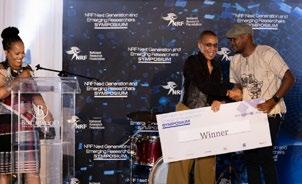
Horticultural Sciences commits to medicinal plant conservation
In an effort to enhance relationships among traditional healers, smallscale farmers, and CPUT, the Department of Horticultural Sciences held a training workshop for these stakeholders in June. The workshop also aimed to conserve endangered and extinct medicinal plants while promoting the organic cultivation of these plants by traditional healers and small-scale farmers. Professor in Horticultural Science, Prof Learnmore Kambizi, stated that the workshop on ‘Training on medicinal plants cultivation’ was a huge success.
The response from community members was overwhelming. Training for 30 traditional healers and small-scale farmers was planned, but the workshop was oversubscribed, and unfortunately some interested individuals were turned away. Prof Kambizi noted the active participation of PhD students and highlighted a strong community request for a short course on medicinal plant cultivation following the discussion session.
gather information about the use of medicinal plants in the Western Cape, including the most commonly used plants and the feasibility of cultivating them.
The training workshop was honoured by the presence of Mr Chief Vulikhaya Sihluku and Dr Mavuso Gqola, both distinguished representatives of the Traditional Healers Organisation. The workshop attracted a diverse group of attendees, ranging in age from 16 to over 60.
The outcomes of the workshop included:
• Four new medicinal plant gardens will be established in different areas of the Western Cape
• Traditional healers will have access to commonly used medicinal plants
• Traditional healers’ planting and cultivation skills will be enhanced
Dr Vusi Mshayisa, a researcher and lecturer in the Department of Food Science and Technology (DFST), earned top honours for his presentation at the NRF Next Generation and Emerging Researchers (NGER) Symposium in Boksburg in early November. The event fosters collaboration, knowledge exchange, and groundbreaking research in alignment with the NRF’s 2030 vision of ‘Research for a better society’.
Dr Mshayisa’s presentation, ‘Edible insect flours: Proximate, physicochemical, and functional properties for sustainable food’, was hailed by attendees as a ‘masterclass’ and earned a standing ovation. At the gala dinner, he received the Best Oral Presentation award from Dr Gugu Moche, Acting DCEO: RIISA and Group Executive for Digital Transformation. In his acceptance speech, Dr Mshayisa dedicated the award to his mentor, Prof Jessy van Wyk, for her leadership in edible insect research at CPUT, and to his students “who have been pivotal in advancing this research field”. He described the award as recognition of “the collective efforts of CPUT’s Department of Food Science and Technology to establish itself as a leader in sustainable food research”.
Academics presenting at the workshop included Prof Felix Nchu and HoD: Horticultural Sciences, Dr John October. PhD candidate Ms Sibusiso Xego shared that the workshop was part of her project supervised by Prof Kambizi and Prof Nchu. Practical demonstrations on medicinal plant cultivation techniques were facilitated by doctoral candidate Ms Pumla Staffa and Ms Sinovuyo Ncuku. Mr Xego distributed questionnaires to
• A relationship between CPUT, small-scale farmers and traditional healers will be initiated
• Research collaborations will be initiated to conserve medicinal plants
These initiatives will help reduce the overharvesting of wild stocks of medicinal plants.

Dr Vusi Mshayisa receiving his award
The workshop on ‘Training on medicinal plants cultivation’ was a huge success
CPUT makes its mark with Fair Trade CPUT and Italian Embassy share culinary insights
In September, the FAS launched the Cape Peninsula University of Technology Fair Future (CPUTFF) campaign, signing the ‘10 Principles of Fair Trade’ as part of the Fair-Trade University Initiative. The event, held at the Agri-Hub on Wellington Campus, aims to integrate sustainability, resilience, and ethics into agriculture while connecting with fair-trade networks locally and globally.
Department of Agriculture lecturer Ms Nonkululeko Mfeka noted that CPUT and the World Fair Trade Organisation Africa and Middle East (WFTO AME) signed an MoU earlier in 2024 to improve the livelihoods of disadvantaged producers. “This initiative aligns with Vision 2030, focusing on ‘Smart student engagement and learning experiences’,” she said.
Ms Musa Mpofu, Project Officer for Domestic Fair Trade – Kenya and South Africa at WFTO, reflected on the campaign’s origins in 2021, and the time taken to establish implementation frameworks that would ensure maximum benefit for students. At the event, Prof Joseph Kioko, Dean: FAS, and Ms Mpofu signed the pledge. Prof Kioko said, “One of our aims at CPUT is to help produce graduates who contribute to making a better world; that better world starts from where we are – our communities and our societies.”
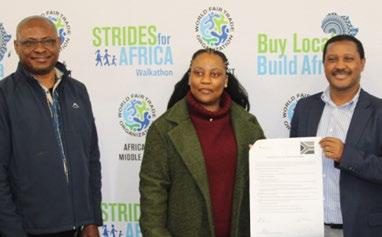
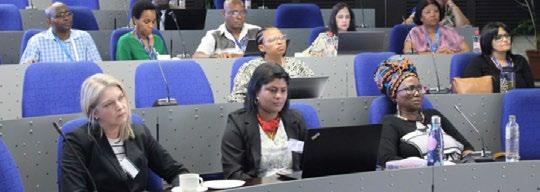
The flavours of Italy and South Africa came together in a rich cultural exchange when CPUT’s Department of Biotechnology and Consumer Science hosted the Italian Embassy in December. The gathering formed part of the 9th Edition of the Week of Italian Cuisine, celebrated during the department’s Consumer Science Seminar at the Bellville Campus, under the theme ‘Mediterranean diet and cuisine of the origins: Health and tradition’.
The event welcomed an esteemed delegation including Prof Luca Tiano, Scientific Attaché of the Italian Embassy; Prof Cristina Angeloni from the University of Bologna; Alderman Eddie Andrews, Deputy Mayor of CoCT; and Consul Giulio Mignacca. Representatives from the Directorate: SIP, DFST, Agriculture, and the Cape Town Hotel School also joined the event, fostering collaboration and cross-cultural exchange.
Lecturer Ms Madidimalo Tshikovhi said the seminar underscored the value of indigenous diets in promoting healthier, culturally relevant, and sustainable eating habits, in contrast to globalised Western patterns. It also aimed to
nurture potential partnerships between CPUT and Italian universities, exploring opportunities for joint publications, curriculum exchange, and interdisciplinary research. Prof Angeloni’s keynote, ‘The Mediterranean diet: An ancient secret to health and well-being’, celebrated the wisdom of time-tested dietary habits.
Contributions from Mrs Pauline Koen, Mrs Theloshni Govender, and Mrs Mmabatho Mobo examined food and curriculum decolonisation, while Dr Anthony Obilana’s DFST-led project highlighted the nutritional and cultural value of incorporating South African indigenous ingredients and bioactive compounds into popular snacks.
Guests were treated to an array of flavours from both Italian and South African culinary traditions – from amasi, umphokoqo and idombolo, to pasta and other Mediterranean favourites. Prof Jessy Van Wyk reflected on the day, praising the “spirit of oneness” within the department and the innovative, collaborative energy that shaped the event.
Launch of the CPUTFF campaign, with signing of the ‘10 Principles of Fair Trade’
Workshop participants from CPUT and Italian universities
Guest lecture on integrating technology into the food industry
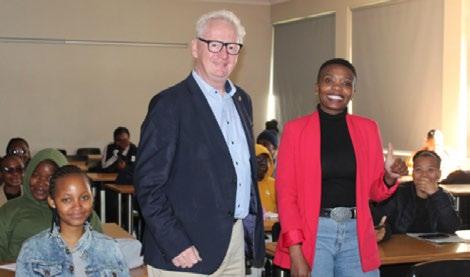
DFST hosts evening lecture on AI and food security
In December, the South African Association of Food Science and Technology (SAAFoST), in collaboration with CPUT’s Department of Food Science and Technology (DFST), held its second evening lecture of the year. The event, attended by over 40 participants including academics, students, and industry professionals, began with a guided tour of the university’s state-of-the-art food production pilot plant. Visitors explored the chocolate factory and microbrewery, with a small beer tasting adding to the convivial atmosphere.
The keynote address was delivered by Prof Muhammad Nakhooda, FAS’s Coordinator: T&L. His thoughtprovoking presentation titled, ‘From ploughs to pixels: AI in our technology continuum towards achieving food security’, took the audience on a journey through the history of food technology, examining how AI is already shaping – and will increasingly influence – global food security, both on Earth and potentially beyond. Central to his discussion were new protein technologies and the role AI plays in unlocking their potential. Prof Nakhooda explored de novo (novel) proteins, which can now be designed to serve a vast array of applications, noting how AI has opened up new possibilities by solving complex protein structures and functions.
The Department of Food Science and Technology (DFST) coordinated an engaging guest lecture in September, featuring a thought-provoking presentation by Prof Josef Gochermann, a professor of Marketing and Technology Management at Osnabrück University of Applied Sciences, Germany. The event, held on the Bellville Campus, centred on creating a platform for meaningful interactions, and aimed to give students and staff insights into the role of technology in the food sector.
Prof Gochermann’s presentation, ‘The role of technology in the food market’, linked closely with AI-related research led by DFST lecturer Dr Sune Henning, who had met him earlier in the year at the Dual Higher Education Project seminar. He compared technologies in CPUT’s pilot plant and labs with the latest industry developments, with students actively engaging through the interactive tool SLIDO.
DFST lecturer Dr Lusani Vhangani noted that the collaboration with Osnabrück University, supported by an MoU, began with that university’s Faculty of Agricultural Sciences and Landscape Architecture and has since expanded to technology management and marketing programmes.
Dr Vusi Mshayisa, DFST lecturer, researcher and SAAFoST member, highlighted the value of such events for keeping the department and students at the forefront of industry developments. “It is crucial for the DFST to collaborate with industry and students in this fashion to stay abreast of developments,” he said. The evening demonstrated the department’s ongoing commitment to fostering innovation, engaging with the broader food science community, and building strong academic–industry connections.
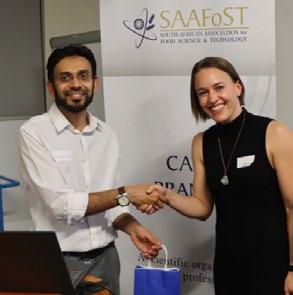
Prof Muhammad Nakhooda with Ms Melvi Todd of SAAFoST
Prof Josef Gochermann and Dr Lusani Vhangani with students who attended the guest lecture
Integrating indigenous knowledge into academic pursuits
Heritage Day at CPUT once again became a vibrant celebration of tradition, innovation and learning in October – this time shining a spotlight on the integration of indigenous knowledge into academic practice. FAS hosted the event on the Bellville Campus under the theme ‘Showcasing indigenous knowledge and its integration into the academic pursuits of the FAS’.
Presentations spanned a rich spectrum of topics. Prof Jessy Van Wyk and Ms Melissa Rossouw introduced the Indigenous Knowledge Documentation Centre, while Dr Vusi Mshayisa and Ms Tina Bebe from DFST explored the nutritional richness of traditional edible insects such as Mopani worms, Madzhulu, and Thongolifa. High in protein, minerals, and amino acids, these delicacies provide a sustainable alternative to conventional sources. Their department is also researching novel insects, including mealworms, crickets, and black soldier flies, to address food security challenges.
Dr Kanyisa Maqashu from the Department of Chemistry spoke on the alarming extinction of plant species – from fruits and vegetables to
medicinal plants – warning of the health and sustainability threats posed by reduced biodiversity. “We must blend indigenous knowledge with modern science to preserve these plants and integrate traditional ecological wisdom into sustainable practices,” she urged.
Other contributions included Ms Sibusiso Xego from Horticultural Sciences, who discussed partnerships with Western Cape traditional healers and small-scale farmers; Ms Athembile Centane and Ms Nkcubeko Masents from Biotechnology and Consumer Sciences, who examined the scientific validation of indigenous health remedies; and Dr William Manamela from Mathematics and Physics, who presented on indigenous knowledge in mathematics. The Department of Conservation and Marine Science also shared insights through its presentation, ‘Guardians of the ocean: A tale of tradition and science’. A panel discussion, facilitated by Dr Ignatius Ticha, FAS’ Language Coordinator, concluded the day by exploring perspectives on embedding indigenous knowledge into CPUT’s curriculum and language practices.
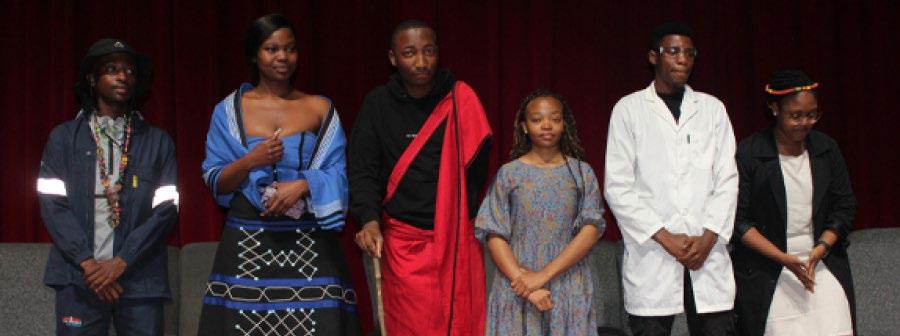
Success for edible insect research
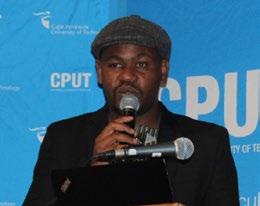
In October, Dr Vusi Mshayisa from the DFST received the NRF’s prestigious Y2 rating. Having graduated cum laude for both his NDip and BTech degrees from CPUT, Dr Mshayisa is the first successful graduate of the institution’s new Doctor of Food Science and Technology programme. His academic foundation is further strengthened by an MSc in Food Technology from Wageningen University and an MTech in Food Science and Technology from CPUT.
Dr Mshayisa’s research focuses on proteins derived from Black Soldier Fly larvae as a sustainable alternative to traditional animal-based proteins. Using advanced analytical tools, he has investigated their nutritional, functional, and structural properties, contributing innovative solutions to global food security challenges. “The NRF Y2 rating is more than recognition; it’s a stepping stone for future research and collaborations,” he said, expressing hope that his work would inspire further exploration of insects as sustainable food sources.
Dr Vusi Mshayisa of DFST
Another vibrant Heritage Day celebration at CPUT

FACULTY OF BUSINESS & MANAGEMENT SCIENCES
DEAN’S REPORT
PROF PAUL GREEN
[up to July 2024]
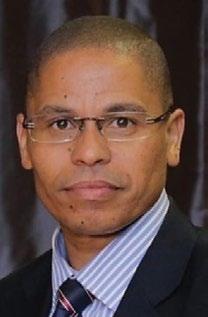
PROF RENITHA RAMPERSAD
[from July 2024]
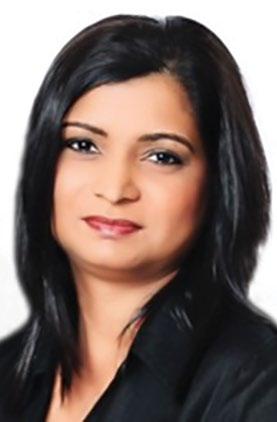
Introduction
The Faculty of Business & Management Sciences (FBMS) continues to make good progress, and this report captures the scope, depth and impact of the research and activities undertaken across the faculty in 2024. FBMS remains committed to fostering a research culture that supports critical thinking, innovation and meaningful engagement.
The faculty enrolled 319 postgraduate students in 2024. A total of 51 students graduated – 40 master’s and 11 doctoral – at the April and December ceremonies, eight of whom were FBMS staff members.
FBMS is home to four established research centres aligned with CPUT’s Institutional Focus Areas 5: Human, Health & Social Dynamics and 6: The Digital Society. These include the Centre for Tourism Research in Africa (CETRA) within the Department of Tourism and Events Management, the Centre for Sport, Business & Technology Research (CSBTR) in the Sport Management Department, the Business Innovation & Incubation Centre (BIIC) based at the Graduate Centre for Management, and the Brand & Digital Research (BDR) Hub in the Department of Marketing. Each centre continues to contribute to high-quality, impactful research at both national and international levels, and is featured in the FBMS Showcasing Research booklet, produced to showcase the quality, relevance and impact of our work.
Several conferences were successfully hosted by FBMS in 2024. These events provided important platforms for interdisciplinary dialogue, sharing innovative research, and strengthening networks among academics, industry partners, stakeholders and postgraduate students.
This report highlights the scholarly activities of the faculty and provides a comprehensive overview of the initiatives, achievements and developments of 2024. FBMS acknowledges the contribution of our academic staff and extends sincere appreciation for their dedication to advancing research.
Launch of the Showcasing Research booklet
Stakeholder collaboration on research activities
Please note that more information about this faculty’s 2024 research activities can be found in the Focus Areas section of this Research Report
FOCUS AREA 5
Human, Health & Social Dynamics
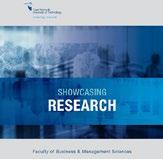
The Showcasing Research booklet was launched in 2024 to highlight research capabilities and initiatives across the faculty. It reflects our commitment to advancing knowledge, fostering innovation and addressing societal challenges in alignment with the UN’s SDGs, while displaying the diverse expertise of our staff.
Research centres
Please refer to the Focus Areas section of this Research Report for details of the FBMS research centres. The page numbers for each centre are listed on this page.
Through a mutually beneficial collaboration with the Cape Town Carnival, CETRA along with the Sport Management Department and the University of the Free State have been involved in a longitudinal study since 2022 examining the impact of cultural events in Cape Town. This project has produced journal articles and international conference presentations, while also providing students with valuable research experience and skills development.
Renewal of international partnerships
In 2024, partnerships with Moscow State University in Russia and SBR in India were renewed and new MoUs signed.
New international partnerships
New MoUs were also signed with Shenandoah University in California and St Augustine University in Tanzania, in line with FBMS’s strategic intent. Negotiations are ongoing with Jain University in India, the Project Management Institute of South Africa, African Bank and the University of North Carolina in the USA.
FOCUS AREA 6
International mobility, partnerships, collaborations and visits
Prof Rampersad, Acting Dean of FBMS, travelled to India to explore areas of collaboration. Meetings included the VC Dr Easwaran Iyer, His Excellency Dr Roger Gopaul (High Commissioner of the Republic of Trinidad and Tobago), and Dr A Sharmila, Head of the School of Commerce. This visit strengthened partnerships and MoUs and led to an agreement with Jain University to host a joint conference on ‘Circular Economy and Artificial Intelligence for Sustainable Futures’ on 2–3 December 2024 in Bangalore. FBMS representatives, including Prof Rozenda Hendrickse and Prof Visvanathan Naicker, formed part of the organising committee.
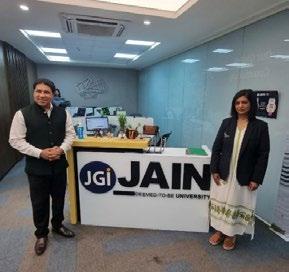
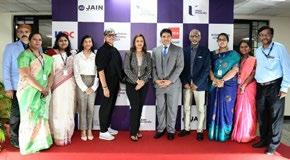
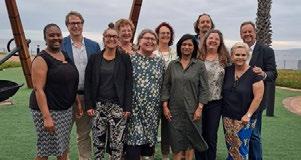
Representatives from FBMS also attended the 2024 International Conference for Education and Fairs (ICEF) Africa in Kigali in Rwanda, while the faculty hosted delegations from the University of Johannesburg and Lund University during the SANORD Conference in Cape Town. These meetings explored new opportunities for research collaboration and exchange.
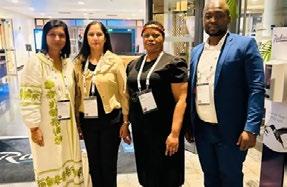
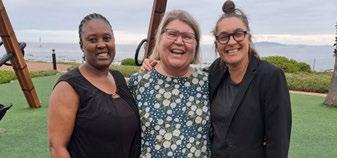
FBMS welcomed around 30 international exchange students for short and full semester visits, while 26 of our students studied at partner universities. In addition, 12 international scholars, including research methodology expert Prof Mark Saunders, visited FBMS, while staff engaged in mobility programmes at partner universities. FBMS and the Directorate: SIP also hosted a senior delegation from DHBWRavensburg, Germany, including its president. The visit included strategic meetings and a cultural township tour.
His Excellency Dr Roger Gopaul with Prof Renitha Rampersad
Organising team with His Excellency Dr Roger Gopaul, Prof Rozenda Hendrickse and Prof Visvanathan Naicker
Prof Rampersad and Dr Zwakala, with Dr Singh and Dr Maleka of Directorate: SIP
Dr Dube, Prof Eksell, Dr West, Prof Benecke, Dr Mansson, Prof Rampersad and Prof Wiggell with UJ colleagues
Dr Dube, Dr Mansson and Dr West
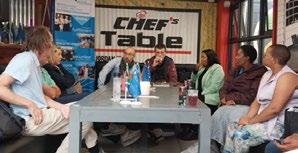
Capacity building: Faculty-hosted presentations and workshops
All FBMS research initiatives are aligned with CPUT’s Vision 2030: One Smart CPUT, which prioritises a supportive and inclusive research environment for both staff and postgraduate students.
The faculty places strong emphasis on capacity building. Two online research workshops are presented weekly to support postgraduate students, while the Master’s Advancement Programme saw nine staff members graduate in 2024. The Doctoral Advancement Programme, launched in 2023, continues to grow, with one staff member graduating in 2024.
Numerous webinars covered topics such as ‘How to use AI ethically’, ‘AI-driven tools’, and ‘Publication matters: Writing for publication’. An Autumn Research School was hosted for postgraduate students, with sessions on methodology, proposal development, ethics, data management and AI writing tools. Dr
Faeda Mohsam shared her doctoral journey, offering an inspiring reflection on resilience and perseverance.
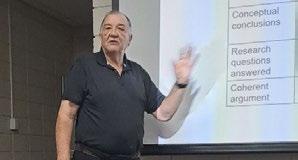
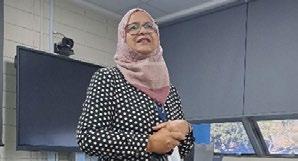
Prof Mark Saunders of the University of Birmingham in the UK returned to CPUT in 2024 to deliver a series of insightful lectures on research design, systematic reviews, philosophies and qualitative methods. He also supported DAP students and contributed to the Sisonke Supervision Mentorship Programme, where he explored the often-overlooked challenges researchers encounter when seeking access to
participants, sites or data, and offered practical guidance on navigating these complexities effectively.
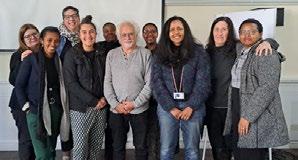
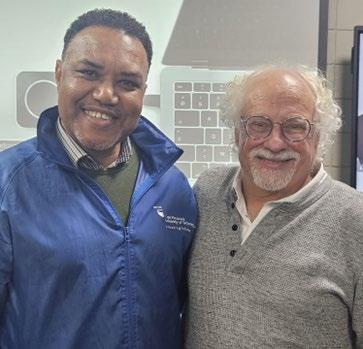
Prof Saunders and Dr West with doctoral students from CTHS, Sport Management, and Tourism & Event Management
Mr Henry Esau (DAP student and staff member) and Prof Saunders
Prof Andre de la Harpe presenting at the Autumn Research School
Dr Faeda Mohsam sharing her journey with the postgraduate students
Ms Mrasi with colleagues from DHBW-Ravensburg
Adjunct professors
In 2024, FBMS appointed five adjunct professors: Prof Gerrie Du Rand, Prof Ravinda Rena, Prof Darry Penceliah, Prof Dorothea Visser and Prof Kamilla Swart. These distinguished academics provide vital support in research collaborations, student supervision, workshops, mentoring and publications.
Faculty-hosted conferences
CETRA hosted the 7th International Conference on Tourism Research (ICTR) at the Cape Town Hotel School in March, attracting delegates from 22 countries.
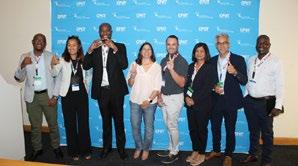
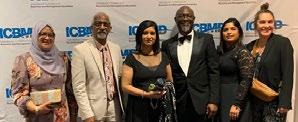

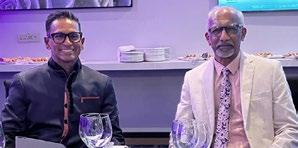
The 10th International Conference on Business and Management Dynamics (ICBMD), held in September, focused on ‘Economic inequality and the industrialisation of developing countries: Challenges and solutions’. Marking its 10th year as South Africa’s most partnered international conference, it included a new postgraduate colloquia track led by UK-based Prof Mark Saunders.
Faculty Research Achiever Awards
The FBMS Achiever Awards 2024, hosted at the Cape Town Hotel School, recognised outstanding research by staff and students. Guest speaker Prof Ross Tucker, a renowned sports scientist, shared insights into the societal impact of research, while Prof Balkaran, DVC: Learning & Teaching, emphasised the importance of ethics.
Awards presented included:
• Research Department of the Year: Marketing
• Emerging Researcher of the Year: Dr Jaron Ras
• Supervisor of the Year: Prof Michael Twum-Darko
• Top Doctoral Student: Dr Awonke Geqeza
• Top Master’s Student: Ms Jamie-Leigh Bruce
• Top Master’s Student: Ms Madelynn Gordon
Dr Mhlanga, Prof Khoo (Torrens), Prof Ezeuduji (Zululand), Prof Swart (Hamad Bin Khalifa), Prof Hattingh-Niekerk, Prof Rampersad, Mr Toefy (Western Cape Government) and Prof Dube (VUT)
Dr Mohsam, Prof Naicker, Prof Rampersad, Prof Twum-Darko, Dr Deonarain and Dr West
Prof Twum-Darko and Ms Mrasi with Dr Johnson of UWC
Guest Speaker Mr Ragavan Moonsamy with Prof Naicker
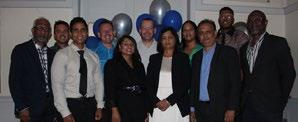
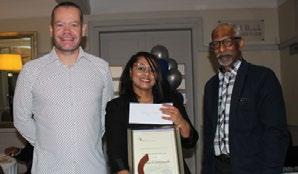
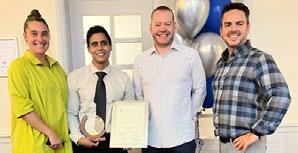
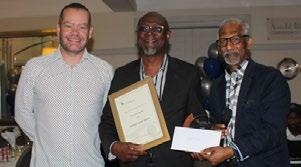
FBMS NRF-rated researchers
FMBS proudly hosts seven NRF-rated researchers:
• C2: Prof Brendon Knott, Prof Rodney Duffett
• C3: Dr Sacha West, Prof Michael Twum-Darko, Prof Vicky Naicker, Prof Simeon Davies
• Y2: Dr Janice Hemmonsbey-Lodewyk
FBMS Emerging Researcher Conference
The 2024 Emerging Researcher Conference, held at the Cape Town Hotel School in March, brought together Advanced Diploma, Postgraduate Diploma, master’s and doctoral students for the first time. The theme was ‘Exploring new frontiers: Emerging researchers in social science’. The event was highly successful, with students delighted to have the opportunity to present their projects. Prizes were awarded across diploma, master’s and doctoral categories, recognising both proposals and full research projects.
The following students received prizes:
Advanced Diploma Proposal
• 1st prize: Ms Chesnay Koeries, Ms Asavela Njikelana, Ms Amahle Ngqingo, Ms Taïna Bezuidenhout (Human Resource Management)
• 2nd prize: Mr Carlo Johannes (Public Administration and Governance)
Advanced Diploma Full Project
• 1st prize: Ms Masindi Mavhana (Marketing)
Postgraduate Diploma Proposal
• 1st prize: Ms Simbongile Nqoko (Marketing)
• 2nd prize: Ms Mahlape Abigail Tsolo (Entrepreneurship)
Postgraduate Diploma Full Project
• 1st prize: Ms Mihlali Chasiwe, Mr Masibulele George, Ms Nataléé Moses, Ms Morapeli Raithule, Ms Refiloe Veronica Tsoliwe, Mr Tristen van Rensburg (Supply Chain Management)
Master’s or Doctoral Degree Proposal
• 1st prize: Ms Michelle Mopp (Doctor of Public Administration)
• 2nd prize: Ms Lucinda Bronwyn Arulappan (Doctor of Business & Management Sciences: Tourism Management)
Master’s Degree Full Study
• 1st prize: Ms Boitumelo Sephaka (Marketing)
• 2nd prize: Mr Abenathi Ntelezi (Master of Business & Management Sciences: Tourism Management)
Prof Tucker, Prof Twum-Darko and Prof Naicker
Prof Naicker, Prof Knott, Dr Ras, Prof Duffett, Ms Gordon, Prof Tucker, Prof Rampersad, Ms Bruce, Prof Balkaran, Dr Geqeza and Prof Twum-Darko
Prof Ross Tucker, Ms Madelynn Gordon and Prof Visvanathan Naicker
Dr West, Dr Ras, Prof Tucker and Prof Knott
Doctoral Degree Full Study
• 1st prize: Ms Fiina Shimaneni (Doctor of Human Resource Management)
• 2nd prize: Ms Lindi Sindelo (Doctor of Public Administration)
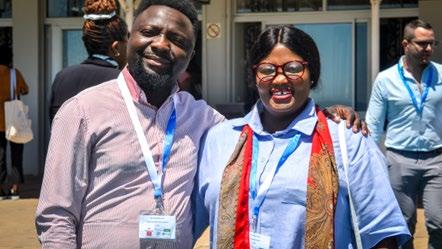
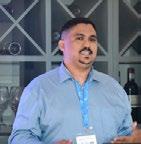

Marketing Department Research and Engagement Highlights
10th ICBMD Conference
“In teams, we win” – this departmental mantra was clearly demonstrated when Prof Rodney Duffett presented four papers on behalf of his master’s students at the 10th ICBMD Conference, held in the North West Province, South Africa in September. With a strong digital focus, the research presented explored topics including Google Shopping Ads, emoji digital marketing, social media marketing by rugby clubs, and social media use among healthcare-based NPOs.
Prof Duffett also chaired the panel discussion ‘Service brands dominance in the digital era: Is branding a panacea to market competitiveness and profitability?’ with Dr Kuhle Zwakala serving as a panellist. The discussion addressed how digital platforms can enhance – or undermine – the influence of branding in service sectors, how technological advancements shape branding strategies in a competitive digital landscape, and the challenges of applying personalised marketing while respecting privacy concerns. Other topics included the growing role of external content creators and customer-generated content in shaping brand perceptions, and how these elements can be leveraged for competitive advantage.
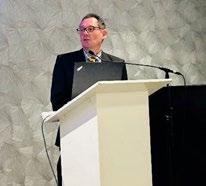
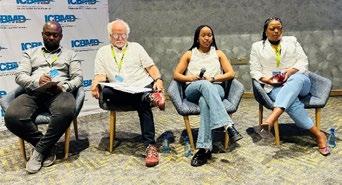
Mr Nday Wanumbi and Ms Mahlape Abigail Tsolo
Mr Carlo Johannes Ms Lindi Sindelo
Moderator Chair: Prof Rodney Duffett
Panel members: Dr Kuhle Zwakala, Prof Mark Saunders, Ms Faith Zembe and Ms Andiswa Mrasi
FBMS Emerging Researcher Conference winners
The Marketing Department takes pride in its responsibility to nurture the next generation of researchers. Our students excelled at the annual FBMS Emerging Researcher Conference, themed ‘Exploring new frontiers: Emerging researchers in social sciences’. They made a clean sweep, taking top honours in every category entered.
The following students were awarded first place in their respective categories:
• Ms Masindi Davhana: Full Study Advanced Diploma category – demonstrating exceptional research capabilities and deep subject understanding
• Ms Simbongile Nqoko: Proposal Postgraduate Diploma category – recognised for her innovative approach and well-prepared research proposal
• Ms Boitumelo Sephaka: Full Study Master’s category – reflecting her comprehensive research and meaningful contributions to her field

Strategic Brand Management Service-Learning Project: Research and Brand Audit
Under the guidance of Dr Pieter Steenkamp, the Postgraduate Diploma in Strategic Brand Management class developed brand strategies for six businesses: Siza Eyewear (Khayelitsha Mall); Make It Happen Apparel (Zonnebloem); Essence of the Middle East at Kaders Hair and Cosmetics (Cape Town); KC107.7 (Paarl); Groot Constantia (Constantia); and Moses Coffee Shop (V&A Waterfront). The process included qualitative data gathering within each business to conduct a brand audit, supported by the use of an AI-enabled app.
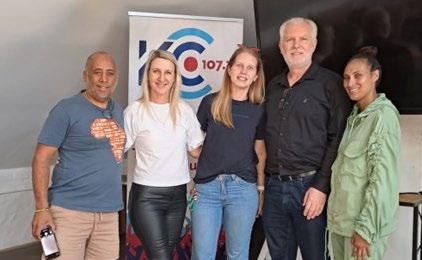
Ms Simbongile Nqoko, Ms Masindi Davhana, Ms Boitumelo Sephaka, with their supervisor Prof Rodney Duffett
KC107.7 meeting: Dr Harlan Cloete (Chair), Ms Michelle Sieberhagen (KC DJ/announcer), Ms Sarah Versfeld (marketing student), Dr Pieter Steenkamp (lecturer), and Ms Lana Fortune (marketing student)
FUNDING
* Excluding Postdoctoral Funding and Postgraduate Bursaries
RESEARCH OUTPUT
Postgraduate degrees obtained by staff
PhD in Chemistry
University of Johannesburg
Oke O
‘Developing a performance evaluation model integrating the accounting and value-based management models for industrial companies’
PhD in Informatics
CPUT
Nchu R
‘A framework for developing entrepreneurial skills in the fourth Industrial Revolution for Information & Communication Technology (ICT) Technical Vocational Education and Training (TVET) students’
PhD in Informatics
CPUT
Okoli NJ
‘A sustainable information system framework for the adoption of a smart water meter system’
PhD in Sport and Exercise Science
University of the Western Cape
Ras J
‘Relationship between cardiovascular health metrics and risk profile, musculoskeletal health, physical fitness and occupational performance in firefighters’
Doctor of Business Informatics
CPUT
Ngary Ndzaluya C
‘The application of big data analytics to improve students’ performance in South Africa’
Doctor of Commerce Internal Auditing
CPUT
Makumbe M
‘Independence and performance of internal audit functions within Zimbabwean state universities’
Doctor of Public Administration
CPUT
Deonarain M
‘The quality of work life of frontline healthcare workers that affect service delivery at selected hospitals in South Africa’
Doctor of Information and Communication Technology
CPUT
Nyambandi F
‘The use of social media in knowledge transfer in an innovative business environment’
Doctor of Management and Project Management
CPUT
Wilson-Trollip M
‘Artificial Intelligence as a facilitator of peer-to-peer learning: The effect on retention, performance and student belief system at a selected university in the Western Cape’
Doctor of Public Administration
CPUT
Siegelaar L
‘A community participation approach for the prevention of violent crime in the Western Cape’
MTech: Business Administration
CPUT
Ntleki S
‘Cape Town employer perspectives on government initiatives addressing graduate youth unemployment’
MTech: Business Information Systems
CPUT
Jonginamba A
‘The adoption of information and communication technology within fastmoving consumer goods SMEs within townships in the Cape Metropole’
MTech: Business Information Systems
CPUT
Ntlangula B
‘Relationship between website usability and web metrics in an educational website’
MTech: Internal Auditing
CPUT
Malapane M
‘The utilisation of performance measures by the bed and breakfast industry in the Cape Metropole’
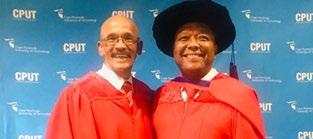
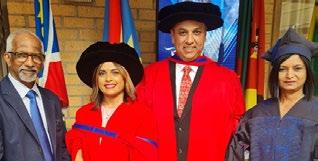
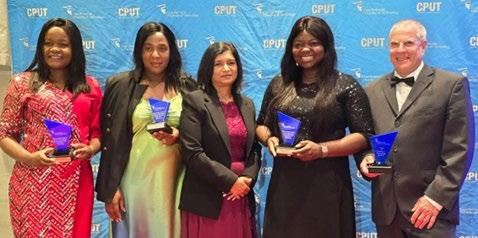
FBMS consolidates internationalisation ventures
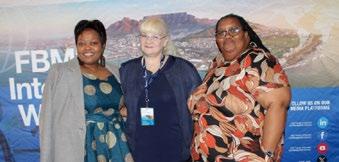
In September, FBMS hosted a three-day International Week across the Granger Bay and Bellville campuses, highlighting the central role of internationalisation in higher education. The event brought together the Directorate: SIP, national and international academic and industry partners, and government representatives, both in person and online. One of the highlights was a workshop on Collaborative Online International Learning (COIL), presented by Dr Pieter Steenkamp from the Department of Marketing and Mr Simon Kavanagh from Kaospilot, Denmark. Industry partners included ABSA, Sea Harvest, and the South African Institute for Government Auditors, with government representation from the City of Cape Town and the Western Cape Provincial Government.
“Internationalisation opens new vistas of thinking, knowing, and doing that no theoretical learning can offer,” said Prof Desiree Scholtz. She emphasised that FBMS maintains partnerships in the Euro Zone, BRICS countries, Africa and Canada, with agreements signed regularly, and that the benefits extend well beyond academic outputs. “Personal engagement results in long-standing partnerships between departments and our faculty.” The programme included institutional overviews from CPUT, UWC, the Polytechnic University of Porto, and UNISA. Chair of the Organising Committee, Ms Andiswa Mrasi, explained that International Week is an annual platform for international education practitioners to engage on key topics, advance the discipline, and share best practices.
Dr Cronje and Dr Lesley Siegelaar
Prof Naicker, Dr Deonarain, Dr Christoper and Prof Rampersad
Dr Makumbe, Dr Ngary Ndzaluya, Prof Rampersad, Dr Okoli Nwakego and Dr Wilson-Trollip
Personal engagement results in long-standing partnerships being formed IN THE NEWS
Marketing Department lecturer shines at FBMS Achievers’ Awards FBMS Emerging Researcher Conference reaches record high
Passion, dedication, and a deep commitment to student success have earned Marketing Department lecturer Prof Rodney Duffett triple honours at the 2023 Faculty of Business and Management Sciences (FBMS) Achievers’ Awards. At this glittering ceremony, which was held at the Cape Town Hotel School in March, Prof Duffett won the Teaching Excellence Award, the Researcher of the Year Award, and the Supervisor of the Year Award.
Prof Paul Green (Dean: FBMS) opened the event with a warm welcome to all guests, including Dr David Phaho (DVC: RTIP), Prof Rishidaw Balkaran (DVC: T&L); assistant deans; HoDs; awardees; and guest speaker, Prof Linda Ronnie (UCT’s DVC: T&L). In his opening address, Prof Green noted that the event recognised “excellence in three vital areas: research, teaching, and administration”. He added, “These awards are a testament to the relentless pursuit of excellence and unwavering commitment to the advancement of
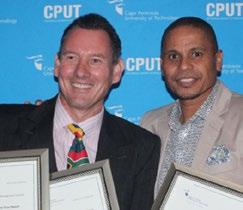
knowledge and education.” The selection process, he said, was rigorous, fair, and transparent.
Reflecting on the recognition, the modest Prof Duffett said, “I was very humbled and surprised, especially in terms of the research awards, as I felt that there were others in FBMS who may have had a better year than I did in terms of research supervision and output.”
He said he finds immense fulfilment in seeing his postgraduate students succeed in their research, and believes in total commitment to his work. “Provided you do it as if working for the Lord (Colossians 3:23–24), it is possible to achieve anything,” he shared. “My faith plays a fundamental part in who I am and is the major driving force behind my success.” Prof Duffett was quick to acknowledge the many excellent staff in the Marketing Department, FBMS, and across CPUT, saying he is inspired by their efforts and dedication.
All awardees received certificates and monetary grants for work-related purposes. The list of winners included:
• Research Department of the Year: Tourism and Events Management
• Researcher of the Year: Prof Rodney Duffett
• Emerging Researcher of the Year: Dr Christiaan Hattingh-Niekerk
• Supervisor of the Year: Prof Rodney Duffett
• Top Doctoral Student: Dr Maritsa Grewe
• Top Master Student: Ms Rentia van Heerden
• Runner-Up Master Student: Mrs Ilanza Perold
• Admin Assistant of the Year: Ms Lungiswa Antonie
• Secretaries of the Year: Ms Nicole Arendse and Ms Fazeela Salie
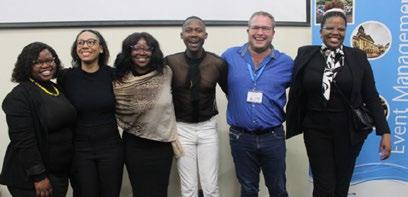
2024 FBMS Emerging Researcher Conference reached new heights in November, attracting around 150 delegates to the Cape Town Hotel School under the theme ‘Exploring new frontiers: Emerging researchers in social sciences’. The annual event aims to enhance networking, collaboration, and research skills among FBMS students while building confidence in public speaking. Director of the Cape Town Hotel School, Dr Oswald Mhlanga, said the conference sought to advance theories in business and management sciences and challenge scholars to “reveal, share, question, critique, develop, and rethink management ideas”. Twenty-eight studies were presented, including ten Advanced Diplomas, four Postgraduate Diplomas, five master’s degrees, and nine PhD projects.
Platinum sponsorship came from Afrogem and Aquila Private Game Reserve, while gold sponsors included Europcar, Cape Town Tourism, Southern Sun City Lodge Hotel, Emerald Publishing, and FBMS. Keynote speaker Prof Nkosivile Madinga, Deputy Dean of Research at UCT, addressed topics from social media advertising’s impact on Generation Z and Y to ethical leadership, halal food tourism, and AI in higher education. He encouraged attendees, “Your research, your voice, and your journey matter. The road won’t always be easy, but it will be worth it.” Co-chair Dr Chris Hattingh-Niekerk praised the energy of the event, saying, “If research excites FBMS students this much, we are on the right path at CPUT.”
The
Prof Rodney Duffett (Marketing Department) and Prof Paul Green (Dean: FBMS)
Students from the Advanced Diploma in Operations Management: Ms Nthabiseng Dlamini, Ms Nonkosikhona Mdike, Ms Lesedi Sepotokele, Mr Phumlani Ngcobo, Dr Juan-Pierré Bruwer (lecturer and supervisor) and Ms Lethabo Tshukudu
BIWA holds inaugural international conference
The Business Incubation Web Association (BIWA) hosted its first annual international conference on business and innovation in November at NMMU in Gqeberha, chaired by Dr Thobekani Lose. The event marked a milestone in BIWA’s mission to foster entrepreneurship, incubation, and innovation across South Africa. The association is a partnership between NMMU, WSU and CPUT, formalised by an MoU in 2023. “This partnership underscores the shared commitment to driving entrepreneurial and innovative advancements aimed at socioeconomic growth,” said Prof Driekie Hay-Swemmer, Executive Director: Office of the VC.
CPUT’s strong representation included Prof Hay-Swemmer, Prof Dina Burger (Director: DRD and Acting Director: SIP), alongside FBMS staff members Mr Chris Cupido (HoD: Entrepreneurship) and Ms Andiswa Mrasi (FBMS’ Manager: SIP). Entrepreneur and BIIC member Mr Sivuyise Mbedla was also a speaker. Discussions explored entrepreneurship’s role in achieving the UN’s SDGs with a focus on poverty alleviation, reducing inequality, fostering economic growth, and stimulating industry innovation. “FBMS is proud to have contributed to the success of this historic event… The university reaffirms its commitment to entrepreneurship, innovation, and strategic partnerships as drivers of sustainable socioeconomic development,” said Ms Mrasi.
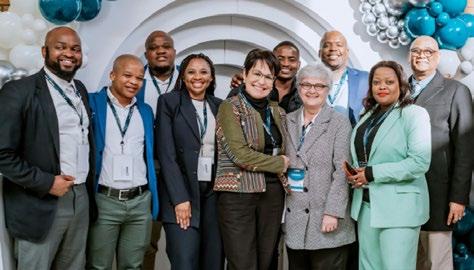
CPUT partners with community radio station for regional development
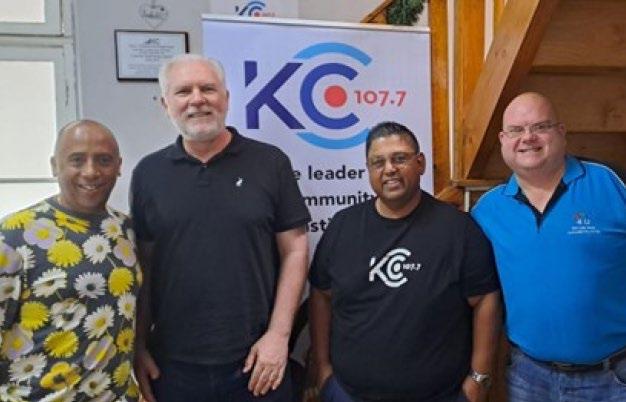
CPUT and Radio KC have entered a strategic partnership to drive knowledge exchange and skills development in the Greater Paarl Valley. The initiative includes student placements, service-learning projects, research collaboration, and joint branding efforts. It also aims to explore the monetisation of the Radio KC brand and promote UN SDG 16: Peace, Justice and Strong Institutions. Its focus is on promoting peaceful and inclusive societies, providing access to justice for all, and building effective, accountable, and inclusive institutions at all levels.
CPUT Marketing Department students will gain hands-on experience in media and community engagement, while Radio KC will benefit from academic insights into branding and communication strategy. “This partnership allows us to bring fresh perspectives to our listeners and provides meaningful opportunities for future media professionals,” said Radio KC Chair Dr Harlan Cloete. Dr Pieter Steenkamp and Dr Kuhle Zwakala, senior lecturers in the Marketing Department, described the initiative as aligned with Vision 2030 and a model for university–community collaboration.
Mr Thabo Mashego, Mr Phumlani Roto, Mr Siyasamkela Vutula, Ms Xolelwa Olayi, Prof Driekie Hay-Swemmer, Prof Thobekani Lose, Prof Dina Burger, Mr Christopher Cupido, Ms Andiswa Mrasi and Mr Lwandile Socikwa
CPUT and Radio KC partner to advance knowledge exchange and skills development

FACULTY OF EDUCATION
DEAN’S REPORT
PROF ANDILE MJI
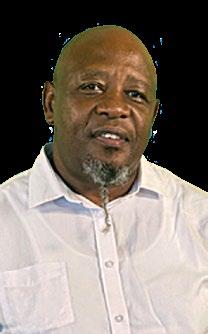
Introduction
The Faculty of Education at CPUT is home to a community of dedicated specialists committed to preparing future-fit, reflective teachers who are responsive to the diverse and inclusive realities of the South African educational landscape. With campuses in Mowbray and Wellington, the faculty offers a comprehensive suite of qualifications, from the Diploma in Grade R Teaching to the Doctor of Education degree, including Bachelor of Education programmes across all teaching phases and the Postgraduate Certificate in Education (PGCE) for graduates entering the teaching profession. While our core mission is to advance quality teacher education, we are equally committed to building a robust culture of research that contributes meaningfully to educational theory and practice. This report highlights the faculty’s ongoing efforts to strengthen research productivity, foster national and international collaborations, and support academic excellence through funded projects, awards, and capacity development initiatives.
Faculty Research Awards Plan
The Faculty of Education is committed to enhancing its research production and outputs. Studies show that research awards are an effective way to foster a culture of excellence, motivate researchers, and enhance both research output and impact. Through the awarding process, academic staff receive important recognition and visibility for their research achievements and leadership. This recognition often leads to further opportunities, including securing research funding, collaborations, and promotions.
Please note that more information about this faculty’s 2024 research activities can be found in the Focus Areas section of this Research Report
FOCUS AREA 5
Human, Health & Social Dynamics
Research Chair:
Institute for Teacher Education and Society (GITES) (NRF SARChI Chair) 232
Research awards serve as a critical measure of the quality of the faculty’s scholarship. They help shape the faculty’s reputation and rankings, contributing to a culture of excellence that attracts top academics and students. The Faculty Research Awards Plan was approved by the Faculty Board and is scheduled for implementation from 2025.
Research
activities in 2024
During 2024, researchers and academics in the Faculty of Education engaged in various collaborative research projects with national and international partners. Our collaborations span countries such as India, Japan, Belgium, the UAE, Sweden, the USA, Angola, Malawi, and Ireland.
Current research projects cover a wide range of focus areas, including STEAM (science, technology, engineering, arts and mathematics) education, vocational and adult education, communities of practice within service-learning, work-integrated learning, language and literacy, cultural-historical complexities in educational community engagement, and curriculum, teaching, and learning issues within the global economy.
Faculty staff have also participated in research supported by the provincial and national Departments of Basic Education (DBE), the Department of Higher Education and Training (DHET), other local universities, as well as through funding provided by CPUT and the NRF.
As many of these projects near completion, faculty researchers are encouraged to seek third-stream external or international funding and to apply for additional funding to expand the number and scope of future projects.
Ongoing externally funded projects (started in 2022)
Several researchers are currently working on multi-year projects initiated in 2022:
• Prof Zayd Waghid received R300 000 in NRF Young Researcher funding for the project ‘Examining remote teaching and learning in universities in response to a higher education crisis’.
• Dr Naseema Shaik secured R119 500 in Thuthuka funding for her project ‘Strengthening a transformative pedagogy through developing a children’s participatory rights framework in early childhood care and education’.
• Prof Agnes Chigona was awarded R1.2 million through the Competitive Programme for Rated Researchers (CPRR) for the project ‘Equipping pre-service teachers with digital pedagogies for the most marginalised 21st century learner’, addressing gaps identified in earlier research on digital teaching preparedness in under-resourced communities.
Internationalisation
In March 2024, Prof Hanlie Dippenaar, Dr Rolene Liebenberg, and Dr Sharon McAuliffe participated in the International Faculty Exchange Programme (IFEP) at Chandigarh University in Punjab, India. The visit was initiated by Prof (Dr) Rajan Sharma, Director of International Affairs at CU, and arranged via their International Office. The programme emphasised academic exchange, global exposure, and scholarly dialogue. The CPUT delegation engaged with scholars from South Africa (KZN), Poland, Russia, the UK, and Georgia.
Dr Shaik has also been involved in an international collaboration with the University of Gothenburg, Sweden, co-authoring a journal article submitted to the International Journal of Childcare and Policy
Prof Helen Crompton from Old Dominion University (USA) is an international collaborator on an NRF-funded project within the faculty. Alongside Prof Chigona, she co-edited the book Global Perspectives on Teaching with Technology: Theories, Case Studies, and Integration Strategies, published by Routledge in June. Contributions came from authors representing 11 countries across all continents.
Another significant collaboration involves the University of Ghent and UWC. Funded by the Global Minds Fund and the Flemish Interuniversity Council, this multi-university project, ‘Decolonial communication in higher education institutions: Exploring new frameworks’, aims to develop a decolonial negotiation programme for curriculum and pedagogical transformation. The CPUT team includes Prof Candice Livingston (lead), Prof Hannlie Dippenaar, Dr Nonzolo Titi, Ms Sibongile Xamlashe, Ms Shamiega Chaudhari, and Mr Clive Brown. Prof Livingston visited Belgium this year, and the Belgian team will visit the faculty in March next year.
Under the South Africa–Japan Joint Research Collaboration Programme, CPUT researchers have partnered with Hiroshima University and Osaka University. This R1.8 million project, ‘Equipping teachers with technological pedagogical content knowledge: A comparative study between South Africa and Japan’, is co-led by Prof Agnes Chigona (CPUT) and Prof Takayoshi Maki (Japan). The Japanese delegation visited Cape Town in March and delivered lectures, while the South African team visited Japan in October.
NRF-rated researchers
The number of NRF-rated researchers in the faculty continues to grow. Our current rated researchers include:
Prof PH Boer
Prof Z Waghid
Prof L de Sousa
Prof C Livingston
Prof ZC Sosibo
Prof JL Condy
Prof A Chigona
Adjunct professors and mentorship
During 2024, the faculty hosted two adjunct professors who co-supervised postgraduate students, mentored staff, co-authored scholarly publications, and led both local and international research initiatives. Adjunct Prof Condy and her postdoctoral fellow led the Sisonke Supervision Mentorship Programme, which benefited all CPUT faculties by enhancing supervisory capacity across the institution.
Education academics visit Chandigarh University
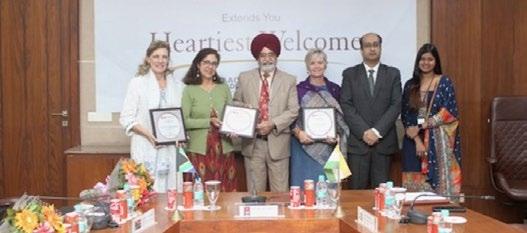
Three academics from CPUT’s Faculty of Education visited Chandigarh University (CU) in India in early April as part of an International Faculty Exchange Programme. The delegation included Prof Hanlie Dippenaar (Assistant Dean), Dr Sharon McAuliffe (senior lecturer in Mathematics, Mowbray Campus), and Dr Rolene Liebenberg (senior lecturer in Mathematics, Wellington Campus). They were hosted by Prof Rajan Sharma, Director: International Affairs at CU, and the university’s International Office.
Chandigarh University, ranked first among India’s private universities and within the QS World Rankings (771–780 for 2024), places strong emphasis on international collaboration. It regularly hosts international academics to foster critical thinking and cross-cultural dialogue.
As visiting faculty, the CPUT team taught English and mathematics to pre-service teachers and engaged with undergraduate, graduate, and master’s students. They also attended meetings exploring potential collaborations, including co-supervision of research students, joint research proposals, and externally funded projects -opportunities that extend beyond the Faculty of Education into other faculties.
The delegation expressed appreciation for CU’s hospitality and said they looked forward to strengthening ties between the two institutions.
Prof Hanlie Dippenaar, Dr Rolene Liebenberg, Prof Devinder Singh, Dr Sharon Mc Auliffe, Prof Rajan Sharma and Ms Chaahat Sharma
Empowering students to pursue excellence

Prestigious appointments
Prof Zayd Waghid spent the 2023–2024 academic year in the United States as a Fulbright South African Research Scholar, hosted by a university in New York.
The faculty also hosted a Tier 1 SARChI Research Chair in 2024. The SARChI research unit, Global Institute for Teacher Education and Society (GITES), is funded by the NRF and continues to contribute significantly to educational scholarship and stakeholder engagement across South Africa as well as internationally. In 2023, Prof Amy Stambach from the University of Wisconsin–Madison visited as a guest professor. GITES regularly hosts seminars and supports student involvement in research projects and academic conferences.
Student graduations
Dr Qiana Gray, English Language Fellow in the Faculty of Education, says her goal is to empower students to pursue excellence through inclusive, engaging, and culturally responsive learning. Dr Gray, who joined CPUT in 2023 from the United States, has taught in four countries and holds a doctorate in Reading and Literacy, as well as a master’s degree in Educational Technology and Media Design. “The fellowship serves as a collaborative platform for initiatives with the university, the faculty and students. It also seeks to strengthen ties between South African and American government exchange programmes,” she said.
Her approach to teaching avoids a one-size-fits-all model and instead focuses on creating enjoyable, safe and judgment-free spaces. She also values learning from her students, citing rich classroom discussions on topics ranging from food culture to CPR skills. Her past work includes curriculum development across South Korea, China, Venezuela and the US – including co-authoring a conversation book still used in South Korea, and launching literacy initiatives for children.
Nineteen students graduated from the faculty’s postgraduate programmes in 2024: sixteen with master’s degrees and three with doctorates. Additionally, six staff members obtained doctoral qualifications from CPUT and other South African institutions.
Acknowledgements
The Faculty of Education wishes to express its sincere appreciation to the following CPUT units for their continued support:
• DVC: Research, Technology Innovation & Partnerships
• Directorate Research Development
• RTIP-SIP
• Technology Transfer & Industrial Linkages
Postgraduate degrees obtained by staff
PhD in Education
University of Johannesburg
Buthelezi N
Family–school partnerships in supporting transitioning of learners with learning disabilities into a special class
PhD in Science Education
University of the Western Cape Van Staden VAE
Exploring storytelling as a pedagogy to enhance preservice Life Sciences teachers’ understanding of Inquiry-Based Science Education
PhD
University of Pretoria
Van As A
Exploring transactional and historical distances in History Education: An autoethnography
Doctor of Education
CPUT
Mdingi MS
A framework for integration of computerised accounting into high school accounting curriculum
PhD in Visual Arts
Stellenbosch University
Meiring J
Re-imagining learning and teaching art: Exploring embodied mark-making with foundation phase student teachers at Cape Peninsula University of Technology
Dr Qiana Gray
FUNDING
CPUT and Chandigarh establish partnership
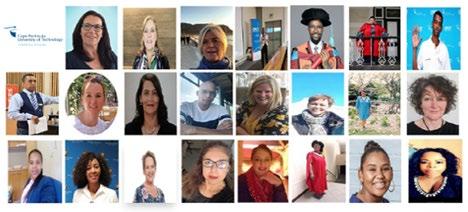
*Excluding Postdoctoral Funding and Postgraduate Bursaries
RESEARCH OUTPUT
In May, the Faculty of Education announced the start of a transnational academic collaboration with Chandigarh University in India. Mr Clive Brown, from the Intermediate Phase at Mowbray Campus, said that in an era of globalisation, international academic partnerships are crucial for inclusive learning and knowledge sharing. Mr Brown described the faculty’s visit to Chandigarh earlier in 2024 as the catalyst for this growing partnership. The goal is to bridge geographic divides and unite the academic strengths of both institutions to foster diverse learning environments.
Dean of the Faculty of Education, Prof Andile Mji, thanked the Indian team for their hospitality during the visit of Dr Rolene Liebenberg, Dr Sharon McAuliffe and Prof Hanlie Dippenaar. He noted that the collaboration offers opportunities to share teaching methods, research insights, and cultural perspectives, improving the depth of academic programmes.
Mr Brown added that such partnerships enable interdisciplinary projects that can address global challenges. “We can embark on research endeavours that transcend borders and contribute to the advancement of knowledge on a global scale,” he said. The initiative also supports the development of a global academic network and encourages the exchange of best practices. “Through meaningful engagement and collaboration, we can build a more inclusive, equitable and sustainable future for education worldwide… This partnership highlights the mutual reciprocity between both countries and institutions in advancing research across transnational spaces.”
Faces behind the new partnership, which aims to share knowledge and enrich learning
Maths maestro challenges South Africa’s fear of numbers
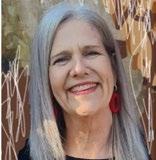
Lecturer Mrs Sandra Swanepoel is calling for a mindset shift to restore maths confidence in classrooms. She sees mathematics as not just a subject, but as a gateway to opportunity. But in South Africa, she believes it’s suffering from an identity crisis, and she’s on a mission to change this. Based at the Faculty of Education, Wellington Campus, Mrs Swanepoel is determined to dedicate the rest of her working life to reshaping how learners, parents, and teachers view maths.
Drawing on a background in public relations and a strong foundation in mathematics, she brings both strategy and passion to the challenge. “Maths in South Africa has an image problem,” she says. “Far too often, parents and teachers reinforce the idea that it’s only for clever people or those who are ‘naturally gifted’. That kind of messaging starts early and sticks.” Mrs Swanepoel believes that these negative perceptions are passed on at home and in the classroom, long before learners have the chance to discover their true potential in the subject. “When adults say, ‘I was never good at maths either’ or ‘you take after me’, they’re not being supportive – they’re unintentionally closing doors.”
This is a perspective that becomes especially urgent as South Africa confronts critical questions about school leavers’ readiness for the modern world of work. With the rise of data science, coding, engineering, and financial literacy, mathematics is a non-negotiable skill – not just for a few high achievers, but for the many. “We need to rebuild maths as something everyone can learn – not a subject for a special few.” She emphasises the importance of engagement from an early age. “Parents need to be curious about what their kids are learning.”
Mrs Swanepoel says her own career journey informs her teaching. After spending years in public relations, she returned to her roots in mathematics with fresh eyes. Now, she’s planning to pursue a PhD on the topic of ‘Changing the negative image of mathematics through positive reinforcement and strategic communication’. She believes that what maths needs is not just better methods – but better marketing. “We need to ‘rebrand’ maths as something relevant, exciting and deeply empowering,” she says. “Just like any other life skill.” Her philosophy centres on mindset. Instead of fear and avoidance, she wants young people to associate maths with creativity, logic, and possibility. “Maths teaches you how to think critically. How to solve problems. That’s the real value.”
Mrs Swanepoel is especially concerned about policies and practices that make it too easy for learners to avoid maths altogether. “We’re closing too many doors by dumbing it down or offering easy opt-outs. That has consequences – not just for individual learners, but for the country’s future workforce.” She’s calling on teachers to lead the change, not only in how they teach but in how they talk about maths. “We need to shift from fear to confidence. From ‘this is hard’ to ‘you’ve got this’… If we want a generation of problem-solvers, innovators and confident thinkers, we must start with the way we speak about mathematics. The change begins with us – educators, parents, and the system.”
CPUT
and University of
Luanda
break language barriers
In November, CPUT welcomed a group of academics from the University of Luanda, Angola for a six-week English language programme. The initiative, led by the Faculty of Education, Fundani CHED’s Language Unit, and supported by the US Embassy, aims to break down language barriers and strengthen collaboration between the two institutions. VC Prof Alfredo Buza expressed optimism about reducing reliance on interpreters in academic discussions, praising the remarkable progress participants had made. The programme forms part of an MoU signed in February 2023. Five staff members from the University of Luanda took part, including one currently enrolled in a master’s programme at CPUT.
Prof Hanlie Dippenaar said it was a privilege to host the group, which included notable figures such as Prof Juliana Canga and Prof Campos Pataca. The CPUT team included Dr Kabelo Sebolai, Prof Candice Livingston and Ms Suzan Wust, with special acknowledgement to Dr Brad Horn from the US Embassy for his additional support. Among the participants was Mr Pedro Lucas, who is completing his MBA at CPUT in 2024.
Prof Dippenaar also recognised the instrumental role of Dr David Phaho (DVC: RTIP) and Prof Andile Mji (Dean: Faculty of Education) in establishing the programme. She emphasised its potential to unlock future research opportunities despite language challenges. As part of the course, participants were exposed to authentic language use in Wellington and Cape Town, marking the start of a long-term partnership. The group is scheduled to return in March 2025 for a further six weeks to continue their studies and expand on collaborative research prospects.
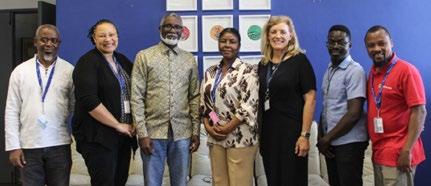
Prof Campos Pataca, Ms Akisha Pearman (US Embassy), Prof Alfredo Gabriel Buza (VC University of Luanda), Prof Juliana Lando Canga, Prof Hanlie Dippenaar, Mr Afonso Pemba Kudibanza and Mr Sebastião dos Santos
Mrs Sandra Swanepoel
American delegation visits CPUT
In May, a delegation from Indiana State University visited CPUT as part of a study tour to four South African universities. The visit aimed to provide insight into South African history and culture while exploring the diverse institutional cultures across the higher education sector, explained Dr Tasmeera Singh, Manager: International Relations in the Directorate: SIP. During their trip, the group visited three universities in the Western Cape, as well as the University of Pretoria in Gauteng. At CPUT, discussions centred on academic collaboration and shared opportunities.
Prof Hanlie Dippenaar, Assistant Dean of the Faculty of Education, said the visit served as both an introduction to CPUT’s Faculty of Education and a springboard for exploring joint initiatives with Indiana State University. “Such collaboration can enrich the educational experiences of staff and students by offering diverse perspectives and cultural insights,” Prof Dippenaar noted. “We are interested in joint projects and initiatives that foster innovation and address complex global challenges through collective efforts. Ultimately, these opportunities help cultivate a network of international scholars, graduates, and professionals, promoting cross-cultural understanding and advancing the faculty’s internationalisation priorities.”
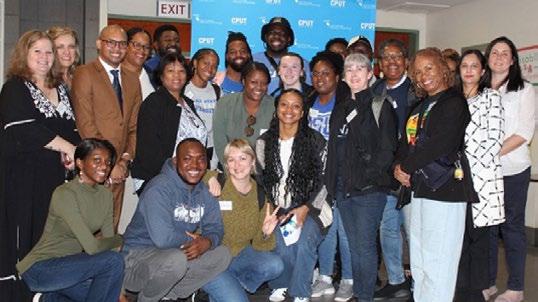
Transformational workshop on gender equality
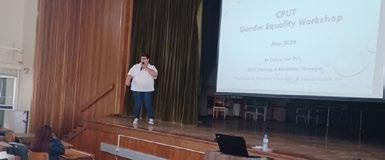
The Faculty of Education, together with the Institutional Transformation Forum, hosted a transformative Gender Equity Workshop led by Ms Delene van Dyk, a nurse and psychosexual educator, in May. “The session explored gender binaries and societal norms, offering fresh insights and challenging long-held conventions,” said Mr Clive Brown, chairperson of the faculty’s Transformation Committee.
The workshop focused on four key concepts: sex, gender, sexual orientation, and sexual pleasure. It aimed to dismantle rigid ideas around biological variance, identity, and behaviour, address heteronormativity, reduce stereotypes, and dispel pervasive myths. Targeted at intermediate student teachers, the workshop was designed to prepare future educators for inclusive, diverse learning environments. Mr Brown emphasised the importance of integrating gender studies into the teaching curriculum – a topic often overlooked in higher education – and acknowledged the efforts of Mr Byron Abrahams from the faculty’s Transformation Committee for his role in securing funding.
Ms Van Dyk, training and education manager at My Sexual Health, brought over three decades of counselling and nursing experience to the session. Mr Brown commended her ability to handle sensitive questions and provide nuanced responses on topics often considered taboo in many South African households. “Delene was excellent in navigating difficult discussions,” he said. “As a committee, we believe that behaviour change begins with informed and engaged knowledge.” He added that the workshop was a vital step towards creating an inclusive educational space and ensuring CPUT’s future educators are equipped to impact diverse classrooms.
Representatives of the Faculty of Education with guests from Indiana State University
Ms Delene van Dyk, helping prepare future educators for inclusive, diverse learning environments
Educational developer visits Kenya Lecturer explores new horizons in Mauritius
Dr Clive Brown, Lecturer and Teaching Practice Coordinator: Intermediate Phase Teaching, visited the Mauritius Institute of Education (MIE) in August, where he delivered an inspiring presentation titled ‘Post PhD: What is next?’ Dr Brown shared his journey towards achieving the significant academic milestone of submitting his doctoral thesis and his transition into becoming a scholar. The event was well attended, with enthusiastic participation from doctoral graduates and students representing MIE, UKZN, the University of Mauritius, and the University of Technology, Mauritius. This diverse audience, comprising individuals at various stages of their doctoral journeys, provided a rich context for discussions around future academic and professional pathways.
In his presentation, Dr Brown recounted the challenges and triumphs he encountered during his doctoral studies. His narrative was not only a chronicle of academic rigour but also a testament to his resilience and unwavering commitment. He emphasised the importance of perseverance, adaptability, and the support systems that played a vital role in his journey. The session also explored the opportunities available to recent PhD graduates, with Dr Brown highlighting the importance of publications in establishing an academic presence and contributing to the broader field of education. He encouraged attendees to seek out publication avenues and share their research findings with a wider audience.
Discussions also turned to the formation of an Early Career Researcher Network in education and related fields. “Such a network would provide a platform for collaboration, mentorship, and professional growth. It aims to foster a community of scholars who can support each other in navigating the complexities of academic and professional landscapes.” The interactions during the presentation reflected a shared aspiration to create a supportive and
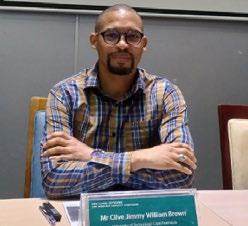
dynamic network for early-career researchers. Participants expressed strong interest in contributing to and benefiting from such a network, which Dr Brown believes has the potential to enhance research capabilities, offer mentorship opportunities, and facilitate collaborative projects across institutions.
He described his visit to MIE as more than just a presentation – “It was a call to action for doctoral graduates and students to envision and actively shape their post-PhD futures.” By sharing his journey and initiating discussion around key opportunities and networks, Dr Brown has helped pave the way for a more connected and empowered community of scholars in the field of education. “As these early career researchers continue their trajectories, the seeds planted during this event are expected to grow into fruitful collaborations and impactful contributions to the world of academia and beyond.”
As an educational developer at the Faculty of Education, Mr Clive Brown had what he described as a “profound opportunity” when he attended his first international conference, the International Consortium for Educational Development (ICED), in Nairobi, Kenya. Mr Brown presented his PhD research titled ‘Levers of change within higher education ecosystems in South Africa: Exploring the crucial role of educational developers during teaching practice’, completed under the supervision of Prof Sarasvathie Reddy at UKZN.
His presentation focused on the interdependent stakeholders involved in effective teaching practice placements. “These placements are crucial for developing studentteachers, who often hesitate to step out of their comfort zones. I explored how this ‘ecology’ of stakeholders – comprising the Department of Basic Education, placement schools, mentor-teachers, parents of learners, teacher educators, and studentteachers – needs to function cohesively to ensure success.”
Mr Brown noted that international conferences offer unparalleled opportunities to gain insight into diverse higher education landscapes. He remarked that educational developers can have a significant impact by facilitating effective teaching practices and fostering collaboration among stakeholders. For more about ICED 2024, please visit https://iced24.africa/
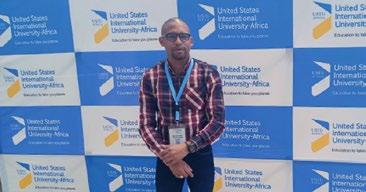
Dr Clive Brown at ICED, Kenya
Dr Clive Brown at MIE, Mauritius
Pre-service teachers shine at Mathematics seminar
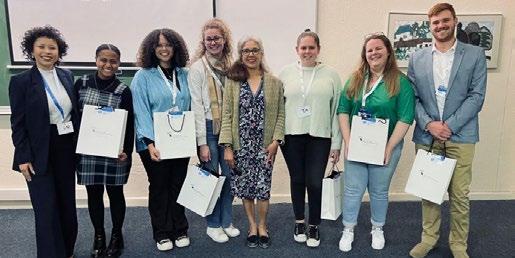
In October, aspiring mathematics educators from CPUT showcased their skills at the Mathematics Teachers as Innovators: Sharing of Practice Seminar, held at the Wellington Campus to mark World Teachers’ Day. The participants included BEd students: second-year Ms Minke Bosch and Ms Jana Louw; third-year Ms Zoe Davids and Ms Paige Booyse; and fourthyear Ms Leske Brand and Mr Benno Prins. The seminar provided a platform for teachers and subject advisors to exchange innovative strategies and best practices to enhance mathematics teaching and learning.
The event opened with a presentation on ‘Lesson Study’ – the Japanese model of teacher learning – by Western Cape Education Department Mathematics Curriculum Advisor, Ms Lisette Booys. Senior Mathematics lecturer, Dr Rolene Liebenberg, guided the students through their presentations. Ms Davids and Ms Booyse explored ‘Local and global visualisation in pictorial patterns’; Ms Brand and Mr Prins presented ‘Exploring the ellipse in the intermediate phase’; and Ms Louw and Ms Bosch demonstrated a ‘Transformational approach to geometry’.
Dr Liebenberg described the seminar as part of CPUT’s growing role in in-service teacher development. “This first-of-itskind seminar marks the start of a dynamic collaboration between CPUT and the broader teaching community, equipping educators with the skills and resources needed to meet the challenges of teaching mathematics in a rapidly evolving educational landscape,” she said.
Student Art Exhibition showcases talent and creativity
The Faculty of Education unveiled a vibrant student art exhibition at the Mowbray Campus in October, featuring more than 100 unique artworks created by Foundation Phase (Grades 1–3) and Intermediate Phase (Grades 4–6) students in 2023 and 2024. The exhibition displayed a wide range of artistic approaches – from colourful dreamcatchers and thought-provoking portraits to collaged fruits against pastel backgrounds and intricate 3D sculptures made from recyclable materials. Lecturer Dr Siphesihle Biyela, who played a central role in curating the exhibition, expressed pride in the students’ achievements – “We have taken the ordinary and made it extraordinary.”
The exhibition drew students and staff, sparking conversation and admiration for the diverse talents on display. The exhibition opening attracted attention from students and staff members, sparking conversations and appreciation for the diverse artistic talents of the student body. Fourth-year student Ms Jamey Jasson said it was exciting to be part of the art exhibition, adding that the students had grown tremendously on the journey. Her classmate Ms Eurania Mokwa thanked Dr Biyela and said she had pushed her out of her comfort zone. “There were days when I felt like I couldn’t do it, like I wasn’t good enough to do art, but she always used to push me and said, ‘Eurania, you can do this’.”
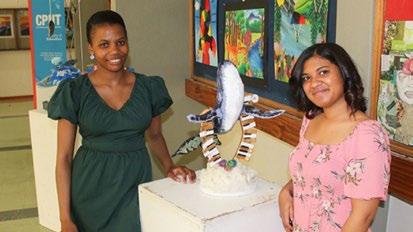
Talented fourth-year visual art students, Ms Eurania Mokwa Ms Jamey Jasson at the Student Art Exhibition
CPUT participants at the Mathematics Teachers as Innovators: Sharing of Practice Seminar, in Wellington
Doctoral graduate defies the odds
For Dr Lebohang Mahlo, poverty was both a challenge and a driving force. In December, he proudly graduated with a DEd from CPUT.
Born in Sterkspruit, he moved to Khayelitsha at the age of six with his mother. “One of the greatest challenges was growing up without a father, alongside peer pressure and poverty,” he recalled. “Life became harder after my mother lost her job at a restaurant. I remember walking barefoot on cold winter mornings to visit my aunt, whom I called Granny. Those hardships built my resilience and determination to overcome adversity.”
After completing school at False Bay TVET College, Dr Mahlo enrolled at CPUT for a National Diploma in Tourism Management. Volunteering as a night school teacher in Business Studies and Tourism proved transformative, even while juggling three jobs, including work as a housekeeper and gardener. Encouraged by colleagues, he went on to complete a PGCE, an MEd, and finally his doctorate.
Dr Mahlo described graduating as “almost surreal” and a “defining experience”. He credited his late stepfather for supporting him through his studies and expressed gratitude to his supervisor, Prof Zayd Waghid, and co-supervisor, Prof Agnes Chigona. He now lectures in the Postgraduate Certificate in Education at Sol Plaatje University.
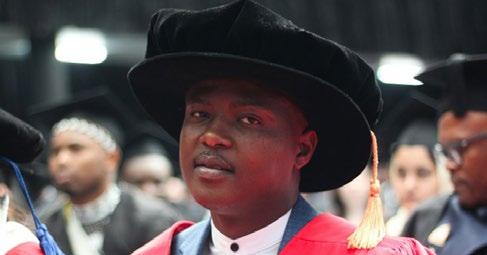
From selling sweets at school to PhD
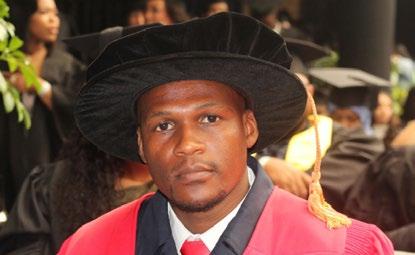
Dr Mvemve Mdingi’s academic journey is a testament to resilience and determination. Growing up in a squatter camp in Gqeberha, he faced significant challenges. As a primary school pupil, he sold sweets, and chicken heads and feet to afford a school uniform. Despite these obstacles, he went on to earn his undergraduate qualification at CUT in the Free State, followed by a master’s and a PhD in Education at CPUT, graduating in December 2024.
Growing up in Mdantsane and Qoboqobo in the Eastern Cape, Dr Mdingi was inspired by his mother, whose own academic ambitions were curtailed by financial hardship. This fuelled his commitment to education and to acting as a role model for young people. His doctoral research on ‘A framework for the integration of computerised accounting into the high school accounting curriculum’ aims to help the profession embrace technology and inspire learners to see accounting as a viable career option.
Dr Mdingi joined FBMS at CPUT in 2009 at the Wellington Campus before transferring to the Faculty of Education in 2016. He takes pride in training pre-service teachers, describing it as “nothing more fulfilling than seeing someone’s life change for the better”.
Dr Lebohang Mahlo
Dr Mvemve Mdingi

FACULTY OF ENGINEERING & THE BUILT ENVIRONMENT
DEAN’S REPORT
PROF SURESH RAMSUROOP
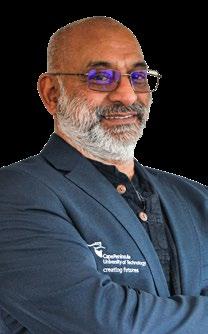
Introduction
The Faculty of Engineering & the Built Environment (FEBE) is committed to ensuring the relevance and excellence of its academic and research programmes through the development of strong linkages with its four key communities: civil society, industry, government, and academia.
To enhance collaboration with industry, the faculty undertook a Rapid Appraisal of a Local Innovation System (RALIS). RALIS is a robust, practical method for swiftly analysing a territorial innovation system in a participatory and action-oriented manner. This initiative aimed to understand the needs of the advanced manufacturing industry in the Western Cape. Several stakeholders were surveyed, including the Cape Chamber of Commerce, the Cape Engineering and Foundry Association (CEFA), the Production Technology Association of South Africa (PtSA), and various companies.
The results revealed that the engineering and manufacturing sectors in the Western Cape are diverse, serving industries such as packaging, food, production, health, construction, space, industrial, transport, and energy. As the only UoT in the Western Cape, CPUT – and by extension its faculty, graduates, and technology centres – has a unique and vital role to play in supporting these industries.
The South African Renewable Energy Technology Centre (SARETEC) successfully completed a project funded by
the Global Energy Alliance for People and Planet (GEAPP), supporting the establishment of a Renewable Energy Training Facility for Eskom at the Komati Power Station. This included offering training programmes to both Eskom staff and community beneficiaries. Courses offered included the Solar PV Installer Short Course and SAPVIA-endorsed Learning Programme, Wind Turbine Service Technician training, a Battery Energy Storage Systems course in collaboration with UWC, and an Energy Storage Systems course with SU, along with a Renewable Energy Workshop Assistant Training programme. Capacitation workshops were also delivered to community members in the Komati vicinity.
A pilot plant, established as part of a R65 million initiative, was launched in March by the CPUT VC and the Japanese Ambassador. Led by Prof Tunde Ojumu, the team is pioneering carbon recycling for a decarbonised society through mineral carbonation in the cement industry. The project, funded by Japan’s JICA and South Africa’s DSTI, has successfully produced 97% pure calcium carbonate. Master’s graduates Mr Koena Ramasenya (UCT) and Mr Vinny Katwambe (CPUT) have advanced their studies, with Mr Katwambe securing a full scholarship to Tohoku University in Japan. Initial findings were presented at the WastEng Conference 2024 in Sendai, marking a significant milestone in sustainable innovation.
The faculty hosted the second seminar in its series titled ‘Innovative Solutions for SDG 7’ (InnoSol1_2024), where staff presented how their research is addressing current and
future energy needs. The opening address was delivered by Mr Vally Padayachee, Strategic Advisor to the Association of Municipal Electricity Utilities of Southern Africa (AMEU). The plenary speaker was Dr Titus Mathe, CEO of the South African National Energy Development Institute (SANEDI). The programme concluded with a discussion on future research trends. This seminar offered a valuable opportunity to gain fresh perspectives and develop innovative solutions.
The faculty is currently proud to have 13 NRFrated researchers and celebrated the graduation of 39 master’s and 12 doctoral students during the December and April graduation ceremonies. During 2024, ten FEBE staff members also obtained their doctoral qualifications.
In alignment with CPUT’s Smart Internationalisation Strategy – supporting the principles of comprehensive internationalisation to foster a multicultural environment that prepares students and staff for the global workplace – the faculty engaged with various strategic partners to realise shared goals.
The faculty hosted its 3rd International Day in the Civil Engineering & Geomatics building to enable broader participation from staff and students. The theme was ‘Unity in Diversity: Engineering a Multilingual Future’. Prof Gerhard Hillmer, an industrial engineer and leadership professional from the Management Centre Innsbruck (MCI), Austria, delivered a keynote address emphasising the importance of building bridges between Africa and Europe, and the pivotal roles of the UN’s SDGs and Africa Agenda 2063 in uniting the two continents.
Please note that more information about this faculty’s 2024 research activities can be found in the Focus Areas section of this Research Report
FOCUS AREA 2
Space Science, Engineering & Technology
Research Institute: French–South African Institute of Technology 179
Research Centres: Africa Space Innovation Centre 179
Research Group: Quantum Physics Research Group 192
FOCUS AREA 4 The Environment, Climate Change & Sustainability
FOCUS AREA 3 Energy
Research Institute: Energy Institute 197
Research Centres: Centre for Distributed Power & Electronic Systems 199 Centre for Real-Time Distributed Systems 205 Centre for Research in Power Systems 201 Centre for Substation Automation & Energy Management Systems 207
FOCUS AREA 5
Human, Health & Social Dynamics
Technology Stations: Clothing & Textiles Technology Station 250 [Note: This technology station is also involved with projects in FAs 4 & 6]
Tackling industry challenges through collaborative innovation
In August, CPUT and Eskom co-hosted the inaugural regional Peaking Technologies Seminar at the Bellville Campus, providing a platform for engineers and technicians to share solutions to challenges at Eskom’s peaking generation stations.
Experts from Eskom, along with academics and postgraduate students from CPUT and UCT in electrical, mechanical, civil, and information technology disciplines, delivered technical presentations. The seminar, which was registered with the Engineering Council of South Africa for CPD points, also explored maintenance management and operational efficiency.
Prof Senthil Krishnamurthy of the Department of Electrical, Electronic and Computer Engineering (DEECE) said the event provided valuable opportunities to address industry challenges and collaborate on solutions through postgraduate and contract research projects. “Simply put, more available energy factor means no load-shedding; less means unplanned breakdowns or maintenance, which leads to planned load-shedding,” he explained.
A lab tour showcased research at the Centre for Substation Automation and Energy Management Systems, and the Centre for Power Electronics and Distributed Systems. Around 100 Eskom professionals attended and were impressed by CPUT’s advanced facilities. Prof Krishnamurthy commented, “Our collaboration with industry ensures our graduates are work-ready, with strong academic grounding and experience in state-of-the-art labs.”
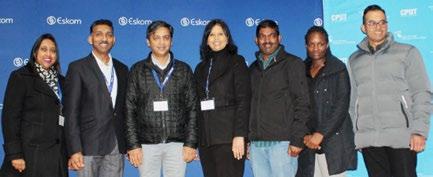
High-level visits from dignitaries such as the French Ambassador, His Excellency David Martinon; the French Regional Delegation; the Presidents of DHBW Ravensburg and Karlsruhe in Germany; the DHIK German University Consortium for International Cooperation; and two Japanese delegations further strengthened existing collaborations and opened new avenues for cooperation. Staff exchanges were conducted with Tomsk Polytechnic University, Russia; Riga Technical University, Latvia; DHBW Ravensburg; and the University of Duisburg-Essen, Germany. Incoming exchange students were hosted from institutions in France, Düsseldorf (Germany), and Lubumbashi (DRC). Outgoing exchange students increased to ten, attending: DHBW Ravensburg, Düsseldorf University of Applied Sciences, Trier University of Applied Sciences in Germany, and CESI Engineering School in France.
Additionally, two staff members and four students participated in the Engineering Design for Social Change programme offered by the University of Pittsburgh’s Swanson School of Engineering, alongside 12 of their students. This programme provided participants with insights into designing engineering solutions to realworld humanitarian challenges. Students visited industries and informal settlements, engaging directly with communities to understand challenges and propose innovative solutions.
Faculty members continued to strengthen their engagement with external stakeholders, contributing to key meetings and working groups across several bodies including the Department of Water and Sanitation, WaterNet, DSTI, the SA Biodiversity Forum, EWSETA, the International Council on Systems Engineering, and UNESCO. They also delivered keynote presentations on topics such as demand-side management, renewable energy, microgrids, and energy storage systems.
The newly launched Centre for Intelligent Systems and Emerging Technologies (CISET), led by Prof Senthil Krishnamurthy, is dedicated to exploring the latest developments in AI, machine learning, and intelligent systems. The centre aims to improve system intelligence and optimise real-world performance through cutting-edge research and innovation.
The faculty doubled its third-stream income and anticipates further growth through the development of industry-focused short courses to upskill professionals.
A few of the delegates at the Peaking Technologies Seminar
Looking ahead, our focus is on strengthening our research entities and capacitating more staff to become world-class researchers. This aligns with CPUT’s mission to transform its students through globally recognised researchers who inspire knowledge production and cutting-edge innovation.
Conferences hosted
During 2024, FEBE successfully hosted the following conferences and seminars:
• Peaking Technologies Seminar in collaboration with Eskom
• Innovation Solutions for SDG 7 (InnoSol2_2024)
• Climate Change Seminar
• SAIMechE Annual Conference on Postgraduate Research in Mechanical, Manufacturing, Materials, Energy and Biomedical Engineering
FUNDING
• Ten staff members obtained doctoral degrees
• Three staff members obtained master’s degrees
* Excluding Postdoctoral Funding and Postgraduate Bursaries
RESEARCH OUTPUT
2024 publications (submitted to the DHET in May 2025) Units
Chapters in books (submitted) 1.47
Conference proceedings (submitted) 17.50
Journal articles (audited)
(figures rounded up to two decimal points)
Postgraduate degrees obtained by staff
Doctor of Engineering
Durban University of Technology
Madondo NI
‘Synergistic influence of magneto-bioelectrochemical system and metal-based additives on the anaerobic digestion of sewage sludge’
Doctor of Engineering: Chemical Engineering
CPUT
Mabusela B
‘Modelling and optimisation of UV photolysis for ethylene control for potential application in postharvest management’
Doctor of Engineering: Chemical Engineering
CPUT
Marshall AB
‘Biogas production from Ecklonia Maxima using an anaerobic digestion process: Investigation, analysis and optimisation’
Doctor of Engineering: Civil Engineering
Central University of Technology
Bashingi N
‘ICT-enabled public transportation systems based on travel patterns and travel behaviour constructs: The case of Bloemfontein and Gaborone’
Doctor of Engineering: Electrical Engineering
CPUT
Esmail MYI
‘Decentralised discrete optimal quadratic automatic generation control of interconnected power systems based on the functional minimisation method’
Doctor of Philosophy
University of Cape Town
Musungu K
‘Evaluating the suitability of UAV data for mapping dominant plant species in a heterogenous fynbos seep wetland’
PhD in Conservation Ecology
Stellenbosch University
Duncan P
‘Multispectral satellite mapping, modelling, and stakeholder perspectives of Echium plantagineum (Paterson’s curse), an agricultural weed and potential conflict of interest species’
PhD in Engineering Education
University of Cape Town
Tendayi TG
‘Re-thinking complementary studies in the Engineering curriculum’
PhD in Environmental and Water Science
University of the Western Cape
Lemine B
‘Application of a legal approach to design a strategy for the improved management of wetlands in South Africa’
PhD in Industrial Engineering
Stellenbosch University
Sarema B
‘Intelligent optimisation of deep drawing process parameters in the production of aluminium nonrotational monolithic components’
Master of Construction
CPUT
Damba B
‘Appraisal of the efficiency of tender adjudication methods in public procurement of construction projects in South Africa’
Master of Engineering: Electrical Engineering
CPUT
Leopold-Kateya L
‘System level implementation of a C-band downconverter for a nano-satellite receiver’
MPhil Development Finance
Stellenbosch University
Selatole T
‘Financing intercontinental trade enabling infrastructure’
CPUT celebrates unity in diversity
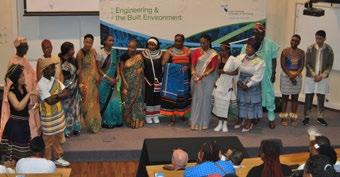
In November, FEBE hosted its third annual International Day at the Cape Town Hotel School under the theme ‘Unity in diversity: Engineering a multilingual future’. The event celebrated cultural diversity, global partnerships, and academic achievement.
The CPUT Choir opened proceedings with music that captured the spirit of unity and cultural exchange. Prof Veruscha Fester, Assistant Dean: RTIP, spoke about “smart” internationalisation – using global partnerships to advance technology and innovation, and fostering multicultural communities that benefit both local and international stakeholders.
Keynote speaker Prof Gerhard Hillmer, an industrial engineer, discussed process engineering, leadership, and human resource management, stressing the importance of collaboration between Africa and Europe to achieve the Sustainable Development Goals and the Africa Agenda 2063. “The students here today are key to a sustainable future. They hold ideas that will shape our tomorrow,” he said.
Student presentations on sustainable mining practices demonstrated FEBE’s commitment to integrating sustainability into teaching and research. The day concluded with a showcase of poetry, dance and music from South African and international students, bringing the theme vividly to life.
CPUT strengthens ties with German universities
CPUT hosted a high-level delegation from two German universities of applied sciences – DHBW Ravensburg and DHBW Karlsruhe – at DEECE during March. The visit, which centred around FEBE, aimed to strengthen collaboration and explore further partnership opportunities.
The German delegation included:
• Prof Dr-Ing Herbert Dreher, President: DHBW Ravensburg
• Prof Dr-Ing Stephan Schenkel, President: DHBW Karlsruhe
• Ms Ingela Lundin, International Relations Officer: DHBW Ravensburg
• Prof Dr Stephan Sauter, Industrial Engineering: DHBW Ravensburg
• Prof Dr Thomas Dobbelstein, International Business: DHBW Ravensburg
The CPUT delegation included Dr David Phaho (DVC: RTIP), Prof Rishidaw Balkaran (DVC: T&L), Prof Judy Peter (Director: SIP), Prof Veruscha Fester (Assistant Dean: RTIP, FEBE), and several other faculty and SIP representatives.
“It’s very important that we learn from each other,” said Prof Dreher. Dr Phaho noted the university’s desire to build on already strong relationships. Prof Dobbelstein highlighted long-standing ties between DHBW Ravensburg and FBMS, which have included staff and student exchanges. The visitors also toured the SARETEC facility.
Earlier in March, CPUT welcomed delegates from The Hague University of Applied Sciences in the Netherlands and KU Leuven in Belgium, who were hosted by DEECE. The visit aimed to renew partnership agreements focused on research, and staff and student exchange. Prof Bingwen Yan, Acting Assistant Dean: T&L, welcomed the delegation, which included: Ms Sabine Amft (THUAS), Mr Pepijn van Willigenburg (THUAS), Prof Annick Dexters (KU Leuven), and Mr Albert van Oudheusden (UNSA).
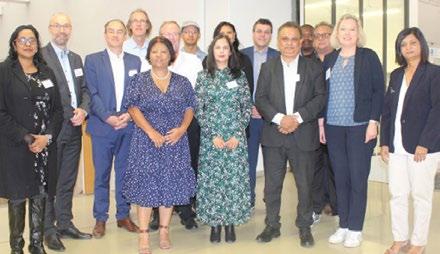
‘Unity in diversity: Engineering a multilingual future’
Representatives of CPUT, DHBW Ravensburg and DHBW Karlsruhe
Mercedes-Benz SA explores collaboration with FEBE
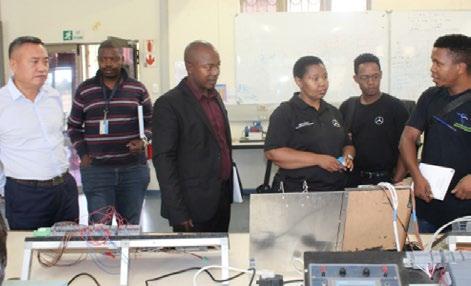
Representatives from Mercedes-Benz South Africa (MBSA) visited the Faculty of Engineering & the Built Environment in February, to explore potential collaboration in work-integrated learning (WIL), research, and electric vehicle innovation.
Dean, Prof Suresh Ramsuroop, welcomed MBSA’s Ms Nyameka Tshangana and Mr Azan Sotshangane to the Bellville Campus. The visit included lab tours and departmental presentations showcasing the faculty’s strengths. Cooperative Education Coordinator, Mr Zimisele Mlumiso, said MBSA responded to a prior proposal and expressed interest in student placements, WIL and research collaboration. “Their commitment was encouraging, especially their interest in the electric car formula student project,” he said.
Ms Tshangana remarked, “We were impressed by the institution’s passion and the emotional investment staff have in the success of their students. The university is producing talent aligned with industry needs.” She also highlighted the growing academic competitiveness of matriculants from the Eastern Cape, noting the importance of industry partnerships to support youth development and practical training.
SAIMechE Conference
In October, the Department of Mechanical Engineering hosted the annual South African Institute of Mechanical Engineering (SAIMechE) Conference at SARETEC – an event dedicated to postgraduate students and organised jointly by mechanical engineering staff from Stellenbosch University, UCT and CPUT. The conference, which rotates among the three universities, is financially and organisationally supported by SAIMechE. It offers master’s and doctoral students the opportunity to present their research orally and to develop their ability to defend their work – a skill that is difficult to cultivate outside such forums. “This is the primary goal,” said Mr Carl Tshamala, Chair of the SAIMechE Western Cape Branch, noting that industry professionals also contribute valuable perspectives.
Around 40 student abstracts were reviewed by experts from the participating universities, with extended versions published in the conference proceedings. Attendees could also earn CPD points through the Engineering Council of South Africa. Prof Graeme Oliver of CPUT’s Department of Mechanical and Mechatronic Engineering said that the event plays a vital role in advancing mechanical engineering in South Africa.
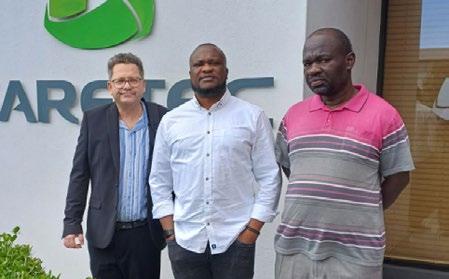
Advancing innovation in Mechanical Engineering
FEBE’s new unit enhances global competitiveness in materials science
November marked the launch of the Functional Materials Research Unit (FMRU) in FEBE, dedicated to advancing materials science under the leadership of Prof Mahabubur Chowdhury.
The FMRU’s research focuses on developing materials for health diagnostics, environmental monitoring, and renewable energy – particularly in metal oxide thin films, nanomaterials, and sensor technologies for applications such as biomarker detection and gas sensing. “Our aim is to create innovative solutions that bridge academia and industry while contributing to technological advancement,” said Prof Chowdhury.
The unit will initially support 10–15 postgraduate students annually, alongside research associates and postdoctoral fellows, with numbers expected to grow through increased collaboration. Activities include workshops, seminars, and fostering international partnerships to encourage innovation and knowledge exchange. Industry partners in health diagnostics, environmental monitoring, and renewable energy are being invited to collaborate on translating research into practical solutions.
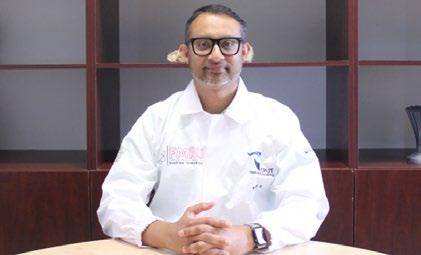
Student’s artwork showcased at the Artscape
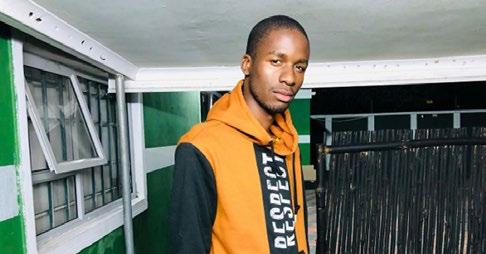
A talented Chemical Engineering student was excited to have his artwork featured at a Youth Month exhibition at the Artscape Theatre in June. Three pieces by Mr Alane Khoza were chosen for the exhibition, which was part of the Youth Month Festival organised by the Western Cape Government.
Mr Khoza mentioned that art has been a passion of his since high school, and he learned about the exhibition through the art club at CPUT. “The theme was ‘Showcasing youth resilience’, with sub-themes encompassing gender and disability, climate action, and community. I particularly enjoyed creating the piece titled ‘Fear-solation’, as it truly pushed me beyond my comfort zone. I approached it loosely, prioritising the expression of emotion and selecting the right colours to convey the mood over accurately depicting a wheelchair.” He added that Ms Cherice Mangiagalli, the student development officer for sport, arts, and culture, encouraged him during moments of selfdoubt regarding the quality of his work.
“This is such a life-changing experience for me because not only does it build confidence in myself and my work, but it also inspires me to explore more, it gives my fellow artists in the club the hunger to be creative too. The best thing got from this experience is realising how much support I have around me – sometimes that is something that is very easy to miss.”
Prof Mahabubur Chowdhury, head of the new Functional Materials Research Unit
Talented student, Mr Alane Khoza
RUEBEE symposium supports curriculum innovation
FEBE hosted the Research Unit of Engineering the Built Environment Education (RUEBEE) Symposium in February, to foster dialogue on learning and curriculum design across faculties at CPUT.
Head of RUEBEE and symposium chairperson, Dr Bronwyn Swartz, said the event aimed to enhance students’ educational experience through collaboration and innovative pedagogy. “The symposium raised awareness of different types of education research in the faculty and encouraged new members to join and form new Engineering Education projects,” she continued.
Although RUEBEE originated in FEBE, the symposium was open to participants from other faculties and the CPUT Libraries. Thirty-six participants, mostly FEBE lecturers, attended.
The event created space for educators to share research ideas, promote curriculum development, and increase the visibility of the unit. “Ultimately, we believe the RUEBEE symposium strengthened the engineering educators’ research community and contributed to elevating the quality of engineering education,” said Dr Swartz.
Please visit this link for more on RUEBEE: https://www.cput.ac.za/academic/faculties/engineering/ research/research-unit-of-engineering-the-built-environment-education-ruebee
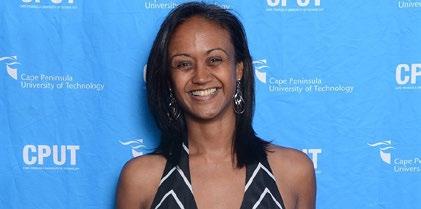
Student awarded prestigious Japanese scholarship
Studying abroad offers students new experiences, perspectives, and cultures, crucial for personal and professional growth. For some, such opportunities may seem inaccessible. Fortunately, Mr Ndjate Katambwe was awarded the MEXT (Ministry of Education, Culture, Sports, Science and Technology) Scholarship in October, a Japanese government initiative for international students pursuing graduate courses. He is now enrolled in a doctoral programme at Tohoku University.
Born in Lubumbashi, DRC, a French-speaking country, Mr Katambwe learned English after being accepted to study Chemical Engineering at CPUT in 2014. He graduated summa cum laude with a master’s in Chemical Engineering in 2022 under Prof Tunde Ojumu and Prof Leslie Petrik. Reflecting on his academic success, Mr Katambwe shared about the great support system from family, friends, colleagues and church that he has. He said, “I am grateful to receive this scholarship as the selection is competitive. I look forward to this new chapter in my life and academic journey.”
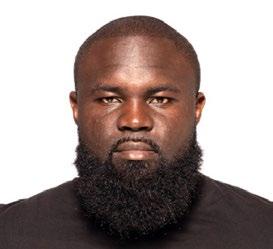
As the firstborn of five, Mr Katambwe was inspired by his father’s hard work to support the family. He was motivated in research by Prof Petrik. He noted, “Her dedication to her work and her students is inspiring. She treats everyone with compassion and kindness.” He believes the scholarship shows that “when we work together, we can achieve great things and access international opportunities. I am proud to represent CPUT and the Department of Chemical Engineering.” His research is in on carbon capture and utilisation, specifically on direct ocean capture (DOC) of CO2.
Although predicting the future is challenging, Mr Katambwe was intent on pursuing a research career – “It’s what pushed me to pursue a PhD.” While lecturing at CPUT, he managed to balance a demanding schedule with family life, noting, “Research can consume you, making you forget other priorities.” He mentioned that hiking provides a way for him to unwind and spend quality time with friends and family. He also expressed gratitude to CPUT for easing his financial burden.
Head of RUEBEE, Dr Bronwyn Swartz
Mr Ndjate Katambwe

FACULTY OF HEALTH & WELLNESS SCIENCES
PROF NICOLE BROOKS (ACTING) DEAN’S REPORT
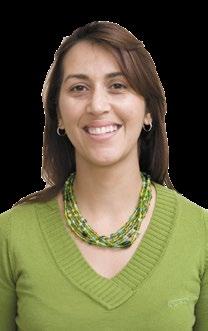
Introduction
The Faculty of Health & Wellness Sciences (FHWS) specialises in many diverse fields related to overall health and well-being, and consists of several research entities, each one working towards improving the current health dynamic. The staff and postgraduate students produce significant research output, which represents CPUT and South Africa on the international stage.
Research, Technology, Innovation and Partnerships continue to grow within FHWS. The faculty specialises in diverse fields related to health and well-being, with several research entities each contributing to improvements in the current health landscape. Our researchers are highly collaborative both nationally and internationally, and work closely with partners across the Western Cape health service platform. FHWS’s research spans clinical, public health, and allied health sciences. We remain committed to advancing and supporting excellent research in alignment with CPUT’s Vision 2030, and are pleased to present the faculty’s 2024 Research Report.
Graduations
Postgraduate numbers within FHWS have continued to rise since 2023, with the largest increase reflected in postgraduate diploma students. In 2024, the faculty produced 14 master’s and eight doctoral graduates, along with 207 postgraduate diploma graduates. In addition, three staff members completed master’s qualifications, while two achieved doctorates in Radiography. The steady growth in graduations reflects increased research activity across the faculty, while the success of staff members strengthens our research capacity.
Postgraduate students
In 2024, postgraduate enrolments totalled 394, comprising 279 postgraduate diplomas, 91 master’s degrees, and 24 doctoral programmes. This represents a slight increase from 2023. Encouragingly, this growth follows a particularly high number of graduations in 2023, which required a greater intake of new postgraduate students to maintain numbers.
The ongoing increase in enrolments and graduations in postgraduate diploma programmes, first introduced in 2022, is especially encouraging. The table below shows 2024 enrolment numbers for postgraduate diplomas, master’s and doctoral degrees across the various departments.
NRF-rated researchers
There are currently seven NRF-rated scientists in the faculty:
Prof Tandi Matsha C1
Prof Karien Jooste C2
Prof Penelope Engel-Hills C2
Prof Peter Clarke-Farr C3
Prof Glenda Davison C3
Prof Oluwafemi Oguntibeju C3
Dr Shanel Raghubeer Y2
Conferences and workshops
This year, FHWS researchers from various fields presented their work at national and international conferences. In health sciences, these presentations rarely develop into formal conference proceedings, but they remain important opportunities to share work and build networks. Notably, the Cardiometabolic Health Research Group again hosted a symposium featuring both local and international speakers – providing an excellent platform for staff and students to engage with peers.
Research output
The faculty takes pride in producing cutting-edge research in the health sciences in South Africa. Our commitment
Please note that more information about this faculty’s 2024 research activities can be found in the Focus Areas section of this Research Report
FOCUS AREA 1
Research Group:
FOCUS AREA 5 Human, Health & Social Dynamics
Research Chair: Cardiometabolic Health Research Centre 241
Opening doors for matriculants into science-based programmes
FHWS’ Life Science Revision Project has continued to grow in both scope and impact, refining its design, improving its efficiency, and strengthening its leadership. In May, nearly 200 learners from three high schools arrived at CPUT’s Bellville Campus for an intensive revision session – an experience designed not only to boost exam performance, but also to open the door to science-based university programmes.
The initiative, launched in 2018 by Prof Kareemah Najaar of the Department of Emergency Medical Sciences, was born from a simple but urgent goal: to help more learners meet the minimum entry requirements for science-focused courses. Today, it is recognised as a ‘faculty flagship’ project and is guided by a leadership team comprising Prof Najaar, Dr Wendy Solomon, and Ms Marnel Germishuys. Together, they coordinate and run the sessions with the help of an impressive corps of volunteer tutors.
This year’s first session welcomed learners and teachers from Lavender Hill High School, Wynberg High School, and Langa High School. Forty-three tutors – representing all seven FHWS departments – supported the day’s activities, joined for the first time by tutors from the Department of Medical Biosciences at UWC. Their presence marked a promising step towards the formalisation of a partnership between the two institutions.
Over the years, the project has evolved from off-site revision sessions to on-campus engagements, allowing learners to experience the university environment first-hand. Plans are already in motion to expand into the Paarl district and strengthen collaboration with UWC’s Medical Biosciences Department.
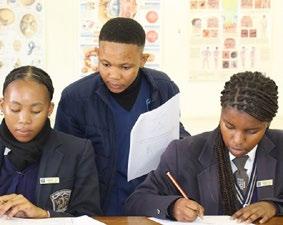
Prof Najaar emphasised that feedback from both learners and teachers plays a vital role in shaping the sessions’ content and delivery. The team has developed a flexible tutoring model capable of adapting to unforeseen challenges – a necessity during the Covid-19 pandemic, when limited digital access made creative solutions essential. Teachers have also seen the benefits. Ms Nandipha Mandongana from Langa High School said the project gave learners the chance to revisit critical topics and improve their chances of gaining university admission.
This year, the Sanitary Dignity Programme added a further dimension by providing essential hygiene products to female learners, ensuring that practical needs did not become a barrier to participation. The organisers expressed heartfelt gratitude to all contributors – including colleagues from UWC, the Dean’s Office, and the CCEWIL Service-Learning division – whose support has helped turn the vision of the Life Science Revision Project into a reality.
to interdepartmental collaboration further enriches our research ethos. In 2024, FHWS submitted 20.63 research output units to the DHET, a decrease from 27.27 units in 2023. However, analysis of the past five years shows a clear upward trajectory overall in our research performance.
Staff success story
Emerging and newly established researchers in the Department of Medical Imaging and Therapeutic Sciences have developed several international collaborations.
University of Derby, University of Auckland and University of Queensland: Dr Kathleen Naidoo and Dr Heidi Thomas are collaborating with these institutions on patient-centred care in radiography. Their first joint article was recently published: ‘Patient-centred care measures through the eyes of South African radiographers and patients: A survey approach’, in Journal of Medical Imaging and Radiation Sciences, 55(4) https://doi.org/10.1016/j. jmir.2024.101725
A student exchange agreement is also in place and will commence soon.
University of Exeter: Mr Gerhardus Koch has co-authored a paper, currently under review, with international colleagues on the educational perspectives of radiography trainers.
These and other emerging collaborations, both nationally and internationally, position CPUT and FHWS researchers at the forefront of radiography training and research worldwide.
Learners participating in the Life Science Revision Project
FUNDING
Lecturer wins best PhD paper at WIL24
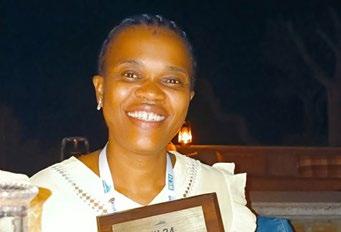
*Excluding Postdoctoral Funding and Postgraduate Bursaries
RESEARCH OUTPUT
Dr Yanda Peter, a lecturer in the Department of Medical Imaging and Therapeutic Sciences, received the Best PhD Paper Award at the International Conference on Work-Integrated Learning (WIL24), hosted by University West in Sweden in collaboration with CUT.
Dr Peter won the award for her paper titled ‘Professional socialisation of diagnostic radiography students at a higher education institution in South Africa’, supervised by Prof Penelope Engel-Hills and Dr Kathleen Naidoo. “I was surprised and overjoyed when my name was announced,” she said. “It’s encouraging to know that my research had an impact at such a prestigious international event.” Dr Peter, who has been with CPUT for eight years, also thanked her supervisors for their unwavering support.
Dr Yanda Peter
MITS celebrates exchange with Odisee University
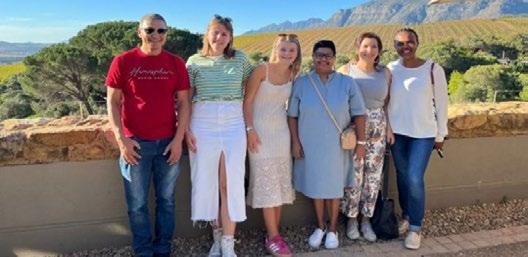
The Department of Medical Imaging and Therapeutic Sciences (MITS) hosted two students from Odisee University in Brussels in May. Ms Julie van Herck and Ms Sien Paelinckx took part in a four-month clinical internship. The MITS Department and Odisee University have a longstanding international exchange collaboration spanning eight years.
The students were guided by Dr Aladdin Speelman, MITS international exchange programme coordinator. Before their arrival, Dr Speelman facilitated their registration with the Health Professions Council of South Africa and provided orientation at Groote Schuur Hospital. He was supported by MITS academic Ms Valdiela Daries, doctoral candidate Ms Yanda Peters, and Dr Heidi Thomas. During their stay, the students trained in the Radiography Department at Groote Schuur, gaining exposure to trauma imaging and rare
diseases not typically encountered in Belgium. They also engaged with CPUT students and staff, explored the Garden Route, and visited the Cape Winelands, deepening their appreciation for South African cultures.
In March, Ms Peters visited Odisee University and taught clinical tutorials on angiography and interventional procedures. “I was thrilled to discover that our programme matched the standards of Belgium, especially in terms of content covered in these topics. This enabled me to contribute meaningfully during tutorials, despite some language challenges,” she shared.
The exchange programme continues to build promising international links, with MITS aiming to create future opportunities for Radiography students to visit Belgium.
Sudanese student enriched by CPUT visit
For Sudanese medical student Ms Sara Idrees, a two-week visit to CPUT in September was more than an academic exchange – it was a journey into community health, culture, and resilience. A fourth-year student at Gezira University, Sara joined the exchange programme just before the Ubuntu 2024 Conference, hosted in collaboration with UWC, SU, UCT, the Western Cape Department of Health, Rural WONCA, and The Network: Towards Unity for Health. The conference theme, ‘People, place, and policy for community wellness’, set the tone for her experience.
Following conflict in Sudan, Sara and her family relocated to Riyadh, Saudi Arabia, where her university established branches to support displaced students. At CPUT, she was hosted by the FHWS and guided by Dr Lizel Hudson, Work-Integrated Learning and Language Coordinator. Together, they visited rural communities in Gouda, Saron, Porterville, Vredenburg, Saldanha Bay, and Langebaan. These visits exposed Sara to rural healthcare, cultural traditions, and the challenges of local health systems. She met residents at a home-based care organisation, NorSA’s soup kitchen, and the elderly at Badisa Percy Bilton Centre. A stop at Siyabonga Care Village left a lasting emotional impact. “The people we met, having to operate and deliver services in mostly difficult situations underscored by often difficult-tounderstand policies, are true angels,” she reflected. Sara described her visit to CPUT as “a beautiful experience” in education and culture.
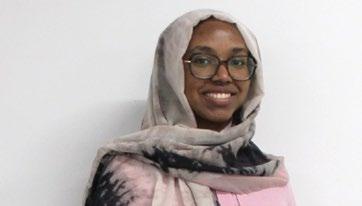
Dr Aladdin Speelman, Ms Sien Paelinckx (visiting intern), Ms Julie van Herck (visiting intern), Mrs Valdiela Daries, Dr Heidi Thomas and Ms Yanda Peter, visiting the winelands
Sudanese student, Ms Sara Idrees
CPUT DEMS team joins mountain rescue
The Department of Emergency Medical Sciences (DEMS) assisted Western Cape Provincial Emergency Services and Wilderness Search and Rescue (WSAR) in a high-risk rescue operation on Table Mountain in February. Two hikers were stranded overnight and, due to dangerous wind conditions, cableway and helicopter rescue were ruled out. A manual ‘carry out’ operation was launched, requiring significant manpower.
DEMS HoD, Dr Simpiwe Sobuwa, mobilised a team of two lecturers (Mr Xavier Millar and Mr Benjamin de Waal) and eight second-year Bachelor of Emergency Care students. They joined Metro Rescue – assisted by several CPUT alumni – and hiked up the Platteklip Gorge trail to locate and transport one of the injured hikers.
The operation lasted nearly 24 hours and involved around 50 rescuers from multiple agencies, including SANParks, City Law Enforcement, Metro Police and WSAR volunteers.
The successful rescue highlights the valuable role that CPUT’s DEMS team plays in supporting emergency services and community safety. CPUT is proud of the dedication and professionalism of both staff and students. The operation provided invaluable real-world experience and strengthened collaboration with local rescue agencies.
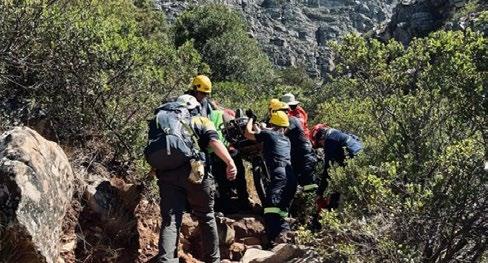
FHWS shares celebration of excellence
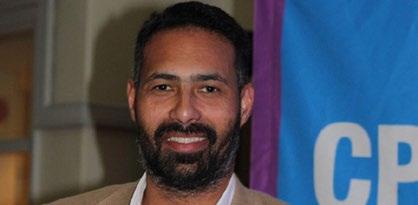
The Faculty of Health & Wellness Sciences came together in October for a celebration that combined professional recognition with a shared sense of pride. The annual Teaching and Learning Awards, hosted at the Cape Town Hotel School, honoured academic, administrative, and clinical staff who have contributed to the faculty’s high standards in teaching, learning and assessment.
Awards for Departmental Teaching Excellence (2023) went to Dr Stanton Hector and Dr Samantha Meyer of the Biomedical Sciences Department. Other accolades included Outstanding Secretary for Ms Sanet Nothnagel (Biomedical Sciences), Outstanding Technician/Clinical Instructor for Ms Vera Baiden (Dental Sciences), and Innovation in Teaching with Technology for Mr Benjamin De Waal (Emergency Medical Sciences). The faculty also paid tribute to retiree Ms Bridget Wyrley-Birch from the Medical Imaging and Therapeutic Sciences Department.
Keynote speaker Prof Penelope Engel-Hills addressed the theme ‘Embracing innovation: Transforming health sciences education in South Africa’, encouraging colleagues to reflect on their own practices and embrace new approaches.
Faculty Teaching and Learning Coordinator Mrs Anthea Pinto-Prins and the Faculty Teaching & Learning Committee organised the event. “We as the FHWS wish to extend our gratitude to Dr Xena Cupido and the team at Fundani: CHED for allowing us to make this special occasion possible through the UCDP,” Mrs Pinto-Prins said.
Dr Stanton Hector won a Departmental Teaching Excellence Award
DEMS assisting WSAR in a high-risk rescue operation on Table Mountain

FACULTY OF INFORMATICS & DESIGN
DEAN’S REPORT
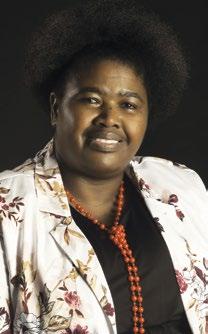
Introduction
Research, Technology Innovation and Partnership activities continue to grow in leaps and bounds within the Faculty of Informatics & Design (FID). The faculty is proud to present this report, which highlights the significant milestones and achievements of 2024. Notably, 24 master’s degrees and 13 doctoral degrees were awarded (including six to staff members), reflecting the faculty’s deliberate and collaborative efforts to nurture postgraduate scholarship and enhance staff qualifications.
Research and innovation development
FID engaged in a wide range of research and innovation development activities during 2024. Key highlights include:
• The faculty hosted its annual five-day postgraduate writing retreat in Grabouw during September/October. Facilitated by Prof Johannes Cronjé, the retreat was attended by thirteen participants.
• Dr Errol Francke, an academic in the Department of Information Technology, delivered a keynote address at the Business Analytics and Smart Innovation Conference (BASIC) 2024, hosted by the Vivekanand Business School (VBS) in Mumbai, India. This visit led to ongoing academic collaboration between the two institutions.
• Dr Belinda Verster, from the Department of Urban and Regional Planning, delivered a keynote address titled ‘Educational futures: Preparing our students of tomorrow, for tomorrow’ at a HELTASA event.
• Dr Tabisa Ncubukezi, Head of the Department of Information Technology, served as Conference Chair for the 23rd European Conference on Cyber Warfare and Security, held in Jyväskylä, Finland.
• Dr Louis Lategan, from the Department of Urban and Regional Planning, participated as a panellist at the inaugural Forum on China–Africa New-Type Urbanisation. Co-hosted in Cape Town by Tsinghua University (China), UCT, and UWC, the event facilitated dialogue on urban development and China–Africa collaboration.
• Prof Johannes Cronjé delivered a keynote address at the 32nd Annual Conference of the Southern African Association for Research in Mathematics, Science and Technology Education, hosted by the International University of Management in Windhoek, Namibia.
• The Department of Urban and Regional Planning hosted two master’s students from the Massachusetts Institute of Technology (MIT) between 12 January and 2 February. Together with CPUT researchers, the MIT students conducted fieldwork in Woodstock as part of the collaborative research project ‘Anti-gentrification planning in post-industrial Woodstock, Cape Town’. Principal investigators are Prof Brent Ryan, MIT and Prof Masilonyane Mokhele, CPUT.
PROF TEMBISA NGQONDI
• Mr Rayner Moodley, Head of the Department of Architectural Technology and Interior Design, played a key role in organising the 2024 South African Planning Institute (SAPI) Conference. The event drew 490 delegates and featured 47 research presentations. Mr Moodley chaired both the opening and closing plenaries and was honoured at the gala dinner with the award for Most Outstanding Planner in South Africa. The Western Cape, which he chairs, was recognised as the most promising region. The conference concluded with the announcement that Planning Africa 2026 will be hosted in the Western Cape, with Mr Moodley appointed as Conference Chair.
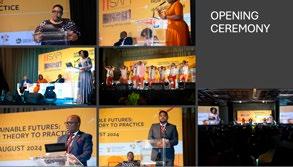
• A special postgraduate robing ceremony and celebratory graduation dinner were held at the Cape Town Hotel School in Granger Bay in December. This intimate event honoured seven master’s and seven doctoral graduates. Faculty and family members gathered to celebrate their achievements, marked by heartfelt speeches and the symbolic robing ceremony.
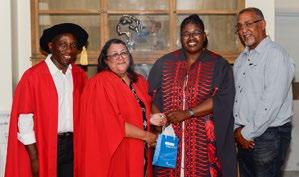
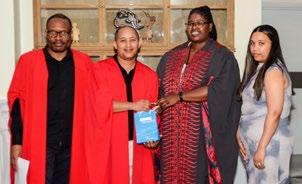
• Ms Sindi Papa, from the Department of Applied Design, focused her master’s research on designing inclusive academic gowns for individuals with disabilities. Informed by the needs of mobilitychallenged participants, her specially designed gown enhanced accessibility and comfort. One participant proudly wore it at the December graduation, expressing joy at being able to independently wheel herself onto the stage to receive her certificate.
(a)Prototypeacademicgownforwheelchairusers(Papa 2023).(b)Academicgownforbothmobility-challengedandnon-challenged people(Papa 2023).

Academicgownprototypesfor(a)wheelchairusersand(b)non-challengedpeople(Papa
Libraries launched a series of workshops focused on starting research projects, increasing visibility, and using analytical tools. Held weekly over two months, the sessions attracted 78 participants.
Partnerships and collaborations
During 2024, FID signed agreements and collaborated with key partners aligned with Vision 2030.
Highlights include:
• A new partnership with the Vivekanand Business School in Mumbai, India was established to foster academic collaboration. Plans include creating an International Centre to coordinate joint research, mobility, and staff development initiatives.
Throughinterviewswithfivemobility-challengedgraduates,the researchidentifiedspecificchallengestheyfacewiththecurrentacademicgowns,suchasdifficultieswithwidesleevesandvoluminousfabric.Thesedesignissuesnotonlyhindermobilitybutalsoaffectthe emotionalandpracticalaspectsoftheirgraduationexperience,often makingthemfeelexcludedanduncomfortable.
ThedatawereanalyzedusingthesevenUniversalDesignPrinciples asacodingframework.Byintegratingtheseprinciples,thisstudydevelopedtwoinclusiveacademicgownprototypesthatidentifiedchallenges byreducingthevolumeoffabricandincorporatingfeaturesthat
• The successful partnership with Hasselt University, Belgium entered its fourth year. This collaboration features a parallel design studio, staff exchanges for in-person evaluations, and two collaborative online workshop weeks per semester, using Discord and Miro platforms. One CPUT student also spent a semester on exchange in Hasselt. mobilitychallengesinSouthAfricanhighereducationinstitutions.Itcan bereasonablyassertedthatthecurrentofferingofthemodernacademic gowninHEIsinSouthAfricaiscurrentlynotsuitableformobility-challengedusers.Thereisaneedforinclusiveacademicdresstoaccommodatethesegraduates.Althougheverygraduatedressesthesame (uniform);thefitoftheclassicacademicgownisunsuitableformobility-challengedgraduates,thusmakingindividualityinuniformity imperative.
Figure6
Figure7
2023
Mr Rayner Moodley chaired the opening and closing plenaries
Postgraduate robing ceremony at Granger Bay
Inclusive academic gowns
• The ‘Sandbag Construction Project’ integrates sustainable building practices into the extended curriculum for students in Architectural Technology and Interior Design. Students design and construct a bio-toilet cubicle using sandbags and timber, applying sustainability principles. The project draws on the theories of scholars such as Dr Jane Jacobs and Dr David Orr and equips students with both practical and critical design skills.
• A formal partnership was signed with the Centro Federal de Educação Tecnológica de Minas Gerais (CEFET-MG), Brazil, led by Prof Masilonyane Mokhele. This initiative supports joint research and exchange opportunities across CPUT’s five faculties, with a focus on mutual knowledge sharing and practical training.
• In collaboration with Malmö University, Sweden and the Central University of Haryana, India the Department of Information Technology is participating in a research project exploring the future of digital work from the perspective of underrepresented voices. The initiative aims to balance dominant narratives from the Global North by including insights from scholars and workers in the Global South.
Research Awards
Award for Research Publication
Platinum: Prof Tiko Iyamu (Department of Information Technology)
Award for Postgraduate Supervision
Bronze: Prof Tiko Iyamu (Department of Information Technology)
Dean’s Special Award for Research Excellence and Community Engagement
Aspiring Young Researcher’s Award: Mr Brian FisherHolloway (Urban and Regional Planning)
Outstanding contributions in learning and teaching, research, and community engagement
• Mr Aphiwe Hlophe (Information Technology)
• Mr Thulani Shongwe (Information Technology)
• Dr Wilhelm Rothman (Information Technology)
• Mr Radford Burger (Information Technology)
• Ms Noluthando Mdolombo (Information Technology)
• Dr Louis Lategan (Urban and Regional Planning)
• Dr Belinda Verster (Urban and Regional Planning)
• Mr Rayner Moodley (Architectural Technology and Interior Design)
NRF ratings
FID academics have NRF ratings for 2024:
ATID leader honoured with prestigious awards
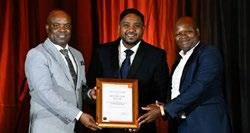
Mr Rayner Moodley, HoD: Department of Architectural Technology and Interior Design (ATID), received double recognition at the Planning Africa 2024 Conference in Durban this October, where he was awarded two prestigious honours. An urban planner by profession, he was named one of five recipients of the ‘Outstanding Planner in South Africa’ award, and under his leadership the Western Cape region of the South African Planning Institute (SAPI) was recognised as the most promising region. The awards, presented under the conference theme ‘Sustainable futures: From theory to practice’, build on his 2022 accolade as ‘Top Young Planner in South Africa’ (Academic category).
Since joining CPUT in 2012 as a Town Planning Technician, Mr Moodley has progressed through academic ranks, completed a master’s degree, and is now pursuing his PhD. He also serves as SAPI Western Cape Chair and sits on the National Executive Committee. Following the conference, he was appointed Vice President of SAPI and elected Conference Chair for Planning Africa 2026 (Cape Town) as well as Chair of the Scientific Committee – roles that further cement his leadership in the field.
Dr Johannes Mulaudzi (President SAPI), Mr Rayner Moodley (HoD ATID CPUT) and Mr Bongumusa Ndwandwe (Acting Registrar and CEO SACPLAN)
ATID marks Africa Day with vibrant cultural exhibition
The Department of Architectural Technology and Interior Design (ATID) marked Africa Day with a striking exhibition titled ‘Tribal Identities of South Africa’, transforming 80 Roeland Street into a lively celebration of culture, heritage and creativity. The event gave students a platform to share the rich narratives and artistic journeys inspired by their cultural backgrounds, while connecting with fellow artists, faculty members, lecturers, and visitors. The exhibition honoured the diverse heritage of South Africa’s tribal communities – an integral part of the nation’s identity – and invited visual artists from the department to contribute to this unique showcase of expression and appreciation. Preparations for the exhibition generated a buzz of excitement, with students eager to explore and present their cultural identities through art. This energy was evident on opening day, when the audience warmly received the work on display, sparking curiosity about what future exhibitions might hold.
Staff and students alike reflected positively on the experience. Staff member Mr Rezah Mogamat
observed, “I think it was an awesome initiative. One of the students came to chat to me in private afterwards to say how glad he was to partake in this initiative. The hidden talent, hey!” Fourth-year student Ms Raeesah Toefy described it as both a creative and educational journey – “It was overall a great experience. I feel like I could’ve spent more time on making my art piece look better, but I had fun painting it and researching my culture. It was a learning curve for me which I enjoyed. Yes, I would participate again. Life is all about risks and experiences, and exhibiting artwork is a fun and great experience. Even if you’re new to the field or not too confident about your art pieces, you’ll only get better at it.”
In his opening address, HoD Mr Rayner Moodley drew on the words of Archbishop Desmond Tutu, “We are not people of one book, one truth, or one way. We are people of many books, many truths, and many ways…” He thanked students for their enthusiasm, encouraging them to embrace their heritage and let it fuel their creativity and innovation.
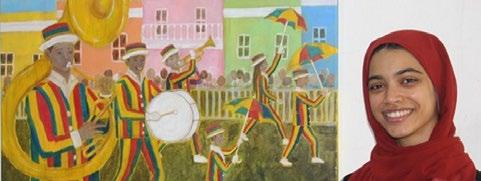
FUNDING
RESEARCH OUTPUT
The colourful exhibition honoured the diverse heritage of South Africa’s indigenous communities
Postgraduate degrees obtained by staff
Doctor of Applied Arts in Design
CPUT
Barnes VE
‘Empathy in practice: A grounded theory in Industrial Design’
Doctor of Applied Arts in Design
CPUT
Pinfold NRB
‘Testing middle ground: Facilitating community transition to sustainable land governance’
Doctor of Information and Communication Technology
CPUT
Hendricks W
‘A delay-tolerant network architecture for edge computing with applications in narrow band Internet of Things’
Doctor of Philosophy in Business Information Systems
University of Venda
Macheque V
‘A framework for integrating adaptive assistive technologies in inclusive education: A case study of the disability unit at the University of Venda’
Doctor of Philosophy in Education
University of the Western Cape
Noble A
‘(Re)Configuring socially just pedagogies with
posthumanism and decoloniality: Experimenting with processual learning in the Architectural Technology extended curriculum programme in the Western Cape, South Africa’
Doctor of Philosophy in Informatics
CPUT
Lakay DD
‘The design of a robotic process automationbased system for the assessment of academic performance in South African universities’
Doctor of Philosophy in Informatics
CPUT
Mwansa P [Late]
‘Trust system framework for integrity controls in electoral vote counting and validation’
Master’s in Design
University of Johannesburg
Roberts A
‘Addressing the industry skills gap – An extended curriculum improvement plan for Interior Design students’
Master of Technology in Design
CPUT
Olivier WH
‘Social enterprises’ improvisation of services to communities through the use of mobile devices’
Master of Science in Interior Architecture
Hasselt University, Belgium
Msimang A
‘Stepping into the lion’s den: A study towards the decolonisation of the Groote Schuur Zoo’
IN THE NEWS
Fourth-year art students showcase their talent
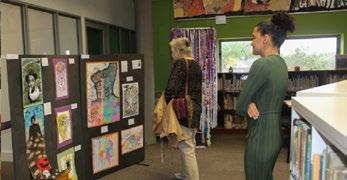
A glimpse into the remarkable talent of FID’s future art educators
The annual exhibition of the fourth-year Art Education students took place at the Wellington Campus Library in October, offering a glimpse into the remarkable talent of future art educators. The event showcased the students’ creative work, reflecting their development as artists while preparing them for their future roles as educators. The high standard of their work was especially impressive, given that art forms only one of their major subjects.
One of the highlights of the exhibition was the installation of upcycled chairs, which marked the Wellington Campus first permanent public art installation. These pieces were a powerful expression of the students’ values and perspectives, addressing global issues such as the ongoing conflict in Gaza and the challenges within the education system.
Visual Art lecturer Dr Jacoba Meiring praised the evening’s programme for its engagement and stimulation, which contributed to the event’s overall success. The serenade group from Val de Charon student accommodation, together with the Wellington Campus Choir, directed by Dr Devandré Boonzaaier, provided captivating musical performances. Dr Meiring noted, “The exhibition not only demonstrated the students’ artistic talents but also reinforced the value of cultivating and nurturing creativity in education. The event was well-attended by parents, friends, and lecturers, and the collaboration and participation of all involved truly reflected the spirit of our ‘One Smart CPUT’.”
FID honours staff excellence
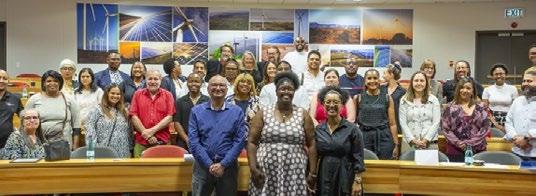
FID celebrated outstanding staff contributions at a special awards ceremony hosted by Dean Prof Tembisa Ngqondi in January. Awards were given in categories such as teaching, research, community engagement, and academic leadership.
Outstanding Achievement Awards were presented to:
• Mr Walter Buccholz, Mr Siviwe Jack, Ms Bongiwe Kolisi, Mr Jan Myburgh, Ms Nthabeleng Monyaki, Ms Sindiswa Papa, Dr Nike Romano, Mr Bulumko Roqoza, Mr Marquin Sampson, Ms Chumuyolo Myamya, Ms Joanna Voysey –Programme for Academic Teamwork
• Dr Alexandra Noble – Teaching & Learning, Research and Community Engagement
• Dr Blessing Makwambeni – Academic Research
• Mr Gqibile John Bulani – Teaching & Learning, Community Engagement, as well as Outstanding Achievement as a Young Researcher
• Dr Sisanda Nkoala – Teaching & Learning, Research and Community Engagement, as well as Outstanding Achievement in Academic Leadership
• Dr Tabisa Ncubukezi – Teaching & Learning and Academic
Reputation, as well as Academic Research
• Ms Denise Lakay – Teaching & Learning and Promoting Student Success
• Ms Prima Inderlal – Collaboration & Engagement and Promoting Student Success
• Dr Waldon Hendricks – Collaboration & Engagement and Promoting Student Success
• Dr Errol Francke – Academic Research
• Prof Johannes Cronjé – Teaching & Learning, Academic Research, and Academic Research, Leadership & Development
• Prof Tiko Iyamu – Academic Research, and Academic Research, Leadership and Development
• Dr Boniface Kabaso – Academic Research
• Mr Rayner Moodley – Academic Leadership
Two posthumous awards for Learning & Teaching were presented to the late Mr Wayne Coughlan and the late Ms Ayesha Toyer. Both were highly valued members of the faculty, and their contributions to education – and the many lives they touched –are remembered with deep appreciation.
CPUT IT lecturer speaks on AI and big data in India
Dr Errol Francke, a senior lecturer in the Information Technology Department, was the chief guest speaker at the Business Analytics and Smart Innovation Conference (BASIC) 2024 held in Mumbai, India in February. Hosted by Vivekanand Business School (VBS), the fourday international event featured speakers from Canada, Singapore, India and South Africa, focusing on data analytics and its potential to transform society and business.
Dr Francke’s keynote address, titled ‘The rise of AI and its impact on big data analytics for social innovation’, explored the power of artificial intelligence (AI) in unlocking big data for social good. “The world is saturated in data, presenting both challenges and opportunities for social innovation,” he said. “Traditional methods struggle to handle the volume and complexity, which limits our ability to extract meaningful insights and drive positive change.”
During his visit, Dr Francke also handed over an MoU between CPUT and VBS. The MoU seeks to develop collaboration in mutual areas of academic interest and includes establishing international centres on each campus to facilitate:
• Study abroad programmes
• Joint research
• Staff and student mobility
• Partner delivery and curriculum development
• Staff training and development
Reflecting on his experience, he shared, “India is not just a country, but an emotion. While diamonds gleam and champagne flows for the privileged, the cries of the hungry are lost in the dust of Mumbai’s slums and streets. The staff and students of VBS were a real pleasure to work with, and they are grateful for our collaboration.”
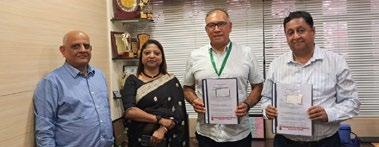
FID staff members celebrating success together at the FID awards ceremony
Dr Sandeep Bhardwaj (Dean: Academics), Dr Debjani Banerjee (Associate Dean: International Affairs), Dr Errol Francke (CPUT) and Dr Sachin Deskmukh (Director of VBS)
Prestigious Swedish grant to advance sustainable development
A senior lecturer in CPUT’s Department of Urban and Regional Planning, Dr Belinda Verster, has secured a highly competitive R660 000 grant from the Swedish Research Council for a groundbreaking international collaboration with Stockholm University and UWC. The project is titled ‘A research agenda for advancing education for sustainablesmart development (ESsD) in marginalised communities: A North–South learning perspective’. It is one of four grants awarded every two years for global partnerships, and will run over two years. It seeks to reframe how education for sustainable development is approached, placing communities at the centre of the research process.
For Dr Verster, the award is both an honour and a responsibility. “I feel a huge sense of responsibility to do the project justice,” she said. “Understanding and responding to communities’ vulnerabilities is one of the major challenges of our time – whether socioecological, such as life-threatening weather phenomena and climate change; sociopolitical, including unrest and wars; or socio-economic, such as unemployment and slow economic growth.” She noted that too many sectors of society remain voiceless and therefore powerless to address their own challenges. “With this research agenda, we hope to shift the focus from research being the domain of universities, and root it in both communities and relevant partners.”
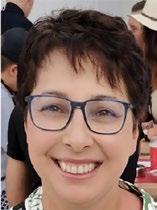
The project’s inclusive approach will see socially marginalised groups actively participating from start to finish – helping to shape a fit-for-purpose research agenda and methodologies for both Sweden and South Africa. It will involve direct collaboration between community members, academics, students, NGOs and other stakeholders in both countries. Framed within UNESCO’s Education for Sustainable Development framework, the initiative will explore sustainable-smart development as a means of addressing systemic and structural barriers that limit marginalised groups’ engagement in ESsD. Ultimately, the aim is to foster collective ownership of solutions that promote equitable and sustainable outcomes for all.
ATID supports flood victims
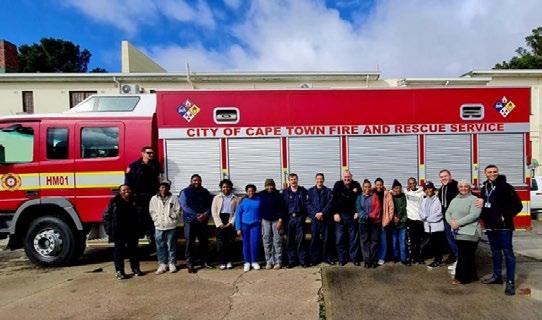
In August, the Department of Architectural Technology and Interior Design (ATID) made a significant contribution to flood relief efforts in Cape Town following the devastating storms that caused widespread displacement and damage. The department prepared and donated food parcels, which were delivered to the Roeland Street Fire Station, a key aid collection point.
Mr Rayner Moodley, HoD, highlighted that Ms Tasleema Mohamed, an academic staff member, led the initiative. Mr Moodley also emphasised the importance of community involvement and the role of educational institutions in mobilising support for those affected by disasters. “This effort underscores the value of giving back to the community and demonstrates how involving students and academic staff in charitable activities can significantly impact those less fortunate,” he said.
The station commander expressed deep appreciation for the department’s contribution, recognising the collective effort in providing much-needed support during a challenging time for the city.
Dr Belinda Verster
CPUT students and staff enriching the lives of those less fortunate
Media academics present at national communications conference
Two academics from CPUT’s Media and Communication Department recently showcased their research at the Annual South African Communications Association (SACOMM) Conference, hosted by Stellenbosch University’s Departments of Journalism and Visual Arts.
Lecturer Dr Adelina Mbinjama presented findings from her NRF Thuthuka grant project (2021–2023) titled ‘An investigation of cyber-ethics among digital media marketers in a changing media landscape: A case study on black-owned SMEs during the Covid-19 pandemic’. Her qualitative study examined cyber-ethics practices among 50–100% black-owned small and midsize enterprises, revealing ethical, moral and infrastructural challenges that were compounded by pandemic-related revenue losses.
Building on this work, Dr Mbinjama is co-editing a forthcoming book with Emerald Publishers alongside Dr Janelle Vermaak-Griessel (NMMU) and Prof Bianca Wright (Coventry University, UK). As Chair of CPUT’s Media Department Research Committee, she oversees master’s proposal defences, mentors through the Sisonke 3.0 Mentorship Programme, and supervises postgraduate students under the University Capacity Development Programme. She recently attended the Humanities International Spring School at NWU, describing conference participation as crucial for broadening her research from an interdisciplinary to a transdisciplinary approach.
nGAP lecturer in Film Production, Ms Upasna Maharaj, presented her paper ‘Decolonising film education in South Africa: A review of approaches and challenges’ during the conference’s New Pedagogies panel. Joining CPUT in November 2023, she explored how film education can be made more relevant, accessible, and context-specific in postcolonial universities by interrogating Western-dominated methodologies, experimenting with curriculum design, and shifting classroom power dynamics. Her research synthesises existing literature and insights from South African film educators to identify practical strategies and the barriers academics face when engaging in context-sensitive pedagogy.
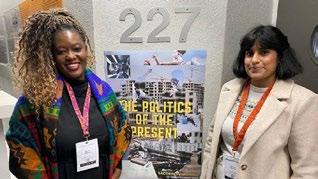
Ms Maharaj, who also works as an editorial intern for Journal of African Cinemas and a freelance story consultant, holds an MA in Media Theory and Practice from the UCT and is currently pursuing a PhD in Film Studies.
Prof Alexander bids farewell after an exceptional career
In July, FID bid a heartfelt farewell to Prof Bennett Alexander, who retired after a distinguished career spanning almost four decades. Prof Alexander had been an integral part of the institution, serving as Assistant Dean since 2017, but his journey with Peninsula Technikon began in 1985.
A proud graduate of UCT, where he earned his engineering degree, Prof Alexander’s career was marked by diverse and enriching experiences. He began his professional journey as an analogue test engineer at SAMES in Pretoria, before moving on to the O’kiep Copper Company in Nababeep as a Control Engineer. His career took a pivotal turn when he joined the Koeberg Nuclear Power Station as an Instrumentation Engineer, roles that would lay the foundation for his future in education.
In 1990, Prof Alexander shifted his focus to academia, becoming a senior lecturer, and by 1992, he had joined the Academic Development Team. His leadership potential became clear when he served as Acting Head of Department for Electrical Engineering between 1994 and 1995. His commitment to advancing his own knowledge saw him earn a master’s degree from Indiana State University in 1996.
A true visionary, Prof Alexander founded CPUT’s Electronic Media Centre in 2000, which later evolved into the 2024 Multimedia Programme. Reflecting on this initiative, he said, “It was my way of ensuring that our curriculum kept pace with technological advancements, so our students would always be at the forefront of emerging trends.” In 2001, Prof Alexander was appointed Head of the Information Technology Department, and seven years later, he was promoted to Associate Professor. His academic journey culminated in 2011 with a PhD, paving the way for his role as Assistant Dean six years later. “This role has allowed me to shape the future of the faculty and mentor the next generation of academics and professionals,” he shared.
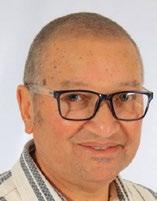
Throughout his career, Prof Alexander’s contributions extended beyond the classroom. He played an active role in learned societies and held various leadership positions, most notably as Chair of the Higher Education ICT Association for over ten years. He also led several impactful projects, including TABEISA and TELP, along with numerous SETAfunded initiatives, all aimed at enhancing curricula and developing innovative learning materials. Looking back on his nearly 40 years at the institution, Prof Alexander expressed pride in the collective achievements made possible through collaboration and a shared commitment to excellence.
Dr Adelina Mbinjama and Ms Upasna Maharaj
Prof Bennett Alexander
High-tech business lounge launched
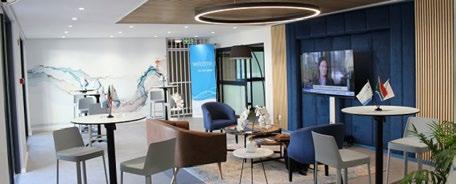
CPUT launched its first high-tech business lounge in June, showcasing its commitment to innovation and excellence. Located at the Hanover Street Residence on the District 6 Campus, the venue features state-ofthe-art technology and serves as a hub for networking and growth, enabling professionals to connect and collaborate. The lounge includes a 24-seater boardroom, a discussion lounge with amenities, air-conditioning, and customisable furniture arrangements in a business-friendly environment.
The lounge’s interior design was created by alumna Ms Amore Strauss, a BTech in Interior Design graduate. Ms Strauss has worked with prominent Cape Town interior design firms and is eager to give back to her university. “At CPUT, we have always strived to push the boundaries of innovation and excellence,” said business manager Mr Johnny Basson at the opening. “Our vision for this lounge is to create a space that embodies these values – a place where business meets comfort, and where technology enhances productivity and collaboration.”
The high-tech business lounge caters to current dynamic professionals, blending work and relaxation. This facility aims to boost CPUT’s third-stream income and foster lasting networking opportunities for the institution and community. Acknowledgment was made for project manager, Mr Phillip Chibvuri, and all partners who contributed to bringing the vision to life.
Prof Chris Nhlapo unveiled the plaque and cut the ribbon, marking the venue’s official opening, and stated the project aligns with international best practices. Mr Chibvuri noted that the project reflects “a larger scale thinking with the design of our living and learning spaces”. The ‘residence facelift project’ from the Residence Business Unit optimises space use while focusing on well-being in its design.
Journalism alumni shine at prestigious national awards
A CPUT journalism student made waves in the media industry after being named a finalist in the esteemed Standard Bank Sikuvile Journalism Awards, held in July. Advanced Diploma student Mr Samane Junior Marks, alongside award-winning Daily Maverick journalist and alumna Ms Suné Payne, were recognised in the Community Service Reporting category for their in-depth investigative piece, ‘Divided and riven with discontent: A deep dive’, published in 2023.
Mr Marks, who graduated with his Diploma in Journalism in April, expressed deep gratitude for the mentors and opportunities that have shaped his journey. “My pursuit of knowledge and dedication is a testament to God’s grace. In academia, I was fortunate to have been mentored by two distinguished scholars, Dr Sisanda Nkoala, a Media Studies lecturer, and Dr Trust Matsilele, a former politics lecturer, now senior lecturer at Birmingham City University in the UK.” Reflecting on his first year in the industry, Mr Marks described it as hands-on and challenging, driven by a strong commitment to ethical reporting.
“I was working alongside a talented Daily Maverick team of seasoned journalists such as Ms Suné Payne, Mr Velani Ludidi, Mr Vincent Cruywagen, Ms Caryn Dolley, and a dynamic editorial team led by the remarkable Ms Janet Heard, who is passionate about impactful, meaningful journalism.” Mr Marks continues to work with the Daily Maverick as a freelance court and crime reporter and credits the publication for upholding the highest standards of journalism integrity.
Ms Payne, who hails from Delft, initially aspired to study politics before enrolling in CPUT’s Journalism programme – a course that meaningfully integrates political studies into its curriculum. She acknowledged her Daily Maverick colleagues as strong mentors and cited esteemed journalists such as Mrs Lynette Francis and Ms Hazel Friedman as key influences in her career.
These achievements highlight the calibre of CPUT’s journalism graduates and their growing impact on South Africa’s media landscape.
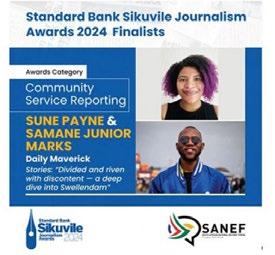
Commitment to innovation and excellence
IT Department receives honours at Huawei ICT awards
FID’s Information Technology Department received multiple accolades at the Huawei ICT Talent Development Annual Awards ceremony held in January. The department’s strong performance underscored its growing impact and excellence in digital skills training and innovation within South Africa’s higher education sector.
Lecturer Dr Waldon Hendricks proudly reported that the CPUT ICT Academy was ranked among the top five out of 71 Huawei ICT academies nationwide – a significant achievement in the country’s digital education landscape. The awards received included Excellent ICT Academy, which recognises the institution’s overall performance in delivering high-quality learning environments and industry-relevant training, and Excellent ICT Academy Ambassador Club, which honours the student ambassador club for its outreach initiatives and contribution to ICT skills development. Together, these accolades highlight the department’s strong commitment to both academic excellence and student-driven innovation.
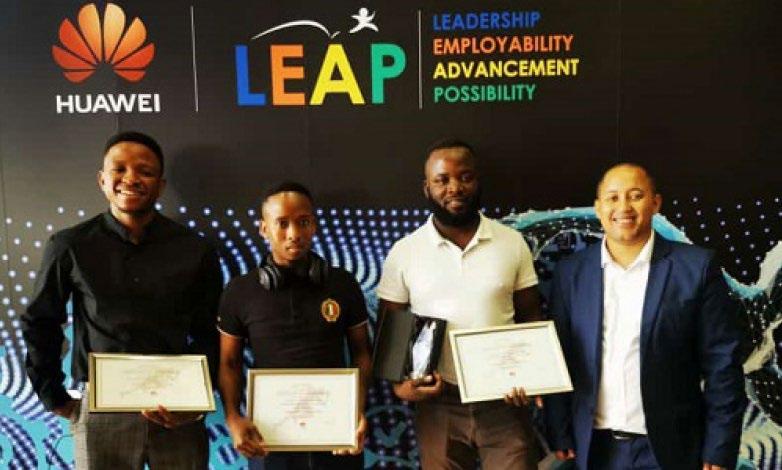
Dr Hendricks was also individually honoured with the Excellent ICT Academy Instructor Award for 2023, a testament to his leadership and dedication to student development. “My journey as a lecturer, instructor and mentor has been incredibly fulfilling – witnessing the growth and development of my students, and navigating challenges such as staying abreast of rapid technological changes,” he reflected.
The department’s success extended to the Huawei ICT Competition 2023–2024, where three CPUT students earned top accolades during the national finals. One student secured second prize nationally in both the Cloud Computing and Computing Track categories. “This recognition not only affirms the calibre of our students but also highlights CPUT’s commitment to preparing graduates who are ready to thrive in a fastevolving tech industry,” Dr Hendricks added.
Huawei’s ICT Talent Development programme aims to cultivate digital skills and bridge the gap between academia and industry by supporting universities in delivering cutting-edge training. CPUT’s achievements at the awards ceremony reflect its strategic alignment with national goals for digital transformation and youth empowerment.
Mr Retshidisitswe Seotsanyana, Mr Lorens Maleo and Dr Waldon Hendricks
IT lecturer represents South Africa on global stage IT lecturer speaks at prestigious summit
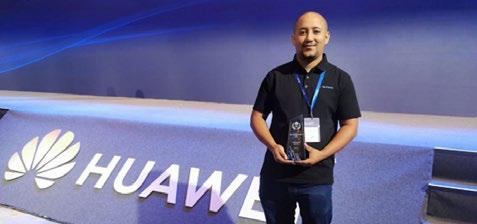
CPUT Information Technology lecturer Dr Waldon Hendricks proudly represented South Africa at the Huawei ICT Academy Most Valuable Instructor (MVI) Global Forum, held in Shenzhen, China, in June 2024. The forum took place during the Huawei ICT Competition 2023–2024 Global Final, bringing together educational leaders, top instructors, industry experts, and media representatives from around the world. It marked the first time the Most Valuable Instructor contest was included in the prestigious competition, now in its eighth year.
Dr Hendricks earned his place at the global event after excelling during the regional rounds, showcasing outstanding teaching and mentorship skills. In 2023, he coached the South African team that won first prize in the global Network Track finals, further cementing his reputation as a dedicated and effective educator. “It was an honour to represent both CPUT and South Africa at this international platform,” he said. “We strive to equip our students with real-world skills and expose them to global trends while they are still studying.”
At the forum, Dr Hendricks participated in panel discussions and workshops exploring emerging ICT education trends, collaborations between academia and industry, and innovative teaching models. Experts also shared strategies for developing ICT talent across borders. Reflecting on the experience, Dr Hendricks said it was both enriching and inspiring. “It reaffirmed the importance of investing in talent development and the need for South African educators to actively engage in global conversations around ICT education.”
Dr Waldon Hendricks, a lecturer in the Information Technology Department, was invited to speak at the prestigious Huawei ICT Academy Instructor Summit, which took place in Johannesburg in September. The event brought together DVCs, HoDs, and instructors from leading South African tertiary institutions, with Mr Buti Manamela, Deputy Minister of Higher Education and Training, delivering the keynote address. The summit also featured the launch of the TVET Colleges Curriculum Transformation Network.
Dr Hendricks delivered a talk on ‘The impact of career certification in graduates’, reflecting on the significance of industry certifications in enhancing employability. He found the summit to be a valuable experience for his professional growth, remarking, “For my career, the summit reaffirmed the importance of staying current with emerging technologies and the role of continuous learning in professional growth.”
The agreement between Huawei, the DHET, and the Shenzhen Institute of Information Technology aims to modernise the ICT curriculum at TVETs by integrating training in the latest technologies. Dr Hendricks expressed his hope that the CPUT Huawei ICT Academy would play an active role in this transformation. Mr Martin Mandioma, Programme Coordinator for Communication Networks in the IT Department, attended the event with Dr Hendricks.
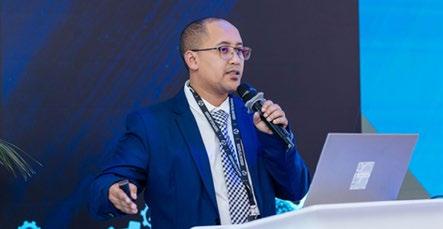
Dr Waldon Hendricks at the Huawei ICT Academy MVI Global Forum, in Shenzhen, China
Dr Waldon Hendricks at the Huawei ICT Academy Instructor Summit in Johannesburg
IT Department supports national CET project
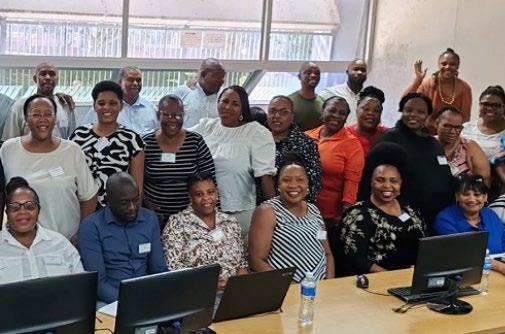
is contributing to the enhancement of teaching and learning in CET centres across the country
FID’s Information Technology Department is partnering with the DHET to support the Community Education and Training (CET) initiative. The partnership focuses on content development, e-learning training and capacity-building using the Moodle platform. Acting HoD, Dr Tabisa Ncubukezi, explained that CET is a continuation of the Adult Basic Education and Training (ABET) initiative.
In January, the department hosted CET lecturers from seven provinces, along with a DHET delegation led by Advocate Monica Van De Walt and Ms Tembisa Futshane (Deputy Director-General). Prof Bennet Alexander led the content development component, with Ms Monde Nonjabe managing the project. The platform aims to enhance teaching and learning in CET centres across the country.
Two FID academics awarded doctorates
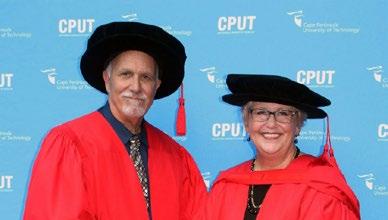
FID celebrated the success of two of its academics, who were both awarded doctoral degrees in April.
Dr Nicholas Pinfold from the Department of Urban and Regional Planning received a Doctor of Applied Arts in Design. His thesis ‘Testing middle ground: Facilitating community transition to sustainable land governance’ was supervised by Prof Masilonyane Mokhele. Reflecting on the experience, Dr Pinfold described it as both thrilling and demanding, marked by deep reflection and dedication. He thanked Prof Mokhele for his consistent support. Prior to his academic career, Dr Pinfold spent 25 years in the public and private sectors in the geomatics profession. He joined CPUT in 2008 and has been involved in community engagement and servicelearning projects related to communal settlement development in the Western Cape.
Dr Veronica Barnes, from the Department of Applied Design, was awarded a DTech in Design. Her thesis ‘Empathy in practice: A grounded theory in industrial design’, was supervised by Prof Nic Theo and Dr Vikki Eriksson. Dr Barnes described doctoral study as a test of endurance and a reflection of the strength of one’s support system. “I love discovering new things, and that’s what research is all about,” she said. Although her topic was challenging and contentious, she found wrestling with its complexity deeply rewarding. She credited her supervisors for their ability to ask difficult, thought-provoking questions.
CPUT
Dr Nicholas Pinfold and Dr Veronica Barnes
Couple graduate together for the second time
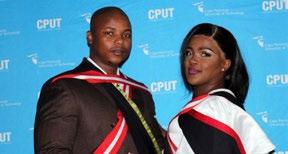
It was a double celebration for husband and wife, Mr Siyamthemba Ncanywa and Mrs Khwezikazi Maceba, as they graduated together during FID’s April evening ceremony. Both were awarded a Postgraduate Diploma in Information and Communication Technology. Remarkably, this was the second time the couple graduated together at the same ceremony.
In 2022, Mr Ncanywa earned an Advanced Diploma in Information Communication Technology in Multimedia Applications, while Mrs Maceba obtained a BTech in Information and Technology Management. “It’s a wonderful feeling to graduate together because we push each other to succeed in everything we do. This is another milestone, and you’ll see us again at our master’s graduation,” said Mrs Maceba.
The couple, who both developed a passion for computers in high school, hail from the Eastern Cape – Mrs Maceba from Engcobo and Mr Ncanywa from Middledrift (Xesi). At their 2022 graduation, their daughter was six months old. “This year [2024], we are graduating again, and we had our second-born on the 29th of February,” she shared. Mr Ncanywa is employed as a Problem Management Technical Lead at the City of Cape Town, while Mrs Maceba works as an IT Quality Tester for Pepkor Payments and Lending.
Heritage Entrepreneurship Day celebrates student innovation
Student innovators took centre stage at Heritage Entrepreneurship Day in October, hosted on the District 6 Campus through a collaboration between FBMS and the Division of Student Affairs. The event combined market stalls, industry talks, and networking opportunities, giving students the chance to showcase their entrepreneurial skills and learn from experienced professionals. Ms Mandie Richards, senior lecturer and Chair of the Transformation and Social Cohesion Forum, praised the event’s role in strengthening collaboration within FBMS and with African Bank – a partnership initiated by Ms Andiswa Mrasi. Departments including Business and Information Administration, Entrepreneurship, Retail, and Marketing integrated the initiative into their curricula, enabling students to sell products and services. Proceeds supported non-profit organisations with much-needed resources.
BIIC participants showcased their enterprises, while entrepreneur Dr Quinton Simpson, author of The Business Legend, inspired students
with his journey and advice, “Your business legacy is in your hands.” Ms Zibu Masotobe, African Bank’s Money Master Class Coordinator and CEO of Zoluhle Financial Wellness, engaged students on consumer education and the value of setting clear goals. African Bank’s Head of Transformation, Ms Elizabeth Ramashala, reaffirmed the organisation’s commitment to entrepreneurship and encouraged students to embrace opportunities. Prizes recognised outstanding contributions: the Spirit Award went to BIA group Sweet and Savoury (sponsored by Makro), the Marketing Award to Sweets Stakz Den, and Best Product aligned with the theme to SIIBAs Creations.
A BIIC innovator summed up the event’s ethos, “We must cultivate an entrepreneurial mindset, not rely on BB-EEE, to tackle unemployment. As educators, we need to partner with industry and government, align graduate attributes, and create real opportunities for employability while encouraging civic engagement and paying it forward.”
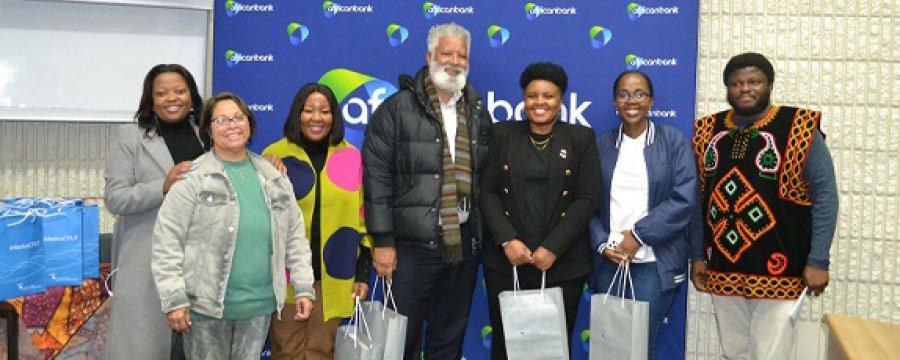
Mr Siyamthemba Ncanywa and Mrs Khwezikazi Maceba
Innovators and educators champion entrepreneurial mindsets
IN THE NEWS
New book explores organisational communication in Africa
Dr Blessing Makwambeni, a senior lecturer in the Department of Media, is the editor of the newly released Organisational Communication in Africa: Navigating a Digitalising World. The book examines how digitalisation is reshaping organisational communication across Africa, offering insights and strategies from a Global South perspective.
Co-edited with Dr Sam Usadolo of DUT and Dr Queen Usadolo of NWU, the book grew from the trio’s discussions about combining communication science and organisational behaviour to address current challenges. “We aimed to create a resource for our modules that integrates both fields to explore organisational communication issues from a Global South lens,” said Dr Makwambeni. Palgrave Macmillan has published the first volume, with a second on organisational behaviour, communication, and technology due in February 2025. Dr Makwambeni also co-authored a chapter on the appropriation of AI in organisational communication with Dr Patricia Makwambeni of UCT. He hopes it will guide AI usage in Global South organisations.
The book’s release capped a prolific year for Dr Makwambeni, who co-published two journal articles and six book chapters in 2024 – over ten publications in total – earning more than six DHET research units. Both online and print editions of the book were released in November 2024.
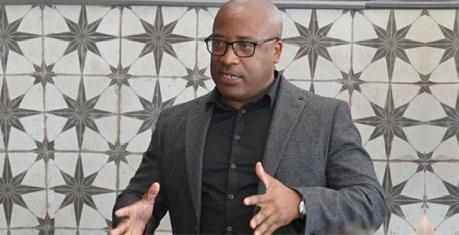
A sparkling graduate
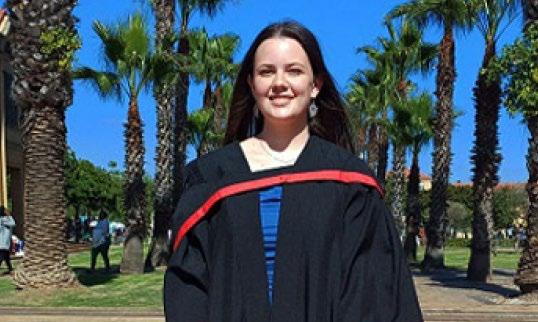
Ms Jana Basson concluded her Diploma in Jewellery Design and Manufacture with distinction, winning the 2023 PlatAfrica Jewellery Design and Manufacturing Competition in the Student/ Apprentice category. She was among the proud FID graduates at CPUT’s April Autumn Graduation. Her winning piece, a multipurpose neckpiece/bracelet titled ‘Unity’, earned her a cash prize, media exposure, and an all-expenses-paid design workshop at Platinum Guild International (PGI) India. Hosted annually by Anglo American Platinum, Metal Concentrators, and PGI India, the competition promotes local design talent and skills development in the platinum jewellery industry.
“It’s been my biggest achievement,” Ms Basson shared. She first entered the competition in 2022, when she and classmate Ms Thembani Gobingca both placed in the top 10. In 2023, they entered again with excellent results – seven of the ten finalists were from CPUT, with an eighth earning a special mention. “We were ecstatic and celebrated together.”
Originally from Oudtshoorn, Ms Basson decided to pursue this field after attending CPUT’s 2019 Open Day, where she was captivated by the Jewellery Design and Manufacture display. She is currently completing a two-year internship in the field.
Dr Blessing Makwambeni
Ms Jana Basson
Talented student wins prestigious design award
An Advanced Diploma in Interior Design student has been announced as one of the student winners in the prestigious SIT Furniture Design Awards in August.
Ms Kayla Obbes won the Furniture Design: Armchair Category for her design titled ‘Grounded’. Her design is “a statement seating piece embracing an organic, harmonious, down-to-earth, and soothing energy. Conceptually derived from a brass singing bowl and the experience thereof. Embracing shape; held space; centred and grounded.”
Ms Obbes said that during her third year of study at BHC School of Design in 2023, the students were tasked with designing a furniture prototype.
“Then, when I started my Advanced Diploma at CPUT, my lecturer Ms Colleen Cocotos, looked through my work and saw potential in this design, encouraging me to enter the SIT furniture design award. I reworked some of my design and uploaded it... When I got the email from the awards to congratulate me as a winner, I was quite taken aback. I was not expecting it at all.”
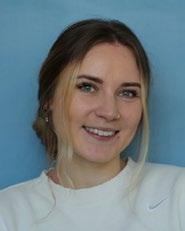
Ms Kayla Obbes
Ms Obbes expressed her gratitude for the immense support and guidance from her lecturers at BHC during the design, development, and manufacturing process, and to Cocotos for her support and encouragement.
Ms Cocotos commented, “I strive to ensure that our students are recognised for their hard work, both locally and internationally. I present these opportunities, and the students are the ones who fulfil the necessary outcomes. I appreciate Kayla’s proactive commitment to her work.”
CPUT strengthens ties with Federal Centre for Technological Education
of Minas Gerais
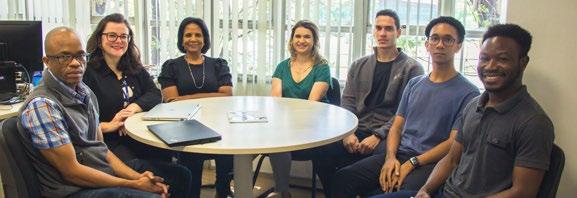
As part of CPUT’s ongoing efforts to expand international collaboration and strengthen its global research partnerships, Prof Masilonyane Mokhele, HoD: Urban and Regional Planning, visited the Federal Centre for Technological Education of Minas Gerais (CEFET-MG) in Brazil in October. The visit formed part of CPUT’s strategic drive to enhance cooperation with leading institutions in the Global South, building networks that support shared learning, innovation and sustainable development.
The exchange aimed to strengthen academic and research cooperation between the two institutions through the involvement of staff, students and professional personnel, and to advance collaboration in research, teaching and community engagement. It also contributes to CPUT’s strategic goal of fostering partnerships within the BRICS network of countries – Brazil, Russia, India, China and South Africa.
During his time at CEFET-MG’s Nova Suíça Campus, Prof Mokhele participated in a series of meetings and academic activities. He also delivered a public lecture titled ‘Proposed study on the characterisation of logistics companies in the functional region in relation to Cape Town International Airport’. The lecture, attended by staff and postgraduate students from CEFET-MG’s Department of Transport Engineering and Graduate Programme in Civil Engineering, generated valuable discussion around shared urban and regional development challenges.
The visit marks an important step towards the formalisation of an institutional cooperation agreement between CPUT and CEFET-MG, currently under consideration by CEFET-MG’s Board of Directors. Once concluded, the partnership will enable joint research, exchange opportunities and the development of collaborative projects that support innovation and capacity building across both universities.
Article adapted from Journalism and Content Coordination – SECOM/CEFET-MG
Prof Mokhele with some of the CEFET-MG faculty during his visit
ACADEMIC DEVELOPMENT & SUPPORT

CENTRE FOR COMMUNITY ENGAGEMENT AND WORK-INTEGRATED LEARNING
Cooperative Education Unit
Service-Learning and Civic Engagement Units
CENTRE FOR INNOVATIVE EDUCATIONAL TECHNOLOGY
CPUT LIBRARIES
FUNDANI CENTRE FOR HIGHER EDUCATION DEVELOPMENT
HIV/AIDS UNIT
STUDENT COUNSELLING
CENTRE FOR COMMUNITY ENGAGEMENT AND WORK-INTEGRATED LEARNING (CCEWIL)
PROF LALINI REDDY [ until December 2024 ]
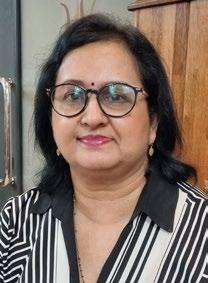
CCEWIL is committed to fostering meaningful engagement with our quintuplehelix partners, both nationally and internationally, across teaching and learning, research and community engagement. Through these collaborations, we aim to enrich our academic programmes, ensure their continued relevance in a rapidly changing world, and support the professional growth of both staff and students. These partnerships also play a vital role in enhancing graduate employability and driving innovation.
The centre comprises several dedicated units, whose key activities and achievements for 2024 are outlined below.
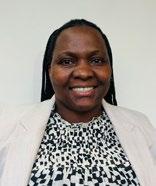
Contribution prepared by: Ms Zimkitha Mbunge mbungez@cput.ac.za
COOPERATIVE EDUCATION UNIT
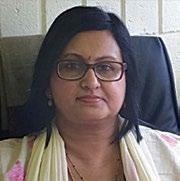
Manager: Prof Lalini Reddy [until December 2024]
The Centre for Community Engagement (CE) and WorkIntegrated Learning (WIL) is committed to fostering strong and meaningful partnerships with stakeholders both nationally and internationally. These collaborations aim to enhance teaching and learning experiences, support research, and promote impactful community engagement projects. By working with a diverse range of partners, the centre strives to enrich academic programmes, ensuring they remain relevant and responsive to both global and local needs. These partnerships also offer valuable opportunities for staff and student development, equipping them with the skills, knowledge and experiences necessary for personal growth and professional success. Through these initiatives, the centre plays a vital role in cultivating a vibrant academic environment that champions innovation, inclusivity and sustainable development.
Conferences
The SASCE WIL Africa Conference took place in October at the Century City Conference Centre in Cape Town. CCEWIL co-hosted the event and played a key role in managing the front registration desk. CPUT’s VC, Prof Nhlapo, delivered the welcome address as co-host, while the DVC: Teaching & Learning, Prof Balkaran, participated in a panel discussion on partnerships and entrepreneurship.
CPUT academics contributed five oral presentations and one poster presentation. Prof Lalini Reddy took part in the WIL research panel on the final day. In addition to academic
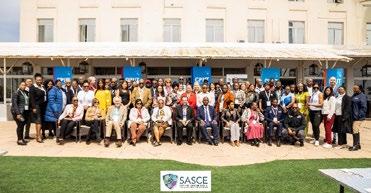
Delegates
contributions, CPUT provided financial support for the conference and sponsored the pre-conference workshop on WIL research, held at the Cape Town Hotel School in Granger Bay. The workshop was a great success, with Prof Karsten Zegwaard from New Zealand, Chief Editor of the International Journal for Work-Integrated Learning (IJWIL), delivering the keynote address.
In November, the Graduate Recruitment Officer, Ms Bronwyn Abrahams, and the FHWS WIL Coordinator, Dr Lizel Hudson, attended the SAGEA Careers Service Forum 2024, held in Johannesburg. The forum featured a range of local and international speakers, focusing on the sharing of best practices, addressing key challenges within the field, and fostering meaningful dialogue. The event provided valuable opportunities for collaboration, networking, and learning. Attendees left with fresh insights, practical strategies, and innovative ideas to apply in their respective roles.
at the SASCE WIL Africa Conference
Workshops and symposia
CCEWIL co-hosted the CHEC Dual Higher Education Project (DHEP) Terms of Reference and Evaluative Framework Workshop in October at CPUT’s Hotel School. The aim of the workshop was to develop a clear and comprehensive framework to guide the implementation and evaluation of dual higher education programmes. This included establishing terms of reference to define the roles, responsibilities and expectations of stakeholders involved in dual education, as well as creating an evaluative framework to ensure these programmes meet academic standards while offering meaningful, WIL experiences. The workshop also sought to foster collaboration between higher education institutions and industry partners, ensuring that dual education programmes remain responsive to industry needs and contribute to graduate employability.
In March, the Cooperative Education Unit hosted a WIL Indaba Workshop at the Hotel School on the Granger Bay Campus. The workshop featured roundtable discussions focusing on the highlights, challenges and suggestions for improving WIL programmes. A comprehensive report was compiled based on the discussions and outcomes of the workshop. The event was well attended, with 29 industry representatives and CPUT staff participating and contributing valuable insights to enhance the effectiveness of WIL initiatives.
Publications
Prof Reddy co-edited the book Educators’ Work Integrated Learning Experiences, published as an eBook on SpringerLink and also available in print format via the same platform. Edited alongside other scholars, the volume explores educators’ WIL experiences through transformative narratives, bridging theory and practice. Prof Reddy’s chapter ‘The changing faces of work-integrated learning’ opens the collection, which contributes rich, globally grounded insights. Readers can access the book digitally via SpringerLink at home, work, or in the library. A printed edition may also be ordered through the platform.
International projects
The ‘IFC World Bank Project’ is addressing the gap in the consolidation of Career Services at CPUT. A closeout meeting was held in December, during which Prof Lalini Reddy and Dr Mofope Omotunde IsraelAdegboye presented the roadmap for career services on behalf of the IFC World Bank. Prof Driekie HaySwemmer requested that this roadmap be presented at the first Mancom meeting of 2025.
The ‘University–Industry Co-Creation Project’ is an Erasmus+ Capacity Building initiative hosted within the SADC region. It is designed to redefine collaboration between universities and industry, modernise curricula, foster innovation, and produce more employable graduates. The kick-off meeting took place in October, and was attended by Prof Reddy, Dr Lizel
Hudson and Mr David Haarhoff. THENSA, which currently coordinates this project, is collaborating with universities to provide the necessary skills – such as curriculum development – to ensure that students are industry-ready and gain a solid understanding of entrepreneurship, which will be embedded into the curriculum. Prof Reddy participated in a roundtable discussion in November, at the virtual 12th Annual UEED Conference on Entrepreneurship and Enterprise Development in Africa.
CPUT is also involved in the THENSA Entrepreneurship Education Programme (TEEP), which aims to train all educators to integrate entrepreneurial competencies into their curricula. Prof Reddy attended a series of workshops throughout the year. The THENSA course developer and pilot training will take place in January 2025 in Johannesburg. JAMK University (Finland) and MTU (Ireland) form part of the training team. CPUT sent faculty representatives to attend the pilot training, who returned inspired and committed to advancing the implementation of this training.
SERVICE-LEARNING AND CIVIC ENGAGEMENT (SLCE) UNITS
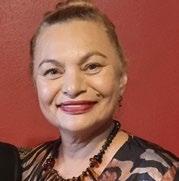
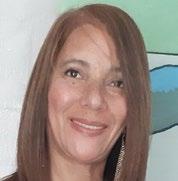
Manager: Service-Learning and Civic Engagement
Ms Jacqueline Scheepers reddyl@cput.ac.za
Administrator: Service-Learning Unit
Ms Theresa Burns burnst@cput.ac.za
The Service-Learning and Civic Engagement (SLCE) Units work in partnership with government departments, local communities, and university staff and students to achieve meaningful and sustained impact. These collaborations aim to address social challenges while enhancing learning opportunities through community engagement. Various support and service units across the university contributed to and actively supported initiatives that were implemented in both urban and rural communities. Below are some of the key highlights from these activities.
1. Service-Learning (SL) Projects
Service-Learning (SL) offers students the opportunity to apply the theoretical concepts of their academic disciplines to real-life contexts, addressing societal challenges and meeting the needs of communities. Through this engagement, students develop vital competencies and life skills. SL provides a natural platform for the realisation of CPUT’s graduate attributes, as articulated in the institutional Vision 2030. This pedagogical approach creates opportunities for students to implement academic theory in ways that can positively impact individuals and groups in society.
Academic staff who champion SL within their departments are encouraged to include these achievements in their promotion portfolios. To recognise their contributions, the SL Unit issued certificates to lecturers who participated in SL projects.
The graphic below illustrates the distribution of SL projects across departments and faculties throughout the institution. The SL Unit is committed to continuing the development of a vibrant community of practice that supports engaged teaching and research – strengthening the scholarship of engagement at the university. Looking ahead, we aim to reimagine and revitalise SL programmes through staff and student capacity building, the advancement of engaged research, and the deepening of university–community partnerships.
In 2024, the Service-Learning Unit supported all six faculties in implementing SL projects, which contributed significantly to achieving CPUT’s graduate attributes and learning outcomes as outlined in the respective academic programmes.
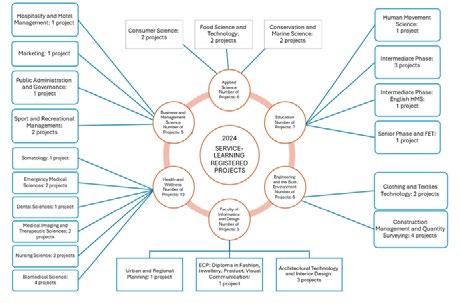
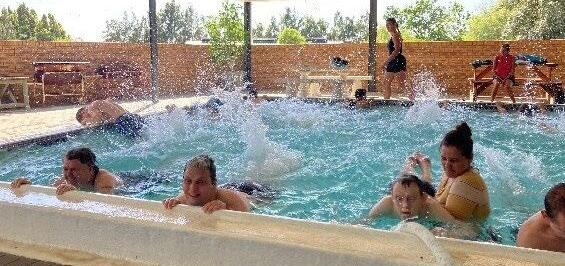
Prof Maretha Opperman, Prof Elizabeth Kempen (UNISA), Mrs Rache Hanekom, and Dr Sune Henning, 2024–2025
Examples of service-learning projects
a) The Down syndrome SL Swimming Project
This project was implemented on a weekly basis, every Thursday, at Sunfield Home in Wellington, a care facility for individuals with intellectual disabilities. As part of their Service-Learning activities, students delivered structured physical education sessions aimed at promoting physical well-being, coordination, and social interaction among the residents. The initiative not only supported the physical health of the community but also offered students valuable practical experience in applying their academic knowledge in a compassionate and inclusive environment.
The Weskusmandjie Group, established in 2018 in Steenbergs Cove, St Helena Bay, was formed by a collective of subsistence fisherwomen seeking economic empowerment through small-scale food production. Under the leadership of Mrs Hilda Adams, who understood the challenges faced by women in the local fishing industry, the group adopted a business model that would generate income while preserving indigenous culinary traditions. Their initial focus was on producing seafood-based products such as pickled mussels, rollmops, and bokkoms. These bokkoms are currently sold via the Abalobi Pantry – an online platform supporting responsibly caught seafood sourced directly from small-scale fishers.
Despite their efforts, Weskusmandjie faced barriers to sustainability, including limited knowledge of food safety, inadequate business skills, and intermittent market access. In response, CPUT and UNISA, in partnership with SAASTA,
Students conducting physical education lessons at Sunfield Homes, Wellington
b) NRF DSTI Science Shop funding (SAASTA)
designed a project to equip the group with scientific, technical, and entrepreneurial skills. The aim was to improve their business operations and product quality, securing long-term sustainability. Using a community-driven research model, local communities and academic institutions collaborated to develop and implement business oriented and scientific interventions. These ensure that Weskusmandjie’s products meet industry standards for food safety and quality, thereby expanding their market reach.
The project employed a community-based participatory research approach, involving collective, systematic and reflective inquiry between researchers and community stakeholders to foster education, improve practices, and catalyse social change (Tremblay et al., 2017). Needs were identified through round-table discussions with the Weskusmandjie members – further details of the methodology are available in the original SAASTA funding proposal.
AIM 1: Training in Product Development and Food Safety
• Experiential learning
Following Kolb’s Experiential Learning Theory (Kolb, 1984), the project focuses on hands-on skills acquisition in product development and food safety.
• Food safety training
In 2021, Weskusmandjie received basic food hygiene instruction and training in Regulation R638 (SADoH,
2018). A refresher workshop emphasised the active implementation of R638 in production kitchens, with a focus on meticulous record-keeping using food safety management systems such as Hazard Analysis and Critical Control Points (HACCP). The aim was to track how effectively participants applied their training in practice.
• New product development workshops
Interactive workshops were held at CPUT’s Department of Food Science & Technology, following research on mussel-based products conducted by an MSc student and a fish-product consultant. Participants received iterative feedback – both written and oral – on each stage, helping to refine and improve new product ideas.
• Product and recipe development
The process followed typical new product development stages: idea generation, screening, feasibility assessment, prototype formulation, and recipe development. Bench recipes were trialled and refined through informal tastings, and acceptable recipes were advanced to structured consumer acceptability tests, yielding formal product specifications.
• Quality evaluation and shelf-life testing
New products underwent thorough quality assessments – microbial analysis (e.g. Vibrio spp., Salmonella spp., Listeria monocytogenes, Enterobacteriaceae), fatty acid profiling, and
proximate composition tests. Consumer acceptability was evaluated using a 7 point hedonic scale, with Fisher’s exact test (p < 0.05) used to identify significant differences.
AIM 2: Business Skills Development
• Comprehensive entrepreneurship training
Face-to-face sessions covered i) business startup essentials (identifying opportunities, selecting business types); ii) business management skills (financial management, marketing, communication, sales, customer service); iii) understanding financial statements (income, balance, cash flow); iv) building a business plan, personal branding, and legal frameworks (including cooperative values and policies); v) commercialisation and innovation strategies; vi) technology and social media; vii) risk and safety management; and viii) human resource and project management.
• Data collection and evaluation
A mixed-methods approach was used: in-depth interviews captured qualitative insights (recorded and transcribed), including consumer perspectives and entrepreneurial outlooks, while quantitative data were gathered via structured questionnaires (demographics, sensory ratings) and laboratory analyses for nutritional composition, microbial load, colour changes, and fatty acid profile.
2. Civic Engagement Co-Curricular Community Engagement Projects
This year, the Faculty of Education launched a civic engagement Grade 8 support initiative at Weltevreden Secondary School in Wellington. The project overview is provided below.
MOM Project – Mind over Matter
Ms Sandra Swanepoel, lecturer in Mathematics, SPFET Wellington Campus
A group of Mathematics Literacy and Mathematics students from CPUT’s Wellington Campus supported all 216 Grade 8 learners at Weltevreden throughout 2024. Mr Aswell Dampies, a third-year BEd student and former learner at the school, conceived this community project, believing that addressing mathematical knowledge gaps at this stage can significantly improve learners’ confidence and future academic choices. Having lacked support for Mathematics himself, Mr Dampies saw this as an urgent need.
Under the guidance of Ms Swanepoel and the WIL Coordinator for the SPFET Department, the initiative received full backing from the school’s teachers and principal. The school is located in an area severely affected by gang activity, and many learners face significant challenges outside the classroom, including low motivation and a limited sense of future prospects.
The intervention aims to support learners struggling with Maths content, bolster confidence, and identify
and address related issues such as reading or learning difficulties. Each Monday afternoon for approximately 20 weeks during 2024, around 40 (mostly volunteer) CPUT students visited the school. Second-year Maths and Maths Literacy students also contributed through assessment-based participation in the project.
Additionally, a third-year Mathematics student, who completed her second teaching practice at the school, recognised that the two Grade 12 learners lacked proper support. [Ms name + surname] volunteered to tutor them until their exams at the end of the year, with assistance from her peers and Ms Swanepoel in providing resources, planning, and strategies.
The project team intends to extend the programme to Grade 9 and resume with a new cohort of Grade 8s in the new school year. The goal is to increase the number of learners advancing with Maths to Grade 12 and to support any Grade 9 learners progressing to Grade 10 who wish to continue Maths (notably, there were no Grade 10 or 11 learners taking Mathematics at the school in 2024).
Mr Dampies is the driving force behind this initiative. He and the MOM Project team face obstacles with determination, adapting plans as needed. Special mention goes to Mr Jayden Rooi, Ms Phoebe Grobler, Ms Shanize Farmer, and Ms Jamie Warne –a third-year tutor – whose leadership exemplifies the spirit of the project.
Community Engagement Student Academy (CESA)
In 2024, the Civic Engagement Unit welcomed 242 new and returning students into the Community Engagement Student Academy (CESA), funded by the DHET University Capacity Development Grant.
Participants could choose from a range of community projects. Once teams were formed, democratic elections selected project leaders who then named their teams. Students collaborated via WhatsApp to discuss, plan, and share information – providing real-world, interdisciplinary learning experiences in a community context. Most projects ran from April to November.
Existing CESA alumni supported new students throughout the project cycle. In 19 November 2024, project leaders attended a workshop to present their initiatives, receive feedback, and refine their presentations ahead of the CESA Student Conference.
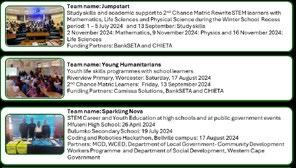

CESA student projects and alumni initiatives
In response to alumni feedback in 2023, this year saw CESA alumni take leadership of their own community-based projects. Key partners included Gift of the Givers, the Robben Island Museum, and Camissa Solutions, which provided resources and on-the-ground support.
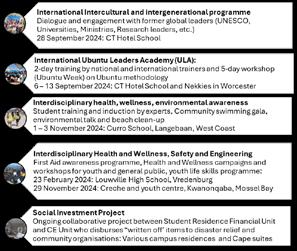
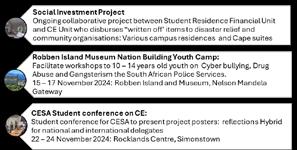
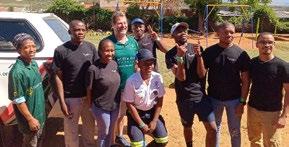
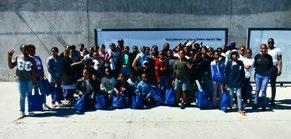
At the November CESA Student Conference, students exchanged ideas, presented project highlights and challenges, and planned future activities. Facilitators offered constructive feedback to guide future efforts. Attendees – including students, alumni and facilitators – received certificates recognising their participation in workshops, conferences and implemented projects. A reflective session enabled delegates to share insights, and feedback was collated into a planning report for the next academic cycle.
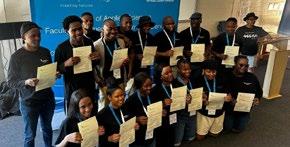
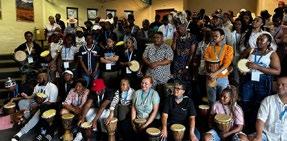
CESA student teams and project details
CESA alumni projects
Gift of the Givers deliver refreshments and care packages in Kwanonqaba
Students with the school learners as Robben Island
Students received certificates at the conference
Intercultural engagement at the conference
Recruitment for new CESA students will commence in the first term of 2025, with applications conducted online.
3. 2nd Chance Matric Rewrite Project: VC’s Prestigious STEM
Project
The CPUT 2nd Chance Matric Rewrite Project forms part of Prof. Nhlapo, Vice-Chancellor of CPUT’s Prestigious STEM School project. CPUT is serious about addressing the shortage of skills in the STEM fields and wants to encourage learners to persevere to achieve in the STEM subjects.
The Matric 2nd Chance Project was initiated with the primary goal of providing an opportunity for individuals who did not achieve their desired results in their matric exams to improve their performance and secure a higher qualification. The project aimed to provide targeted support, including remedial classes, exam preparation, and mentoring, to enable learners to retake their matric exams and achieve better outcomes.

In 2024, CPUT received funding from two funders, namely BANKSETA and CHIETA. The funding was administered by the SLCE Units to support the placement of the following numbers of learners:
4. National Partnerships
The South African Higher Education Community Engagement Forum (SAHECEF)
SAHECEF is a national forum dedicated to community engagement in higher education. It convenes regular board and executive meetings and promotes interinstitutional collaboration across South Africa. The forum’s mission is to provide a platform for knowledge exchange, project collaboration, and sharing of resources and expertise.
• The SLCE Units hosted SAHECEF’s executive and board meeting and national symposium in June. Prof Darren Lortan (Chairperson of SAHECEF, DUT) co-facilitated the event with Ms Jacqui Scheepers, Manager: SLCE.
• The board meeting took place at the Cape Town
Hotel School, and featured a keynote address by Prof Priscilla Daniels, Director: Community Engagement at the UWC. A hybrid format was offered to accommodate members unable to attend in person.
• The national symposium was held at SARETEC and also followed a hybrid format. Dr Marisol Morales, Executive Director of the American Council on Education, delivered a presentation on Carnegie Elective Classifications for Community Engagement.
5. International Partnerships and Projects
HAN Project
HAN stands for Hogeschool van Arnhem en Nijmegen (HAN University of Applied Sciences) is a prominent university of applied sciences in the Netherlands, known for its strong emphasis on practical, hands-on education and international collaboration, including in fields like education, social work, and health sciences.
The CPUT–HAN Community Engagement Project continues to strengthen its partnership with the Faculty of Education and the SLCE Units. From February 2025, two HAN students from the Faculty of Education will undertake six-month SL projects in Genadendal and Theewaterskloof. Opportunities for internationalisation involving CPUT students are already underway, and further collaborative initiatives with HAN University are being explored.
2nd Chance Matric Rewrite: STEM educators teaching on Saturday mornings
DAAD Project
DAAD stands for Deutscher Akademischer Austauschdienst (German Academic Exchange Service). It is a major German organisation that promotes international academic exchange, offering funding for collaborative research, student and staff mobility, and development-related partnerships
The DAAD-funded international project at CPUT, in partnership with NUST and Flensburg University of Applied Sciences (FUAS), Germany, aims to build international community-engagement partnerships. Known as CESAR, the initiative aligns with SDG 17: Partnerships for the goals. Running from 2023 to 2026, the project seeks to drive social transformation, nation-building, internationalisation, and knowledge exchange through collaborative efforts.
The primary objective is to support SDGs through community-engaged social entrepreneurship projects focused on:
• SDG 6: Affordable and clean energy
• SDG 7: Clean water and sanitation
• SDG 11: Sustainable cities and communities
To achieve this, an international, transdisciplinary team consisting of university staff and external partners – including government, industry, and community representatives – is engaged in capacity-building workshops and knowledge exchange. CESAR benefits from expertise in CE, SL, entrepreneurship, sustainable development, urban
and regional planning, sustainable construction, energy, water, sanitation, curriculum development, project management, and engaged research.
The international project delegation visited CPUT in November. They participated in workshops that included a planning tour of Robben Island and a visit to the Sustainability Centre in Stellenbosch. Two strategic partners have been identified for 2025 SL project implementation: the Robben Island Museum and the City of Cape Town. Project sites will include Robben Island and various public spaces in the Western Cape.
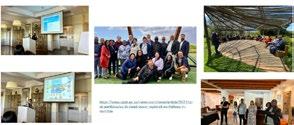
THENSA: Entrepreneurship Mentor in Residence (MiR)
The Manager of the SLCE Units was nominated to participate in a THENSA project aimed at promoting entrepreneurship. The Entrepreneurship Mentor in Residence (MiR) programme is a central component of the Entrepreneurship Venture Builder (EVB) project. This programme connects entrepreneurial mentors with Minimum Viable Product (MVP) teams and is designed to nurture entrepreneurial thinking, foster
innovation, and align entrepreneurial development with academic standards. It offers a structured yet flexible framework for developing mentees into transformative leaders capable of addressing realworld challenges through venture-based learning.
Venture-building learning refers to the acquisition of knowledge and skills necessary to create and launch new businesses from the ground up. It includes a comprehensive understanding of the venture-building process – from ideation and validation to scaling and exit. This learning encompasses the identification and assessment of market opportunities, the development of innovative business models, the navigation of product development challenges, and the formation of high-performing teams. Venture-building education typically combines theoretical frameworks, practical tools, and hands-on experience, equipping individuals to manage the uncertainties and demands of launching successful ventures.
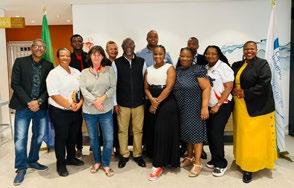
CPUT DAAD CESAR workshops and project site visits
The EVB team represented by THENSA, BIIC and university mentors
The activities conducted this year include an Onboarding Workshop in November, and a National Mentor Workshop in December. An RISA MiR Roll-out Session is scheduled for January 2025. The funded portion of the project is scheduled to conclude in March 2025.
International Ubuntu Leadership Academy
The International Ubuntu Leaders Academy (ULA) is led by Instituto Padre António Vieira (IPAV) in collaboration with CPUT’s SLCE Units and the CCEWIL. IPAV is a Portuguese nonprofit organisation dedicated to promoting social innovation, civic engagement, and youth development. This non-formal education initiative, developed by IPAV, aims to empower young people through values-based leadership training and workshops rooted in the African philosophy of Ubuntu, which emphasises shared humanity, compassion, and interconnectedness.
The SLCE Unit is part of this global movement and forms part of the Sub-Saharan arm of the Ubuntu Leaders Network. The Ubuntu methodology supports the development of five core competencies fundamental to human growth: becoming a person. ULA is a youth-focused programme that develops socio-emotional skills aligned with Servant Leadership, Bridge Building, and the Ethics of Care.
The Ubuntu Training of Trainers took place in September at the Cape Town Hotel School on the Granger Bay Campus. The Ubuntu Training
Workshops were held in September at Nekkies Resort, Brandvlei, in Worcester.
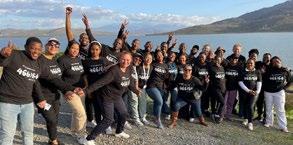
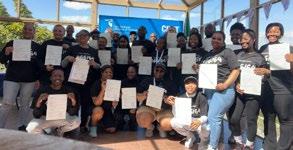
6. Community Engagement Research
Engaged scholarship and support to faculties and support units to produce research outputs continued to be a focus during 2024. The quality of community engagement and collaborative partnerships will remain a top priority for the SLCE Units moving
forward. Below are some of the research outputs produced:
• ‘Patient-centred care measures through the eyes of South African radiographers and patients: A survey approach’, Journal of Medical Imaging and Radiation Sciences, 55(4) https://doi. org/10.1016/j.jmir.2024.101725
• ‘Exploring the experiences of sonography students with simulation-based learning: A perspective from South Africa’, Journal of Medical Radiation Sciences http://doi.org/1 0.1002/ jmrs.814
• ‘July 2021 civil unrest: South African diagnostic radiography students’ experiences’, Health SA Gesondheid Journal, 28, ISSN: (online) 20719736, (print) 1025-9848
• ‘Resilience from the perspective of diagnostic radiography students’, Radiography, 29(1) https://doi.org/10.1016/j. radi.2022.10.001
In conclusion
The SLCE Units would like to express their sincere appreciation to all internal and external stakeholders for their invaluable contributions, active participation, and continued commitment to advancing scholarship within the field of Service-Learning and Civic Engagement. Your dedication, collaboration, and passion play a vital role in strengthening engaged teaching, learning, and research at CPUT.
Students, staff and community partners with ULS branding
Students received certificates of completion on the last day of the workshop
CPUT cements ties with business and industry
CPUT engaged business and industry partners in July to launch the Institutional Industry Advisory Forum. This will advise on job market trends related to work-integrated learning, curricula, research, and innovation. Held at the Cape Town Hotel School on the Granger Bay Campus, the event offered valuable networking opportunities and showcased cutting-edge CPUT research.
VC, Prof Chris Nhlapo, emphasised that collaboration in research and innovation between universities and industries is crucial for a country’s economic development. “Industry benefits from state-of-the-art laboratories and technology from academia, while higher education institutions learn about business reality and market needs.” Prof Dina Burger, Director: DRD, reflected that the event was a significant day and milestone on the calendar for the CPUT community. Prof Burger mentioned that one of the university’s focus areas was smart engagement and strong links with quintuple helix partners.
The keynote speaker was PRASA’s acting regional manager, Mr Raymond Maseko, who said that PRASA was the beneficiary of a partnership with CPUT. He outlined the important role students played in the recovery of PRASA’s rail network. Mr Maseko explained that when the train service resumed after the hard lockdown (2020), PRASA had to recover much of its network, which had been destroyed during the lockdown. “Because we were planning now to recover the service, we increased our intake from CPUT (2021) to about 36 students from the electrical engineering school, from mechanical engineering and also we took some operations management students.” Some worked as project managers. He noted that 21 of these students were now permanent PRASA employees. “We have recovered all of the stations with the people that we have been working with, from industry, of course other contractors, but specifically from people that we have sourced from partnering with CPUT.”
Prof Lalini Reddy, Director: CCEWIL, viewed it as an honour for the centre to co-host the event. “In launching the Institutional Industry Advisory Forum, we commit to offering our future-proof curricula in preparing them for the future world of work.” Prof Rishidaw Balkaran, DVC: Teaching & Learning, shared insight that the idea was to ensure that CPUT made learning relevant for students but there were also benefits for industry, including from the cutting-edge research conducted at the institution.
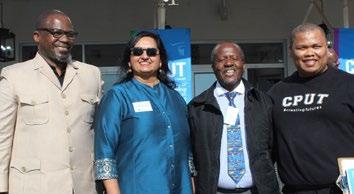
Mr David Haarhoff, project leader at CCEWIL, pointed out that events of this nature aligned with the institution’s vision of being an inclusive university that constantly strives to collaborate and innovate with industry partners.
The focal point of the event was to recognise the dedication of industry partners in affording CPUT students the opportunities to develop professionally. The engagement and networking of industry partners recognise the university’s research efforts and provide relevant trends within the industry which align to the curriculum.
WIL coordinators inducted to strengthen graduate employability
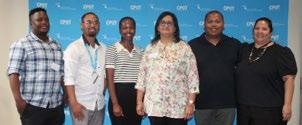
CCEWIL, led by Prof Lalini Reddy, hosted an induction workshop at the Bellville Campus for 50 WIL coordinators in February, under the theme ‘Promoting employability of graduates’. The workshop aimed to familiarise new and existing WIL coordinators from various faculties with the WIL Quality Cycle and recent developments in the field. Prof Reddy noted, “WIL coordinators were inducted into the latest trends and the WIL Quality Management Cycle for effective student exposure to industry. It is our quest to prepare our students for the future world of work.”
Mr Andrew Rand, Faculty WIL Coordinator: FAS, presented on WIL data capture and management, while guest speaker Mr Estian Behrens from CHEC spoke on building university–industry partnerships. Dr Lizel Hudson, WIL Coordinator: FHWS, contributed to the work preparedness programme, and Ms Jayde Barends from the TTO discussed entrepreneurship.
Project leader Mr David Haarhoff emphasised that WIL plays a critical role in student skills development, and equipping staff is key to its success. “The event was well supported by faculties, and participants engaged well throughout.” The event closed with summary remarks by Mr Walter Kohlhofer, Faculty WIL Coordinator: FEBE, who thanked all participants and guests.
Prof Chris Nhlapo, Prof Lalini Reddy, Mr Raymond Maseko and Mr David Haarhoff
Mr Dumisani Xesha, Mr Rumarcques Olyn, Ms Olwethu Gelem, Prof Lalini Reddy, Mr David Haarhoff and Mrs Bronwyn Abrahams
CCEWIL engages with industry partners at WIL Indaba Preparing students for the future world of work
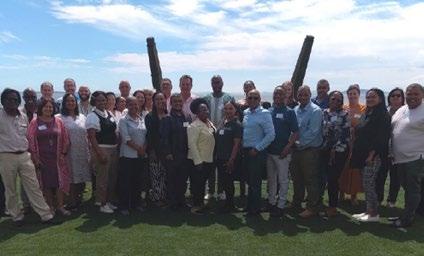
CCEWIL hosted a WIL Indaba in April at the Cape Town Hotel School. Prof Lalini Reddy, Director: CCEWIL, welcomed CPUT’s industry partners and emphasised the importance of continued collaboration in advancing WIL. She reiterated the significant developmental impact that WIL has on students.
The target audience for the event included industry partners who play a key role in hosting students for their WIL requirements. These partners represent all six faculties at CPUT. Project leader, Mr David Haarhoff, remarked, “Initiatives of this nature are imperative for building strong connections between organisations and our university. Organisations invest substantial time and resources in developing our students, and that is commendable.”
Attendees expressed great interest and actively engaged throughout the event. The purpose of the indaba was to foster meaningful dialogue about challenges, achievements, and strategies for strengthening partnerships between key stakeholders in support of WIL. “The Centre envisages many more such initiatives for the benefit of students,” added Mr Haarhoff.
CCEWIL’s Cooperative Education Unit hosted a forward-looking workshop in collaboration with the Cape Town Science Centre in March. The event aimed to prepare students for careers shaped by the 4th Industrial Revolution. The workshop included presentations and demonstrations in AI, coding and robotics. Director, Prof Lalini Reddy, said, “The World Economic Forum 2023 Report highlights that tech adoption will continue to be the main driver of business transformation. Our students must stay aware of these trends as they prepare to enter the workforce.”
Speakers included:
• Ms Theresa Ely-Felin Ashric Don, Western Cape Education Department
• Mr Jonathan Freese, Western Cape Education Department
• Ms Fatima Jakoet, airline pilot and 4IR skills consultant
• Mr Wesley Pillay, ORT South Africa
• Ms Melissa Slaymaker, Women in Tech
• Mr Bongumusa Ngema, postgraduate student
Project leader Mr David Haarhoff said student interest was high. “After the event, many students expressed a desire for more offerings like this. Collaborating with the Cape Town Science Centre, Western Cape Education Department, and other partners allowed students to engage directly with experts – and that warms my heart.” Dr Lizel Hudson, WIL coordinator in FHWS, closed the event by thanking both students and guests for their contributions.
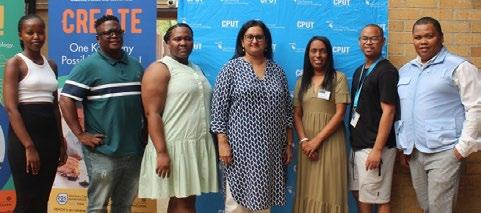
WIL Indaba attendees at the Granger Bay Campus
Ms Olwethu Gelem, Mr Dumisani Xesha, Ms Zimkitha Mbunge, Prof Lalini Reddy, Ms Theresa Ely-Felino, Mr Rumarcques Olyn and Mr David Haarhoff
DAAD hosts strategic workshops at CPUT
CPUT hosted a German and Namibian delegation for strategic workshops in July, aligned with the DAAD’s Community Engagement in Southern Africa project. These workshops focused on teaching, research, and management and explored Social Entrepreneurship through partnerships with industry and communities linked to three of the UN’s SDGs, namely, SDG 6: Clean water and sanitation; SDG 7: Affordable and clean energy; and SDG 11: Sustainable cities and communities. A transdisciplinary team from NUST and FUAS engaged in capacity-building workshops and knowledge exchange.
Prof Dr Kay Pfaffenberger, Director: Centre for Business and Technology in Africa (FUAS), led the DAAD CESAR project, underscoring the significance of partnerships in addressing global environmental challenges and commending the CPUT hosts. At NUST, Dr Laudika Kandjinga led the project, while at CPUT, it was managed by Ms Jacqui Scheepers of the SLCE Units. “CESAR seeks to lay a firm foundation for the development of a CCE at the NUST, which can monitor envisaged projects. Working in silos is something of the past and the need for national and international partnerships must be encouraged for the growth of our university”, said Mr David Haarhoff, CESAR project support and researcher at CPUT. Mr Haarhoff works closely with Martin Kuhn, Scientific Assistant at FUAS and Ms Theresa Burns, SL Administrator at CPUT.
Delegates visited a community site, the Ulwazi (‘knowledge’ in isiXhosa) Educare Centre in Delft. The centre provides preschool education for children up to six years of age. The creative Educare Centre was built with 1 700 old car tires, 6 000 eco-bricks, and 2 000 glass bottles. CPUT’s SLCE Units arranged for Gift of the Givers to bring grocery items for the children’s meals, snacks and care items. The project spans over three years, concluding with a comprehensive report in 2027.
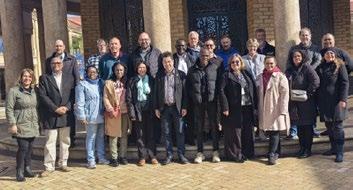
The three DAAD CESAR project leaders from FUAS, NUST and CPUT represented the project at the DAAD Project Leader Conference ‘Educating tomorrow’s leaders to pioneer sustainable development: The role of academia’ in Dar es Salaam in July. DAAD, at the time of the conference funded 103 partnership projects connecting German universities and partners in developing African countries.
STEM Club showcases innovation and research excellence
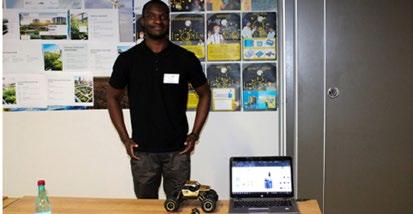
To promote science, technology, engineering, mathematics and innovation, CPUT’s STEM Club has provided a platform for students to showcase their top research projects to the wider university community. The winners of this year’s Annual STEM Expo Competition, held at SARETEC during National Science Week in September, were Mr Mzameli Mashiyi, who developed an ‘African language speech recognition AI’, and Ms Nomava Mgidi, whose project focused on ‘Unemployment through fashion design’. Both projects are supported by the TTO for potential commercialisation.
The STEM Club partnered with the Community Engagement (CE) and Work-Integrated Learning (WIL) units, also inviting local high school learners to view the exhibitions. CE and WIL hosted a workshop for these learners, with guest speakers including Ms Jacqui Scheepers (Manager: SLCE Units), Dr Xena Cupido (Director: Fundani CHED), Dr Mark Jacobs (Maths lecturer), Dr Gillian Arendse (Nuclear Physicist at iThemba Labs), and Mr Ntokozo Mashaba (winner of the 2023 competition).
Dr Frikkie George, CPUT STEM support lead and Acting HoD: Fundani STARS Unit, noted that Dr Arendse’s dynamic talk captured the interest of the attendees. He added, “We are exploring funding options for winners to upscale their projects for commercialisation.” The Expo not only showcased the achievements of CPUT STEM Club members but also encouraged innovation and could contribute to enhancing students’ academic performance.
German and Namibian delegates with CPUT representatives
Mr Mzameli Mashiyi, who developed an African language speech recognition AI
Cooperative Education Unit prepares students for industry Collaboration strengthened at DAAD CESAR workshop
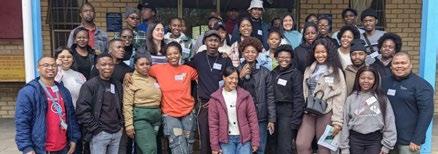
The Cooperative Education Unit of CCEWIL hosted a successful Student Work Preparedness Workshop in September, with a focus on resilience, one of CPUT’s graduate attributes. The centre is committed to promoting effective work-integrated learning (WIL) and community engagement initiatives to strengthen the employability of graduates.
The 2024 workshop series was designed around essential 21st-century industry skills. Centre Director, Prof Lalini Reddy, highlighted the importance of highly interactive workshops that not only promote 4IR technologies but also foster critical thinking, unity in diversity, cultural tolerance, and human values – all vital for preparing students for the future workforce. Mr David Haarhoff, project leader, stressed that initiatives of this nature are essential for building the skills students need as they transition into the professional world. He commended the dedication of participants, noting their determination to grow and distinguish themselves in the industry.
The workshop was held in collaboration with Student Counselling, facilitated by Ms Leanie Brits, HoD: Student Counselling, and Dr Phorogohlo Phala, a psychologist. According to Mr Haarhoff, “The joyful and pleasant atmosphere among students was noteworthy.”
Key outcomes included developing an understanding of resilience, emotional intelligence, stress management, the functions of the left and right brain, and brain profiling. Mr Haarhoff further emphasised that self-awareness is central to managing stress, strengthening resilience, and applying resilience strategies effectively. He explained that projects and events should align closely with graduate attributes to maximise student benefit. Certificates of attendance were awarded to participants, which they can include in their CVs when applying for jobs.
CPUT and Flensburg University of Applied Sciences (FUAS) took part in a week-long DAAD CESAR Regional Workshop in October, hosted by the Namibia University of Science and Technology (NUST). The programme included presentations, site visits, and project development, with a focus on delivering outputs aligned with the UN’s SDGs 6, 7, 11, and 17. Opening remarks were made by Ms Celeste Espach, Acting Executive Dean at NUST, and Prof Kay Pfaffenberger, FUAS project leader, who underscored the value of partnerships for community enhancement.
Day 1 discussions centred on a project output dissemination plan, led by Mr Jacques Korrubel (NUST), with contributions from Mr David Haarhoff (CPUT researcher and project supporter) and Ms Jacqui Scheepers (CPUT project leader). Mr Haarhoff commented, “Working on transdisciplinary cross-border projects requires a clear plan of how we achieve our project deliverables with the end goal in mind.” Day 2 featured case studies from NUST, along with sessions on CESAR Project Mapping/Modelling led by Ms Scheepers.
Day 3 integrated SDGs into research outputs, with presenters including Prof Bongani Ncube (CPUT) and Ms Trudy Theron-Beukes (NUST) on clean water and sanitation; Dr Marco Adonis on affordable clean energy; and Dr Nicholas Pinfold on urban planning and SDG 11. Further contributions came from Dr Dirk Muller (FUAS), Prof James Katende, and Ms Geraldine van Rooi (NUST). NUST also introduced its FEBE research framework through Dr Eric Yankson. On Day 4, Mrs Scheepers presented CPUT’s SL modules, while Mr Walter Kohlhofer (Mechanical Engineering) facilitated a discussion on programme gaps. The team agreed to provide executive management at NUST with a feedback session. Participants also attended presentations by the City of Windhoek on human settlements, urban planning, environment and health, electricity, and economic development. The delegation visited various Namibian sites, including the NUST Fab Lab, which offers opportunities for community members and student entrepreneurs in prototyping and sustainable manufacturing – an initiative enhancing long-term community sustainability.
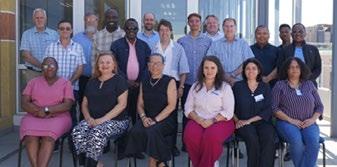
Student Work Preparedness Workshop delegates
Delegates at the DAAD CESAR Regional Workshop
CPUT embraces the spirit of Ubuntu on Mandela Day
Mandela Day, commemorated annually on 18 July, honours the life and legacy of Nelson Mandela, while inspiring people around the world to contribute meaningfully to their communities. At CPUT, the day is a celebration of Tata Madiba’s values and an expression of Ubuntu in action – an ethos deeply embedded in the university’s Vision 2030. This year, staff and students across campuses participated again in heartfelt initiatives aimed at uplifting under-resourced schools and community centres, including Balvenie Primary School, Astra Special Education School, and The Saartjie Baartman Centre for Women and Children.
Spearheaded by the SLCE Unit, the Community Engagement Student Academy (CESA) project group called Community Connectors brought joy to learners through storytelling, performance, quizzes, and interactive classroom activities. SLCE Manager, Ms Jacqui Scheepers, highlighted the significance of practical, community-focused projects that embody the Ubuntu philosophy within CPUT’s surrounding communities. Campus libraries served as drop-off points for reading materials donated by staff and students. Contributions included new and slightly used books across all genres, children’s books, CDs, and magazines. “Reusing pre-owned reading materials is not only beneficial for community education but also environmentally responsible as it helps reduce waste,” said Mrs Scheepers.
Balvenie Primary School has long served as a site for SLCE interdisciplinary projects involving Architectural Technology, Construction Management, Quantity Surveying, Interior Design, Mechanical Engineering, and Graphic Design. Industry partner Nadeson Consulting joined CPUT staff on site, generously donating books, a laptop, and a printer, and raising R5 000 through crowdfunding to support the school’s library. Principal Mrs Farieda Wakefield expressed her sincere gratitude to CPUT and Nadeson Consulting for their continued engagement with the learners.
At The Saartjie Baartman Centre for Women and Children, CPUT Libraries staff and Community Connectors helped organise books and pack shelves in the new therapeutic library. Dr Regina Sikhosana, Branch Manager at Bellville Campus, noted CPUT Libraries’ ongoing support for community literacy initiatives. Centre representative Ms Miriam Fredericks shared that this support was instrumental in continuing to provide essential, life-changing services to survivors of domestic violence and their children.
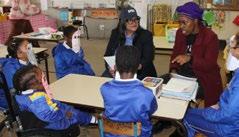
Looking ahead, the SLCE Unit plans to launch a life skills programme for hostel learners at Astra Special Education School, reinforcing CPUT’s commitment to long-term, meaningful community engagement.
ULA sparks enthusiasm for servant leadership

A Transformative Ubuntu Leaders Academy (ULA) training event, hosted in collaboration with CPUT, took place at the Cape Town Hotel School in November. The event brought together ten leaders – including CPUT staff, Community Engagement Student Academy (CESA) leaders, and community leaders – who were trained to share their knowledge and skills. The training was designed to create a ripple effect, extending beyond the campus and into communities, with future programmes aiming to foster a culture of servant leadership.
As part of the initiative, the trainers mentored 20 CESA student leaders and leadership fellows during Ubuntu Week in Worcester. The vibrant environment encouraged both seasoned and aspiring leaders to learn together. Inspirational speakers included Pastor Clinton Luikes, Ms Nontutuzelo Dyakala from the A2B Centre, and ten-time skateboarding medallist Mr Jean-Marc Johannes. Ms Jacqui Scheepers, Manager: SLCE, observed that the interactive sessions had a profound impact, particularly those on bridge building, which were highly relevant to staff and students. Gratitude was extended to IPAV and MIET Africa for supporting the inaugural Cape Town-based ULA. Reflecting on the programme, Ubuntu Master Trainer Mr Moses Machipisa shared, “Witnessing the passion and dedication of these future leaders has been truly
inspiring. It fills me with hope to know they will carry the Ubuntu philosophy forward, creating a ripple effect of positive change in their communities and beyond.”
CESA student leaders and academy alumni echoed this sentiment. Mr Atlegang Lekabe said, “I have learned much about myself. The significance of self-knowledge, servant leadership, and ethics of care stood out. I aim to impact my communities and beyond.” Mr Lutendzo Moavi added, “I gained invaluable knowledge that will help enhance lives. Attending has been life-changing, allowing me to advocate for Ubuntu.” Ms Stephanie de Koker, a student assistant in the SLCE Units, noted, “Serving others in servant leadership and ethics of care gave me new perspective. I learned to think beyond myself and share knowledge to improve others’ lives.”
The Ubuntu Leaders Academy, rooted in the Ubuntu philosophy, is cultivating servant leaders by emphasising self-awareness, self-confidence, resilience, empathy, and service. The programme is now engaging young leaders from 183 countries worldwide. Mr Moses Machipisa, an Ubuntu Master Trainer, shared, “Witnessing the passion and dedication of these future leaders has been truly inspiring. It fills me with hope to know they will carry the Ubuntu philosophy forward, creating a ripple effect of positive change in their communities and beyond.”
Bringing joy to learners
Cultivating servant leaders
CENTRE FOR INNOVATIVE EDUCATIONAL TECHNOLOGY (CIET)
PROF RISHIDAW BALKARAN balkaranr@cput.ac.za
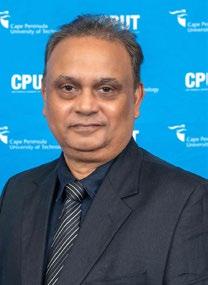
Introduction
CIET’s mandate is to support the academic project through staff development, focusing on the innovative integration and use of technologies and pedagogies to promote holistic student success.
To achieve this, the centre’s work is informed by designbased research, with findings used to refine staff development programmes and enhance student learning. Activities include workshops, seminars, a short course on blended learning, learner analytics, and a range of other projects. In addition, the centre mentors academics in design-based research and the scholarship of teaching and learning.
In 2024, CIET deepened its contribution to CPUT’s academic project through staff development, creative technology integration, and pedagogies that advance comprehensive student success – guided by a design-based research philosophy. Over the year, the centre strengthened its focus on collaborative research, staff capability building, and digital pedagogy, enhancing CPUT’s capacity to deliver engaging, inclusive and future-ready learning.
Staff development and training
CIET expanded its academic support portfolio with development opportunities tailored to the evolving needs of staff. Workshops and seminars enabled colleagues to adopt Blackboard Ultra with greater confidence, redesign modules for blended delivery, and uphold assessment integrity. Complementary short courses in blended learning and learning analytics supported faculties in using data ethically and effectively to enhance student engagement and outcomes.
Alongside these formal offerings, CIET staff mentored academics engaged in design-based research through the Scholarship of Teaching and Learning (SoTL) programme offered by Fundani. The centre also collaborated with the Cape Higher Education Consortium (CHEC) and the Teaching Development Programme (TDP), broadening access to shared expertise and fostering communities of practice across the region. Collectively, these initiatives strengthened academic capacity, normalised innovative pedagogy, and cultivated a culture of continuous improvement.
Joint research initiatives
CIET staff collaborated with colleagues across CPUT, peers at South African universities, and international partners to advance the effective integration of technology in higher education. Through national and regional initiatives, the centre contributed to sectorwide conversations on digital innovation, inclusive learning design, and evidence-informed teaching. These collaborations ensured CIET remained aligned with international best practice while remaining responsive to local priorities, enabling the centre to bring fresh insights into institutional practice and professional learning.
Learning and Teaching with Technology Day
A highlight of the year was the Learning and Teaching with Technology Day, convened by CIET in partnership with Fundani CHED. The event attracted strong participation from all faculties and provided a vibrant platform to showcase effective, technologyenhanced teaching. Sessions explored multimediarich learning designs, effective use of Blackboard Ultra, and emerging practices in artificial intelligence for education.
The programme placed Universal Design for Learning (UDL) at the forefront, with practical demonstrations of how inclusive design principles can reduce barriers and increase student participation. Case studies and peer-led exchanges enabled staff to share successful approaches within their contexts, accelerating the spread of good practice. Participant feedback indicated increased confidence in applying
educational technologies to strengthen engagement, feedback and assessment. The day reaffirmed CIET’s role as a catalyst for pedagogical innovation and a convener of cross-faculty learning.
Conclusion and future direction
CIET made a demonstrable contribution to CPUT’s teaching and learning ecosystem this year. Through targeted training, mentoring, collaborative projects, and institution-wide events, the centre advanced design-informed, technology-enhanced pedagogy and helped cultivate a more connected, evidence-driven academic community.
Looking ahead, CIET aims to:
• broaden its short-course and micro-credential offerings for staff – and, where appropriate, for students – so that capability building is timely, stackable, and impact-oriented
• scale AI literacy and practice for responsible, discipline-relevant use in the classroom, including guidance on ethics, assessment and accessibility
• deepen partnerships across South Africa and internationally to amplify research impact and codevelop innovative approaches
• continue convening high-value institutional events, such as the Learning and Teaching with Technology Day, to surface and spread effective practice
Through these priorities, CIET will remain a driving force for innovative, inclusive, and data-informed teaching at CPUT – supporting educators to prepare graduates equipped to thrive in a rapidly changing world.
CPUT LIBRARIES
DR ELISHA CHIWARE
chiwaree@cput.ac.za
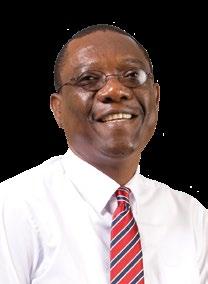
Introduction
As a key partner in research and scholarly communication at the university, CPUT Libraries plays an integral role in supporting the academic enterprise by providing access to world-class information resources, digital platforms, tools, and expert services.
In 2024, CPUT Libraries was actively engaged in a wide range of strategic research support initiatives – both within the institution and across national and international platforms – contributing meaningfully to the advancement of the university’s dynamic and evolving research agenda.
Highlights for 2024
Open Access Publishing
Through its membership in the South African National Library and Information Consortium (SANLiC), CPUT Libraries has negotiated read-and-publish agreements with leading scientific publishers. These agreements enabled CPUT researchers to publish open access with no or reduced article processing charges, resulting in an estimated saving of approximately R2,893,485 across 57 research outputs in 2024.
CoreTrustSeal Certification
In 2024, CPUT Libraries was awarded international CoreTrustSeal certification for its institutional data repository, eSango, officially recognising it as a Trusted Digital Repository (TDR). This prestigious accreditation affirms the repository’s compliance with globally recognised standards for the stewardship and long-term preservation of research data. The certification marks a significant milestone in strengthening CPUT’s Research Data Management (RDM) strategy and infrastructure, and contributes to enhancing research transparency, visibility, credibility, and overall impact – both within the institution and in the broader scholarly community.


Research and Information Literacy Skills in the Workplace Seminar
In 2024, CPUT Libraries hosted the 3rd annual Research and Information Literacy in the Workplace Seminar, bringing together industry partners, academics, librarians, and alumni. The event provided a collaborative platform to explore the critical role of information literacy, research competence, and data literacy skills in the
CPUT Libraries celebrate Library Week
In partnership with the Library and Information Association of South Africa (LIASA), CPUT Libraries commemorated South African Library Week (SALW) in March under the theme ‘Libraries foster social cohesion’.
Director of Libraries, Prof Elisha Chiware, issued a message of encouragement, aligning the week’s celebration with CPUT’s 2030 Vision: “to be an innovative library and information services partner enabling the institution to be Africa’s leading Smart UoT globally”. Library Faculty Manager: FEBE, Ms Regina Sikhosana, emphasised libraries’ role in bringing diverse communities together. “Libraries offer access to information and technologies, but also provide safe spaces for marginalised communities to share experiences, address development issues, and foster unity,” she said.
CPUT Libraries marked the occasion with book displays across branches and a collaborative campaign with Drakenstein Public Library and Dal Josafat School Library to promote reading and library awareness among learners from Magnolia and Balvenie primary schools.
Ms Sikhosana highlighted how the SALW theme resonated with CPUT’s values of kindness (Ubuntu), unity (Ubunye), and embracing diversity (Ukungafani). “Our libraries also have a social responsibility to bridge the digital divide through accessible platforms and community engagement.”
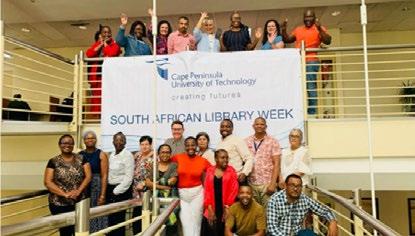
modern workplace. Discussions highlighted the growing need for graduates and professionals to navigate complex information environments effectively, aligning with broader goals of employability, lifelong learning, and digital readiness.
Publication Quality Framework
CPUT Libraries, in partnership with the Centre for Research on Evaluation, Science and Technology (CREST) at Stellenbosch University, serves as co-chair of the Publications Qualification Framework (PQF) project. This collaborative initiative contributes to the ongoing revision of the DHET’s Policy on the Evaluation of Research Outputs. Through its involvement, CPUT Libraries plays a strategic role in shaping national policy frameworks that influence how scholarly publications are assessed and accredited within the South African higher education landscape.
Research outputs
In our own contribution to the librarianship body of knowledge, the CPUT Libraries’ staff produced several research outputs during 2024.
Journal articles
• ‘First-year education students’ use of isiXhosa and Afrikaans e-books and infographics in an information literacy course’, Innovation: Journal of Appropriate Librarianship and Information Work in Southern Africa, 69: 2-24 https://hdl.handle.net/10520/ejc-innovation_v2024_n69_a2
• ‘Future models and architecture of data repositories in African universities’, IASSIST Quarterly, 48(3) https://doi.org/10.29173/iq1099
• ‘Navigating Industry 4.0: Crafting a responsive curriculum for library and information science’, Business Information Review, 41(4), 156-163 https://doi.org/10.1177/02663821241289820
• ‘Working towards securing and building a trusted institutional research data repository through the CoreTrustSeal process: Case of Cape Peninsula University of Technology data repository’, IASSIST Quarterly, 48(3) https://doi.org/10.29173/iq1111
CPUT Libraries staff promoting reading and unity during South African Library Week
Book chapter
‘Information Literacy in the Artificial Intelligence Sphere’, in S Chizwina & M Moyo (Eds), Examining Information Literacy in Academic Libraries, 97-124, IGI Global Scientific Publishing https://doi.org/10.4018/979-8-3693-1143-1. ch006
Conference papers
• ‘How to grow Research Data Management services and uptake at a university’, Proceedings of the 44th IATUL Conference, Auckland, NZ
• ‘Exploring educator experiences with mobile learning software’, Proceedings of the 20th International Conference on Mobile Learning, Porto, Portugal
In conclusion
During 2024, CPUT Libraries reinforced its role as a strategic partner in the university’s research ecosystem, demonstrating an unwavering commitment to supporting research excellence, advancing open access publishing, and promoting best practices in research data management. Key achievements – such as securing international CoreTrustSeal certification for the eSango data repository, negotiating substantial savings through transformative publishing agreements, and co-leading national policy developments – underscore the Libraries’ impact both within and beyond the institution.
Through thought leadership initiatives such as the Research and Information Literacy in the Workplace Seminar and meaningful research contributions by staff, CPUT Libraries continues to build capacity, foster innovation, and strengthen the visibility and impact of the university’s scholarly output.
Looking ahead, the CPUT Libraries remains committed to enabling a sustainable, inclusive, and digitally empowered research environment that supports the university’s evolving academic and societal goals.
World Read Aloud Day celebrated through outreach to local school
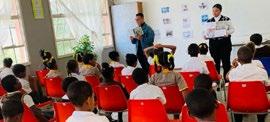
The initiative was led by Wellington Library Branch Manager Ms Joanne Arendse and lecturer Ms Amanda Anker, who were joined by a group of third-year Intermediate Phase students from CPUT. During the visit, the students read a variety of stories aloud to the learners, engaging them with animated reading and interactive discussion. The learners responded with enthusiasm, displaying curiosity and enjoyment throughout the sessions.
World Read Aloud Day, observed internationally, seeks to highlight the importance of reading aloud, literacy and storytelling as a fundamental human right. By participating in the event, CPUT students and staff aimed to foster a love of reading, encourage literacy development, and provide learners with positive role models in education.
The outreach also provided CPUT students with practical experience in literacy education, helping them to develop classroom and reading facilitation skills that are essential for their future teaching careers.
CPUT’s Faculty of Education, together with CPUT Libraries, marked World Read Aloud Day in February with an outreach visit to Magnolia Primary School in Paarl.
CPUT helping to nurture a love of reading and encouraging literacy development
CPUT Libraries promotes mental health awareness
CPUT Libraries hosted a Mental Health Awareness campaign and poetry session on the Granger Bay Campus in August. The event, a collaboration between CPUT Libraries staff and the Student Counselling team, aimed to enhance the student experience through a blend of motivational speaking and poetry.
The programme opened with remarks from Ms Nontobeko Xwayi, Granger Bay Campus Librarian, setting the tone for an inspiring and informative session. Ms Regina Sikhosana, Senior Librarian at the Bellville Campus, followed with a message of support on mental health. Speakers offered a range of perspectives designed to motivate and inform, while Student Counselling Services introduced the comprehensive support available to students. This includes career counselling, wellness programmes, peer helper services, individual counselling, self-help materials, academic support, advocacy, support groups, and skills development. Ms Ntombekhaya Gwaqa, Marketing Librarian, observed that the presentations resonated with attendees, offering them hope and guidance.
The team also shared practical strategies for managing stress. Counselling Psychologist Ms Modipadi Phala emphasised that self-awareness helps one understand oneself better during mental health challenges. Intern counsellor Ms Ntswaki Shopane highlighted the role of career pathing in supporting student well-being and adjustment.
Guest poet Mr Jamie Conway (UWC) and student Ms Nondabulo Mbasa (Maritime Studies) delivered powerful poems that enriched the programme. The event concluded with strong student engagement, and participants received prizes handed out by Ms Gwaqa.
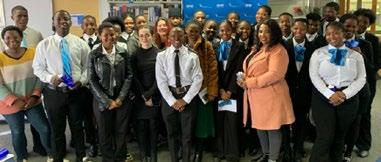
Advancing workplace skills through data literacy
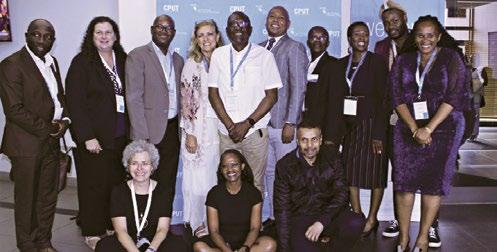
Academics, librarians, and industry partners attended the 3rd Research and Information Literacy Skills Workplace Seminar in November, hosted by CPUT Libraries at SARETEC. The 2024 theme focused on ‘Data Literacy’. Prof Rishidaw Balkaran, DVC: T&L, delivered the welcome, while CPUT Libraries Director, Prof Elisha Chiware, reflected on six years of collaboration with stakeholders to strengthen students’ research and information literacy skills for the workplace. Prof Chiware highlighted the growing importance of data competence, noting that in today’s data-driven world, the ability to collect, analyse and interpret data has become an essential professional skill. He emphasised that data literacy underpins informed decision-making, strategic growth, competitive advantage, effective communication, and critical thinking.
The keynote address was delivered by Prof Tiko Iyamu of the Department of Information Technology, who spoke on ‘Creating value using big data analytics: The reality in practice’. His talk was followed by a Q&A session, which included concerns about the risks associated with big data. Other presentations explored themes such as the importance of data literacy in the teaching profession, librarians’ responses to researcher needs, and students’ training requirements. The seminar concluded with a panel discussion that brought together Prof Iyamu, Prof Hanlie Dippenaar (CPUT Faculty of Education), Mr Joey Klaaste-Salmans (Western Cape Education Department), Prof Julia Bauder (Grinnell College, USA), Dr Kirstin Krauss (WWIS), Dr Mathew Moyo (NWU), and Dr Vusi Mshayisa (CPUT FAS). Discussions focused on data literacy in the workplace, the role of AI tools, and the skills needed by new graduates.
Together for mental health awareness at CPUT Libraries
Building future-ready skills through data literacy
Librarians’ Day a success
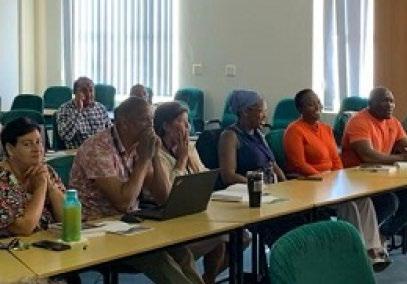
CPUT Libraries hosted its first Librarians’ Day of 2024 in April, creating a platform for professional development, knowledge sharing, and peer engagement. The event brought together library staff from across campuses to exchange experiences and learn from one another. Presentations were delivered on a range of topics, including Article Processing Charges (Ms Janine Lockhart), CPUT Guidelines on Artificial Intelligence (Prof Faiq Waghid), and RIALTO (Ms Anke MacCallum).
The event also recognised the efforts of eight staff members who completed a course on Open Educational Resources (OER). Certificates were awarded to honour their production of OER content and commitment to lifelong learning. This initiative supports CPUT’s vision for inclusive and accessible education and aligns with the global Open Science movement, which promotes free access to educational resources at all levels of higher education.
The organisers were pleased to note that Librarians’ Day successfully reinforced collaboration and encouraged professional excellence within the CPUT library community.
Furthering education empowers women employees
In South Africa, Women’s Month is celebrated every August to recognise the contributions of women and to support their advancement by breaking down barriers. For Women’s Month 2024, under the slogan ‘Empowered women empower the world’ and inspired by the phrase ‘Strong women, strong world’, the Mowbray Campus Library staff honoured two exceptional colleagues who embraced personal development through the Adult Education and Training (AET) Project at CPUT. Despite significant challenges, both women have advanced their education while working full-time.
Mrs Veronica van Vogel, a widowed mother and supervisor in Facilities Management, is pursuing her Level 3 qualification. She explained that discipline, hard work, and careful prioritisation have been essential to her progress. Ms Maroweyyah Williams, also in Facilities Management, has completed Levels 3 and 4 as well as a computer course, and has now begun her Level 5 programme. She noted that balancing full-time work with returning to study after many years has been demanding, particularly in preparing for exams.
Both women acknowledged the vital support provided by the library staff throughout their studies. Mrs van Vogel shared how helpful it was to be guided in finding the right resources, with staff even requesting books from other branches when necessary. Ms Williams added that the assistance she received with books and projects had made a real difference.
They also offered words of encouragement to colleagues still considering their educational journeys. Mrs van Vogel advised them to seize the opportunities provided by CPUT, emphasising that it’s never too late to pursue further education and improve one’s prospects. Ms Williams echoed this, stressing the benefits not only for career growth but also for personal development.
The Mowbray Campus Library team expressed pride in the women’s dedication and achievements, and wished them every success in the next chapter of their journeys.

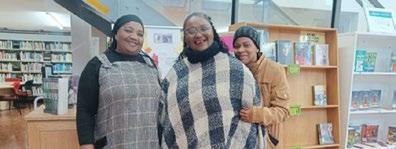
Librarians’ Day fostering collaboration and professional growth
Celebrating women staff pursuing further education with commitment and resilience

CPUT celebrates World Book and Copyright Day
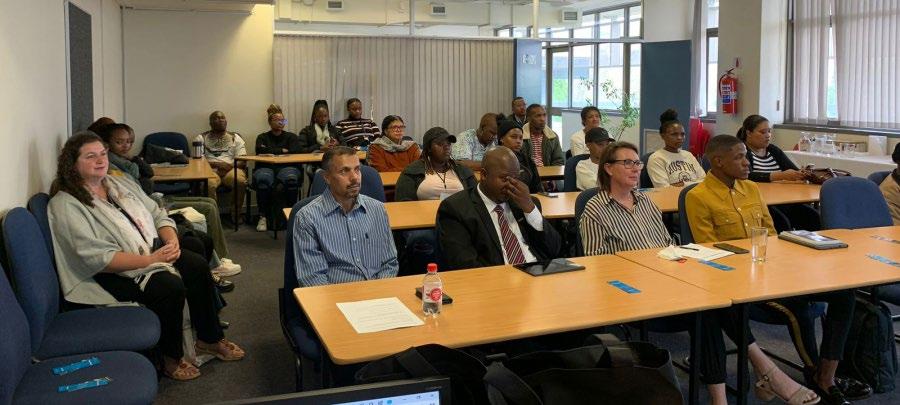
CPUT Libraries, in collaboration with the Department of Student Affairs (DSA), joined the global celebration of World Book and Copyright Day in May under the theme ‘Read your way’. The annual event honours the role of books and authors, while highlighting the importance of copyright in promoting creativity and innovation. It dates back to UNESCO’s 1995 decision to mark 23 April as a literary celebration, paying tribute to renowned authors like William Shakespeare and Miguel de Cervantes.
Mr Yunus Omar, Library Manager: FBMS, opened the event by emphasising the transformative power of reading. Mr Njabulo Maphumulo, Deputy Dean: Student Affairs, encouraged the promotion of a writing culture and access to books as essential to personal growth and academic success. Guest speakers included Ms Ntombozuko Bota, a CPUT alumna and author of A Seed Grown into Flower, and Mr Musa Tshabangu, a first-year student and author of Decision Making and Koke Ngaphasi Komthunzi Welanga Kune Skhathi Sakho Everything (English translation: Everything Under the Shadow of the Sun Has Its Time). They shared insights into writing, publishing, and the importance of copyright protection.
The event was coordinated by Ms Regina Sikhosana, Library Manager: FEBE, with Ms Janine Lockhart from Scholarly Communication and Digitisation Services expressing gratitude for the contributions made in promoting information literacy and intellectual property rights. Marketing Librarian Ms Ntombekhaya Gwaqa reflected that the celebration reaffirmed the institution’s commitment to social cohesion, learning, and creativity. The event highlighted books as vehicles for knowledge and emphasised the protection of authors’ rights.
CPUT joining the global celebration of World Book and Copyright Day
FUNDANI CENTRE FOR HIGHER EDUCATION DEVELOPMENT
DR XENA CUPIDO
cupidox@cput.ac.za

The Fundani Centre for Higher Education Development (CHED) has emerged as a key driver of innovation and research excellence. As a strategic institutional unit, Fundani is committed to advancing higher education development, aligning its objectives with CPUT’s Vision 2030 and both national and international educational priorities.
Fundani academics make significant contributions to CPUT’s Research Focus Area: Human & Social Dynamics through active engagement in scholarly work. They publish regularly in accredited journals and contribute to book chapters, advancing knowledge within their respective disciplines. In addition, Fundani staff serve as reviewers for both national and international journals, helping to uphold the quality and rigour of academic research. Their expertise is further recognised through frequent invitations to act as external examiners for master’s and doctoral theses. The centre also plays a pivotal role in mentoring and supervising CPUT colleagues undertaking master’s and postgraduate studies, particularly in higher education and wider educational research. Beyond the institution, Fundani academics are regularly invited as keynote speakers at conferences and academic institutions, reinforcing their status as thought leaders in their fields.
Over the past year, Fundani has played a central role in fostering collaboration across various faculties and strategic units within and beyond CPUT. These partnerships underpin
the centre’s mission to enhance the quality of teaching, learning, and research. By facilitating knowledge exchange and supporting cutting-edge research, Fundani has made notable contributions to the scholarship of teaching and learning, helping to ensure that academic initiatives remain relevant, impactful, and transformative.
Two NFR rating awards
Fundani CHED is proud to have had two of its academics receive official ratings from the NRF. This achievement highlights the centre’s growing contribution to scholarly excellence within the field of higher education. The NRF rating forms part of the foundation’s rigorous evaluation system, which assesses researchers based on the quality, impact, and consistency of their scholarly work over an extended period. It serves as a national benchmark of research excellence, and plays a key role in promoting and recognising sustained academic achievement.
Receiving an NRF rating is a significant milestone in a researcher’s career, and reflects not only individual distinction but also the supportive and research-enabling environment cultivated by Fundani CHED. It further reinforces the centre’s commitment to advancing impactful, high-quality research in alignment with institutional, national, and global priorities in higher education.
Kresge Foundation invests $240 000 in CPUT
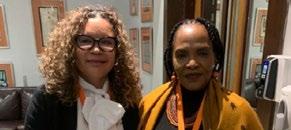
CPUT was delighted to announce the successful approval of a grant from the Kresge Foundation in August. Dr Xena Cupido, Director: Fundani, stated that this partnership would support the ‘Siyaphumelela 3.0’ (‘We Succeed’) project – a national, networked approach to improving post-secondary student success in South Africa. The award marked a significant milestone in CPUT’s ongoing commitment to enhancing student outcomes. The grant, totalling $240 000 (approximately R4.4 million), would be disbursed over three years from June 2024 to 30 June 2027. The funding would strengthen the Western Cape’s efforts to advance student success through strategic initiatives and collaborative learning.
The project focuses on several key objectives, including enhancing data-driven decision-making, promoting innovative teaching and learning practices, and fostering a supportive academic environment.
“As part of the grant agreement, CPUT will submit periodic reports to the Kresge Foundation, detailing the project’s progress, challenges, and successes,” said Dr Cupido. She encouraged the university community to stay informed about the Siyaphumelela project’s updates and achievements, which are shared through the university’s communication channels, and emphasised its transformative impact on student success. A certificate of membership was handed to CPUT at the annual Siyaphumelela Conference, held at the Wanderers Conference Centre.
Dr Najwa Norodien-Fataar C2 Rating
Dr Najwa Norodien-Fataar, HoD of the Curriculum Development Unit at Fundani, has been awarded the prestigious NRF C2 rating. This significant achievement affirms her status as an established scholar in her field. This C2 rating recognises researchers who have produced a nationally competitive body of work and made substantial contributions to their discipline. The accolade highlights Dr NorodienFataar’s strong national presence and influence within the research community.
Dr Faiq Waghid C3 Rating
Dr Faiq Waghid, HoD of the Academic Staff Development Unit, has been awarded the esteemed NRF C3 rating, marking a significant step forward in his academic career. This follows his earlier achievement of an NRF Y rating in 2020, which recognised his potential as a promising early-career researcher under 40. His progression to a C3 rating reflects his continued development as an established scholar and growing influence within the national research community. This rating acknowledges researchers who have produced a solid body of quality work that is nationally competitive and has made meaningful contributions to their discipline. Dr Waghid’s achievement underscores his dedication to addressing national challenges and producing research that is both relevant and impactful.
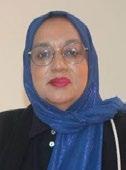
The C2 rating is awarded on the basis of sustained, high-impact research output, including peer-reviewed publications, citations, and contributions that have advanced scholarship in her field. Attaining it required a rigorous peer-review process, with external experts evaluating the quality and impact of her work. This milestone acknowledges Dr NorodienFataar’s dedication to advancing knowledge and her commitment to research excellence. It also enhances her eligibility for competitive funding, collaborative opportunities, and broader academic recognition.
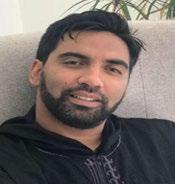
The rating was conferred following a rigorous peer-review process, during which independent experts assessed his research output – including peer-reviewed publications, citations, and scholarly contributions. This milestone affirms his standing as a respected researcher and positions him for further academic growth. The C3 rating not only recognises Dr Waghid’s accomplishments to date but also strengthens his eligibility for research funding, collaboration, and academic recognition. It serves as a foundation for continued development and influence, both nationally and internationally, reflecting his commitment to excellence in research and scholarship.
Dr Xena Cupido and Dr Nosisana Mkonto receive CPUT Membership Certificate as a Siyaphumelela Partner Institution
Dr Najwa Norodien-Fataar
Dr Faiq Waghid
12th Annual Research Innovation in Teaching & Learning Conference
Fundani successfully hosted the 12th Annual Research Innovation in Teaching & Learning (RITAL) Conference in November at the Granger Bay Campus. The conference was coordinated by Dr Najwa Norodien-Fataar, Fundani’s Research Coordinator, and centred on the theme ‘Innovative pedagogies: Embracing diversity and technology for student success’. The keynote address was delivered by Prof Joanne Hardman from UCT, who explored the topic ‘A dialectical model of pedagogy’.
The event welcomed 82 delegates, who participated in sessions covering a wide range of critical themes, including inclusive education, educational technology, student-centred and collaborative learning, culturally responsive pedagogy, blended learning, equity in education, decolonisation and curriculum transformation, and language in the curriculum. The conference provided a valuable platform for scholarly dialogue and the exchange of innovative ideas to enhance teaching and learning practices.
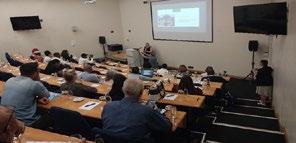
Research and Innovation Fund for Teaching & Learning
The Research and Innovation Fund for Teaching & Learning (RIFTAL), managed by Fundani, facilitates scholarly research and innovation within the institution. Under the leadership of Dr Najwa Norodien-Fataar and Dr Nosisana Mkonto, research proposals undergo a rigorous peer-review process to ensure academic integrity and quality. Financially supported by the University Capacity Development Grant (UCDG) and endorsed by DVC Prof Balkaran, RIFTAL allocates approximately R650 000 annually to support teaching and learning research initiatives. In 2024, 17 academics from CPUT were awarded RIFTAL grants. This funding is instrumental in enabling staff to conduct classroom-based research, thereby enriching the academic discourse on pedagogy and educational practice.
NRF Black Academics Advancement Programme
In 2024, Dr Vuyokazi Mntuyedwa was awarded funding through the NRF Black Academics Advancement Programme (BAAP) to support her research project, from June to September. During this period, she conducted quantitative data collection through surveys and visited her research collaborator at Magdeburg University, Germany, during June and July. She also attended a conference in Paris, which provided further contextual insight for her work. Dr Mntuyedwa built on her preliminary data analysis with an in-depth literature review to refine her research focus and
inform subsequent stages of the project. In addition, she applied for a fellowship at the University of Oxford and prepared draft research articles for publication, pending the outcome of the application. A key advantage of Oxford affiliation is exemption from publication fees, alleviating financial constraints and enhancing the global visibility of her research.
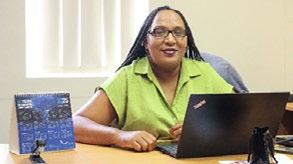
International
conference attendance
Fundani academics regularly attend and contribute to international conferences, actively engaging with global scholarly communities to share research, gain fresh insights, and stay abreast of developments in teaching and learning. These opportunities not only enhance academic visibility and collaboration but also inform and enrich educational practices at CPUT.
Dr Vuyokazi Mntuyedwa
Keynote address by Prof Joanne Hardman (UCT)
CPUT wins Siyaphumelela Network Award at international DREAM Conference
CPUT received a prestigious award at the DREAM Conference in Orlando, Florida in February. Hosted by Achieving the Dream (ATD), DREAM (which stands for Data, Reform, Equity, Achievement and Mobility) is ATD’s flagship annual convening and one of the largest gatherings on equity and student success in higher education.
The award recognised the work of the Siyaphumelela team in fostering equity and student-centred transformation. Dr Xena Cupido, Director: Fundani CHED, emphasised that the project’s success lies in its use of data to better understand student needs. “For four years, we’ve laid the foundation to understand the meaning and drivers of student success at CPUT,” she said.
The CPUT Siyaphumelela team includes Dr Cupido (Chairperson), Prof Muhammad Nakhooda (Co-chair), Prof Hanlie Dippenaar, Dr Lizel Hudson and data expert Dr Thomas Farrar. Prof Nakhooda sourced and presented data in new ways to make it meaningful and actionable. “This project empowers universities to design systems around unique student needs, rather than relying on traditional metrics like throughput or retention alone.”
Dr Cupido noted that CPUT formalised its participation in the Siyaphumelela Project through an MoU signed in 2020. The university has committed to reducing race and gender biases and to using data to improve application, retention and student support. Dr Nosisana Mkonto, Head: Student Transition, Access, Retention and Success (STARS) Unit and First-Year Experience Coordinator, explained that STARS and Siyaphumelela share the common goal of empowering students to adapt and succeed.
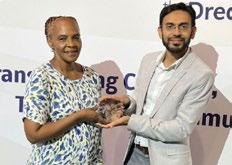
Key takeaways from the conference included using data to understand the full student journey, and recognising student voices through scholar awards and storytelling.
“This is a recognition of the work being done at CPUT to prioritise students and their success,” said Dr Cupido. “It is everyone’s business – administration, academics and leadership alike.” She added that CPUT’s efforts have culminated in the creation of the STARS committee, a sub-committee of Senate Learning & Teaching, which tracks support interventions and their impact.
Higher Education Teaching & Learning Association Annual Conference
Ms Frederika de Graff, Recognition of Prior Learning (RPL) Coordinator, attended the International Higher Education Teaching and Learning Association Annual Conference, held in Gqeberha. The conference theme was ‘Universities as change agents in society: Imagining social innovation for sustainable futures’, with sub-themes including humanising pedagogy, social justice, diversity, equity and inclusion, innovation for sustainability, and socially responsive universities. Ms de Graff presented a paper titled ‘Inclusion through recognition of prior learning with the granting of credits: A case study in architectural technology’.
International Consortium for Educational Development (ICED24)
Mrs Lauren Davids attended the ICED24 Conference, which had the theme ‘Advancing higher education ecosystems for competency development’. The event was hosted by the Association for Faculty Enrichment in Learning and Teaching (AFELT) in Nairobi, at the United States International University. She co-presented a symposium session titled ‘Building a new generation of academic developers through the HELTASA decolonial doctoral programme: Thinking and being with doctoral candidates’, alongside Ms Vanessa Rademeyer and Ms Wendy Adams (HELTASA doctoral students) and four HELTASA Doctoral Academic Committee mentors: Prof Kasturi Behari-Leak, Prof Moyra Keane, Prof Labby Ramrathan, and Prof Michael Samuel.
The ICED Conference, held biennially, brings together academic and educational developers from across the globe to address pressing issues in higher education. Key topics this year included technology integration, student academic support, retention and success, and work-integrated learning. At this year’s conference, eight academics from Fundani delivered a presentation on ‘Socially just student–staff partnerships: Towards a collective theory of multi-institutional organisational change in the Global South’. Their presentation highlighted collaborative approaches to advancing equity in higher education and emphasised the transformative potential of socially just partnerships between students and staff.
Dr Nosisana Mkonto (HoD STARS Unit) and Prof Muhammad Nakhooda (CPUT Siyaphumelela) receiving the award on behalf of CPUT

University of Westminster presentation
Eight Fundani academics presented on ‘Designing for social justice partnerships: Towards a collective theory of multi-institutional organisational change in the Global South’ at the Students as CoCreators Spring Seminar Series at the University of Westminster.
National conference attendance
Dr Nosisana Mkonto attended the 9th Annual SANRC FYE Conference, which was held in Johannesburg. She delivered a paper titled ‘Strategies employed by FYE practitioners in first-year students’ transition at three universities of technology’. Other papers delivered at the conference by Fundani academics were ‘CPUT101 towards student engagement’ and ‘Collaborative support for first-year students in a department in the Faculty of Engineering at a university of
technology’. Fundani representatives also attended the Siyaphumelela Conference in Johannesburg and delivered paper on ‘Harnessing the university structures to design a systemic and integrated approach to student success’.
Sabbatical
Dr Nosisana Mkonto was on Sabbatical from June to December, visiting St Mary’s University in Halifax, Canada.
Achieving the Dream Conference
The annual Achieving the Dream Conference took place in Orlando, Florida in February. It brought together educators, leaders, and innovators committed to advancing student success. Representing Fundani, Dr Nosisana Mkonto, Dr Xena Cupido, and Prof Muhammad Nakhooda were part of the delegation that attended, contributing to the global dialogue on equity, access, and excellence in higher education.
International recognition for student success initiative
CPUT recently received an international recognition award at a prestigious event celebrating achievements in higher education transformation. Representing the university, Dr Nosisana Mkonto and Prof Muhammad Nakhooda attended the ceremony to accept the award, which highlighted the
institution’s dedication to enhancing student success through the Siyaphumelela Student Success Project.
Over the past four years, the Siyaphumelela initiative, spearheaded by Dr Xena Cupido, has been instrumental in identifying and addressing barriers impacting student access, transition, and success. Collaborating closely with regional institutions, including UCT and UWC, CPUT has demonstrated its ongoing commitment to educational transformation.
Looking ahead, the CPUT team plans to leverage emerging data analytics and artificial intelligence technologies to gain deeper insights and further enhance strategies for student achievement. #cput #studentsuccess #studentsupport
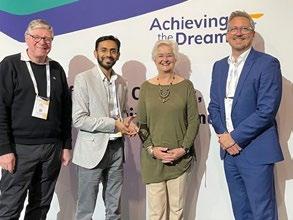
Designing for Social Justice Project (DSJP) presented at the ICED Conference in Nairobi
Dr Alan Amory (project lead and Senior Programme Specialist at SAIDE), Prof Muhammad Nakhooda (FAS L&T Coordinator), Ms Jenny Glennie (Strategic and Financial Advisor at SAIDE) and Mr Bill Moses (MD of the Kresge Foundation)

Designing for Social Justice Project
A dynamic collaboration between students and staff across three South African universities – CPUT, UWC and UCT – is reshaping higher education through socially just curricula. Led by Dr Xena Cupido (CPUT), Dr Subethra Pather (UWC), Prof Daniela Gachago (UCT), and their dedicated team comprising both staff and students, this multi-institutional initiative focuses on addressing power imbalances and fostering inclusive academic environments. Inspired by equity-centred approaches in Students as Partners (SaP) literature, the project moves beyond traditional models to critically engage with the power dynamics inherent in academic partnerships.
The DSJP team has developed a ‘living curriculum’ responsive to diverse stakeholder needs, employing Freire’s critical pedagogy, participatory design, and decolonisation methodologies. Their preliminary theory of change prioritises justice, equity, cultural context and care, guiding structured yet adaptable curricular innovations tailored for the Global South.
Participants include Ms Ashleigh Peterson, Mr Lukhona Leni (UWC students), Mr Tefo Mosienyane (UCT student), Ms Deidre Johnson, Mr Zwelibanzi Ngculu, Ms Asanda Ngoasheng (CPUT staff), Mr Esai Reddy, and Mr Joe-Dean Roberts (UCT staff).
This groundbreaking partnership promises sustainable, inclusive transformation across the region’s educational landscape. Twelve of its members delivered a slide presentation titled ‘Designing for socially just partnerships: Student–staff collaborations at the University of Cape Town’ at the UCT Teaching & Learning Conference 2024.
Eleven members of the DSJP team also delivered an insightful slide presentation at the 2024 RITAL event hosted by CPUT. The topic was ‘Socially just student–staff partnerships: Towards a collective theory of multi-institutional organisational change in the Global South’. Comprising staff members and student research assistants, the group highlighted a transformative shift from traditional Student-as-Partners (SaP) models to more robust Student–Staff Partnerships (SSPs). Drawing on the legacy of student movements such as Rhodes Must Fall and Fees Must Fall, the team addressed critical questions around who teaches, what is taught, and how learning happens, advocating for the amplification of student voices in shaping educational experiences.
More information about the DSJP initiative is available on the CPUT website or by contacting dsjp@cput.ac.za.
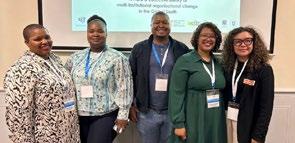
The DSJP staff and students were also invited to present at the National Teaching Advancement at Universities session. Ten team members discussed the ever-evolving educational landscape and flux pedagogy as a dynamic approach to learning and teaching, emphasising adaptability, reflexivity, and critical engagement. The slide presentation was titled ‘Embracing change leveraging flux pedagogy for social justice in education’. By examining key strategies and case studies, participants gained insights into creating inclusive, responsive and equitable learning environments. This session highlighted how educators can leverage flux pedagogy to address systemic inequalities and foster a culture of continuous transformation and empowerment.
The team shared insights from a DHET University Capacity Development Programme collaborative project on DSJP that provided staff–student teams with the opportunity to co-create and codesign courses, and to promote the scholarship of
learning and teaching (SOTL) through co-designing, conducting, and publishing research on the effectiveness of these co-created designs.
The DSJP marked a huge milestone in the DHET UCDG Collaborative project. Fundani’s student–staff partnership presented a two-part workshop at the HELTASA (Un)Conference in Limpopo. They also launched the national DSJP special project with HELTASA.
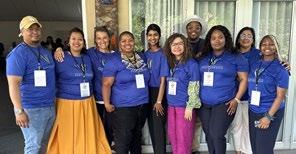
Eleven team members presented ‘Student–staff partnerships: Towards a collective theory of change across multi-higher education institutions in the Global South’, and ‘From student protest to student partnership: Fostering inclusivity and equity in cocreating decolonial curricula’ at the HELTASA (Un) Conference 2024.
Dr Kabelo Sebolai attended a language testing Winter School/workshop offered by the European Association of Language Testing (EALTA) at the University of Innsbruck, Austria, with the theme ‘Task-based language assessment’.
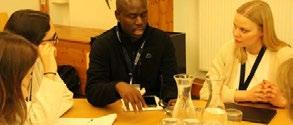
FUNDING
RESEARCH OUTPUT
2024 publications (submitted to the DHET in May 2025) Units
DSJP Team Limpopo
Mr Kabelo Sebolai at the Winter School/workshop in Austria
Creating inclusive, responsive, equitable learning environments
CPUT explores critical importance of multilingual pedagogies
The Language Working Group held a two-day Multilingual Pedagogies Workshop for CPUT staff and students at SARETEC in October, serving as the Annual Language Indaba. Dr Kabelo Sebolai, Institutional Language Coordinator at Fundani CHED, welcomed guests and emphasised the workshop’s role in implementing CPUT’s multilingualism policy. The initiative targeted students and lecturers involved in teaching, recognising that content lecturers and student tutors are not necessarily experts in using language to teach content in a multilingual context. Dr Sebolai stressed that the policy could not be effectively implemented in the learning and teaching space without this type of training.
Dr Xena Cupido, Director: Fundani CHED, welcomed guest speakers Ms Tholakele Nkwanyana, a lecturer in Language Education at NWU, and Prof Rosemary WildsmithCromarty, an applied linguist at UKZN. Ms Nkwanyana, who serves as an isiZulu Commissioner for the African Union, focuses her PhD research on African languages in higher education. Prof Wildsmith-Cromarty coordinates research on multilingual pedagogies, has served on language bodies for isiZulu and English, and sits on the Editorial Board for Language Teaching: Surveys and Studies
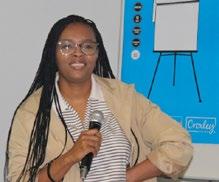
Day 1 included discussions on language policy, language history, and multilingualism. Day 2 revisited these topics and focused on deconstructing concepts, building resources, and creating tools for multilingual pedagogies. Dr Sebolai was impressed by the debate surrounding language policies, and Dr Cupido highlighted the significance of multilingual pedagogies in enhancing access to higher education. She noted that in a country as diverse as South Africa, language is more than a communication tool – it is a bridge to knowledge, understanding and inclusivity. The workshop concluded successfully, as confirmed by post-workshop evaluations.
Language experts celebrated
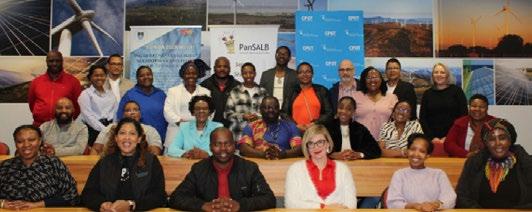
In October, language practitioners converged at SARETEC in Bellville to endorse and recognise the important work of language experts across various organisations. The Institutional Language Unit at Fundani CHED celebrated International Translation Day to highlight the imperative contributions of language practitioners from both private and government sectors. The event showcased universities’ ongoing efforts to promote indigenous African languages through translation and interpretation services. It also provided a platform for sharing insights and exploring collaborative strategies to further enhance multilingual initiatives in the Western Cape and beyond.
In his opening address, Dr Ignatius Ticha, FAS Language Coordinator, stated, “Today, we celebrate not only the invaluable work of translators and interpreters worldwide but also the critical role that translation plays in promoting multilingualism and preserving the diverse linguistic heritage of our institutions.”
Dr Ticha, a member of the CPUT Language Group, welcomed guests from UCT, SU, UWC, and the Pan South African Language Board (PanSALB). He added, “Your presence here signals our shared commitment to advancing the use of indigenous African languages in higher education and society at large.” Dr Ticha commended PanSALB for its continued leadership in promoting and preserving the richness of South Africa’s languages, particularly indigenous African languages.
Delegates from each institution showcased the work undertaken at their respective universities to promote African languages through translation services, interpreting, and terminology development, demonstrating a shared commitment to fostering multilingualism.
Delegates at SARETEC
Fundani proudly hosts SAALT Conference
The Annual South African Association for Language Teaching (SAALT) Conference, held in July, provided a vibrant platform for the exchange of ideas and networking around key developments in the field of language teaching and learning. Co-hosted by CPUT and SAALT at Breakwater Lodge in Cape Town, the event covered a wide range of topics including emerging trends, syllabus design, academic publications, and other professional activities in language education.
Opening the two-day event, Dr Xena Cupido, Director: Fundani CHED, warmly welcomed delegates and celebrated SAALT’s 60 years of excellence in language teaching and learning across diverse contexts. “As CPUT, we are particularly proud to celebrate this milestone with you, and to be given the opportunity to co-host this year’s gathering,” she said. “It certainly underscores our shared commitment to academic and educational advancements in language teaching, and to developing indigenous languages as academic and scientific languages.”
The conference featured an engaging programme of discussions, presentations, and workshops aligned with CPUT’s Vision 2030. A key theme was ensuring that the language of instruction supports student learning, while also fostering a multilingual environment that embraces CPUT’s unique African identity and historical context.
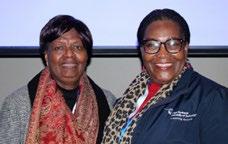
Delivering the keynote address, Prof Cynthia Marivate, CEO of the Pan South African Language Board (PanSALB), spoke on ‘The relationship and influence of teaching, curriculum, and learning environments, with special reference to African languages’. Her address called for the empowerment of teachers through foundational research skills. Dr Kabelo Sebolai, head of Fundani’s Language Unit, reflected positively on the event. “This year’s conference was a great success. The first face-to-face gathering after the pandemic was held in Pretoria in 2023 and was already a major milestone… This year’s conference has significantly contributed to SAALT’s revitalisation,” he said. “We are very proud – particularly of Fundani. The support we received from the Director’s office was outstanding, and we’ve had very positive feedback from participants overall.”
Fundani CHED celebrates excellence
Educators gathered at SARETEC in December for the Institutional Teaching Development Programme (TDP) ceremony 2024, celebrating the dedication of academic staff to excellence in education. The TDP at CPUT aligns with national and institutional priorities, including the National Framework for Enhancing Academics as University Teachers (NUTA) and CPUT’s Vision 2030. The programme empowers transformative university teachers to embrace inclusive practices, tackle challenges, and ultimately support student success.
The TDP curriculum addresses vital themes such as decolonising the curriculum, multilingual pedagogies, and integrating technology in teaching. By emphasising ‘Oneness and Smartness’, it equips educators to navigate the unique demands of a technological university. The ceremony marked both the completion of the programme and the significant contributions of participating academics to fostering educational excellence at CPUT. Dr Faiq Waghid, HoD: Academic Staff Development at Fundani CHED, said, “This achievement serves as a reminder of the collective effort required to build an innovative and inclusive educational environment that ensures student success and contributes meaningfully to society.”
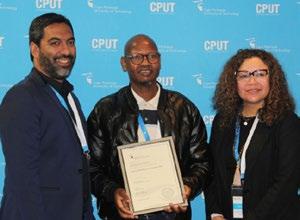
The event featured inspiring speakers. Dr Xena Cupido, Director: Fundani CHED, highlighted the TDP’s impact at CPUT. Dr Waghid reflected on the programme’s evolution since its launch. Dr Ntando Sindane from UWC delivered the keynote address. Two TDP candidates courageously shared their personal experiences, allowing guests to connect with their journeys. As certificates were presented, the room was filled with pride and a sense of accomplishment.
The TDP equips educators with the tools to create meaningful and inclusive learning experiences, benefiting students who will go on to make a positive impact in society. It fosters collaboration within departments and encourages the adoption of innovative teaching practices, enhancing the quality of education. Institutionally, it reinforces CPUT’s reputation as a leader in educational excellence, aligned with Vision 2030. Candidates described the programme as transformative, helping them grow into inclusive university teachers even without a formal background in education. They highlighted the importance of incorporating student and peer feedback into their teaching and reflected on how the TDP has shaped them into more thoughtful practitioners, ready to support both underprepared and high-achieving students.
Equipping educators to navigate the unique demands of a UoT
Prof Cynthia Marivate (Assoc Prof and first CEO of PanSALB) and Dr Connie Makgabo (Deputy Chair of SAALT and senior lecturer at UP)
Embracing diversity and technology for student success
Fundani CHED, led by Dr Xena Cupido, hosted the 12th Annual Research Innovation in Teaching and Learning (RITAL) Conference at the Cape Town Hotel School in December. Themed ‘Innovative pedagogies: Embracing diversity and technology for student success’, the conference provided a platform for educators and researchers to share insights and advance teaching practices.
Dr Najwa Norodien-Fataar, Research Coordinator at Fundani CHED and Chair of the RITAL committee, highlighted the participation of academics from UWC and UCT, which increased registrations, and praised the rise in postgraduate student engagement.
Sessions addressed digital literacy, technological integration, language and learning, equity, decolonisation, social justice, teacher training, professional development, and student success. Keynote speaker Prof Joanne Hardman, a psychologist and Deputy Director at UCT School of Education, presented a dialectical model of pedagogy that fosters metacognitive thinking and learning outcomes. She emphasised that meaningful pedagogy must connect general concepts with situational problems to effectively engage students, drawing inspiration from Hedegaard’s RadicalLocal Pedagogy.
Dr Norodien-Fataar also announced that the journal Paradigms is pursuing accreditation with the DHET, contingent on three consecutive years of consistent publication. She encouraged over 70 academic researchers from CPUT, UWC and UCT to support the initiative by submitting articles, noting that the peer-reviewed platform ensures rigorous evaluation and benefits from professional editorial guidance.
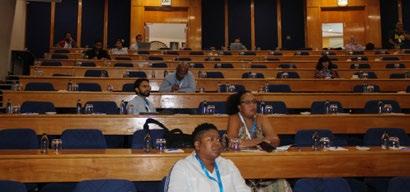
FYE celebrates its 10th anniversary
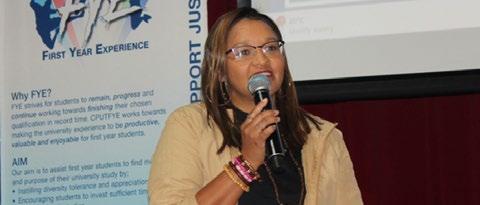
The STARS Unit at Fundani CHED marked ten years of transforming education through the First-Year Experience (FYE) programme this year. To celebrate, the unit hosted an FYE Symposium titled ‘A decade of FYE at CPUT: Reflecting on the past and shaping the future’ at the Bellville Campus in November, focusing on firstyear student education and the challenges they face.
The FYE initiative aims to increase student success, reduce attrition, and maximise achievement by consolidating resources and support for students transitioning from high school to university. In her opening remarks, Dr Xena Cupido, Director: Fundani CHED, noted, “This is certainly a huge milestone for us to celebrate this day and welcome you here.” She explained that FYE helps first-year students from diverse backgrounds build connections, grow personally, and navigate the social and emotional adjustments required when transitioning to university life. FYE serves as an extended orientation,
addressing students’ social and emotional needs beyond academics.
Ms Lu-Ann Kearns from the Faculty of Education remarked that, over the last decade, strategies have been implemented to ensure every first-year student felt a sense of belonging and found academic support to thrive. Other faculty FYE representatives also shared highlights from the programme. Dr Nosisana Mkonto, Head: STARS Unit, emphasised the importance of using data to support students effectively. She asked, “Who are these students coming to CPUT? What access have they had? Where are they coming from, what schools, and what support do they need? Sometimes we assume their needs, but we’ve realised times have changed.” Dr Mkonto expressed pride in her colleagues within and beyond Fundani, noting that the First-Year Experience initiative was a collective responsibility and that everyone had a role to play in its success.
‘Innovative pedagogies: Embracing diversity and technology for student success’
‘A decade of FYE at CPUT: Reflecting on the past and shaping the future’
HIV/AIDS UNIT
DR MELANIE SWANSON
maraisme@cput.ac.za
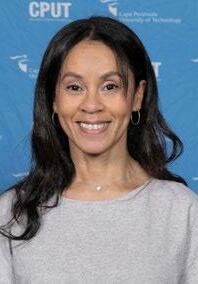
Introduction
The Department of Student Health & Wellness, commonly known as Campus Health and the HIV/Aids Unit, forms part of the Division of Student Affairs. It offers comprehensive, accessible, and student-friendly health and awareness services to CPUT students. The main office of the HIV/Aids Unit is based at the District 6 Campus, with a satellite office at the Bellville Campus. The department also operates a Mobile Wellness Vehicle, which visits various campuses and residences to provide health screening services. Campus Health runs four clinics located on the District 6, Bellville, Mowbray, and Wellington campuses. These clinics work in close collaboration with various departments, including Student Counselling, the Disability Unit, Sports, Arts & Culture, Student Housing, and the academic faculties.
The vision of Campus Health Services is to be accessible, affordable, and central to holistic healthcare and education, promoting total wellness. Its mission is to practise according to its code of ethics, maintain confidentiality at all times, and promote health in line with the guidelines of the World Health Organisation (WHO). In keeping with WHO principles, the approach is to treat students holistically –addressing physical, mental, and emotional well-being.
The vision of the HIV/Aids Unit is “to be at the heart of technology education and innovation in Africa”. Its mission is “to contribute towards building a university that is highly efficient, sustainable, and environmentally conscious”. The
unit aims to support high-quality teaching and learning, foster a relevant and responsive curriculum, contribute to vibrant and well-resourced student living and learning environments, and enhance the quality and effectiveness of research and knowledge production.
Departmental services
The services offered in the department (Health Clinic and HIV/Aids Unit) include:
• General medical consultations
• TB-DOTS supervision
• Reproductive healthcare services
• Treatment of sexually transmitted infections
• Treatment support and follow up of HIV-positive students
• Emergency response services
• Treatment of minor injuries and ailments
• Interdepartmental referrals between the unit and Campus Health
• Support during sports events
• Health screenings
• Awareness campaigns
• Reproductive healthcare services
• Internships
• Community engagement
• Peer education and student development
• Research and development
Promoting zero tolerance for gender-based violence
Representatives from the university’s residences attended a workshop in October, where the Report of the Ministerial Task Team (MTT) appointed to advise the Minister of Higher Education, Science, and Innovation on ‘Matters of sexual violence and gender-based harm in South African universities’, was unpacked.
Dr Melanie Swanson, Head: HIV/Aids Unit, explained that the objective was to bring residence students and staff together – including those in both owned and leased residences – to allow Higher Health to present key aspects of the report relevant to CPUT. “It is also to look at a range of protocols, e.g. the protocols on student and staff relationships, protocols on safer residences, and so on, and also to look at the processes we have in place,” she noted.
The MTT, appointed in 2019, released its report in early 2024. With the support of DHET, the document provided a comprehensive analysis of policies and processes across all public universities, aiming to identify gaps and recommend minimum standards for managing and preventing gender-based violence within the higher education system.
The October workshop, presented by legal practitioner Mrs Erica Emdon, focused on the MTT’s eight recommendations and the Policy Framework to Address Gender-Based Violence in the Post-school Education and Training System. Discussions were robust, covering topics such as consent, the role of alcohol, and reporting processes. Dr Swanson indicated that further sessions would be held with a view to full implementation.
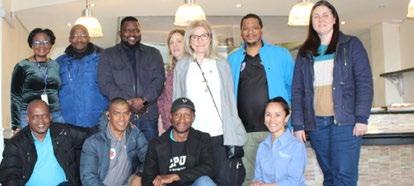
Peer education and student development
This is a year-long voluntary student development programme in which students are trained as peer educators. They develop skills in areas such as social mobilisation for a range of health-related awareness and outreach campaigns, including HIV, STI and TB screening, pregnancy, alcohol and substance abuse, gender-based violence, first responder training, and leading peer discussion groups on campus and in residences. Peer educators play a key role in promoting health-related interventions and mobilising their fellow students to participate in awareness initiatives.
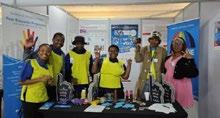
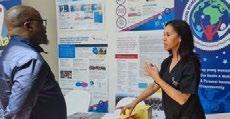
Health screening
Health screening is an integral part of the HIV/Aids Unit’s outreach programmes. It sets the unit apart by enabling the screening of large numbers of students for HIV, STIs and TB. Additional screening is conducted for other health-related concerns such as voluntary medical male circumcision, gender-based violence, substance abuse, and mental health – with referrals made as needed.
Services provided through this programme and the Mobile Wellness Services include:
• Early detection: Identifying health issues and risk factors in students at an early stage, allowing for timely intervention and treatment
• Preventative education: Educating students about healthy behaviours, lifestyle choices, and disease prevention
• Campus health promotion: Fostering a culture of health and well-being on campus, and creating a supportive environment for students
Staff and student leadership attending the Higher Health GBV Workshop for Campus Residences
Peer educators promoting helath-related interventions
• Referral and support: Identifying students in need of medical or psychological support and linking them with the appropriate services and resources
• Collaboration with other stakeholders and departments: Partnering with NGOs and various CPUT departments to provide a holistic health service
• Public health preparedness: Facilitating early detection of contagious diseases to help prevent and control potential outbreaks on campuses and in student residences
• Research and planning: Using data (in line with the institutional Ethics Policy) to inform research and guide the planning of university health services
• Access to health services: Bringing services directly to students through on-campus and residence-based campaigns, reducing disruption to their academic responsibilities
• Data collection: Gathering data to assess the overall health of the student population and inform future health initiatives
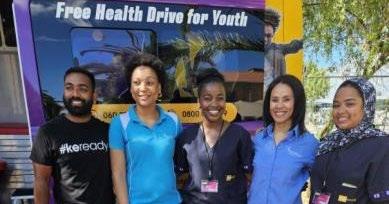
Students prioritise their health
The HIV/Aids Unit, in partnership with KeReady, NORSA, WITS Reproductive Health Institute (RHI), and TB HIV Care, concluded the First Things First campaign in May. Launched in February, this Higher Health-funded initiative has been active for over 15 years and is among the most successful Mobile Wellness health screening campaigns at CPUT, according to HIV/Aids Unit head, Dr Melanie Swanson. The campaign encourages students to take ownership of their health and know their health status. “These services include HIV screening, blood pressure screening, blood glucose screening, sexually transmitted infections screening, and more,” said Dr Swanson.
KeReady provided Covid-19 and flu vaccines, reaching all CPUT campuses, including university-owned and leased residences, with services extended to students after class and in the evenings. The campaign also included contraceptive and pre-exposure prophylaxis (PrEP) services. Over 3 500 students participated, joined by CPUT student leadership.
The campaign was more than a health service drive; it also focused on educating students on reducing health risks. Campus Health continues to provide access to chronic medications such as antiretroviral treatment. Dr Swanson emphasised, “Living with HIV infection is like any other chronic condition that is manageable and treatable.”
By combining healthcare services with education, the campaign aimed to make a lasting impact on student wellness. The goal was to promote proactive health management and empower students with access to free services. Students are encouraged to visit campus clinics for contraceptive and other healthcare services. Follow the campaign on Facebook: CPUT Hiv/Aids Unit, Instagram: hivunitcput, Tiktok: CPUT Hiv/Aids Unit Weblinks: HIV/Aids Unit, Campus Health.
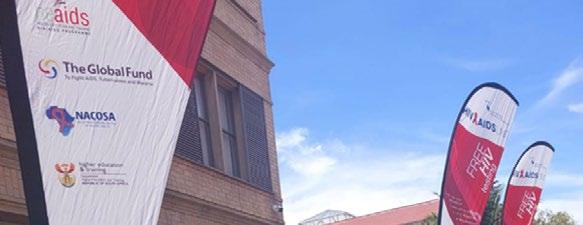
Bringing healthcare services directly to students
First Things First campaign, Bellville Campus
#Keready joins HIV/Aids Unit in student outreach

The HIV/Aids Unit partnered with the #Keready initiative to offer youth-friendly health screenings at the Bellville Campus, including HIV, STI and TB tests at no cost to students. The mobile clinics were joined by representatives from the Western Cape Department of Health, the DG Murray Trust, and visiting German stakeholders including parliamentarians, KfW and GIZ.
Prof Judy Peter, Director: SIP, welcomed the delegation, highlighting the importance of cross-border collaboration to support sustainable development goals related to health and well-being. Head of the HIV/ Aids Unit, Dr Melanie Swanson, noted that the delegation appreciated how their funding had supported state-of-the-art wellness vehicles, and praised #Keready’s youth-centred engagement, particularly in rural and farming communities. Dr Lethukwenama Letsoalo and Dr Tevarus Naiker, on behalf of #Keready, thanked CPUT for its continued support and expressed enthusiasm for ongoing collaboration.
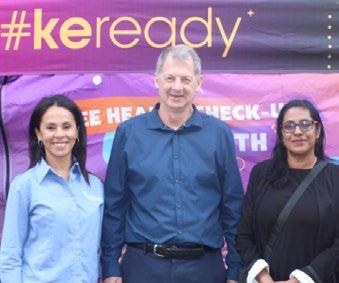
Dr Swanson mentioned that the German visitors felt welcomed while visiting the donated Wellness Mobile Units. They appreciated knowing that their funds were effectively utilised, valued the presence of the Western Cape Department of Health, enjoyed networking with service providers, and were impressed by the vibrancy of the various state-of-the-art Wellness Mobile Vehicles. The delegation observed how #KeReady connected with youth through their youth-friendly programmes and their presence in rural farming areas.
In a joint message on behalf of #KeReady, Dr Lethukwenama Letsoalo and Dr Tevarus Naiker expressed their gratitude to the CPUT team. They added that they were excited to continue working together and look forward to continued success in the partnership with CPUT.
German delegation and funders of the NGO KeReady visiting Bellville Campus
STUDENT COUNSELLING
MS LEANIE BRITS
pienaarl@cput.ac.za
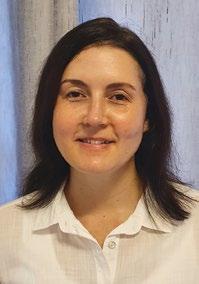
The department offers a range of services to registered and prospective students through individual and group interventions. It serves the CPUT community via various programme activities focused on preventing and addressing mental health challenges, as well as promoting the personal development of students. These activities are supported through partnerships with academic and support departments, along with several student groups and organisations. One such student development programme focuses on leadership development, equipping students with leadership skills using the Social Change Model of Leadership at CPUT.
Mrs Samantha Hanslo presented a conceptual paper on the leadership programme at the 44th Annual Conference of the South African Association for Counselling and Development in Higher Education (SAACDHE). The training programme is designed to support students currently in leadership roles, as well as those who have expressed a desire to develop their leadership skills and abilities. It comprises eight modules, delivered as separate workshops, each derived from seven core values. The programme aims to help students better understand themselves, become more aware of their roles in society, and inspire them to become agents of social change. It also focuses on fostering graduate attributes and promoting student success through the knowledge and skills shared during the training.
The paper outlines the fundamental principles of the leadership theory and argues that it is a relevant and effective model for developing leadership skills in alignment with graduate attributes. Recommendations for further research include using data gathered at CPUT to explore participants’ experiences and the impact of the training series on their leadership development. The paper also suggests investigating the application of the model in leadership development at other institutions.
Raising awareness about mental health
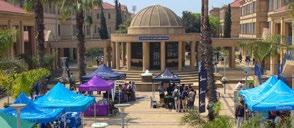
In October, the Division of Student Affairs celebrated World Mental Health Day with a week-long campaign across all CPUT campuses aimed at raising awareness about mental health. World Mental Health Day, observed annually on 10 October, focused in 2024 on the theme ‘Mental health in the workplace’. The campaign included dedicated mental health days on the Wellington, Bellville, District 6, and Mowbray campuses.
Ms Leanie Brits, HoD: Student Counselling, explained that the objectives were to:
• promote mental health education
• empower students with knowledge and skills to manage their well-being
• reduce stigma surrounding mental health
• inform students about available support services and strategies for addressing mental health challenges
• raise awareness through social mobilisation of students on campus led by peer leaders
Students and staff engaged with CPUT’s student counsellors, diversity and inclusivity champions, peer helpers, peer educators, and other mental health advocates. Ms Brits highlighted that sessions specifically addressed suicide awareness and prevention, substance use and abuse, as well as general mental health promotion. The campaign also featured partnerships with external organisations, including LifeLine, Ramot, Syked, and Cape Mental Health, who provided additional resources and support. The week-long initiative encouraged open conversations, promoted early intervention, and reinforced CPUT’s commitment to supporting the holistic well-being of its students and staff.
CPUT reinforces its commitment to supporting holistic well-being of students and staff
CPUT RESEARCH FOCUS AREAS
FOCUS AREA 1 Bioeconomy & Biotechnology

FOCUS AREA 2 Space Science, Engineering & Technology
FOCUS AREA 3 Smart Energy
FOCUS AREA 4 The Environment, Climate Change & Sustainability
FOCUS AREA 5 Human, Health & Social Dynamics
FOCUS AREA 6 The Digital Society

The CPUT focus area programme plays an important role in the development of research expertise and provides an institutional view of the university’s research strengths and foci.
The research focus areas provide a significant foundation for the institution’s Smart RTIP Strategy and give voice to the transdisciplinary research approach used at CPUT. They are each populated with research niche areas to enhance CPUT’s research, technology and innovation efforts, and resources. These provide the mainstays around which capacity and strengths are developed in terms of our academic and research objectives. The research focus areas are further strengthened through the appointment of research chairs.
The choice of these focus areas and associated niche areas has been informed by:
• CPUT’s strengths
• Areas likely to make strong contributions to strategic imperatives and national priorities
• A need to support a multidisciplinary approach to research and innovation
The current six research focus areas are directly aligned to chapters in the South African National Development Plan (NDP) 2030 in terms of competitiveness and relevance to South Africa, and to the United Nation’s 17 Sustainable Development Goals (SDGs) in terms of competitiveness and relevance to the global earth.
FOCUS AREA 1 Bioeconomy & Biotechnology
Introduction by Prof Marilize Le Roes-Hill
leroesm@cput.ac.za
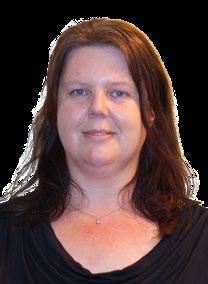
Biotechnology-based research and innovation at CPUT is aimed at achieving the objectives of CPUT’s RTI Blueprint and Vision 2030, as well as contributing to the South African Bioeconomy Strategy. This will be achieved with knowledge production aimed at benefiting local and national communities, and ultimately also supporting the growth and development of a global bioeconomy.
The goals of the South African Bioeconomy Strategy are to address health challenges; food nutrition and security; clean water; clean renewable energy with a reduced reliance on fossil fuels; a shift from a resource-based economy to a knowledge-based economy with sustainable resource management; and the protection of biodiversity. Research Focus Area 1 includes research activities within its various research niche areas aimed at addressing these goals.
In addition, a number of the UN’s SDGs are addressed through this research focus area:
Goal 2 – Zero hunger
Goal 3 – Good health and well-being
Goal 5 – Gender equality
Goal 9 – Industry, innovation and infrastructure
Goal 12 – Responsible consumption and production
Goal 14 – Life under water (biodiversity management)
Goal 15 – Life on land (biodiversity management)
The research taking place in Research Focus Area 1 aims to enhance strategic partnerships, facilitate knowledge exchange and capacity building, and stimulate socio-economic development in the target areas identified. Interconnectivity with the work taking place in the other CPUT research focus areas makes this research focus area an ideal base/starting point for multi- and transdisciplinary research.
The research niche areas that currently form part of this research focus area include:
• Biocatalysis and enzyme production
• Chemoprevention
• Community-based knowledge translation
• Energy from bioresources
• Functional foods
• Oxidative stress in health and disease development
• Natural products chemistry
• Sports performance and supplementation
RESEARCH INSTITUTE
APPLIED MICROBIAL & HEALTH BIOTECHNOLOGY INSTITUTE (AMHBI)
PROF JEANINE L MARNEWICK (CHAIR: BIOTECHNOLOGY AND DIRECTOR: AMHBI)
marnewickj@cput.ac.za

The Applied Microbial and Health Biotechnology Institute (AMHBI) has a mandate to conduct excellent research with a strong multi- and transdisciplinary focus in line with CPUT’s RTI Blueprint and Vision 2030. The institute’s research is aimed at exploring South Africa’s vast microbial and indigenous flora biodiversity in finding innovative solutions to improve the overall health of our country’s communities. AMHBI strives to achieve this through integrated research in Microbial and Health Biotechnology while encouraging the development of key scarce skills in the realisation of South Africa’s Bioeconomy Strategy. The core business is focused on postgraduate training in the scarce skills areas of Biocatalysis, Biomarkers, Biotechnology, Chemoprevention, Oxidative Stress, Redox Biology, Proteomics and related research fields, securing funding to allow for this research to take place, and the creation and dissemination of new knowledge related to these niche areas.
Message
from Prof Jeanine L Marnewick, Research Chair: Biotechnology and Director: AMHBI
This year has been a very busy year for our academics, postdoctoral fellows and postgraduate students with their involvement in the many multi- and transdisciplinary research projects contributing to four of the university’s six Research Focus Areas. These projects are also aimed to address certain of the United Nation’s sustainable development goals, certain chapters in the South African National Development Plan and the Bioeconomy strategy, while also aimed towards the realisation of the CPUT’s Vision 2030.
In 2024 we celebrate the greatest number of postgraduate students graduating in the five-year existence of our Institute, with nine in total. One of the four doctoral graduates is a staff member at the CPUT and we are grateful for the contribution to ensure an increase in the number of staff members with a doctorate qualification. We also welcomed ten new (two postgraduate diploma students, five master’s and three doctoral) postgraduates affiliated to AMHBI, bringing our total number of postgraduates to 36 in 2024. Our postdoctoral fellows complement has not been restored to that of previous years, with lack of funding being the main contributor to the decreasing numbers. However, two postdoctoral fellowships have been secured from the NRF for 2025 and AMHBI aims to build on that with the support from the university.
Continuing to create a vibrant research community, the format of the monthly AMHBI journal club was revised, now referred to as AMHBI Nexus. This change was driven by our two newly appointed junior researchers to make it more accessible for everyone to participate and enjoy. This has been a great success with more of our researchers and students actively engaging in the activity. We also welcomed Dr Jingrang Lu from the United States Environmental Protection Agency at one of the Nexus meetings where he addressed various aspects of water monitoring.
In contribution to the CPUT Vison 2030, AMHBI researchers are engaged in three innovation projects, all involving the use of the proudly South African herbal tea, Rooibos as possible nutraceutical and/or cosmeceutical.
As always, none of these achievements would have been possible without the dedication from our staff, special members, postdoctoral fellows and postgraduate students and I would like to thank all AMHBIans for their great spirit and invaluable contributions.
2024 marked the successful completion of AMHBI’s first 5 year business plan, and although having to function for the first two years of existence within the restrictions posed by the Covid-19 pandemic, AMHBI’s research and innovation outputs the past five years have shown that our researchers, laboratory technical staff, postdoctoral fellows, postgraduate students and administrators are working together and with the support from CPUT, in particular the Office of the DVC: RTIP we could achieve our goals. Despite the challenges faced, we have celebrated successful NRF ratings, ad hominem promotion, numerous research awards, successful grants, graduations, partnerships with industries and international and local experts, all a confirmation of the relevance of our research to the academic, scientific, and other communities we serve. AMHBI has made significant contributions to the area of research and innovation at the CPUT and through this promoted an inspirational and positive research culture. We aim to build on this in years to come and am looking forward to having a consolidated AMHBI facility on the Bellville Campus with the establishment of the Biotechnology corridor, a vision by our VC, Prof Chris Nhlapo.
Focus area and niche areas
The focus area and relevant niche areas within the AMHBI are aligned to address CPUT’s 10year RTI Blueprint. Focus Area 1: Bioeconomy & Biotechnology is featured within AMHBI via the following niche areas:
Niche areas within AMHBI
• Biocatalysis and enzyme production
• Biomarkers
• Chemoprevention
• Oxidative stress in health and disease development
• Wastewater remediation and reuse
Niche areas located within faculties and departments outside AMHBI
• Natural products chemistry
• Functional foods
• Sport performance and supplementation
• Health and well-being
• Environmental (air, soil and water) assessment and monitoring
Research output
During 2024, AMHBI staff, postgraduates and postdoctoral fellows contributed to 23 peer-reviewed publications, including 1 book chapter and 15 conference presentations resulting in a healthy conference to publication ratio of 1 to 1.47.
Postgraduates and postdoctoral fellows
In true multi- and transdisciplinary nature, AMHBI staff in collaboration with CPUT faculties, other regional, national and international HEIs, successfully supervised and/or co-supervised several postgraduate students. This resulted in the highest number of students graduating in AMHBI to date, including nine graduations in 2024, with five master’s degrees, and four doctoral degrees. Our staff currently supervise/co-supervise a total of 36 postgraduate students, 24 at master’s level and 12 at doctoral level. AMHBI researchers hosted eight postdoctoral fellows in 2024 including one transdisciplinary fellow.
To all our graduates of 2024, Dr Alaric Prins (staff member), Dr Maria Hartnick (staff member), Dr Oiva Kamati, Dr Lana Keet, Mr Elias Chipofya, Mr Juandre Groep, Ms Danielle Mitchell, Ms Nabeela Gamiet and Mr Paolo Bristow congratulations on your welldeserved success we wish you all the best with your future academic endeavours!
Partnerships and collaboration
During 2024, AMHBI members strengthened their strategic partnerships with institutions not only local and nationally, but also across Europe, USA, Mexico, Japan and Africa (three countries) to ensure alignment with CPUT’s Vision 2030.
Research funding and grants
AMHBI researchers were successful in attracting research funding to the value of R 8 174 984 in 2024 from external funders, which included the South African Rooibos Council, Maize trust, Rhodes University, the NRF (under various funding programmes), Water Research Commission, THRIP/ DSI and the Technology Innovation Agency, while income received for service delivery by the institute exceeded R 1.8 million.
Research awards
At the CPUT Research Day our researchers were congratulated for their respective NRF ratings.
Dr Taskeen Docrat was awarded the South African Women in Science Award (SAWISA) for the category Natural Sciences and Engineering in September.
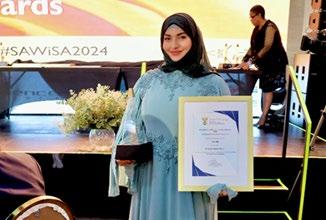
Dr Taskeen Docrat, SAWiSA winner for the category Natural Sciences and Engineering
Niche areas within the Focus Area: Bioeconomy & Biotechnology
A. Biocatalysis and enzyme production

Leader: Dr Marilize le Roes-Hill
It was another busy year for researchers working within the Research Niche Area: Biocatalysis and enzyme production. Work on actinomycete enzymes for the degradation and beneficiation of seaweed (NRF-funded project, grant number 138015) saw the establishment of a new internal collaboration with Dr Conrad Sparks, Centre for Sustainable Oceans, CPUT, and continued collaboration (and co-publication) with Prof Brett Pletschke from Rhodes University. One of our young, up-and-coming researchers, Alaric Prins, received his PhD: Biotechnology from the University of the Western Cape, 22 April 2024 (Supervisors: A/Prof Marilize Le Roes-Hill and Dr Bronwyn Kirby-McCullough) and continued to be a valuable member of this Research Niche Area.
Our enzyme discovery, characterisation, and application work were also the focus of research presented at an EnzymeML webinar held in June, with a presentation by Dr Alaric Prins, which was focused on ‘Integrating computational methodology and traditional workflows: an experimentalist’s point-of-view’. Other speaking engagements also included an oral presentation, ‘Marine multicopper oxidases and their application in seaweed degradation’ given by A/Prof Marilize Le Roes-Hill at the 6th International Conference on Functional Metagenomics (FMG2024), held in Skukuza, Kruger National Park in June. While an MSc: Biomedical Technology student, Sizakele Ntuli, supervised by members of AMHBI and Dr Conrad Sparks, took part in the Fisheries Economic Development Research Advisory and Training Institute (FEDRATI) Research Uptake engagement. She presented her research
proposal to other researchers, students, and the Director of FEDRATI for the event in November.
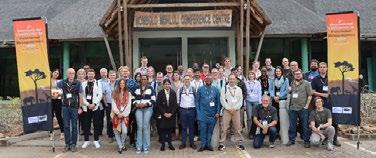
In addition, Prof Marilize Le Roes-Hill and Dr Alaric Prins were invited to give presentations at various prestigious events. One of Prof Le Roes-Hill’s invited presentations was co-presented with Dr Alaric Prins at the 5th EnzymeML Workshop, which was held in September, at the Jagdschloss Niederheim, Rüdesheim, organised by Dr Carsten Kettner (Beilstein Institute, Germany) and Prof Dr Jürgen Pleiss (University of Stuttgart, Germany). Dr Prins was also invited by the Department of Medical Bioscience at the University of the Western Cape in October to give a talk showcasing the actinomycete research, driven by Prof Le Roes-Hill,
Attendees of the 6th International Conference on Functional Metagenomics, including Prof Le Roes-Hill
taking place at AMHBI. In addition, Prof Marilize Le Roes-Hill, as a member of the Scientific Committee of the 1st International Conference on Applied Microbiology and Biotechnology (ICAMB2024), Bejaia, Algeria, was also invited to present at the conference event in October, while Dr Prins took part in one of the workshop events organised for the conference.
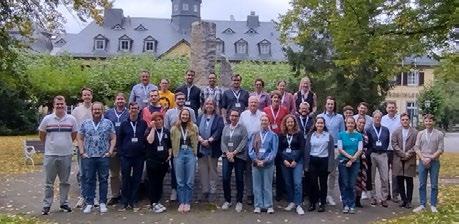
For more information on the EnzymeML project, please visit https://enzymeml.github.io/services/, and https://github. com/PyEED/pyeed?tab=readme-ov-file for more information on the PyEED project.
Prof Le Roes-Hill also had the honour of giving an invited presentation for the 40th Live Seminar (broadcast on YouTube in November) of the Bergeys International Society for Microbial Systematics (BISMiS), with work focused on ‘Actinomycetes diversity: Insights from taxonomy and ecology for biotechnology applications’, which received over 100 views on YouTube.
Other engagements by the team also include an oral presentation by Dr Prins at the 19th International Symposium of Microbial Ecology (ISME19), in Cape Town in August, and poster presentations by Dr Jo-Marie Vreulink and Prof Le RoesHill. The event also allowed for establishing a new collaboration with Dr Johanna Muurinen, University of Helsinki, Finland, and connecting with Dr Grant January,
University of Plymouth, UK. In addition, Prof Le Roes-Hill and Dr Prins also presented at the annual CPUT Research Festival, showcasing their research that falls within this specialised Research Niche Area in November.
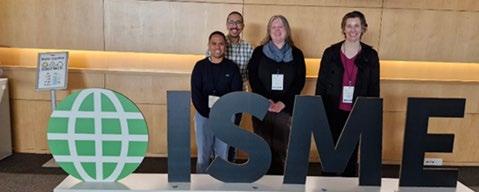

Attendance at ISME19 provided a good opportunity to reconnect with collaborator Dr Grant January from the University of Plymouth, UK. It also led to the establishment of a new collaboration with Dr Johanna Muurinen from the University of Helsinki, Finland, and facilitated positive discussions with Prof Russell Hill from the University of Maryland.
Attendees of the 5th EnzymeML Workshop at the Jagdschloss Niederheim, Rüdesheim, Germany
Attendees of the 19th International Symposium of Microbial Ecology , Cape Town
B. Biomarkers
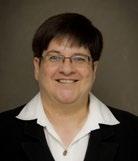
Leader: Dr Liana van der Westhuizen
Biomarker development research is integrated in the Rooibos and Heart Health CPUT Prestigious Project within the Oxidative Stress in Health Promotion and Disease Development niche area of the Focus Area: Bioeconomy & Biotechnology. The initial phases of this clinical study were completed in 2022. Urine samples were collected from the clinical trial participants before the start of the study and following their consumption of green and fermented rooibos. These samples were analysed for the known rooibos phenolic components by targeted LC-MS analyses at the Central Analytical Facilities of SU. Additionally, Ms Pamella Mngqawa is collaborating with Biochemistry, SU to receive training and assist with the further analyses of the Rooibos and Heart Health study samples for serum steroid profiling. Ms Mngqawa made excellent progress and looking to finalise the analyses in 2025.
Dr Van der Westhuizen attended several virtual conferences, workshops and webinars on biomarkers, ethics, artificial intelligence, and other related fields. She is a member of the Faculty Health & Wellness Sciences HDC, and RECs. She is the supervisor of two MSc and BHSc IV students in the Department of Biomedical Sciences, Faculty of Health & Wellness Sciences.
THE
PhD candidate attends prestigious neuropharmacology school
Mr Elias Chipofya, a PhD candidate at AMHBI, received a prestigious travel scholarship to attend the 2nd School on Neuropharmacology Research and Drug Development in Harare, Zimbabwe, in December. The programme was organised and sponsored by the International Brain Research Organisation (IBRO) through its African Regional Committee (ARC), in collaboration with the University of Zimbabwe’s Department of Pharmacy and Pharmaceutical Sciences. The school provided participants with a comprehensive understanding of fundamental pharmacological principles and research practices necessary for investigating potential neuroactive compounds. The knowledge and skills gained are expected to empower researchers to transform traditional natural compounds into potent therapeutic agents or preventive strategies, contributing to innovative treatments for neurological disorders.
Mr Chipofya, supervised by Dr Taskeen Docrat and Prof Jeanine Marnewick, described the experience as transformative, highlighting opportunities to learn cutting-edge neuropharmacology techniques and to network with leading experts in the field. He is applying this knowledge to his research on Rooibos and its potential neuroprotective effects. With limited understanding of how Rooibos affects the brain, his work aims to uncover the mechanisms through which its antioxidant compounds may prevent Alzheimer’s disease and related disorders. He noted, “By understanding these mechanisms, we may develop novel preventive strategies to combat neurodegenerative diseases and improve the quality of life for millions worldwide.”
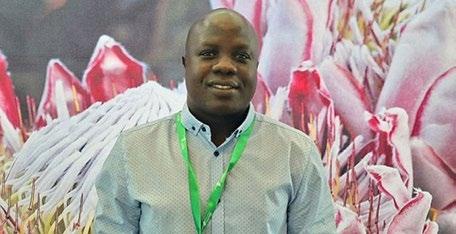
Mr Elias Chipofya IN
NEWS
Junior researcher receives SA Women in Science Award
Dr Taskeen Docrat, a junior researcher at AMHBI, was awarded the Distinguished Young Woman Researcher: Natural and Engineering Sciences Award during the South African Women in Science Awards in August. Hosted by the DSI, the awards recognise women excelling in science, technology, engineering, and mathematics. Dr Docrat expressed her gratitude for the recognition, describing it as both an honour and a motivation to continue her work in neuroscience. “I am truly humbled; this award is a testament to the dedication and effort I put into my research. Professionally, it opens doors to new opportunities and collaborations,” she said.
Dr Docrat’s interest in science began with a curiosity about how biological systems function. After earning her PhD in Medical Biochemistry from UKZN, Dr Docrat has focused her research on innovative approaches to prevent neurodegenerative diseases, particularly Alzheimer’s. Her work examines the effects of Rooibos herbal tea and traditional medicine, aiming to raise awareness of these conditions and contribute to cost-effective preventative healthcare solutions. “Neurodegenerative diseases impact not only individuals but also their caregivers. My goal is to improve societal healthcare systems and preventive disease management while advancing scientific knowledge,” she explained.
Dr Docrat acknowledged the guidance of multiple mentors who have shaped her professional journey. “I consider myself fortunate to have been mentored by several remarkable individuals who contributed significantly to my development,” she said.
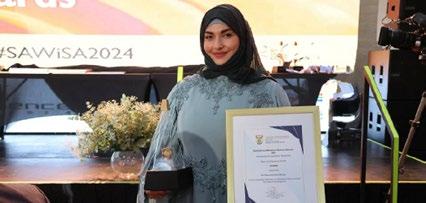
C. Chemoprevention
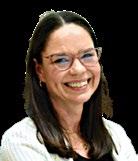
Leader: Dr Mariska Lilly
The year 2024 marked a year of significant achievements and international collaboration in this research group. Key milestones were achieved through the continued focus on the anti-inflammatory and anti-allergic properties of honeybush and rooibos, exploring their applications in skin and gut health. Two major international research visits strengthened the partnership between the CPUT, the Agricultural Research Council (ARC), and the Tokyo University of Agriculture and Technology (TUAT). These visits were supported by funding from the South Africa–Japan bilateral agreement, with Dr Lilly serving as the South African Principal Investigator.
In September, a delegation from TUAT, including Profs Miura and Yoshida and their students, visited South Africa. During the visit, seminars were held, where the latest research on honeybush phytosomes and their effects on inflammation and immune regulation was presented. The visit included a honeybush tasting session and a trip to the Agulhas Honeybush Tea Farm, providing a deeper understanding of the applications of honeybush in functional foods. In November, researchers from CPUT and ARC travelled to TUAT in Tokyo, where a full-day seminar took place featuring research presentations and discussions on project progress. The seminar was complemented by industry site visits to food factories and a green tea processing plant, further enriching the knowledge exchange.
Dr Taskeen Docrat
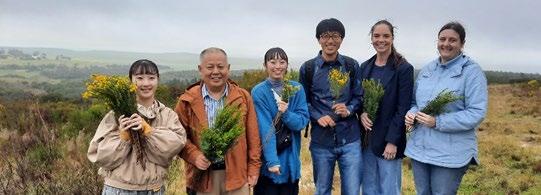
Ms Nabeela Gamiet completed her MSc in Biomedical Sciences with summa cum laude. Her thesis titled ‘The in vitro modulation of intestinal growth and inflammatory indices by Fumonisin B1 and hydrolyzed Fumonisin B1 through protein network analyses’ made a notable contribution to the field of intestinal health. Ms Lana Keet completed her PhD in Biochemistry at SU under the supervision of Dr Lilly and co-supervision of Dr Abel (CPUT) and Prof Ann Louw (SU). Her thesis, ‘Modulation of UVB-induced inflammation and oxidative stress by unfermented rooibos and honeybush aqueous extracts: A comparative study’, presented significant findings in skin health. Dr Nashia Deepnarain received an NRF Postdoctoral Fellowship for two years to work on several omics related projects in the niche area.
The research group presented key findings at several international conferences in 2024, furthering the visibility of their work. Dr Lilly presented a poster on Ms Gamiet’s MSc research at the 45th Mycotoxin Conference held in Vienna in June 2024, titled ‘Comparative proteomic analysis unveils differential responses to HFB1 and FB1 in porcine IPEC-J2 cell line’. Dr Lilly also presented at the 23rd International Congress of the International Society for Ethnopharmacology and the 2nd National Congress of the African Phytomedicine Scientific Society in Cape Town, where she delivered a talk on ‘Modulation of UVB-induced oxidative stress and inflammation in skin keratinocytes using unfermented rooibos and honeybush aqueous extracts’. Additionally, Dr Lilly was invited to present at the Nutrition Society of South Africa Symposium in Stellenbosch on International Tea Day giving a presentation on ‘Teatime for your tummy: Unveiling the anti-inflammatory power of rooibos and honeybush on gut health’, and at the South African Honeybush
Tea Association AGM in George on ‘Exploring the anti-Inflammatory properties of honeybush: Innovative applications of honeybush nanoparticles in skin and gut health’. Several peer-reviewed articles were also published in high-impact journals, contributing significantly to the growing body of knowledge on honeybush and rooibos as functional ingredients.
A rooibos phytosome was successfully developed with funding from the Technology Innovation Agency (TIA). The formulation was tested in vitro using intestinal cell lines, demonstrating promising effects in mitigating inflammation. In addition, collaborative funding from THRIP, in partnership with the company Probipher, supported the development of a probiotic specifically aimed at dogs and cattle. This collaboration enabled the successful analysis and creation of a shortlist of organisms for further testing. These organisms are currently being evaluated for their safety and efficacy as potential probiotics for cattle and dogs.
The research conducted in 2024 has significantly advanced the scientific understanding of honeybush and rooibos as functional health-promoting ingredients. The continued international collaborations, successful student graduations, and high-impact publications underscore the growing influence of this research field. Moving forward, the research group will focus on finalising experimental research to support commercialisation efforts, paving the way for the successful translation of these findings into nutraceutical and cosmeceutical applications. The year 2024 has been a pivotal year for advancing research in chemoprevention and functional ingredients development, with promising implications for the health and wellness industries.
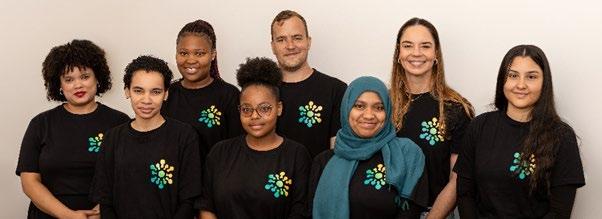
NRF SA–Japan bilateral research visit by TUAT, at the Agulhas Honeybush Tea company in Bredasdorp
Chemoprevention researchers in collaboration with Probipher developing a probiotic for cattle and dogs
D. Oxidative stress in health and disease development

Leader:
Prof Jeanine Marnewick
The research focus of this niche area is oxidative stress and its involvement in the aetiology of many diseases, including cardiovascular, metabolic and neurodegenerative diseases and the prevention and/or delay thereof via the use of indigenous medicinal plants, such as the proudly South African herbal tea, Rooibos.
Highlights of 2024 include Dr Taskeen Docrat being honoured with the prestigious South African Women in Science Award (SAWiSA) in the Natural Sciences and Engineering category in September. This recognition underscores Dr Docrat’s significant contributions to the field and her commitment to advancing scientific research, and as a result, she was invited by UCT’s Department of Physics as guest speaker to talk on the challenges women encounter in academia and emphasised the importance of strategic efforts to overcome obstacles, including imposter syndrome – a common experience among many attendees. Dr Docrat’s insights and personal experiences as a woman in the sciences resonated deeply with the audience, promoting a sense of community and shared understanding.
Dr Docrat has been awarded funding through the Early Investigators Programme for her study ‘Exploring the intersection of psychosocial stress, mitochondrial health, and cardiometabolic risks in early adult life: A novel approach’. This project, funded by the SAMRC has been allocated R1 500 000 and will span from 2025 to 2027. The study aims to explore critical links between psychosocial factors and health outcomes in early adulthood.
A number of our postgraduates presented and shared their work at international platforms throughout 2024, including Dr Maria Hartnick presenting on ‘The modulatory effect of rooibos on cardiac parameters in participants at risk for developing cardiovascular disease: A comprehensive echocardiographic analysis’ at the UK Imaging and Oncology (UKIO) Conference in June. A contingency
from this niche area, including Dr Oiva Kamati, Dr Taskeen Docrat, Dr Shanika Reddy, Mr Elias Chipofya and Ms Zaakiyah Emjedi also presented their research findings on various bioactivities of the proudly South African herbal tea at the 23rd International Congress of the International Society for Ethnopharmacology and the 2nd National Congress of the African Phytomedicine Scientific Society in October. Prof Marnewick was also invited by the Technology Innovation Agency of South Africa (TIA) to exhibit her and the team’s rooibos innovation at this meeting held in October.
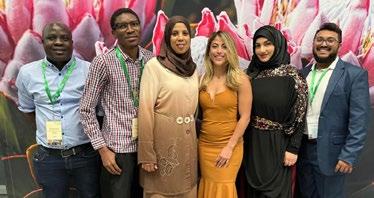
Prof Marnewick was invited by the Department of Science and Innovation to present on her research involving the South African herbal tea rooibos and its health promoting properties. This meeting was held at Enrich in Africa, and Prof Marnewick had the privilege to meet the Director General of the European Commission, Marc Lemaître in November. The programme featured a segment dedicated to innovators and researchers who contribute to research
Mr Chipofya, Dr Kamati, Ms Emjedi, Dr Reddy, Dr Docrat and Dr Sheik Abdul presented at ISE–APSS2024
and innovation in the ecosystem and foster collaboration opportunities across Africa and Europe. Prof Marnewick was also an invited guest speaker at the seminar series organised by the South African Association for Food Science and Technology (SAAFoST) with a talk titled ‘Dietary antioxidants: Do we really need them? An update’ in March. She also spoke at the joint SIP and AMHBI science communication event celebrating International Tea Day on the ‘Health benefits of our proudly South African herbal tea: Rooibos’ in May.
This year also marked a significant increase in the number of multidisciplinary research projects this niche area is involved with, including some with international and other national HEIs. These projects include ‘The impact of Covid-19 on neuropsychological functioning and late-life dementia risk: The role of inflammation and oxidative stress’ in collaboration with the University of Vienna; ‘Attenuation of fumonisin B1 toxicity by Rooibos: New hints for oxidative stress treatment’ with the Hungarian University of Agriculture and Life Sciences; ‘Modulation of high glucose induced oxidative stress by using a C. sativa plant extract in HepG2 cells’ with SU; ‘Rooibos as a neuroprotective agent – Evaluation of in vitro models for Alzheimer’s disease with SU and UFS; and ‘Rooibos and exercise: An omics approach’ with North West University, to name a few.
E. Wastewater remediation and reuse

Leader: Dr Pamela Welz
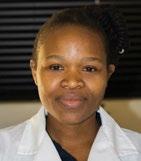
Co-leader: Dr Thandeka Mthethwa
The group focuses on the remediation and/or valorisation of solid and liquid waste. The research is currently funded by the WRC and the NRF. Research projects are mainly centred around beneficiation of agri-industrial and industrial wastes, conducted in collaboration with industry partners from the edible oil, winery, maize wet-milling and tanning industries. As part of the THENSA niche area Waste Management and Circular Economy that focuses on synthesis and degradation of bioplastics, the group is performing novel research on the use of Canola fines and starch-rich waste for microbial and chemical synthesis of bioplastics. To date, promising results have been obtained: (i) using Canola fines to increase the structural integrity of starch-based plastics, and (ii) Gordonia lacunae BST2, has been selected from a range of in-house actinobacterial strains as a candidate for commercial production of polyhydroxyalkanoates (PHA) from Canola fines hydrolysates. Dr Mthethwa has recently secured additional funding from the NRF for a project aimed at improving the
quality and reducing the production costs of Canola fines hydrolysates for bacterial PHA production.
Other projects include:
• Studies focused on the phytoremediation of tannery effluent using indigenous microalgal species: The biomass has been evaluated for downstream applications, and the effects of seasonal changes on system performance and biomass character have been evaluated. In collaboration with the Water Research group at UCT, the microalgal bacterial metabolic processes taking place in photobioreactors are currently being modelled.
• The effect of inoculum source and acclimation of the efficiency of anaerobic digestion of agri-industrial wastewater sludge: the quality and quantity of biogas obtained from municipal wastewater sludge, tannery wastewater sludge and winery wastewater sludge inoculated with different microbial sources are being determined.
• Nanostructure engineering of graphitic carbon nitride for catalytic reduction of nitroarenes and visible light photocatalysis. The project explores the design and synthesis of g-C3N4-based nanostructures for improved photocatalytic activity, particularly under visible light, offering potential environmental solutions. We optimize the morphology, electronic properties, surface area, and active sites of g-C3N4, making it more effective in catalytic processes.
The group includes a postdoctoral fellow, Dr Amrita Ranjan, who has been assisting with hands-on student supervision, writing funding proposals. and publishing research manuscripts and book chapters.
FUNDING
Antioxidants take centre stage in disease prevention
Prof Jeanine Marnewick, Director: AMHBI, addressed the Cape Branch seminar series of the South African Association for Food Science and Technology (SAAFoST) on the Bellville Campus in April. She emphasised the role of diet in disease prevention, noting that antioxidants form an important part of daily nutrition. Prof Marnewick, also Research Chair: Biotechnology, presented an update following her earlier research. Her lecture titled ‘Dietary antioxidants: Do we really need them? An update and Rooibos perspective’, highlighted the unique antioxidants in Rooibos and their contribution to human health.
An NRF-rated scientist with over 25 years in medicinal plant research, Prof Marnewick focuses on innovative strategies to prevent non-communicable diseases, including cardiometabolic disorders and cancer. Her team’s studies provided the first scientific and clinical evidence of the chemo-preventive and heart-health benefits of South African teas Rooibos and Honeybush. She received the NSTF/South32 Award in 2020 for Science Communication. “Scientific evidence confirms that dietary antioxidants could play an important role in promoting human health, so enjoy your daily cuppa Rooibos,” she advised.
Dr Vusi Mshayisa, a lecturer and the Curriculum Officer at DFST, helped organise this first hybrid meeting of its kind, fostering industry–academia engagement. Dr George Charimba, acting Head of DFST, highlighted the importance of bridging this gap, while ATS Manager Mr Ndumiso Mshicileli shared insights on the station’s projects and future goals. Dr Mshayisa described Marnewick’s presentation as captivating, sparking valuable discussions among attendees. He concluded, “The event was a success, and we hope to host more of this nature in the future.”
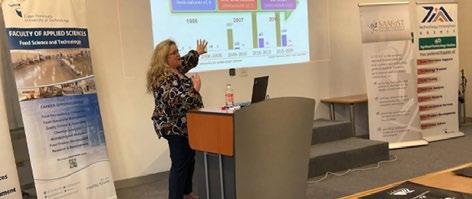
RESEARCH OUTPUT
Prof Jeanine Marnewick, Director: AMHBI
CRYSTAL ENGINEERING UNIT
(Faculty of Applied Sciences)
PROF AYESHA JACOBS jacobsa@cput.ac.za
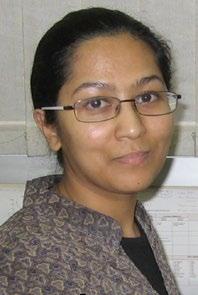
The Crystal Engineering Unit is a research group focused on the field of crystal engineering, which involves the design and synthesis of molecular solids with specific properties. The unit’s work contributes to advancing understanding in materials science and chemistry, aiming to develop new materials with tailored properties for various applications.
Researchers in the group have contributed their skills in various areas. Prof Nikoletta Báthori, a member of the Molecular and Materials Structure working group of the Hungarian Academy of Sciences, is the Vice President of the South African Chemical Institute (SACI) for 2023 to 2025. Prof Ayesha Jacobs serves on the faculty HDC and coordinates the Chemistry department’s postgraduate students. Prof Merrill Wicht, the HoD of Chemistry, has concentrated her time on the department’s duties.
Prof Jacobs’ current research projects involve studying the solid forms of bioactive compounds with various coformers
with applications in improving the physicochemical properties of target compounds such as vanillic acid. Vanillic acid is a flavouring agent and has antioxidant properties. Master’s student Ms Celestine Nyingika Tshahwa is studying selected multicomponent crystals of vanillic acid and has submitted her thesis for examination. Prof Jacobs also supervised two work-integrated learning (WIL) students Ms Sanelisiwe Mkhize and Mr Nkateko Mabunda. Prof Jacobs and a previous MTech student published the crystal structure of a solvate of the flavonoid chrysin in Zeitschrift für Kristallographie – New Crystal Structures.
Prof Báthori was invited to attend the American Chemical Society on Campus Research Summit at SU in September 2024 as the Vice-President of SACI. Prof Báthori gave an oral presentation on solid state crystalline structures of baclofen at the Inorg-Carman Conference in the Drakensberg in June. Prof Báthori visited Debrecen University in Hungary in November to conduct collaborative work with Prof Attila Benyei on solid state structures of pharmaceuticals.
RESEARCH UNIT
FUNCTIONAL FOODS RESEARCH UNIT (FFRU)
(Faculty of Applied Sciences)
PROF MARETHA OPPERMAN
oppermanm@cput.ac.za

Established in 2009, the Functional Foods Research Unit (FFRU) forms part of the Department of Biotechnology and Consumer Science within CPUT’s Faculty of Applied Sciences. The unit is dedicated to advancing the development of innovative functional food products and premixes aimed at promoting health and preventing disease in South Africa.
The FFRU focuses on translating research findings on essential fatty acids and micronutrients into food-based interventions that address nutritional deficiencies and support public health. Its strategic objectives include scientific innovation in food formulation, fostering community well-being, and strengthening local food systems.
Research activities within the unit span both postgraduate and contract-based research, offering valuable opportunities for student training while also contributing to national and regional nutrition priorities. The unit’s work aligns with global trends in functional foods and supports SDGs related to health, nutrition, and food security.
In addition to its research outputs, the FFRU contributes to the functional food industry through partnerships and knowledge transfer, ensuring that findings are not only academically robust but also practically applicable in real-world food systems.
BIORESOURCE ENGINEERING RESEARCH GROUP (BIOERG)
(Faculty of Applied Sciences and Faculty of Engineering & the Built Environment)

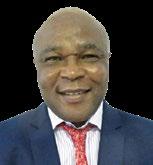
DR DEBBIE DE JAGER
Co-principal Investigator, Engineering & the Built Environment dejagerd@cput.ac.za
Responsible for (sub-units): Agrifood/Agrowaste
Wastewater/Water Engineering – Poultry slaughterhouse and dairy wastewater
PROF VINCENT OKUDOH
Co-principal Investigator, Applied Sciences okudohv@cput.ac.za
Responsible for (sub-units): Waste2Energy Biofuels
Materials Sciences
Environmental Biotechnology
Introduction
The Bioresource Engineering Research Group (BioERG) was conceptualised and established under the leadership of Prof Seteno Ntwampe together with two coprincipal investigators, Dr Moses Basitere and Prof Vincent Okudoh. The resignation of Prof Ntwampe in December 2019 led to the appointment of Dr Basitere as coprincipal investigator responsible for Water & Wastewater Treatment and Agricultural Waste Recovery research; and Prof Okudoh as the co-principal investigator responsible for the Waste-to-Energy research.
Vision and mission
BioERG has continued to operate according to the same vision and mission. The Vision is to be a research centre of excellence committed to technological innovation through bioresource engineering for economic and environmental well-being in Africa. The Mission is to commit to the advancement of applied natural resources knowledge through excellent teaching, learning and research. This can only be attained through the dedication of all stakeholders who support the initiatives of the research group.
RESEARCH GROUP
RESEARCH GROUP
NATURAL PRODUCTS CHEMISTRY RESEARCH GROUP
(Faculty of Applied Sciences)
PROF AHMED MOHAMMED
mohammedam@cput.ac.za

The Natural Products Chemistry Research Group is dedicated to exploring the rich biodiversity of Cape flora in the search for novel bioactive compounds that may serve as scaffolds for the development of safe, effective, and innovative drugs.
The group specialises in traditional natural product chemistry, focusing on the isolation and characterisation of compounds with a range of biological activities, including neuroprotective, anticancer, and dermatological effects. In addition, the team investigates the green synthesis of metal nanoparticles using pure natural products, which act as both reducing and stabilising agents. These capping agents influence the nanoparticles’ bioactivity and distribution within biological systems. A key research direction includes the development of novel conjugates for biomedical applications, particularly in cancer diagnostics and therapy.
During 2024, the group published 15 articles in the fields of natural product-based drug discovery and green nanotechnology.
Two students successfully completed their studies: Dr Ali Eltahir (PhD) and Ms Naledi Seatle (MSc).
The group also hosted visiting researchers from the French National Research Institute for Agriculture, Food and Environment (Institut National de Recherche pour l’Agriculture, l’Alimentation et l’Environnement) and the University of Namibia, and welcomed students from the University of Namibia and Ekiti State University in Nigeria, who conducted laboratory experiments as part of their academic research.
RESEARCH GROUP
PHYTOTHERAPY RESEARCH GROUP
(Faculty of Health & Wellness Sciences)
DR SAMANTHA MEYER
meyers@cput.ac.za
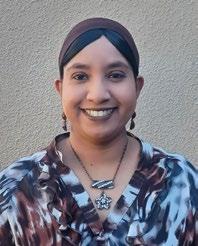
The aim of this research group is to investigate the potential antimicrobial and wound-healing properties of indigenous South African plant extracts and biogenic metal nanoparticles produced from these plant extracts.
The principal investigator for this group is Dr Samantha Meyer, a senior lecturer in CPUT’s Department of Biomedical Sciences. Her collaborators include Prof Mervin Meyer (UWC), Prof Abram Madiehe (UWC), Prof Martin Onani (UWC), Dr Lulama Mciteka (UWC), Dr Nicole Sibuyi (Mintek) and Dr Adewale Fadaka (CCHMC, USA).
Highlights for 2024
• Dr Meyer was awarded a prestigious C2 rating from the NRF. This rating acknowledges Dr Meyer as being an established researcher with a sustained record of productivity. The NRF rating system is a benchmarking system whereby individuals who exemplify the highest standards of research, are identified by an extensive network of South African and international peer reviewers. Ratings are based on the quality and impact of recent research outputs (over an eight-year period).
• PhD student Ms Tswellang Mgijima won the best oral presentation prize at the XXIX International Conference on
Coordination and Bioinorganic Chemistry in Smolenice, Slovakia in June.
• Postdoctoral fellow Dr Caroline Tyavambiza presented some of the group’s research findings at the International Nanobiomed Conference in Barcelona in November.
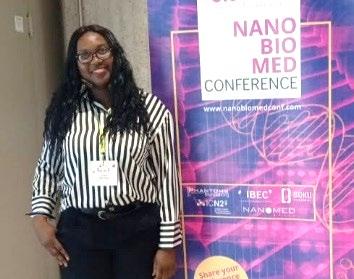
Dr Caroline Tyavambiza at the conference in Barcelona
CPUT opens doors for SMMEs
In April, ATS hosted a Small, Medium and Micro Enterprises (SMMEs) Symposium. The event, hosted on the Bellville Campus, created a platform for emerging entrepreneurs to share experiences on accessing retail markets. The symposium, themed ‘How do you get your products to the retail shelves?’, was attended by representatives from corporate, government, and small business sectors, including Standard Bank, the Small Enterprise Development Agency (SEDA), the TIA, the Western Cape Provincial Department of Agriculture, and the Department of Economic Development and Tourism.
Entrepreneurs including Spicy Bulldog and Ubuntu Extra Virgin Olive Oil shared their journeys of getting products into Spar and Woolworths stores respectively. ATS Manager Mr Ndumiso Mshicileli welcomed guests and said, “The end goal is to create a networking platform and provide knowledge on funding, technology transfer, and support services.”
The presentations highlighted opportunities for collaboration and how entrepreneurs can access ATS services. Mr Mshicileli praised the interaction between audience and speakers as inspiring and informative. He added that ATS intends to develop projects with attendees to create innovative products for retail shelves, showcasing the station’s technology, equipment, and contributions to the Western Cape economy.
Delegates praised CPUT for the opportunity. Mr Siphiwo Mbande, Enterprise Direct Manager at Standard Bank, said the event enabled discussions with entrepreneurs while positioning the bank’s services. Ubuntu EVOO founder Mr Loyiso Manga highlighted the organisation and networking opportunities, noting that virtual connectivity could be strengthened. Delegate Ms Moerida Morat added, “CPUT opened doors that were previously closed. This is really big for me.”
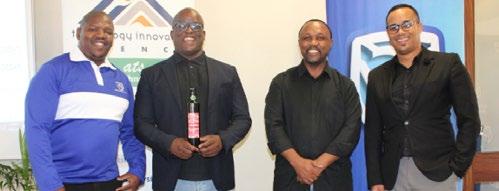
Postgraduate students
• Five MSc and two PhD students were registered with Dr Meyer as main supervisor.
• Ms Yandiswa Mabhude graduated with her MSc in Nanosciences degree from UWC.
DHET-accredited journal articles
• ‘Wound healing effects of biogenic gold nanoparticles synthesised using red wine extracts,’ in Artificial Cells, Nanomedicine and Biotechnology
• ‘Phytonanotherapy for the treatment of metabolic dysfunctionassociated steatotic liver disease’ in the International Journal of Molecular Sciences
Keynote conference presentation
• A keynote address titled ‘Biological activities of plant derived silver and gold nanoparticles’ was presented at the 9th International Conference on Nanoscience and Nanotechnology in Africa, at Sun City, NW during October.
Other research activities
• Dr Meyer served as external examiner for postgraduate theses from UKZN and DUT.
• She also conducted peer-reviews of publications for the following journals: Journal of Medical Laboratory Science & Technology of South Africa, International Journal of Nanomedicine, Current Research in Microbial Sciences, and the Journal of Herbal Medicine.
• Dr Meyer held the following research-related positions at CPUT: (i) Departmental Research and Postgraduate Coordinator; (ii) member of HWS’s faculty HDC and (iii) Deputy Chairperson of HWS’s REC.
Small, Medium and Micro Enterprises (SMMEs) Symposium
TECHNOLOGY STATION
AGRIFOOD TECHNOLOGY STATION
(Faculty of Applied Sciences)
MR NDUMISO MSHICILELI mshicilelin@cput.ac.za
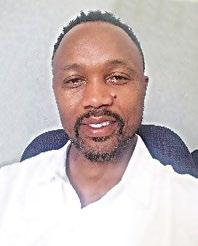
The Agrifood Technology Station (ATS) is a platform that provides a range of interdisciplinary technological services to the agrifood sector, focusing on existing smaller and medium enterprises, with a view to improving competitiveness and innovation as well as research and development capacity in a sustainable manner.
Funded by the Technology Innovation Agency (TIA), an initiative of the Department of Science & Innovation (DSI), ATS offers a wide range of services that can assist food and related companies in developing, enhancing and maintaining safe, efficient and cost-effective food production and processing.
Strategically situated at the Department of Food Science & Technology (DFST) on the Bellville Campus, ATS offers its clients access to the pilot plant, analytical and research laboratories, processing areas, and general and cold stores. It also houses a state-of-the-art chocolate factory, recently outfitted with advanced equipment designed to support modern confectionery production and training.
This technology station is a source of support for postgraduate research within the higher education fraternity. ATS also extends its reach to communities by providing
various tailor-made training workshops on value addition and food safety.
HIGHLIGHTS FOR
2024
Partnership with Western Cape Department of Agriculture
ATS and the Western Cape Department of Agriculture (WCDoA) began drafting an MoU following ongoing engagement and the sharing of SME-related information.
Partnership with SA Harvest
In collaboration with DFST, ATS began discussions with SA Harvest around the establishment of a Food Waste Beneficiation project, planned for implementation in 2025.
Exhibitions and conferences
ATS hosted a Symposium for SMMEs in April, providing a platform for networking and knowledge exchange. The event aimed to equip SMMEs and entrepreneurs with greater understanding of key components within the food industry value chain, including access to funding. The proceedings
were covered by CPUT Media and Events https:// www.cput.ac.za/newsroom/news/article/4950/cputopens-doors-for-smmes
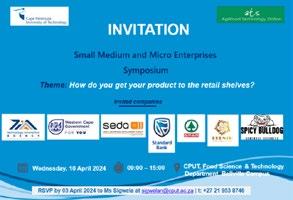
ATS exhibited at the VC’s Businesses and Industry Engagement and Institutional Advisory Forum Launch in June.
ATS was invited to attend and exhibit at the EnergyWaterFoodClimate Summit in July, hosted by Mangosuthu University of Technology in Durban. The manager of ATS also participated in a parallel session themed ‘Science Enterprise’.
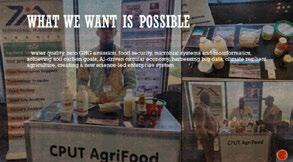
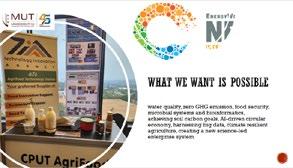
Ms Bongisiwe Zozo (PhD Chemistry candidate) attended the 5th Insects to Feed the World Conference (IFW24) in Singapore in June, and gave an oral presentation titled: ‘Structural properties of black soldier fly larvae protein concentrates extracted via salting-in and salting-out coupled with ultrafiltration’.
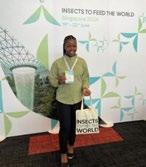
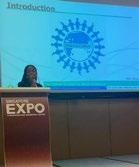
Ms Bongisiwe Zozo presenting at IFW24
CPUT’s Faculty of Applied Sciences hosted the U6+ Conference in September. Ms Bongisiwe Zozo and the ATS manager were among the delegates who attended. Ms Zozo presented a poster titled
‘Structural properties of black soldier fly larvae protein concentrates’.
Two ATS staff members were invited to attend an Indigenous Food Innovation Colloquium themed ‘Nourishing Futures’, hosted by the Consumer Science Department at the University of Zululand in August.
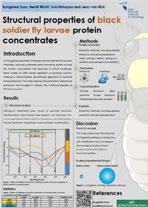
Notable highlights from 2024 projects
Equipment funding and procurement
Delivery and installation of the chocolate packaging equipment was completed in May. In October, the vertical and horizontal form-fill-seal machines were fully commissioned, enabling the Western Cape-based SME Cocoa Emporium to package its products using this technology.
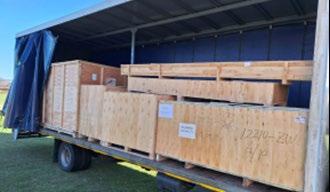
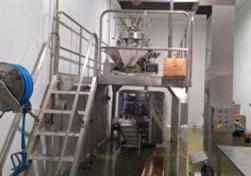

spray dryer
A pilot-scale spray dryer was delivered and commissioned in October. This was made possible through equipment funding of approximately R3 million received from DSTI, used to replace outdated equipment and invest in new resources.
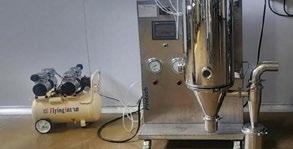
Research projects: Product and process development
Success Foods, a KwaZulu-Natal-based SME, received support to enhance its process development and produce various butternut-based products. These were showcased on 23 October
2024 during the Conference on Climate Adaptation for South African Industries, held at the Eskom Academy of Learning.

One of the butternut-based products
T and N Group, an SME based in the Eastern Cape, was assisted by ATS with the development of three sugar-free tomato jam prototypes, including testing and shelf-life analysis.

Training workshops
Isibane Development Management Consultancy Food Safety Training
ATS partnered with Isibane Consultancy to deliver a food safety knowledge-sharing session for urban farmers in October. The initiative was supported by the City of Cape Town’s Corporate Services Directorate.
The Children’s Christmas Pudding Project
ATS and DFST once again hosted the Children’s Christmas Pudding Project in collaboration with Vera School for Autistic Learners, which produces a steamed fruit cake. This annual project supports the school’s fundraising efforts. A total of 2,000 puddings were produced and sold at over R100 each.


Steam Jet Cooker technology training
A successful training session on Steam Jet Cooker technology was hosted by ATS and DFST in collaboration with Courlander Agency and DC Norris in July. Delivered by Mr Stuart Rigby, a worldrenowned process engineer from DC Norris, the session was attended by senior students, interns, and staff.
Postgraduate projects
ATS continued to support postgraduate projects through technology training, demonstrations, and access to instrumentation across relevant CPUT departments.
Chocolate packaging equipment and Cocoa Emporium chocolate product
Pilot-scale
A pilot-scale spray dryer at the DFST Pilot Plant
Freshly harvested tomatoes used in the production of the tomato jams
FOCUS AREA 2 S pace Science, Engineering & Technology
Introduction by Prof Innocent Ewean Davidson
davidsoni@cput.ac.za
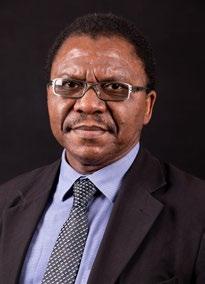
South Africa’s growing reliance on spacebased applications for managing natural resources, environmental monitoring, and national security continues to drive investment in space science, engineering and technology. These priorities are reinforced in the Decadal Plan for Science, Technology and Innovation (2021–2031), which identifies space science and Earth observation as key enablers of sustainable development and innovation.
The establishment of the South African National Space Agency (SANSA) in 2010 marked a strategic shift towards a coordinated and formalised approach to space research and technology development. Within this evolving national framework, Research Focus Area 2: Space Science, Engineering and Technology serves as a platform to expand and integrate multidisciplinary research efforts, ensuring that the benefits of space-based services translate into real-world impact. The focus area is directly aligned with the National Development Plan (NDP) and other national imperatives guiding South Africa’s innovation agenda.
Africa Space Innovation Centre (ASIC), French–South African Institute of Technology (F’SATI)
F’SATI was established at CPUT in 2008 as a multi-institutional postgraduate research and development programme, with partner institutions in South Africa (TUT) and in France (École Supérieure d’Ingénieurs en Électrotechnique et Électronique, ESIEE, and Université Paris-Est Créteil, UPEC). It enjoys the support of both the South African and French governments. The CPUT node of F’SATI launched a flagship postgraduate programme in satellite systems engineering, through which South Africa’s first nanosatellite, TshepisoSAT, was developed by students and staff in collaboration with international counterparts. The satellite was launched into space on 21 November 2013.
The Africa Space Innovation Centre (ASIC) was formally established in 2013 as a research and innovation entity within CPUT, approved by MANCOM (CPUT Management Committee). Its mission is to create innovative space-based solutions to societal needs in support of Africa’s sustainable socio-economic development. This provides a strong foundation for the commercialisation of intellectual capital developed within F’SATI and ASIC and promotes the growth of a hi-tech manufacturing industry in South Africa. ASIC’s dynamic team specialises in nanosatellite communications solutions and, through strategic industry partnerships, supplies advanced communications technologies to the international nanosatellite sector. Its space missions have been funded by the South African government through various agencies.
At CPUT, ASIC focuses primarily on the design, development and deployment of nanosatellites for low Earth orbit (LEO), with particular application to marine domain awareness. It will continue to build and launch nanosatellites in a sustainable manner, while also pursuing innovative projects and adapting to a rapidly evolving global context. F’SATI, meanwhile, continues to offer the master’s degree in Satellite Systems and Applications, supporting the needs of the growing space industry in South Africa, across southern Africa, the wider continent and internationally.
At the July 2023 F’SATI board meeting in Paris, CPUT VC, Prof Chris Nhlapo, announced a strategic decision to broaden the scope of ASIC and F’SATI beyond satellite systems and applications to ensure long-term sustainability. The aim is to position both entities to address practical challenges in South Africa and France (Europe), by delivering solutions through transdisciplinary research and space-based services with wide societal impact.
To this end, ASIC and F’SATI at CPUT have identified emerging real-world challenges and adopted a transdisciplinary research approach by establishing new research project groups, namely:
• Satellite Systems and Applications Research
• Ocean Plastics and Composite Materials Research (Sustainable Oceans)
• Smart Integrated African Super-Grid (Smart Solar Power Systems)
• New Transdisciplinary Research (Aviation, Transportation Systems, Sports Science, Aerospace)
These projects intersect with other groups at CPUT, such as Sustainable Oceans, Smart Grids and the Energy Institute, as well as with national collaborators like TUT and international partners including UPEC and Université Gustave Eiffel in France. For example, the Ocean Plastics & Composites Project is a transdisciplinary initiative involving multiple institutions and academic fields. With marine ecosystems increasingly threatened by plastic pollution worldwide, the need for effective detection and monitoring technologies is urgent. Advances in remote sensing (RS) – including optical imaging, thermal infrared (TIR) sensing, hyperspectral imaging (HSI), multispectral imaging (MSI) and synthetic aperture radar (SAR) – now enable the identification and classification of ocean plastic litter. This project begins with the detection of sea-surface plastic waste using satellite imagery (or data captured by UAVs or low-flying aircraft), combined with artificial intelligence (machine learning) tools for identification, tracking and segmentation. A second dimension of the project, with potential for intellectual property generation, focuses on repurposing this plastic waste to create composites for environmentally friendly wind turbines and industrial components.
ASIC and F’SATI are therefore both a research entity and a flagship training programme of CPUT. They provide transdisciplinary postgraduate education while engaging in applied scientific research and technology development in collaboration with international partners. Their work supports South
Africa’s National Development Plan (NDP) and the United Nations’ Sustainable Development Goals (SDGs), contributing to national development and improving quality of life both locally and internationally.
ASIC plays a central role in building South Africa’s intellectual capital by focusing on the patenting of technological outputs with industrial potential. This includes strengthening South Africa’s intellectual property (IP) output nationally and internationally through the strategic filing of patents in relevant jurisdictions. Increasingly, innovation in the software domain is becoming critical to space engineering. Open satellite ground station networks are creating new models of access to in-orbit satellite data for Earth observation and communications. Although challenges remain with software-related patenting in South Africa, ASIC continues to pursue innovation in this field to expand and strengthen its IP portfolio.
The overarching purpose of ASIC is to develop South African engineering and scientific expertise through original and applied research, in close collaboration with F’SATI and international partners. Its transdisciplinary character is evident in current and future projects, including industry- and communitybased development initiatives. The entity is committed to interdisciplinary approaches for solving real-world engineering challenges. Its strategic intent is to make a significant contribution to CPUT’s research productivity, human capital development, resource generation and internationalisation.
ASIC–F’SATI’s staff complement has grown significantly since the initial five members.The current staff and student representatives are:
Academic/Research Staff Designation
Prof Inno Davidson CPUT F’SATI Node Director
Prof Vipin Balyan Academic Coordinator, F’SATI MEng Programme
Dr Ayodele Periola Senior lecturer, Deputy Academic Coordinator
Dr Ayokunle Ayeleso Lecturer
Dr Janvier Kamanzi Lecturer
Dr Gunjan Gupta Senior lecturer
Dr Nganyang Bayendang Postdoctoral fellow, Smart Grids
Dr Oluwaseyi Babalola Lecturer, Project leader, Ocean Plastics & Composites
Prof Graeme Oliver Professor
Dr Kessie Govender Researcher, Supervisor
Dr Angus Brandt Lecturer
ASIC Staff Designation
Mr Nyameko Royi Chief Engineer, ASIC
Mr Sinamandla Maqina Senior Engineer, ASIC
Ms Lilie Leopold-Kateya AIT Engineer, ASIC
Administrative Staff Designation
Mr Ian van Zyl F’SATI Manager, Operations, Finances and Comms
Mr Ludwe Dulaze F’SATI Research Assistant
Student Representative Designation
Ms Thandiwe Mnisi BEng Tech, Diploma Programmes
Mr Odwa Nxam BEng Tech, Honours Programme
Mr Tamuka Samuriwo Postgraduate Programme, MEng and DEng
Adjunct appointments
Seven adjunct professors and two adjunct scholars distinguished appointments were made in 2024 to support F’SATI at CPUT, adding valuable capacity and expertise.
Adjunct professors
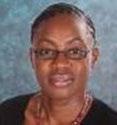
Prof Oladayo Bello holds a BSc Hons in Electronic and Electrical Engineering from Obafemi Awolowo University, and a BSc Hons in Industrial and Systems Engineering from UP. She completed an MSc in Applied and Computational Mathematics at Johns Hopkins University, USA, and an MSc in Electrical Engineering at UCT. She completed her PhD coursework with a first-class distinction and earned a PhD in Electrical Engineering from UCT. Prof Bello is currently a Professor of Electronic Communications at New Mexico State University, USA. Her areas of expertise include cryptography/ cryptology, network security, traffic engineering in wireless networks, resource allocation and optimisation in wireless networks, multi-hop wireless networks, the Internet of Things, device-to-device communication, queuing theory and scheduling, and wireless communication networks. Her work also spans queueing and scheduling in network routers and advanced resource optimisation techniques. In addition to her research contributions, she teaches a wide range of courses, including Probability Theory, Operations Research, Stochastic Models, Queuing Theory, Theory of Statistics, Linear and Non-linear Optimisation Techniques, Stochastic Differential Equations, Non-linear Differential Equations, Real Analysis, and Mathematics of Finance. Prof Bello’s skills and expertise are a valuable asset to the Satellite Systems and Applications Research Group. She actively supports F’SATI through postgraduate co-supervision, mentoring of postgraduate students and academic staff, and the copresentation of specialist courses in her areas of expertise.

Dr Nexhat Kapidani is a Senior Professional Maritime Engineer with extensive experience in both industry and academia. He holds a PhD from the Maritime Faculty in Kotor for his thesis titled ‘Cost-benefit analysis and implementation model of the National Maritime Single Window in small coastal states’. He also holds a DEng from DUT, Faculty of Engineering & the Built Environment, for his thesis ‘Intelligent use of maritime info-communication systems in developing environments’. Dr Kapidani is the Deputy Director of the Administration for Maritime Safety and Port Management (AMSPM) of Montenegro. His interests align closely with F’SATI’s Maritime Domain Awareness applications. His appointment as an adjunct professor (without remuneration) at CPUT is intended to foster collaboration with our researchers and staff in maritime sector projects, co-supervise postgraduate student research, and strengthen links with the European maritime industry. He will also deliver online seminars to share insights and trends from Europe, support researchers, and publish in affiliation with CPUT. His specialised expertise directly benefits our Ocean Plastics Research Group, and he actively supports research and postgraduate supervision within F’SATI.

Prof Andronikos Paliathanasis holds a BSc in Physics (2008), an MSc in Physics (2010), and a PhD in Physics (2015), all from the University of Athens, Greece, specialising in Astronomy, Astrophysics, and Mechanics.
A mathematician and physicist with expertise in space physics and astronomy, he
is an NRF B2-rated researcher, awarded in 2023. Prof Paliathanasis has authored 255 refereed journal articles. He supports F’SATI through postgraduate cosupervision, research mentorship, co-presentation of specialist courses in space science and engineering, and the development of short courses to complement F’SATI’s current offerings. His areas of specialisation include gravitational physics, general relativity, cosmology, dark energy, modified theories of gravity, integrable cosmological models, quantum cosmology, spacetime symmetries, Newtonian physics, and classical mechanics. Prof Paliathanasis’s skills and expertise are a direct asset to our work in space science.

Prof Joseph Ojo is the TVA Chair Professor of Electrical and Computer Engineering at Tennessee Technological University, USA and a C2-rated researcher with the NRF. He is a fellow of both the Institute of Electrical and Electronics Engineers (IEEE, USA) and the Institution of Electrical Engineers (IEE, UK). He currently serves as Deputy Editor-in-Chief of the IEEE Journal of Emerging and Selected Topics in Power Electronics and has held editorial roles for several IEEE journals, including IEEE Transactions on Power Electronics and IEEE Transactions on Industry Applications. Prof Ojo has published over 300 peer-reviewed papers, including more than 70 in IEEE Transactions. As an adjunct professor at CPUT, he contributes to the mentorship of researchers and staff, research grant development, and postgraduate student supervision within the F’SATI Smart Integrated African Super-Grid Research Project. He is available to lecture advanced graduate courses in areas such as Non-linear Automatic
Control, Non-linear Dynamics, Bifurcations of Electric Power Systems, Electromechanical Devices, Power Electronics, Advanced Electric Machinery, and Distributed Energy Systems. Prof Ojo also shares current research and trends from North America with CPUT researchers. A pioneer in matrix converters and multi-port electrical machines, his expertise directly supports the Smart Super-Grid and Space Power Systems research area.

Prof Pierre Cilliers holds a PhD in Electronic Engineering from Ohio State University, USA. He is currently a researcher at SANSA in Hermanus and is a retired Professor of Electronic Engineering. A specialist in space weather, Prof Cilliers supports CPUT’s Joint Master’s Degree Programme in Satellite Systems and Applications (with UPEC), specifically teaching the module Space Weather Impacts on Satellite Systems within the course Engineering for the Space Environment. He also supervises MEng student projects and mentors Engineers-in-Training registered with ECSA. His expertise is integral to the Satellite Systems and Applications group.

Dr Minesh Poudel holds a doctorate in Aircraft Emergency and Evacuation from the University of Toulouse-Mirail (2008) and completed a postdoctoral programme in Aeronautical Distress and Safety Systems at ENAC, Toulouse (2018). With over 18 years of experience in the French aviation industry, he is a Senior Project Manager. His role as an adjunct professor at CPUT
Space Engineering programme enhancement
Dr Tasmeera Singh, Manager: International Relations at the Directorate: SIP, expressed her delight at the success of a September visit by Tokyo Metropolitan University (TMU) and the promising prospects this holds for CPUT’s Space Engineering programme. The purpose of the visit was to explore collaboration in shared areas of interest, particularly in space engineering. Dr Singh described the meeting as “extremely productive, with tangible outcomes for the FEBE and the Space Engineering programme”.
CPUT welcomed the TMU delegation comprising:
• Prof Dr Masayoshi Noguchi, Vice President for International Affairs/Executive Director, International Centre
• Mr Hidetaka Masuda, Director, International Affairs Office
• Ms Satomi Suzuki, International Partnerships Coordinator
Representing CPUT were:
• Prof Suresh Ramsuroop, Dean: FEBE
• Prof Veruscha Fester, Assistant Dean: RTIP, FEBE
• Dr Oluwaseyi Babalola, F’SATI/ASIC
• Mr Nyameko Roy, Acting Director: ASIC
• Dr Marco Adonis, HoD: DEECE
During the session, Dr Singh provided an overview of CPUT, Prof Fester outlined the FEBE’s scope and activities, and Mr Roy highlighted the achievements of the French-South African Institute of Technology/Africa Space Innovation Centre. The visit concluded with plans for two follow-up meetings and a future visit by a F’SATI delegation to TMU.

focuses on developing and delivering short courses in aviation – including airworthiness, aviation safety, certification, and engineering teamwork – targeting stakeholders such as Air Traffic and Navigation Services and other South African aviation organisations. He also co-supervises doctoral students in aviation, in collaboration with CPUT’s Faculty of Business Management Sciences and F’SATI. His expertise supports the Transportation Systems Research area.

Prof Hammed Adeniyi Lawal is a fellow of the Royal Astronomical Society, UK. He holds a BSc Hons in Physics from Ogun State University (2001); an Advanced Diploma in Computer Science from Lagos City Computer College; an MSc in Physics from Olabisi Onabanjo University (2005); and a PhD in Physics (Space and Solar–Terrestrial Physics) from the University of Leicester, UK (2017). He continued postdoctoral research as a Doctoral Extension Associate at Leicester from 2017 to 2018. Prof Lawal has received extensive training through NASA’s Applied Remote Sensing Training Programme and is a participant in the Erasmus FAST4FUTURE Programme. He is currently Professor of Space Physics and Solar–Terrestrial Physics at the Air Force Institute of Technology, Nigerian Air Force Base, Kaduna. His role at CPUT includes contributing to the Joint Master’s Programme in Satellite Systems and Applications, specifically teaching in the Engineering for the Space Environment course. He also contributes to the Ocean Plastics Research Project, co-supervises postgraduate students, and supports international collaboration and partnership development.
Exploring collaboration in shared areas of interest
Adjunct scholars

Dr Elutunji Buraimoh is a researcher specialising in the development of communication latency prediction and compensation techniques in real-time power system cosimulation – the simulation of a complex system by multiple real-time digital simulators located in geographically distributed laboratories, integrated virtually via high-speed networks. He completed his doctoral research as a Doctor of Engineering (DEng) at the Smart Grid Laboratory at DUT, and with the DEEPER Research Group at the University of Valladolid in Spain. His research focused on novel strategies to ensure inverter-based renewable energy sources are grid-code compliant, intelligent, and gridinteractive. Dr Buraimoh has been recognised with numerous awards, including the DUT DEng Scholarship Award (Energy Research Focus Area, 2018 to 2020), the Best Paper Award (third place) at the Clemson University Power Systems Conference (2020), and an EU Erasmus+ KA107 Scholarship for international exchange at the University of Valladolid. He also received a citation at the 2020 DUT Research and Innovation Awards. He holds a BTech Hons in Electronic and Electrical Engineering from Ladoke Akintola University of Technology in Nigeria, and an MSc in Electronic and Electrical Engineering from Obafemi Awolowo University in Nigeria. His professional contributions include serving as Guest Editor for Energies (Special Issue on Modern Electric Power Delivery Systems) and as Editor and Publications Chair for the 30th South African Universities Power Engineering Conference (SAUPEC). His expertise directly supports F’SATI’s
Smart Super-Grid and Space Power Systems research.

Dr Oluleke Babayomi is a senior member of the IEEE. He received his BSc Hons (2006) and MSc (2016) degrees in Electrical and Electronics Engineering from the University of Lagos in Nigeria. He completed his PhD in Electrical Engineering at Shandong University in China (2023). During 2018 and 2019, he served as Principal Engineer and Software Development Team Lead at the Centre for Space Transport and Propulsion, National Space Research and Development Agency in Abuja, Nigeria. His current research interests include modelpredictive control, power electronics, microgrids, and sustainable energy transition. Dr Babayomi is Chair of the IEEE Smart Village Marketing Committee, part of IEEE’s flagship humanitarian programme that funds local entrepreneurs to implement productive uses of renewable energy and technology in underserved communities globally. With over 15 years’ experience at the intersection of power electronics, control systems, renewable energy (including solar PV, wind and energy storage), electrical drives, sustainable mobility, and energy transition policy, Dr Babayomi has made significant contributions to the field. He is currently a postdoctoral research fellow at the Cho Chun Shik Graduate School of Mobility, Korea Advanced Institute of Science and Technology (KAIST) in South Korea. He has filed ten patent applications, with seven already granted, and published over 40 peer-reviewed technical papers. The recipient of several international awards for both innovation and excellence, Dr Babayomi contributes directly to F’SATI’s Smart Integrated African Super-
Grid Research Project, supporting postgraduate supervision, academic research, and co-presentation of specialist courses.

Dr Emmanuel Mukubwa is an experienced academic and engineer specialising in telecommunications, computer systems, controls, and electronics. He has strong analytical and hands-on technical skills, particularly in troubleshooting complex electrical and mechanical systems across telecommunications, automation, and industrial equipment. He holds a DEng in Electronic Engineering from DUT, where he also served as a postdoctoral fellow in the DUT Space Science Programme. Dr Mukubwa obtained a Joint Master’s Degree in Telecommunications from TUT and the École Supérieure d’Ingénieurs en Électrotechnique et Électronique (ESIEE), and an MSc in Electronic Engineering from ESIEE. He teaches a wide range of subjects, including Electronic Communication, Digital Signal Processing, Electromagnetic Waves, Microwave Devices and Systems, Mobile and Wireless Communication, RF Circuit Design, Satellite Communication, Data Analytics, Computer Networks, and Network Systems. Dr Mukubwa’s broad expertise and industry-aligned experience make a valuable contribution to F’SATI’s Satellite Systems and Applications Research, where he supports CPUT through postgraduate co-supervision, collaborative research, specialist course development, and scholarly publication under CPUT affiliation.
New collaboration with TUMSAT and TMU in Japan
Prof Inno Davidson visited the Tokyo University of Marine Science and Technology (TUMSAT) and Tokyo Metropolitan University (TMU) from 17 to 20 September 2024. The purpose of the visit was to establish a new research collaboration in Ocean Plastics Research, supporting F’SATI’s Ocean Plastics and Composites Materials Research initiative, and to explore opportunities for student exchange between CPUT and the Japanese institutions.
During the visit, the following key developments were achieved:
• CPUT F’SATI partnered with TUMSAT (led by Prof Emeritus Mitsuri Izumi) to apply for Japanese MEXT funding, which will provide South African citizens (staff or students from previously disadvantaged backgrounds) with the opportunity to undertake doctoral-level training through a fully funded threeyear Japanese Government Scholarship
• Formal collaboration between TUMSAT and CPUT will follow, but research cooperation has already begun, with significant volumes of technical resources and data shared with CPUT
• TMU expressed interest in partnering with F’SATI and ASIC to provide opportunities for intern training
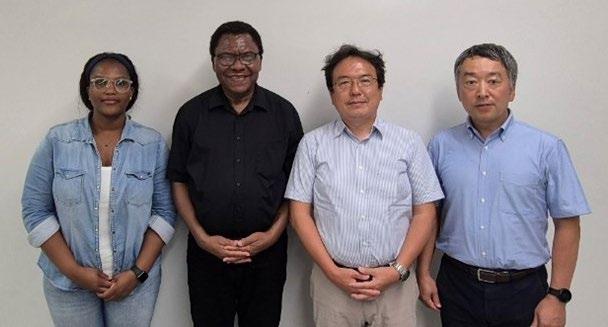
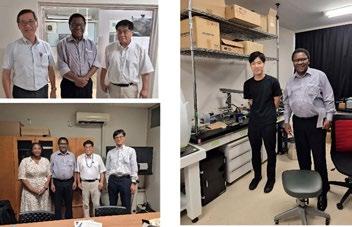
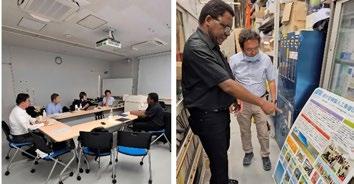
Prof Davidson with Prof Emeritus Mitsuri Izumi, Prof Emeritus Tadashi Tokai, Prof Hisayuki Arakawa (Ocean Plastics), Dr Sindisiwe Malanda (South African beneficiary of MEXT funding), and a postgrad student in a laboratory at TUMSAT
Dr Sindisiwe Malanda (TUMSAT), Prof Inno Davidson, Prof Hironori Sahara (Department of Aeronautics and Astronautics, Graduate School of Systems Design, TMU), Mr Hidetaka Masuda (Manager: International Affairs Office, TMU)
Prof Hironori Sahara (Department of Aeronautics and Astronautics), Mr Hidetaka Masuda (Manager: International Affairs Office, TMU) Ms Satomi Suzuki (International Partnerships Coordinator: International Affairs Office), Mr Masamichi Furuya (International Partnerships Coordinator: International Affairs Office, TMU)
RESEARCH INSTITUTE
FRENCH–SOUTH AFRICAN INSTITUTE OF TECHNOLOGY (F’SATI)
(Faculty of Engineering & the Built Environment)
PROF INNOCENT EWEAN DAVIDSON
davidsoni@cput.ac.za
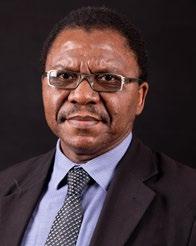
CPUT’s key institutional arrangement supporting growth in Focus Area 2: Space Science, Engineering and Technology are the Africa Space Innovation Centre (ASIC) and the French–South African Institute of Technology (F’SATI).
ASIC–F’SATI at CPUT now hosts four transdisciplinary research projects:
• Satellite Systems and Applications Research
• Ocean Plastics and Composite Materials Research
• Smart Integrated African Super-Grid and Space Power Systems
• Aviation, Transportations Systems, Sports Science, Aerospace [under development]
These research projects interface with other research groups at CPUT (including Smart Grids, Sustainable Oceans, Composites, and the Energy Institute); nationally (F’SATI at TUT), and internationally (Université Paris-Est Créteil (UPEC); Université Gustave Eiffel (UGE); University of Montpellier; ISAE SUPAERO (Institut Supérieur de Mécanique de Paris), France; Tokyo Metropolitan University (TMU); and Tokyo University of Marine Science and Technology (TUMSAT), Japan).
Ocean Plastics and Composite Materials Research
Background
Ocean Plastics & Composites Research Group is a forward-thinking, transdisciplinary initiative hosted within ASIC–F’SATI at CPUT, with collaborators across multiple international institutions and disciplines. This research group is engaged in addressing one of the most pressing environmental challenges of our time: the pervasive pollution of marine ecosystems by plastic litter. Pollution presents an urgent threat to biodiversity, marine health, and the sustainability of oceans, creating a need for sophisticated solutions that combine environmental monitoring with sustainable industrial practices. Recognising the scale and urgency of this issue, the Ocean Plastics and Composites Research Group has adopted an innovative, dual-focused approach to tackle plastic pollution through enhanced detection technologies and the development of sustainable materials.
Aims and objectives
The primary aim of the project is to innovate and integrate advanced technologies to detect, classify, and monitor plastic pollution in marine environments. The group focuses on two core objectives:
i) Enhanced detection, classification, and monitoring of marine plastic pollution
The identification and classification of plastic litter in the ocean require precise, high-resolution detection techniques. The group leverages a suite of remote sensing (RS) technologies, including optical imaging, hyperspectral imaging (HSI), multispectral imaging (MSI), thermal infrared (TIR) sensing and synthetic aperture radar (SAR). The project begins with top surface sea plastic waste detection using advanced data acquisition methods, such as satellite imagery, UAV (unmanned aerial vehicles) data capture, and low-altitude flights. Using AI and machine learning (ML) algorithms, the team can further enhance detection capabilities. Machine learning tools are used to analyse vast quantities of image data, enabling plastic debris identification, segmentation, and tracking. Through automation of the classification of marine plastics, the group not only aims to provide critical data for environmental monitoring but to also create scalable tools for realtime ocean health assessments.
ii) Developing sustainable composite materials from ocean plastics
Beyond detection, classification, and monitoring, this project initiative seeks to transform collected plastic waste into sustainable composite materials with potential applications in environmentally friendly product manufacturing. One of the key research areas involves using these composite materials to fabricate
wind turbine components and other industry products. By converting ocean plastics into valuable resources, the research group is working towards a circular economy model that reduces waste and minimises the reliance on virgin materials in manufacturing.
Significance of research
By integrating RS technologies with AI and promoting sustainable materials, the group contributes to both environmental preservation and sustainable development. The repurposing of ocean plastics into composites addresses both environmental and industrial needs, which opens opportunities for intellectual property development and sustainable economic practices. This approach aligns with the global match towards green technology and sustainable design, and positions ASIC–F’SATI at CPUT as a leader in eco-friendly innovation.
Awards and recognition
Dr Oluwaseyi Paul Babalola, project leader of the Ocean Plastics and Composite Research Group, achieved a significant milestone in 2024 by earning the prestigious NRF Y2-rating. This acknowledges his exceptional contributions to research and his potential to become a leading authority in his field. In recognition of this achievement, Dr Babalola
was honoured at two major award ceremonies. In October, he received the NRF Researcher Award from the Faculty of Engineering & the Built Environment, celebrating his dedication to advancing research excellence within the faculty. Dr Babalola was further recognised at the CPUT Research Excellence Awards Ceremony, held in November. This event, which celebrated outstanding achievements in research across the university, highlighted his contributions to environmental sustainability and innovation through his leadership of the Ocean Plastics and Composite Research Group.
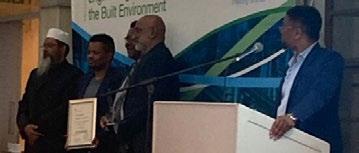
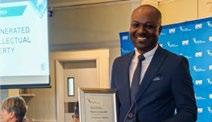
About the project leader

Dr Oluwaseyi P Babalola is a member of the IEEE. He holds a BSc Hons in Mathematics from the University of Ibadan, Nigeria (2009), an MSc Eng in Electrical Engineering from the University of the Witwatersrand (2017), and a PhD in Electronic Engineering from SU (2020). He has also completed professional development courses in telecommunications engineering at WITS (2015), and the CHPC–NITheCS Coding Summer School Certificate (2023).
From 2020 to 2023, Dr Babalola served as a Postdoctoral Research Fellow in the Department of Electrical, Electronic & Computer Engineering at CPUT. He is currently a lecturer and active member of both F’SATI and ASIC. He leads the Ocean Plastics and Composites Project at F’SATI.
His research interests include advanced error-correcting codes, digital signal processing techniques, and artificial intelligence, with applications in visible light communications, wireless communications, storage systems, underwater acoustic communications, and ocean plastics. He has published extensively and serves as a reviewer for several journals and international conferences.
Dr Babalola is an active volunteer and has held leadership roles in various student and community organisations, including Chairperson of the West Africa Student Union (WASU) at WITS (2006), Chairperson of the Deeper Life Campus Fellowship (DLCF) (2018–2019), and General Secretary of the Association of Nigerian Students at SU (ANSSU) (2018). He is the recipient of numerous awards and research grants, including a CPUT Research Award (2023), and is currently rated as an NRF Y2 researcher.
Email: fsati@cput.ac.za Website: https://www.cput.ac.za/research-technology-and-innovation/centres/fsati
Faculty of Engineering & the Built Environment Research Award 2024
Satellite Systems and Applications Research
History
From inception, F’SATI at CPUT has been a multiinstitutional postgraduate research and development programme, with partnering institutions in South Africa, Tshwane University of Technology (TUT), and in France, with a focus on the postgraduate studies in Satellite Systems and Applications. The CPUT node of F’SATI established a flagship postgraduate programme in satellite systems engineering. Through this programme, South Africa’s first nanosatellite, TshepisoSAT, was developed by students and CPUT staff and international counterparts. The satellite was launch into space on 21 November 2013. The Africa Space Innovation Centre (ASIC) was established in 2013 as a formal research and innovation entity within CPUT. The focus of ASIC is the design, development, and deployment of CubeSats for low Earth orbit (LEO), with relevance to marine domain awareness (MDA). The mission of ASIC is to create innovative spacebased solutions to societal needs for the sustainable socio-economic development of Africa.
Background
ASIC at CPUT initiated the development of ZACube-1 to address the need for human capital development identified during the establishment of SANSA. Launched in November 2013, ZACube1’s primary payload supported SANSA’s Hermanus Magnetic Observatory (HMO). In addition, ASIC proposed the development of space-based
technical solutions to augment the South African government’s maritime domain awareness (MDA) programme, particularly as it applies to South Africa’s exclusive economic zone. As a result, ZACube-2 was developed as an inaugural mission to validate key technologies for MDA. Launched in 2018, the nanosatellite served as a precursor to a planned constellation of nanosatellites.
ZACube-2’s primary payload, a software-defined radio (SDR), was used to receive automatic identification system (AIS) messages from LEO. Following the success of this technology demonstrator mission, CPUT embarked on a follow-up mission to deploy a constellation of three satellites. This constellation was launched in January 2022 as the MDASat-1 mission. Several innovations were implemented in the new AIS payload, including over-the-air upgrades, long-range AIS capability, raw data capture, and a more efficient messaging scheme. ASIC remains committed to the sustainable development and launch of nanosatellites.

F’SATI at CPUT, through ASIC, will continue to pursue innovative projects while adapting to the rapidly evolving global context.

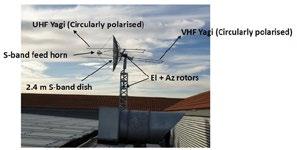
M2MSAT project
Current activities include the design and manufacture of two Machine-to-Machine (M2M) nanosatellites, which represent the next step in Operation Phakisa – a South African government initiative focused on biodiversity and the ocean economy. M2MSat introduces the VHF data exchange system (VDES), operating on the Very High Frequency (VHF) band. VDES represents a significant advancement in
The three satellites of South Africa’s MDASat-1 constellation in a clean room on the Bellville Campus before the launch in January 2022
CPUT’s ground station antenna system
A CAD view of the current M2MSat satellite and the SDR payload under development for the M2MSat mission
maritime communication technology compared to the MDASat AIS system, offering vessels a more efficient and reliable means of data exchange within South Africa’s exclusive economic zone. This system brings a range of key benefits for maritime operations, particularly in terms of communication and monitoring.
After unfortunate delays, the project was revitalised in 2023 with the appointment of a new director for ASIC and F’SATI. The ASIC team is currently conducting thermal cycling of the M2MSat Engineering Qualification Model (EQM) in collaboration with industry partners. The EQM is designed to closely resemble the final flight models (FM) and will be retained post-launch for ongoing hardware testing and fault diagnostics. As a cost-saving measure, the EQM does not include solar panels, and for the attitude determination and control system (ADCS), only the cube computer is installed. Other components of the ADCS stack are represented by dummy masses equivalent to the flight hardware.
The EQM is currently undergoing thermal cycling at CPUT’s facilities, as part of the formal qualification testing process. This ensures that all components can operate reliably under the harsh temperature conditions of space. Once the EQM meets all requirements, a critical design review (CDR) will assess the project’s readiness to proceed to the production and qualification of the flight models. This production phase will involve an independent
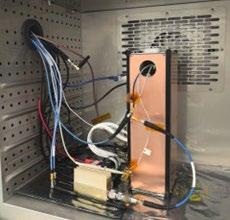
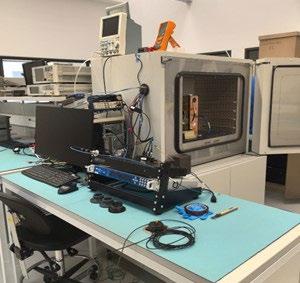
industry partner who will review the design and recommend any necessary corrective actions. Assembly of the flight models will begin following the successful completion of the qualification review (QR). These flight models will replicate the EQM design but include full solar panel integration and a complete ADCS stack. The launch of the flight models is planned for 2025.
Strategic focus
A niche area of strategic focus for ASIC at CPUT is the training of interns, who are now gaining valuable experience in advanced system integration skills relevant to the space sector. With many of the more accessible nanosatellite components and subsystems already developed and commercialised, new intellectual property opportunities are emerging in system integration, particularly for diverse payloads.
A structured training schedule has been planned, with delivery set to begin by the end of the first quarter of 2025, and completion of skills acquisition expected by the end of the second quarter. The university has subscribed to a comprehensive suite of online training resources, which will support this initiative. System integration has been identified as a critical competency in space engineering – one that is key to the continued advancement of nanosatellite innovation.
M2MSat CubeSat EQM in a thermal cycle chamber during qualification at ASIC laboratory

About the chief engineer and project leader

Mr Royi Nyameko received National Diploma (2004), BTech (2009), and MEng (2013) degrees in Electrical and Electronic Engineering from CPUT. He has over 20 years of experience working with radio frequency (RF) and microwave circuits, and for the past decade, has focused on developing communication subsystems for CubeSats, missiles, and UAVs. From 2015 to 2017, he worked with the AVN (African VLBI Network) team at SKA SA, contributing to the conversion of the Ghana Satellite Station into a VLBI observation station and radio astronomy telescope. His responsibilities included the design of the DC power distribution network and associated control and monitoring circuits for the VLBI receiver. He has designed and developed RF front-end subsystems for VHF, UHF, and S-band transceivers, including low-noise amplifiers (LNAs), down-converters, up-converters, and local oscillators.
Since 2017, Mr Nyameko has served as Chief Engineer at CPUT’s African Space Innovation Centre (ASIC), within the Department of Electrical, Electronic & Computer Engineering. He has played a key role in the development, launch, and commissioning of CubeSat missions – including ZaCube-2 (launched in December 2018) and the MDASat-1 constellation (1a, 1b, and 1c), launched in January 2022. He is currently responsible for the concept design, development, and maintenance of CPUT’s ground station, which operates in the UHF/VHF and S-band frequency ranges. His research interests include the hardware implementation of distributed, multifunction RF sensors for nanosatellite applications.
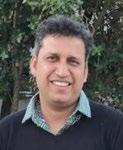
Prof Balyan Vipin is a member of the IEEE. He received his BE Hons in Electronics and Communication Engineering from Dr BR Ambedkar University, Agra, India (2003). He completed an MTech in Electronics and Networking Engineering at La Trobe University, Bundoora, Melbourne (2006). He also earned his PhD in Electronics and Communication Engineering from JUIT, Solan, India (2013). His doctoral thesis was titled ‘Efficient Single Code Assignment in OVSF-Based WCDMA Wireless Networks’.
He is currently an associate professor in the Department of Electrical, Electronic & Computer Engineering at CPUT. He also serves as Programme Coordinator for F’SATI and ASIC. His research interests include CDMA, OFDM, 5G technologies, UAVs, fuel cells, and terrestrial and visible light communication.
Prof Balyan is the recipient of numerous accolades, including:
The Departmental Teaching Excellence Award (2022)
The CPUT University Platinum Award for Research Publications and Bronze Award for Postgraduate Supervision (2021)
The University Bronze Award for Research Publications (2020)
He has also secured research funding of R1.8 million from Hydrogen South Africa, and is the author or co-author of over 100 peer-reviewed journal and conference publications indexed in SCI and Scopus. He is an NRF Y2-rated researcher.
Smart Integrated African Super-Grid Research
Synopsis
It is proposed that highly advanced power system controllers be used to integrate African power grids into a unified super-grid capable of accommodating a high penetration of renewable energy sources – without compromising power quality, active and reactive power flow, or system voltage and stability.
The envisioned super-grid comprises both terrestrial and non-terrestrial (space-based) assets. The terrestrial infrastructure will be built using ultra-high voltage direct current (UHVDC) systems and flexible AC transmission systems (FACTS), combined with dedicated AC and DC interconnectors. These will be supported by intelligent systems applications to form a Smart Integrated African Super-Grid. DC interconnectors will segment the continent’s power systems into five large asynchronous regions. This asynchronous design will prevent AC fault propagation between regions while still enabling power exchange across the grid. It also allows each region to retain regulatory autonomy, simplifying grid code harmonisation across different jurisdictions. The space-based component includes satellites designed to intercept solar radiation and transmit the resulting power signals to stationary, Earth-based rectennas (antennas that convert electromagnetic energy into DC electricity).
This Smart Integrated African Electric Power Super-Grid – driven by renewable energy technologies – is critical for supporting the continent’s long-term economic growth and development. It aims to harness more than 200 GW of Africa’s vast clean energy potential,
including hydroelectric, photovoltaic, and wind power, as part of a balanced energy mix that incorporates both conventional and complementary sources.
Significance of research
The Smart Integrated African Super-Grid Research Group is a cluster within ASIC–F’SATI at CPUT. Its activities align with F’SATI’s broader objectives, with a strong emphasis on research and human capital development.
This group’s primary focus is on designing technology-enabled solutions to enhance energy security, with a particular emphasis on South Africa, the Southern African Development Community (SADC), and the potential for energy export to Europe via underground HVDC cables. The group also aims to address energy security challenges more broadly across the African continent. In addition, it is committed to the development of environmentally friendly renewable energy technologies that do not compromise the responsible use of existing energy sources. Research will also include the use of computing-enabled, data-driven technologies to improve the performance of both renewable and non-renewable energy systems.
The research group’s research focus includes the design of systems that harness sustainable energy from both terrestrial and non-terrestrial sources, taking advantage of the abundant energy resources available across South Africa, SADC, and Africa
at large. This includes research into integrating terrestrial and space-based power systems to realise future-generation energy networks – a necessary step in maximising all accessible energy resources to improve energy security. The integration of spacebased assets with terrestrial systems will support power generation from sources such as solar, wind, hydropower, and (where appropriate) nuclear, alongside solar radiation harnessed from nearspace and space-based infrastructure. Research will cover all aspects of integrated space–terrestrial systems, including power generation, transmission, data utilisation, intelligent system capabilities, and information transfer. These efforts align with South Africa’s National Energy Transition Strategy, which prioritises energy security and low-carbon development. The group aims to contribute to this vision through both existing and novel technologies.
The African Super-Grid Research Group is also committed to human capital development through the supervision of funded MSc and PhD students, contributing to national skills development targets. It will provide robust opportunities for postgraduate and postdoctoral training, supporting the next generation of researchers and research and development engineers. Research outputs will include peer-reviewed conference papers, journal articles, technological disclosures, and engineering designs. The group also plans to produce both review and original research outputs with a multidisciplinary focus, drawing on diverse perspectives to contribute to the design of a futureoriented, multi-objective smart grid.
This smart grid vision is highly intelligent and reconfigurable, capable of responding dynamically to evolving national priorities. The group’s research will explore novel themes and technologies, producing high-quality publications in reputable, indexed journals and conferences. It will also aim to meet the evolving needs of industry, particularly in the areas of power and energy systems, communication systems, and integrated power–communication solutions.
Research outputs
In 2024, research conducted by the group enabled its members to participate in several key conferences, where they presented papers aligned with the group’s thematic focus on designing systems and solutions to address current energy challenges. These conferences included the South African Universities Power Engineering Conference (SAUPEC 2024) in Stellenbosch, the IEEE Power Africa Conference in Johannesburg, and the International Conference on Renewable Energy Research and Applications (ICRERA 2024) in Nagasaki, Japan.
The group’s core research theme centres on developing solutions that enable the harnessing of renewable energy while improving the performance of existing power systems. The challenges addressed span a range of topics related to both terrestrial and non-terrestrial (space-based) power systems and their associated components. In addition, the group’s research has been multidisciplinary in nature, incorporating elements of communication technologies and environmental considerations.
Participation in these international conferences allowed affiliated researchers to undertake a number of strategic academic contributions. Notably, Dr Janvier Kamanzi co-authored a technical paper with an honours student from the Department of Electrical, Electronic & Computer Engineering (DEECE) – an important act of mentorship supporting the development of future engineering talent. Additionally, Prof Inno Davidson delivered a tutorial and chaired a session at ICRERA 2024, while Dr Ayodele Periola also chaired a session at the same conference. In total, the group presented eleven conference papers and published five journal articles in 2024.
The African Super-Grid Research Group also plays an active role in postgraduate training and human capital development in support of South Africa’s future engineering workforce. Currently, Mr Leshan Moodliar, a doctoral student, is supervised by Prof Davidson and co-supervised by Dr Periola. His research focuses on power quality enhancement, energy security, and the sustainability of municipal power systems – all key areas for national energy resilience.
Interim project leader

Prof Inno Davidson is a senior member of the IEEE. He received his BSc Eng Hons and MSc Eng degrees in Electrical Engineering from the University of Ilorin, Nigeria, in 1984 and 1987 respectively, and a PhD in Electrical Engineering from the University of Cape Town in 1998. He later obtained a Postgraduate Diploma in Business Management from the University of KwaZulu-Natal in 2004, an Associate Certificate in Sustainable Energy Management (SEMAC) from the British Columbia Institute of Technology, Canada, in 2011, and a Course Certificate in Artificial Intelligence from the University of California, Berkeley, in 2020.
He is a full professor and the Director of the French–South African Institute of Technology (F’SATI) and the African Space Innovation Centre (ASIC) at CPUT. He has supervised six postdoctoral research fellows and graduated 67 PhD and master’s students. Prof Davidson is the author or co-author of over 425 technical papers published in accredited journals, peer-reviewed conference proceedings and book chapters, and has managed more than US$5 million in research funding. His current research interests include space and CNS innovation, machine design, smart grids, and applied artificial intelligence.
Prof Davidson is a Fellow of the Institute of Engineering and Technology (UK), a Fellow of the South African Institute of Electrical Engineers, a Chartered Engineer in the UK, and a registered Professional Engineer (Pr. Eng.) with the Engineering Council of South Africa. He has received numerous international Best Paper Awards, organised and co-hosted several international conferences and symposia, and served as an invited speaker at international conferences. He has also acted as a thesis examiner for both local and international universities and as a reviewer for the NRF, CHE, and DHET doctoral degree programmes in South African universities. His ResearchGate profile records 3,730 citations and an h-index of 28. He is currently a C2-rated researcher with the National Research Foundation (NRF), South Africa.
Aviation, Transportation Systems, Sports Science, Aerospace
This research group is currently under development, and a new collaboration is being established following Prof Inno Davidson’s visit to ENAC and ISAE-SUPAERO in the Aerospace Valley, Toulouse, France.
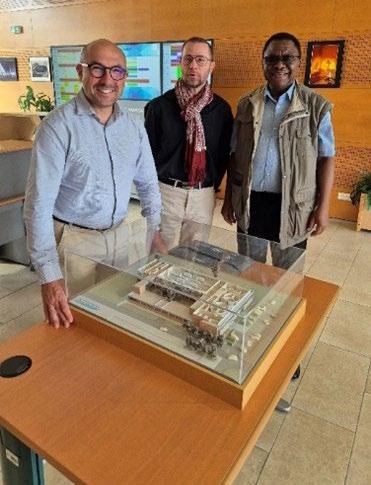
Prof Davidson was hosted in Toulouse by Dr Minesh Poudel of Carpe Diem Aviation in July. Together, they visited ISAE-SUPAERO – the world’s first institute dedicated to Aerospace Engineering – where Prof Davidson met with Mr Mikhaïl Stepanov (Head of International Development) and Ms Florence Puech (Deputy Head of International Relations).
The meeting focused on the academic programmes and activities of both ISAE-SUPAERO and F’SATI and explored opportunities for future collaboration and student exchange. Discussions included the potential for CPUT students to attend short courses at ISAE-SUPAERO in areas such as Civil
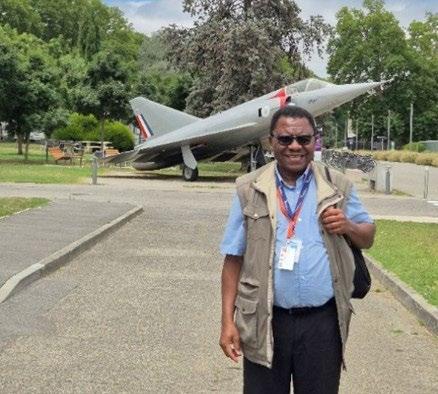
Aviation and Space, Aviation Safety, Airworthiness, Aeronautical Maintenance and Support, and Aviation Quality Management. A longer-term aspiration is the establishment of a joint master’s programme in Aviation, which would address a recognised need within the South African higher education and aerospace sectors.
ISAE-SUPAERO is planning a visit to CPUT and South Africa in 2025 to explore mutually beneficial commercial and academic opportunities. A workshop is currently being planned for March 2025, with the support of the French Embassy.
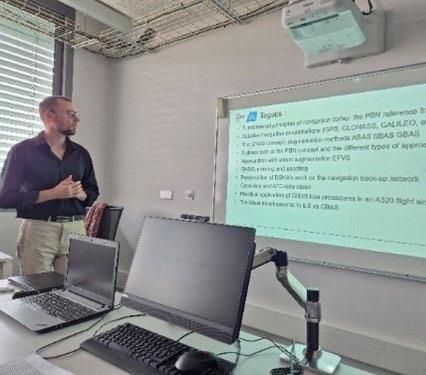
Prof Davidson at ENAC and ISAE SUPEARO Campuses
A journey of research excellence and dedication IN THE NEWS
Prof Vipin Balyan has established himself as a prominent figure in the field of Wireless Communication, driven by a deep commitment to impactful research and innovation. His academic foundation, built on a PhD from Jaypee University of Information Technology – where he specialised in ‘Efficient utilisation of OVSF codes for CDMA networks’ – has been instrumental in shaping his research trajectory.
Prof Balyan’s research interests span a wide range of topics, including wireless communication, fuel cell technology, Visible Light Communication (VLC), Non-Orthogonal Multiple Access (NOMA), CDMA, OFDM, and wireless sensor networks. His scholarly work demonstrates both depth and rigour, addressing complex challenges and advancing the frontiers of knowledge. This is reflected in his extensive, high-quality publications in leading international journals and conference proceedings.
A defining milestone in Prof Balyan’s research career was receiving an NRF Y2 rating in 2019 – an esteemed recognition. This accolade affirms the quality and impact of his research as a young scholar. His success reflects a dedicated focus on producing high-impact work. The NRF rating carries considerable weight, going beyond recognition to strengthen a researcher’s career through enhanced credibility, increased access to funding opportunities, and broader collaboration potential. It also contributes to elevating institutional reputation.
Prof Balyan’s commitment to research excellence is further reflected in numerous accolades, including several Research Excellence Awards at both university and faculty level for DHET-listed publications and postgraduate student supervision. These awards acknowledge not only his scholarly output but also his dedication to nurturing the next generation of researchers.
He has successfully supervised and co-supervised nine PhD/DEng and 20 MEng students.
Key recognitions include:
2024 Bronze Award for Publications and Bronze Award for Postgraduate Supervision (2022)
2024 Listed among the Top 2% Scientists on the Stanford/Elsevier Global List
2024 Research Excellence Award (Platinum) for Publications (2021)
2024 Research Excellence Award (Bronze) for Postgraduate Supervision (2021)
2023 Listed among the Top 2% Scientists on the Stanford/Elsevier Global List
2023 Research Excellence Award (Bronze) for Publications
2023 Departmental Teaching Excellence Award
2023 Faculty Diamond Award for Publications and Postgraduate Supervision
2019 NRF Y2 Rating (until December 2024)
2019 Rated Researcher Award, CPUT
In addition to his research accomplishments, Prof Balyan has demonstrated a strong capacity to secure research funding – an essential skill that supports his continued research and provides vital resources for postgraduate students. His involvement in curriculum development, programme coordination, and service as an external examiner, as well as internal and external moderator, reflects a deep and multifaceted commitment to academic excellence.
Prof Balyan gratefully acknowledges the personal support that has underpinned his professional journey. He extends heartfelt thanks to his parents, wife, brother, sister, children, and elder brother, as well as his line managers (including the HoD, Dean, and Assistant Dean), his PhD supervisor Prof Davinder Singh Saini, Prof Sivakumar Pasupathi (Director of HySA), and Prof Atanda Raji. Their unwavering encouragement has been a constant source of strength and inspiration throughout his career.
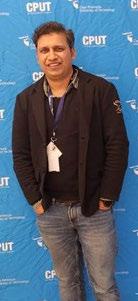
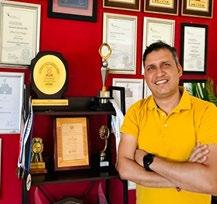
Prof Vipin Balyan
Accolades and staff promotions
ASIC–F’SATI proudly celebrates the following staff accomplishments and extends warm congratulations to each of them:
• Ms Lilie Leopold-Kateya, AIT Engineer with ASIC, graduated with an MEng in Electrical Engineering
• Dr Gunjan Gupta was promoted to senior lecturer in the Department of Electrical, Electronic & Computer Engineering
• Dr Gunjan Gupta was a finalist for the Higher Education Women Leaders Award from Higher Education Resource Services South Africa (HERS-SA), in the category Emerging Young Women Leaders (Academic)
• Dr Ayodele Periola was accredited as a Professional Engineer by the Engineering Council of South Africa (ECSA), with the designation Pr. Eng
• Dr Ayodele Periola was nominated by the National Science and Technology Forum (NSTF) as an Emerging Researcher
• Dr Oluwaseyi Babalola was honoured for achieving a Y2 research rating from the NRF
• Prof Inno Davidson was honoured for his C2 research rating from the NRF
RESEARCH OUTPUTS
During 2024, ASIC–F’SATI staff, postgraduates and researchers contributed the following: Peer-reviewed conference proceedings
• ‘Forecasting of time series telemetry for satellite operations using deep learning techniques’, Proceedings of the 2024 32nd Southern African Universities Power Engineering Conference (SAUPEC)
• ‘A study of AIS frames sent by CubeSats into the ground station’, Proceedings of the 2024 32nd Southern African Universities Power Engineering Conference (SAUPEC)
• ‘Seismic activity impact mitigation on wind turbine and solar PV energy output production’, Proceedings of the 2024 32nd Southern African Universities Power Engineering Conference (SAUPEC)
• ‘Cloud resolution and solar location diversity’, Proceedings of the 2024 32nd Southern African Universities Power Engineering Conference (SAUPEC)
• ‘Multi-orbital protection schemes for space-based solar power systems’, Proceedings of the 2024 IEEE PES/IAS Power Africa Conference
• ‘Modernisation of the South African power grid’, Proceedings of the 2024 IEEE PES/IAS Power Africa Conference
• ‘Performance simulation of a LoRa low-power WAN CubeSat in Earth observation missions’, Proceedings of the 2024 IEEE PES/IAS Power Africa Conference
• ‘Spacecraft electrical power management systems – System review’, Proceedings of the 2024 IEEE PES/IAS Power Africa Conference
• ‘Intelligent approach to reduce overstimulation for multi-screen computing systems’, Proceedings of the 2024 47th MIPRO ICT and Electronics Convention
• ‘Renewable sources: A genetic perspective and application architecture for improved underwater astronomy observations’, Proceedings of the 2024 ELEKTRO Conference
• ‘Green intelligent content rendering paradigm’, Proceedings of the International Conference on Artificial Intelligence, Big Data, Computing and Data Communication Systems (icABCD)
• ‘In-orbit performance evaluation of the MDASat-1 CubeSat power system’, Proceedings of the 2024 13th International Conference on Renewable Energy Research and Applications (ICRERA)
• ‘Unlocking energy stability: An approach to managing load shedding in eThekwini Municipality by leveraging the potential of battery energy storage systems’, Proceedings of the 2024 13th International Conference on Renewable Energy Research and Applications (ICRERA)
• ‘Open interface system protocols for space-based power systems’, Proceedings of the 2024 13th International Conference on Renewable Energy Research and Applications (ICRERA)
• ‘Multi-orbital Protection Schemes for Space-based Solar Power Systems’, Proceedings 2024 IEEE PES/IAS Power Africa Conference
Journal articles
• ‘Linearization of Newton’s second law’, International Journal of Theoretical Physics
• ‘Comparative review of remote sensing methods for ocean plastic litter detection’, IEEE Access
• ‘Cooperative power domain NOMA transmission using relays’, International Journal on Smart Sensing and Intelligent Systems
• ‘TCP stratos for stratosphere-based computing platforms’, J ournal of Cloud Computing
• ‘The question of thermoelectric devices (TEDs) inefficiency – Practical examination considering thermoelectric coolers (TECs)’, Results in Engineering
• ‘Ocean warming events resilience capability in underwater computing platforms’, Scientific Reports
• ‘Linear discriminant analysis-based hidden Markov model for detection of Mysticetes’ vocalisations’, Scientific African
• ‘Nuclear resilient and redundant compute and communication integrated network’, Soft Computing
• ‘Wavelet-based feature extraction with hidden Markov model classification of Antarctic blue whale sounds’, Ecological Informatics
• ‘Stratospheric platform applications: Reduced cognitive load for multimedia and education’, Wireless Networks
• ‘Dimmable constant weight polar-coded non-orthogonal multiple access with orthogonal space-time block coding visible light communication systems’, IET Communications
• ‘Experimental analysis of low-duty cycle campus deployed IoT network using LoRa technology’, R esults in Engineering
• ‘Credit card fraud: Analysis of feature extraction techniques for ensemble hidden Markov model prediction approach’, Applied Sciences
• ‘Determination of the Weibull parameters and wind power potential: A case of Okorobo-Ile Town, Rivers State, Nigeria’, Wind Energy and Engineering Research
• ‘Optimal sizing, energy balance, load management and performance analysis of a hybrid renewable energy system’, Energies
• ‘Bio-inspired design of future solar power systems for smart grid applications’, International Journal of Smart Grid
• ‘A modified multi-objective particle swarm optimisation (M-MOPSO) for optimal sizing of a solar–wind–battery hybrid renewable energy system’, Solar Compass
• ‘Implementing enhanced security in the Zigbee joining process using elliptic curve Diffie–Hellman algorithm’, Electrica
• ‘Technical, economic and environmental assessment and optimisation of four hybrid renewable energy models for rural electrification’, Solar Compass
• ‘Structuring the urban airspace for efficient logistics traffic operation’, Revista Ciencia y Poder Aéreo
Chapters in books
• ‘A methodology for evaluating aviation sustainability perspectives’, in Lecture Notes in Mechanical Engineering, Springer, Singapore
• ‘Assessing drone-based last-mile logistics: A hybrid solution’, in Lecture Notes in Mechanical Engineering, Springer, Singapore
• ‘South Africa’s solar rebates: Hope or hate for residential customers within eThekwini Municipality’, in Trends and Technological Challenges in Green Energy, Springer Nature, Switzerland
• ‘Dual ring star 16-QAM constellation partitioning based SCMA codebook’, in Lecture Notes in Networks and Systems, Springer, Singapore
• ‘HsMM-based mobility aware cell association method for dynamic bandwidth management in 5G-FRANs’, in Lecture Notes in Networks and Systems, Springer, Singapore
PARTNERSHIPS AND COLLABORATIONS
During 2024, ASIC–F’SATI staff, postgraduates and researchers expanded and strengthened strategic partnerships, both locally and internationally, and participated in the following events:
• IEEE Africon Conference, Nairobi, with the theme ‘Advancing Technology in Africa Towards Presence on the Global Stage’
• Group on Earth Observations Week and Ministerial Summit, an international event, hosted by DSI in Cape Town
• Southern Africa Universities Power Engineering Conference (SAUPEC) in Stellenbosch
• Earth Observation Workshop at CSIR in Pretoria
• A visit to the University of Juba, South Sudan, as part of a South African delegation comprising delegates from CPUT, SANSA, DSI and the Department of International Relations and Cooperation, to establish a Space Academy there
• Dr Oluwaseyi Babalola and Mr Sinamandla Maqina represented CPUT at UKZN’s Aerospace Systems Research Institute (ASRI) launch event in Durban
• Mr Sinamandla Maqina and Mr Ian van Zyl visited the permanent F’SATI exhibit at the Albertina Nontsikelelo Sisulu Science Centre in Cofimvaba, Eastern Cape
• Dr Ayokunle Ayeleso and Mr Nyameko Royi represented F’SATI and ASIC as
exhibitors at the Sustainability Research and Innovation Satellite Event in Durban
• Mr Nyameko Royi and Ms Lilie Leopold-Kateya represented F’SATI and ASIC as exhibitors at the VC’s Business and Industry Engagement Event at CPUT’s Granger Bay Campus
• Prof Inno Davidson, Dr Gunjan Gupta, Dr Oluwaseyi Babalola and Mr Nyameko Royi went on a research visit to universities and institutes in Montpellier and Bordeaux in France
• Prof Inno Davidson, Dr Ayokunle Ayeleso, Dr Ayodele Periola, Mr Sinamandla Maqina and Mr Ludwe Dulaze participated in the South African National Space Conference in Pretoria
• 2nd Air and Space Power Symposium, Africa Aerospace and Defence Show in Pretoria
• ICRERA 2024 Conference, in Nagasaki, Japan
• International Astronomical Congress (IAC 2024) Conference and Exhibition in Milan, Italy
Local and international visitors
F’SATI at CPUT welcomed various visitors this year:
• Lt Col Samukolo Vilakazi (Pr Eng) of the South African National Defence Force
• Prof Dario Modeneni and Dr Giacomo Curzi of the University of Bologna
• Prof Mykola Ivchenko of the KTH Royal Institute of Technology in Sweden
• Prof Ken Nixon of WITS
• Dr Arno Barnard and Dr Willem Jordaan of SU’s Electronic Systems Laboratory
• Dr Sias Mostert of Space Commercial Services
• The DVC and the Dean of the Faculty of Engineering of the University of Lumbubashi, Democratic Republic of Congo
• A delegation of the heads of African Space Agencies and SANSA
• Representatives from Tokyo Metropolitan University
• Representatives from Namibia University of Science and Technology
Graduated postgraduate students
During 2024, FSATI-ASIC successfully graduated five postgraduate students from the MEng: Electrical Engineering degree.

QUANTUM PHYSICS RESEARCH GROUP
(Faculty of Engineering & the Built Environment)
MR RORY PENTZ
pentzr@cput.ac.za
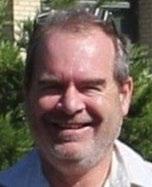
Overview
The Quantum Physics Research Group is based in the Department of Electrical, Electronic & Computer Engineering. The group is dedicated to developing new technologies that exploit specific properties of quantum physics. In particular, it focuses on tools for manipulating cold atoms. Over the past ten years, the group has established a laboratory for laser cooling of atoms. This process involves creating an ultra-high vacuum within a chamber, removing impurities, and injecting a small amount of rubidium. Lasers are then used to cool the rubidium vapour to the micro-Kelvin range, while magnetic fields compress the vapour into a compact cloud.
The tools being developed will enable non-linear processes that create entangled photons and enable quantum control of atoms. Some of these tools will be used to create quantum encryption devices for quantum key distribution (QKD), and in the future, logic gates for quantum computing.
Achievements during 2024
In 2024, the group focused on calibrating and characterising an external cavity diode laser (ECDL). The picture below shows the current state of the ECDL, which will be used in non-linear
atomic spectroscopy experiments. These include a four-wave mixing (FWM) experiment to generate entangled photons. The FWM setup involves injecting three lasers emitting coherent light into the chamber at specific wavelengths. This process facilitates a non-linear interaction that generates two entangled photons, referred to as the Signal and Idler.


External cavity diode laser
Coincidence meter
RESEARCH GROUP
The construction of the FWM setup has required substantial effort, particularly in beam alignment and achieving the correct laser wavelengths. The group also previously developed a coincidence counter, which has been tested and used to measure the time difference between the arrival of the two entangled photons – a smaller time difference indicates a higher degree of entanglement. Some challenges remain with the meter, which will be addressed in due course. The meter is also being tested by SU and UP.
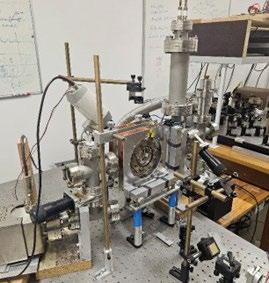
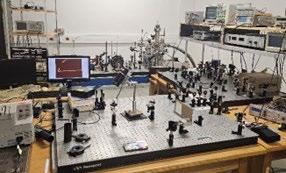
Ongoing projects
The group is currently developing a cost-effective single-photon detector. These detectors are designed to produce an output signal upon interaction with a single photon – a considerable challenge given the minimal energy of an individual light particle. While preliminary results suggest successful detection of single photons, further verification is required.
Additionally, the group is developing a QKD system demonstrator for educational purposes. This system will enable students to gain practical experience in aligning optical components and understanding the BB84 quantum encryption protocol. Interactive activities will allow learners to explore the differences between symmetric, asymmetric, and QKD encryption methods.


Further development of the ECDL is planned, with the aim of ruggedising the design and bringing it up to commercial standards. Over the next few years, the group intends to establish a spin-off company (via the TTO at CPUT) to manufacture and commercialise the technologies developed through the research programme.
Magnetic optical trap
Four-wave mixing setup
Aviwe sends encrypted information using symmetric, asymmetric, or QKD encryption
Bilal receives the encrypted information and uses the distributed key to decrypt it
Team composition and collaboration
The group comprises three doctoral students, two master’s students, two honours students, and three interns. Three academic staff members are actively involved in the research, with two new members having joined the team. The group collaborates with UKZN, SU, and UJ, and is also contributing to the South African Quantum Technology Initiative (SAQuTI). The group is also establishing partnerships with universities in the Netherlands, namely the University of Twente, a leading research university in Enschede, and HAN University of Applied Sciences, which has campuses in Arnhem and Nijmegen.
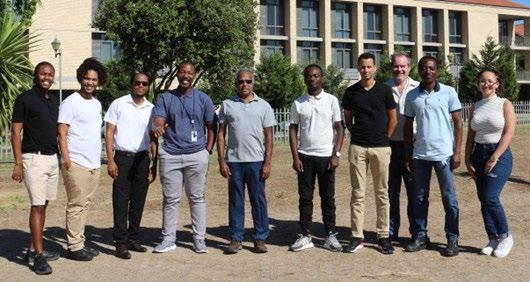
Below is a summary of the field of research of each member of the group.
STUDENT CAPACITY FIELD OF RESEARCH
William Mukind PhD student and research assistant Quantum metrology, QKD and quantum control
Adrian Wyngaard PhD student and staff Cold atoms research and ECDL testing
Rory Pentz PhD student and staff Single photon detector and QKD development
Simphiwe Makhathini Research assistant, honors student Develop a Control strategy for APD
Letsie Mofokeng Research assistant, master’s student LNA for single photon detectors active/passive quenching
Dale Fillis Lab technician, intern Schools project
Oratile Matlhare Lab technician, intern Schools project
Siviwe Tshananda Research assistant, honors student Back-end programming (schools project)
Tracy Mentor Lab technician, intern Front-end programming (schools project)
Finally, the group is focused on completing the projects that we aim to take to the marketplace. We successfully produced one publication with the South African Institute of Physics, titled ‘Principles and challenges of developing a cost-effective single-photon detector’, and one student graduated with an MSc in Electrical Engineering.
Mr Matlhare, Mr Fillis, Mr Mofokeng, Mr Makhathine, Dr Govender, Mr Opeolu, Mr Wyngaard, Mr Pentz, Mr Mukind, and Miss Mentor
FOCUS AREA 3 Smart Energy
Introduction by Prof Mohamed Tariq Ekeramodien Kahn
khant@cput.ac.za

This focus area’s research vision may be defined as “an aspiration to provide innovations in the field of Energy that improve quality of life and create value”. This vision relates directly to these UN 2030 high-impact Sustainable Development Goals: SDG 7 Affordable and Clean Energy; SDG 9 Industry, Innovation and Infrastructure; SDG 11 Sustainable Cities and Communities; SDG 13 Climate Action; and thus indirectly also SDG 3 Good Health and Well-Being.
The concept of ‘Smart Energy’ involves leveraging synergies among innovations across all sectors of electrical, chemical, thermal and fossil fuel energy systems. It encompasses transdisciplinary collaboration and technologies. This focus area requires all energyrelated research in any centre across departments and faculties to collaborate with a vision for excellence. This is crucial to a sustainable energy future.
Focus Area 3: Smart Energy encourages extensive use of the ‘smartness’ that digital innovations enable across areas such as energy production, transportation, efficient use and transfer of energy, and the general power system improvement to meet the UN’s SDGs. Providing cost-effective integration of smart energy systems at scale requires balancing present needs, existing fossil fuel resource optimisation and renewable energy deployment in line with future needs.
Difficult trade-offs exist between quick wins and long-term strategies, which is a challenge in the energy sector. The innovative exploratory research areas mapped by the research under this focus area will achieve solutions tailored to South Africa’s NDP and the UN’s SDGs.
The following research niche areas are among those broadly encouraged in this focus area:
E-mobility and transportation
Increased efficiency in fossil fuel-based transportation, hybrid, plug-in hybrid and extended range electric vehicles is a key player in transportation. This research area is relevant to SDGs 3, 7, 8, 9, 11, 13, 15 and 17.
Energy production, use and access
Sustainable, renewable and alternative energy sources – including cleaner fossil fuel generation, oceans’ energy and waste management approaches – are being investigated across the disciplines of electrical, chemical and mechanical engineering, as well as through interfaculty collaborations.
The key elements in improving energy efficiency would be in reducing the 67% rejected energy on the user side,
CPUT addresses affordable and clean energy solutions
In September, FEBE hosted the Innovative Solutions Seminar (Innosol2_2024) SDG 7 at SARETEC, focusing on affordable and clean energy. The programme covered a broad range of topics, including energy efficiency and management, sustainable urban development, energy access, economics and social impact, and innovations in renewable energy for storage.
Welcoming delegates, Dean Prof Suresh Ramsuroop, said, “Our goal was to bring together diverse stakeholders – including policymakers, industry leaders, and researchers from across CPUT – to discuss innovative strategies and share insights on advancing affordable and clean energy solutions.”
The event facilitated meaningful dialogue and showcased FEBE’s research with the potential to make a significant impact in the field. Speakers included Prof Vally Padayachee (Strategic Advisor to the Association of Municipal Electricity Utilities of Southern Africa) on ‘The evolving electricity grid for the 21st century: A South African perspective’, and Dr Titus Mathe (CEO of the South African National Energy Development Institute (SANEDI)) on ‘Energy access challenges in Sub-Saharan Africa and South Africa, and the role of strategic research and partnerships in overcoming them’.
Prof Veruscha Fester, Assistant Dean: RTIP, expressed her sincere gratitude to the guests and speakers for their contributions and insights. “The discussions we’ve had today have been invaluable in shaping our collective understanding and approach to advancing SDG 7. Our distinguished guest speakers have clearly identified the key challenges we face, and it is now our responsibility to refocus our efforts to provide the solutions needed to address energy access, renewable energy resources, energy efficiency, and low-carbon alternatives,” she noted. She added that grid modernisation will be key to bringing all these efforts together, as presented by Prof Padayachee. “Let’s carry forward the momentum from this gathering, turning ideas into action and continuing to foster collaboration that drives sustainable energy solutions for South Africa and beyond.”
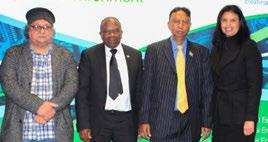
Dr Mathe and SANEDI Board Chair, Mr Sicelo Xulu, also toured the SARETEC facilities. “They were highly impressed by the facilities and its contribution to SANEDI’s mandate and expressed the desire to partner with SARETEC and support its current and future endeavours,” said Prof Ramsuroop.
as well as optimising the demand-side use of energy. This is achievable with power electronic systems and improvements in advanced metering and sensor/ communication technology applied across the sector. This research area is relevant to SDGs 1, 4, 6, 7, 8, 9, 10, 11, 12, 13 and 16.
Energy efficient agriculture and human settlement
Water is essential for agriculture and human settlement. Researchers are looking at developing improved methods of renewable energy-based desalination, pumping and energy-efficient water purification. The mechanised agriculture sector, including aquaponics, depends on the effective use of energy in the forms of strategic solar and wind farm placement, smart sensor deployment and electromechanical interface development.
In addition, the expansion of smart sensor technology helps to monitor operations, crops, and livestock with IoT and ambient intelligence, which can also branch out to include green buildings and heating, ventilation and air conditioning (HVAC) climate control in buildings and warehouses. This research area is relevant to SDGs 1, 2, 3, 5, 8, 13, 15, 16 and 17.
Power system improvements, smart grids and microgrids
Energy management systems (EMS) were introduced to combine both the power system hardware and the intelligent software systems that monitor, control and plan for the operation of power systems. EMS is a concept used to identify the systems that forecast, monitor, measure and control energy generation and energy consumption for a reliable and stable operation of modern smart electrical grids.
Development of techniques for assessing customer accountability for harmonic distortion across a ring main network, maximum power point tracking (MPPT) for PV Systems under different meteorological conditions, stability assessment of interconnected IPP renewables to the utility grid, improvements in microgrids and smart grids are investigated in this research area.
Real-time distributed systems, advanced digital technologies, energy modelling – including big data in load forecasting – and blockchain techniques in electricity from generation to load utilisation are explored. This research area is relevant to SDGs 1, 8, 9, 10, 11, 12, 13 and 17.
Shaping our collective approach to advancing SDG 7
RESEARCH INSTITUTE
ENERGY INSTITUTE
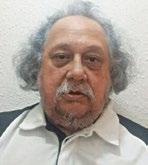

PROF MOHAMED TARIQ KAHN
khant@cput.ac.za
(Faculty of Engineering & the Built Environment)
The focus area leader for Smart Energy, Prof Mohamed Tariq Kahn, is the Director of the Energy Institute and CPUT’s Research Chair: Energy. Prof Atanda Raji has been Deputy Director of the institute since November 2021.
The Energy Institute links various researchers across several specialised centres:
• Centre for Distributed Power & Electronic Systems (CDPES)
• Centre for Research in Power Systems (CRPS)
Research impact
The institute’s interdisciplinary projects span the entire energy value chain – from generation, transmission and distribution, to energy efficiency in buildings, industry, transportation and smart city applications.
Current research increasingly focuses on:
• Renewable energy integration (solar PV, wind, hybrid systems, and storage)
PROF ATANDA KAMORU RAJI
rajia@cput.ac.za
• French–South African Schneider Electric Education Centre (F’SASEC)
The Energy Institute is guided by the UN’s 2030 SDGs and by CPUT’s 10-year Research, Technology and Innovation (RTI) Blueprint. The institute drives research that supports South Africa’s transition to sustainable energy systems.
Responding to global megatrends
Rapid urbanisation, digitalisation and globalisation are reshaping the energy landscape. These megatrends are accelerating the global shift towards low-carbon, intelligent and resilient energy systems. The Energy Institute responds by leading research that advances energy access, sustainability and inclusive economic development.
• Microgrids and distributed generation for rural and urban communities
• Digitalisation of energy systems through smart grids, AI, IoT and data analytics
• Sustainable mobility, including e-mobility and green hydrogen
• Resilient energy systems for health, education and industrial growth
In this way, the Institute contributes to several SDGs, including:
• SDG 3: Good Health & Well-being
• SDG 7: Affordable & Clean Energy
• SDG 8: Decent Work & Economic Growth
• SDG 9: Industry, Innovation & Infrastructure
• SDG 11: Sustainable Cities & Communities
• SDG 12: Responsible Consumption & Production
• SDG 13: Climate Action
Strategic objectives
The institute’s mission is to build a network of expertise across southern Africa to drive innovation in sustainable energy. Its objectives include:
• Advancing energy-efficient technologies and embedding them into smart city solutions
• Supporting the deployment of renewable and sustainable energy systems in both urban and rural contexts
• Pioneering interdisciplinary, world-class research in energy systems, storage and digitalisation
• Enhancing awareness of new techniques, technologies and policy approaches shaping the future of energy
Positioned as a leading hub for cutting-edge, impactdriven research, the Energy Institute aligns global sustainability goals with Africa’s unique energy challenges.
Research highlights for 2024
Notable staff achievements
• Prof Atanda Raji was presented with the Gold Award and Bronze Award in the Publication and Supervision categories respectively at the FEBE Research Day
• Dr Ali Almaktoof received the 2023 Institutional Teaching Excellence Award
• Dr Gunjan Gupta won the Teaching Excellence Award at faculty level
Research Excellence Awards
• Dr Ali Almaktoof and Prof Mohamed Tariq Khan received the Bronze Award for the most cited paper from FEBE
• Dr Ali Rugbani received the Departmental Teaching Excellence Award
Staff Training Mobility (STT) – Erasmus+ Programme
Dr Aleksejs Prozuments, from Riga Technical University (Latvia), undertook a Staff Training Mobility activity under the Erasmus+ programme. As part of this exchange, he conducted a seminar at the Energy Institute in March. The seminar contributed to strengthening academic and research linkages between our institutions, promoting knowledge exchange, and fostering international collaboration. Dr Prozuments shared insights and best practices.
Publications including that of affiliated centres
CDPES
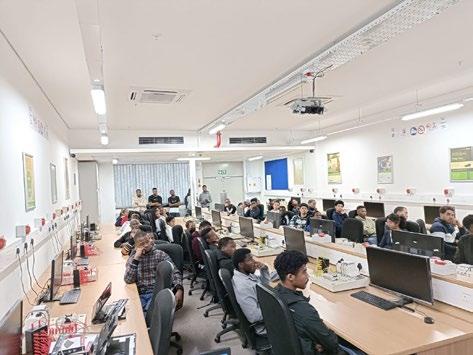
Journals: 17
Conferences: 8 8
Books and chapters: 1 1
Postgraduate graduations: 1 DEng, 6 MEng
Supervision: 3 DEng, 4 MEng
Funding secured: TESP Eskom
CRPS
Journal articles: 15
CRPS conferences publications: 3
Postgraduate graduation: 3 DEng, 3 MEng
Supervision: 4 DEng, 20 MEng in Energy and MEng in EE
Collaboration: with UKZN and with UJ

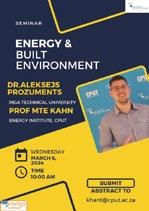
RESEARCH CENTRE
CENTRE FOR DISTRIBUTED POWER & ELECTRONIC SYSTEMS (CDPES)
(Faculty of Engineering & the Built Environment)
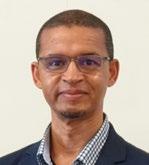
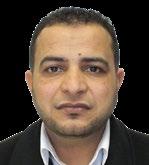
PROF MARCO ADONIS
adonism@cput.ac.za
DR ALI ALMAKTOOF
almaktoofa@cput.ac.za
Introduction
Through its research, CDPES aims to:
• Develop power conversion systems for renewable energy sources and investigate the interconnectivity of distributed resources with microgrids and electric power systems
• Apply this technology in multidisciplinary applications within the energy sector, especially in commercial and industrial fields
• Investigate and deploy optical fibre and wireless communication techniques over large-scale power systems for the telemetry and control of both AC and DC microgrids and smart grids
• Improve control schemes for power converters and drives
• Develop instrumentation for complex energy sectors such as wind, solar and nuclear, with a focus on environmental protection and sustainable development
CDPES team members
Prof Marco Adonis (head), Dr Ali Almaktoof (deputy head), Prof Mohamed Tariq Kahn, Prof Atanda Raji, Prof Balyan Vipin, Dr Ayokunle Ayeleso, Dr Anges Akim Aminou Moussavou, Dr Gunjan Gupta, Dr Ayodele Periola and Mr Achmat Fish.
Research publications
Journal articles
• ‘Basic circuit model of voltage source converters: Methodology and modelling, AppliedMath, 4(3) https://doi.org/10.3390/ appliedmath4030048
• ‘Energy management strategy for DC microgrid system with the important penetration of renewable energy’, Applied Sciences, 14(6) https://doi.org/10.3390/app14062659
• ‘Energy management strategy for a hybrid microgrid system using renewable energy’, Discover Energy, 4(1) https://doi.org/10.1007/s43937-02400025-9
• ‘Analysis and systematic literature review on energy harvesting from roads’, International Journal of Applied Engineering & Technology, 6(1) https://shorturl.at/aVGpu
• ‘Battery storage use in the value chain of power systems’, Energies, 17 https://doi.org/10.3390/ en17040921
• ‘Dataset on Trombe wall application in a factory building’, Data in Brief, 53 https://shorturl.at/gu7qh
• ‘The question of thermoelectric devices (TEDs) in/ efficiency: A practical examination considering thermoelectric coolers (TECs)’, Results in Engineering, 21 https://shorturl.at/yC5Jl
• ‘Green hydrogen: A clean energy solution for Germany’s transportation sector’, SAIEE Africa Research Journal, 115(1) https://shorturl.at/AsCe4
Conference proceedings
• ‘Investigation of frequency response of a power network under varying penetration levels of renewable energy sources’, 2024 International Conference on Electrical and Computer Engineering Research (ICECER) https://doi.org/10.1109/ICECE R62944.2024.10920322dmath4030048
• ‘In-orbit performance evaluation of the MDASat-1 CubeSat power system’, 2024 13th International Conference on Renewable Energy Research and Applications (ICRERA), Nagasaki, Japan https://doi. org/10.1109/ICRERA62673.2024.10815125
• ‘Comparative performance exploration of different machine learning and deep learning algorithms for classification of hand wrist gestures’, 2024 2nd International Conference on Disruptive Technologies (ICDT), Greater Noida, India https:// doi.org/10.1109/ICDT61202.2024.10489473
Postgraduate graduation
Doctoral students
• Dr Christian Ndeke Bipongo graduated DEng: Electrical Engineering, with thesis ‘Energy management for a hybrid renewable microgrid system’, supervised by Prof Adonis and Dr Almaktoof
Master’s students
• Ms Taina Matshotyana graduated MEng: Energy, with thesis ‘Independent renewable energy microgrid design for Africa’, supervised by Prof Adonis and Dr Moussavou
• Mr Savarion Moodien graduated MEng: Energy, with thesis ‘Improving the operational performance of wind turbine rotors, by using vortex-tripping devices as a passive control method’, supervised by Prof Adonis
• Mr Mthomasebe Adonis graduated MEng: Electrical Engineering, with thesis ‘Design and implementation of internet of things in nanosats’, supervised by Prof Adonis
• Ms Lilie Nalitye Leopold graduated MEng: Electrical Engineering, with thesis ‘System level implementation of a C-band downconverter for a nanosatellite receiver’, supervised by Prof Balyan and Dr Bayendang
• Mr Rezah Rowe graduated MEng, with thesis ‘Design, implementation and deployment of test bed for LoRa communication architecture on nanosatellite constellations’, supervised by Prof Balyan and Dr Gupta
Master’s and doctoral supervision
• Prof Adonis and Dr Periola supervised DEng: Electrical Engineering student Mr Mthomasebe Adonis, with thesis ‘Optimising a software defined university network using machine learning’
• Prof Adonis supervised DEng: Electrical Engineering student Mr Hendrik Petrus Du Plooy, with thesis ‘Transmission and distribution topology for a utility scale DC micro grid’
• Prof Adonis and Dr Almaktoof supervised Doctor of BMS: Project Management student Ms Sibabalwe Hlamandana, with thesis ‘The development of a cost-efficient logistics network for SMEs in Lusikisiki and Flagstaff in the Eastern Cape’
• Prof Adonis and Dr Moussavou supervised MEng: Electrical Engineering student Mr Mpey Christian Kipalamoto, with thesis ‘Tomato leaf disease diagnosis using convolutional neural networks and transfer learning for mobile application’
• Prof Adonis and Dr Moussavou supervised MEng: Energy student Mr Otuye Lukasha Papy, with thesis ‘Enhanced power transmission in the southern African power pool using voltage source converterbased HVDC’
• Prof Adonis supervised MEng: Electrical Engineering student Mr Ntshatsheli Aphiwe Dyarvane, with thesis ‘Development of an inverted F-antenna using the rectenna as a power source for Zigbee devices’
• Prof Adonis supervised MEng: Energy student Mr Bekithemba Shaun Gqibithole, with thesis ‘Techno-economic analysis of hybrid wind-hydrogen economy projects in Sub-Saharan Africa’
Notable staff achievements
Dr Gunjan Gupta was honoured with a Teaching Excellence Award at faculty level. She was also recognised as one of the top five finalists for Higher Education Resource Services South Africa (HERS-SA) in the Emerging Young Women Leaders category.
RESEARCH CENTRE
CENTRE FOR RESEARCH IN POWER SYSTEMS (CRPS)
(Faculty of Engineering & the Built Environment)

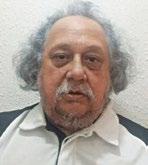
DR ALI ALMAKTOOF
almaktoofa@cput.ac.za
PROF MOHAMED
TARIQ KAHN
khant@cput.ac.za
The Centre for Research in Power Systems (CRPS) team members are Dr Ali Almaktoof (head), Prof Tariq Kahn (deputy head), Dr Ali Rugbani (postgraduate liaison), Dr Agnes Akim Aminou Moussavou (industrial linkages), Dr Ouassini Nemraoui and Mr Christopher Wills (technical support).
CRPS is a multidisciplinary research hub committed to advancing innovation in energy systems, renewable integration, smart grids, and energy efficiency. By bringing together expertise across engineering disciplines, the centre extends its focus to include renewable energy systems such as wind, solar, and hydropower, alongside advanced control and grid modernisation solutions. Aligned with the UN’s SDGs, CRPS delivers impactful, applied research. Our work focuses on creating sustainable, resilient and intelligent energy solutions for the future, particularly in support of SDG 7 (Affordable and Clean Energy), SDG 9 (Industry, Innovation and Infrastructure), and SDG 13 (Climate Action).
Project areas of interest include:
• Integrated HVAC/HVDC networks: Designing and optimising hybrid AC/DC systems for efficient and reliable energy transfer
• Renewable energy systems: Advancing the integration of wind, solar, and hydropower technologies into modern power grids
• Power quality and energy efficiency: Addressing power quality challenges while developing energy-saving and sustainabilityoriented solutions
• Smart grids and microgrids: Enhancing protection, automation and islanded operation strategies for reliable and flexible grid operation
• Hybrid energy systems: Developing advanced energy management for hybrid systems combining batteries, fuel cells and renewable resources
• Advanced control strategies: Applying predictive, adaptive and intelligent control to improve grid stability, performance and efficiency
• Grid studies and protection systems: Expanding research on protection, communication and 4IR-ready technologies in modern power networks
• Simulation tools and software evaluation: Benchmarking and applying industrialgrade modelling platforms such as Typhoon HIL, MATLAB and OPAL-RT
• Demand-side and load management: Investigating demand-response strategies and their role in reducing stress on distribution networks
• Energy and engineering education: Strengthening the scholarship of teaching and learning in power and renewable energy systems to prepare a future-ready workforce
Research publications
• In collaboration with UKZN, colleagues from the centre published ‘A predictive control algorithm in αβ and ABC frames for a three-phase voltage source inverter’ in the Journal of Engineering Science and Technology, 19(5)
• Dr Almaktoof delivered a lecture titled ‘Connecting for success’ as part of the Distinguished Arab Researcher Programme, in collaboration with international academic organisations in July
Conference publications
• ‘Enhancing agricultural practices through IoT: A dual-modality approach for network resilience and user engagement’, IEEE 4th International Maghreb Meeting of the Conference on Sciences and Techniques of Automatic Control and Computer Engineering (MI-STA), Tripoli, Libya
• ‘Control technique of MPPT utilising for boost converter applied to small renewable energy system and a DC microgrid for remote area’, IEEE 4th International Maghreb Meeting of the Conference on Sciences and Techniques of Automatic Control and Computer Engineering (MI-STA), Tripoli, Libya
• ‘Comprehensive review and applications of power electronic transformer for optimal power integration’, IEEE 4th International Maghreb Meeting of the Conference on Sciences and Techniques of Automatic Control and Computer Engineering (MI-STA), Tripoli, Libya
Journal articles
• ‘Practical approach to enhance energy resilience in manufacturing facilities’, Energy Science & Engineering https://doi.org/10.1002/ese3.2021
• ‘PV power output prediction using deep learning’, International Journal of Applied Engineering & Technology, 6(4) https://romanpub.com/jaetv6-4-2024. php
• ‘A comprehensive review of developments in electric vehicles fast charging technology’, Applied Sciences, 14(11) https://doi.org/10.3390/app14114728
• ‘Integration of artificial neural network in a IEEE 5 BUS system’, International Journal of Electrical Engineering and Applied Sciences (IJEEAS), 7(2) https://doi. org/10.54554/ijeeas.2024.7.02.005
• ‘Review of different types of neural network architectures’, International Journal of Electrical Engineering and Applied Sciences (IJEEAS), 7(2) https://doi. org/10.54554/ijeeas.2024.7.02.006
• ‘A predictive control algorithm in αβ and ABC frames for a three-phase voltage source inverter’, Journal of Engineering Science and Technology, 19(5) https:// shorturl.fm/83bY2
• ‘Real-time energy management system for a hybrid renewable microgrid system’, Energy Science & Engineering, 12(12) https://doi.org/10.1002/ ese3.1966
• ‘Basic circuit model of voltage source converters: Methodology and modelling’, AppliedMath, 4 https://doi.org/10.3390/appliedmath4030048
• ‘Energy management strategy for DC micro-grid system with the important penetration of renewable energy’, Applied Sciences, 14(6) https://doi. org/10.3390/app14062659
• ‘Green hydrogen: A clean energy solution for Germany’s transportation sector’, SAIEE Africa Research Journal, 115(1) https://doi.org/10.23919/ SAIEE.2024.10463751
• ‘Energy management strategy for a hybrid micro-grid system using renewable energy’, in Discover Energy, 4(1) https://doi.org/10.1007/s43937-024-00025-9
• ‘Analysis and systematic literature review on energy harvesting from roads’, International Journal of Applied Engineering & Technology, 6 https://shorturl.at/ VMY6D
• ‘Battery storage use in the value chain of power systems’, Energies, 17(921) https://doi.org/10.3390/en17040921
• ‘Dataset on Trombe wall application in a factory building’, Data in Brief, 53 https://shorturl.at/27G3X
• ‘The question of thermoelectric devices (TEDs) in/efficiency: A practical examination considering thermoelectric coolers (TECs)’, Results in Engineering, 21 https://shorturl.at/ZIKaN
Funding secured
R60 000 Eskom TESP funding was secured for a capacity building programme for a project titled ‘Impacts of small-scale embedded generation on distribution network behaviour’, submitted by Dr Almaktoof.
Postgraduate graduations
Doctoral students
• Dr Christian Ndeke Bipongo graduated DEng: Electrical Engineering, with thesis ‘Energy management for a hybrid renewable microgrid system’, supervised by Prof Adonis and Dr Almaktoof
• Dr Clement Matasane graduated DEng: Electrical Engineering, with thesis ‘A decision support system in rural renewable energy deployment in the Vhembe District, Limpopo, South Africa’, supervised by Prof Khan
• Dr Bandile Jama graduated DEng: Mechanical Engineering, with thesis ‘The design and kinematic modelling of a novel single-sensor three-dimensional coordinate measuring machine’, supervised by Dr Rugbani
Master’s students
• Mr Bello Adamou graduated MEng: Energy, with thesis ‘Design and implementation of crop monitoring and irrigation system using IoT and cloud computing’, supervised by Dr Almaktoof
• Ms Taina Matshotyana graduated MEng: Energy, with thesis ‘Independent renewable energy microgrid design for Africa’, supervised by Prof Adonis and Dr Moussavou
• Mr Kalunga Desire Mulembo graduated MEng: Electrical Engineering, with thesis ‘Real-time hardware-in-the-loop modelling and simulation of a grid connected solar energy system’, supervised by Dr Almaktoof
Master’s and doctoral supervision
Members of the centre supervised four doctoral students and 20 master’s students (MEng: Energy and MEng: Electrical Engineering) this year.
Awards for excellence in research
• Dr Ali Almaktoof and Prof Mohamed Tariq Kahn were awarded the Bronze Award for the most cited paper from FEBE
• Dr Ali Almaktoof received the Institutional Teaching Excellence Award
• Dr Ali Rugbani received the Departmental Teaching Excellence Award
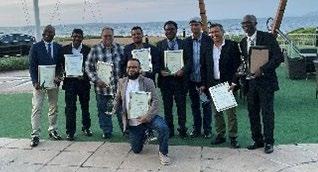
Awardees at the Granger Bay Campus
FRENCH–SOUTH AFRICAN SCHNEIDER ELECTRIC CENTRE (F’SASEC)
(Faculty of Engineering & the Built Environment)

PROF MOHAMED
TARIQ KAHN
khant@cput.ac.za
The French–South African Schneider Electric Centre (F’SASEC) was established at CPUT in 2016. It originally focused on programmable logic controllers (PLCs) in industry. With a renewed partnership with Schneider Electric, the centre has shifted its focus to energy management. It features 27 high-end computer workstations and conducts seminars for both undergraduate and graduate students.
Schneider Electric, a global leader in digital transformation for energy management and automation, operates in over 100 countries. The company excels in power management – both medium- and low-voltage – and automation systems. Schneider Electric collaborates with universities and developer communities worldwide on its open platform to enhance real-time control and operational efficiency. F’SASEC embodies this collaborative spirit, advancing both education and practical expertise in energy solutions. The students also have access to the Schneider Energy University online courses as part of their curriculum.
CENTRE FOR REAL-TIME DISTRIBUTED SYSTEMS (CRTDS)
(Faculty of Engineering & the Built Environment)

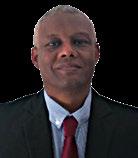
DR MKHULULI
MNGUNI
mngunim@cput.ac.za
DR CARL KRIGER
krigerc@cput.ac.za
The Centre for Real-Time Distributed Systems (CRTDS) team members are Dr Mkhululi Mnguni (leader), Dr Carl Kriger (deputy leader), Dr Nomzamo Tshemese, Dr Haltor Mataifa, Mr Sinawo Nomandela, Dr Ntuthuko Dube and Dr Yohan Mfoumboulou.
The centre strives to make a theoretical and application-based contribution to advances in real-time distributed systems. It works on the development of novel models, design methods, software and hardware, as well as their integrated application for real-time monitoring and control. It also aims at insightful and focused determination of proper areas of application and research through appraisal and reappraisal of emerging control technologies.
The core activities are:
• Design and implementation of non-linear controllers
• Design and implementation of adaptive controllers
• Design and implementation of process automation solutions
• Distributed control based on the IEC61499 standard for function block programming
• Design and implementation of networked control systems
• Optimisation of complex interconnected systems and development of algorithms for parallel computation
HIGHLIGHTS OF 2024
The CRTDS achievements in 2024 in research, development, and applications of the IEC 61499 standard and technology to various industrial processes, include:
Smart sensor and data-driven sewage monitoring system
The MEng research project of Mrs Musawenkosi Ndlovu delivered the implementation of a smart sensor and datadriven sewage monitoring system. This system enhances resource allocation efficiency, enables targeted maintenance, and ensures a timely maintenance response. The integration of electrical and automation technologies further improves the reliability, accuracy, and scalability of sewage monitoring operations. The research findings contribute to the development of effective pollution management strategies, inform policy-making decisions, and provide guidance for the implementation of smart monitoring systems in municipalities.
These outcomes support sustainable development efforts and a cleaner, healthier environment in South Africa, offering a transferable solution applicable to regions worldwide facing similar challenges.
Women in Power event
Dr Tshemese-Mvandaba, a member of CRTDS, is the current Chair of the Institute of Electrical and Electronics Engineers Power & Energy Society (IEEE PES) Women in Power (WIP) for the South African Chapter. She hosted the annual Women in Power event on International Women’s Day in March. The event aims to recognise and celebrate the contributions of women in the power and energy field. Through various discussions and presentations, attendees heard from experts who shared their achievements and experiences, fostering greater inclusion and diversity within the engineering industry. The event highlighted the importance of gender equality and empowerment in driving innovation and progress in the sector.
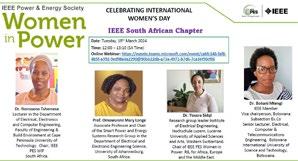
Guest speakers included:
• Prof Omowunmi Mary Longe, associate professor and chair of the Smart Power and Energy Systems Research Group, Department of Electrical and Electronic Engineering Science, UJ
• Dr Bokani Mtengi, vice-chairperson of the Botswana Subsection Executive Committee and senior lecturer in the Department of Electrical, Computer and Telecommunications Engineering, Botswana International University of Science & Technology
• Dr Yousra Sidqi, research group leader at the Institute of Electrical Engineering, Hochschule Luzern, Lucerne University of Applied Sciences and Arts, Switzerland, and Chair of IEEE PES WiP Region 8 (Africa, Europe, and the Middle East)
Dr TshemeseMvandaba concluded her term as chair of the IEEE PES WiP and handed over the role to Dr Muremi of UJ in June.

Ultra-filtration/nano-filtration rig
FEBE, CRTDS and CPUT’s Department of Chemical Engineering have embarked on a collaborative project to commission, test and enhance an ultra-filtration/ nano-filtration (UF/NF) rig for treating dye effluents from the textile industry. The rig is currently being commissioned and upgraded at the CRTDS labs to improve monitoring and control capabilities. Once completed, it will be used by postgraduate students in Chemical Engineering for their research projects. Funding of R100 000 for the equipment upgrade has been provided by FEBE.
Funding secured
• R100 000 from FEBE for the upgrade of a chemical process rig as part of the CRTDS and Chemical Engineering collaborative project
• R120 000 from the Eskom TESP Programme, following successful proposals submitted by Dr Mnguni and Dr Kriger, with payment received this year
Outputs
Journal publications
• ‘Design of a decentralised PID controller using the relative gain array technique for a coupled flotation process’, International Journal of Electrical and Electronic Engineering and Telecommunications, 13(1)
• ‘Design and simulation of full state feedback controller for DC motor’, International Journal of Electrical Engineering and Applied Sciences (IJEEAS), 7(1) https://doi.org/10.54554/ ijeeas.2024.7.01.008
Conference publications
• ‘Review of adaptive load frequency control strategies for improving wind power plant integration’, 32nd Southern African Universities Power Engineering Conference (SAUPEC), IEEE, Stellenbosch
• ‘Voltage stability control in grid-tied photovoltaic systems considering loading effects’, 32nd Southern African Universities Power Engineering Conference (SAUPEC), IEEE, Stellenbosch
Postgraduate graduations in 2024
• Mr Kevin Love with thesis titled ‘Design and implementation of IEC 61499 standard-based controllers in a distributed control environment’ graduated MEng in Electrical Engineering cum laude. His supervisor was Dr Kriger, and his cosupervisor was Dr Tshemese-Mvandaba.
• Mrs Musawenkosi Ndlovu with thesis titled ‘Smart monitoring of sewage infrastructure to alleviate environmental pollution’ graduated MEng in Electrical Engineering cum laude. Her supervisor was also Dr Kriger.
Dr Tshemese-Mvandaba at IEEE PES WIP
Women in Power event 2024
CENTRE FOR SUBSTATION AUTOMATION & ENERGY MANAGEMENT SYSTEMS (CSAEMS)
(Faculty of Engineering & the Built Environment)
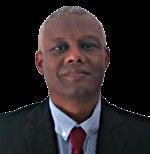

DR CARL KRIGER
krigerc@cput.ac.za
PROF SENTHIL
KRISHNAMURTHY
krishnamurthys@cput. ac.za
The Centre for Substation Automation & Energy Management Systems (CSAEMS) team members are Dr Carl Kriger (leader), Prof Senthil Krishnamurthy (deputy leader), Dr Mkhululi Mnguni, Dr Mohammed Esmail Ms Ntanganedzeni Tshinavhe, Mkhutazi Mditshwa and Mr Mukhove Ratshitanga.
The centre aims to address the need in South Africa for research infrastructure development that supports human capital development as well as research and innovation in the field of metering, monitoring, protection, automation, and control of smart power systems, with a focus on current and emerging standards in this domain. As a result of its visionary approach, the centre has attracted investments from numerous industrial partners and donations from equipment vendors.
The main activities that contribute to the theory and practice of substation automation, energy management systems and smart grids include:
• Training, development and knowledge transfer through equipment-orientated courses, which are aimed at industry engineers and postgraduate students at other collaborating universities
• Interpretation, modelling and implementation of the IEC61850 standard functions at all levels for the control, protection and automation of smart grids
• Development of innovative protection schemes for different applications
• Integration of the distributed energy resources (DERs) to the power grid
• Development of test-bench facilities for the testing of ideas, project solutions and new developments in the field of power systems
• Real-time simulation and providing of innovative solutions to the energy management problem in the conditions of smart grids
• Continuation of the MEng Electrical Engineering Smart Grid qualification under the Erasmus+ K2 DAMOC project (this programme has not been active in 2024 due to the challenges in attracting sufficient postgraduate student numbers to make it financially sustainable)
HIGHLIGHTS OF 2024
Achievements of the CSAEMS during 2024 include:
NTCSA delegation visit
Members of CSAEMS met with a large delegation of approximately 20 representatives from the newly formed National Transmission Company of South Africa (NTCSA), a wholly owned subsidiary of Eskom responsible for electricity transmission in South Africa. The delegation, led by Chief Engineer Mr Phumudzo Mathivha, aimed to assess the facilities within the CSAEMS laboratories and explore the potential for collaborative projects that are practical in nature rather than research-based, and aligned with NTCSA’s operational needs.
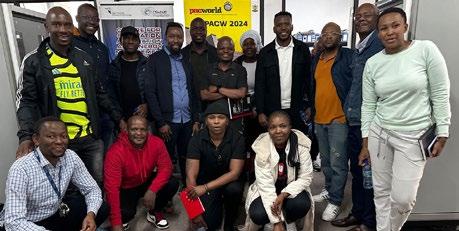
Discussion topics included the research, training and development roadmap and strategies to address NTCSA’s operational challenges, balancing coal sustainability with other focus areas, and future-proofing Eskom’s transmission grid by leveraging CSAEMS expertise.
Eskom Innovation Award
Mr Thulani Solani, supervised by Dr Kriger and Dr Mfoumboulou, won the Eskom Innovation Award this year for his MEng research project titled ‘Smart monitoring of low-voltage networks to combat illegal electricity connections’. This project forms part of the CSAEMS innovation initiatives and will be implemented within a utility in South Africa.
Funding secured
R120 000 was secured through the Eskom TESP Programme following successful proposals submitted in 2023 by Prof Krishnamurthy and Mr Ratshitanga. The funds were received in 2024 to support postgraduate students at CPUT.
Outputs
Journal publications
• ‘Interoperability challenges in multivendor IEC 61850 devices for parallel power transformer differential protection’, International Journal of Electrical and Electronic Engineering and Telecommunications, 13(1)
• ‘Development of an IEC 61850 standard-based busbar protection scheme’, International Journal of Electrical Engineering and Applied Sciences (IJEEAS), 7(1)
• ‘Power flow analysis and steady state contingency of IEEE 9-bus system using DigSilent’, International Journal of Electrical Engineering and Applied Sciences (IJEEAS), 7(1)
• ‘Enhancing PV system stability in the Angolan power network through modelling and simulation of fuzzy logic controllers’, International Journal of Electrical Engineering and Applied Sciences (IJEEAS), 7(2)
• ‘Hardware-in-the-loop simulation and testing of volts per hertz protection scheme for a generator over-excitation system’, International Journal of Power and Energy Conversion, 15(2)
CSAEMS members meeting with NTCSA delegation
Conference publications
• ‘A recap of modern power grid control systems’, 7th Asia Conference on Energy and Electrical Engineering (ACEEE), Chengdu, China
• ‘Evaluation of power grid voltage instability point using system overloading contingency in real-simulation’, IEEE PES/IAS Power Africa, Johannesburg, South Africa
• ‘Busbar differential protection system testing based on practical considerations using real-time digital simulator hardware-in-the-loop technique’, 6th International Conference on Electrical Engineering and Control Technologies (CEECT), Shenzhen, China
• ‘Transformer differential protection system with IEC 61850 GOOSE communication protocol’, 32nd Southern African Universities Power Engineering Conference (SAUPEC), Stellenbosch
• ‘Microgrid protection simulation and testing using a relay-secondary injection device testbed’, 32nd Southern African Universities Power Engineering Conference (SAUPEC), Stellenbosch
• ‘The role of WES and BESS in the provision of operating electricity reserves – a review’, 32nd Southern African Universities Power Engineering Conference (SAUPEC), Stellenbosch
• ‘HIL simulation and testing of the distribution network’s automatic reconfiguration’, IEEE PES/ IAS Power Africa, Johannesburg
• ‘Active power reserve provision with large-scale WES and BESS’, IEEE PES/IAS Power Africa, Johannesburg
Book chapter
‘Integration of wind power plants for power system frequency stability improvement’, in State-of-theArt of Mathematical Modelling, Dynamics, and Control of Wind Turbines Engineering, IntechOpen. http://10.5772/intechopen.1007097
Postgraduate graduations in 2024
• Dr Mohammed Yagoub Ibrahim Esmail with thesis ‘Decentralised discrete optimal quadratic automatic generation control of interconnected power systems based on the functional minimisation method’ graduated DEng in Electrical Engineering. His supervisor was Prof Krishnamurthy.
• Dr Hendrik De Graaff Genis with thesis ‘Implementation of an adaptive protection scheme for a hybrid microgrid system with distributed generations’ graduated MEng in Electrical Engineering summa cum laude. His supervisor was Prof Krishnamurthy.
• Mr Africa Sikho Thembalethu Ndzeku with thesis ‘Development of authentication algorithms for IEC 61850 GOOSE and sampled value messages’ graduated MEng in Electrical Engineering (Smart Grid). His supervisor was Dr Bart.
• Mr Meshack Luthando Nkalitshana with thesis ‘Distance protection functional testing for a 33kV traction network using hardware-in-the-loop real-time simulation’ graduated MEng in Electrical Engineering (Smart Grid). His supervisor was Prof Krishnamurthy and his co-supervisor was Dr Mataifa.
• Mr Adao Francisco Catraio with thesis ‘The development of a controller for PV and wind energy for the Angolan power transmission network’ graduated MEng in Electrical Engineering (Smart Grid). His supervisor was Dr Mnguni.
• Mr Advocate Ntumeko Mlamla with thesis ‘Power quality control algorithms for small-scale power integration systems’ graduated MEng in Electrical Engineering (Smart Grid). His supervisor was Dr Mnguni.
• Mr Siphelele Joseph Mndiya with thesis ‘Modelling and simulation of wind energy systems with reserves margin in a deregulated electricity market’ graduated MEng in Electrical Engineering (Smart Grid) cum laude. His supervisor was Mr Ratshitanga and his co-supervisor was Prof Krishnamurthy.
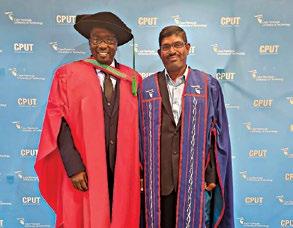
Dr Esmail with his supervisor Prof Krishnamurthy
Introduction by Prof James Odendaal FOCUS AREA 4 The Environment, Climate Change & Sustainability
odendaalj@cput.ac.za
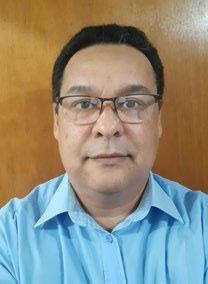
Our physical, cultural, social and economic lives are utterly dependent on a range of ecological resources. The natural world provides us with essential services for life, such as the purification of air and water, detoxification of waste, generation of healthy soil, pollination of crops, maintenance of biodiversity, and protection from the sun’s harmful ultraviolet rays. However, human-induced environmental problems now threaten both environmental and human health.
Human activities can result in a host of consequences for the environment. These include environmental waste and pollution, loss of biodiversity, deforestation, land-use change, and the irreversible conversion of landscapes and their ecological functions. This also disrupts vital bio-geochemical cycles, the water cycle, and groundwater recharge, while contributing to ocean acidification and changes in the chemical composition of the atmosphere. This in turn leads to long-term shifts in weather and temperature patterns, commonly known as climate change, which are a direct result of human-induced emissions and environmental damage.
Human-induced climate change is one of the most disastrous consequences of excessive exploitation of the
environment by humans. The availability of acceptable levels of water in South Africa, in terms of quantity and quality, may be affected by climate change into the future. Our ability to produce food for the people of the country through agricultural activities may also be impaired. Climate change may further increase the pressures on already stressed ecosystems and contribute to the loss of biodiversity. This loss refers to the decline or disappearance of species from an ecosystem, and it severely weakens the environment’s ability to provide the essential services that humans and other creatures depend on for survival.
There is an urgent need for continued and sustained research to provide high-quality data. These data are essential for assisting government in creating appropriate policies and implementation strategies to mitigate the effects of climate change and environmental degradation. As much as we need development to improve the lives of all humans, we also require a healthy environment to ensure the very existence of life on this planet.
There is an urgent need for research, development, and innovation to achieve the Sustainable Development Goals (SDGs) set out by the United Nations in 2015. Many research projects conducted by our staff members and students align
with the following SDGs:
• SDG 6: Clean Water and Sanitation
• SDG 11: Sustainable Cities and Communities
• SDG 12: Responsible Consumption and Production
• SDG 13: Climate Action
• SDG 14: Life Below Water
• SDG 15: Life on Land
A major objective of the Environment, Climate Change and Sustainability Research Focus Area (RFA) is to contribute to achieving the SDGs through research, innovation, teaching and learning, as well as community engagement. The RFA currently consists of three research niche areas:
1) Climate Change & Sustainable Development
2) Climate Change & Sustainable Environment
3) Cyclical Economy & Design for Sustainability
Our research projects cover a wide range of topics, including groundwater management under climate variability, governance and economics of water and sanitation, environmental pollution and toxicology, environmental chemistry, conservation of biodiversity, and the environmental impacts of microplastics.
SATREPS R60 million project takes shape
Excitement was palpable as guests watched carbon dioxide being captured and transformed into solid white materials using a pilot plant at SARETEC in Bellville. This demonstration formed part of the official launch and handover of analytical equipment and the pilot plant for the SATREPS project, attended by Prof Chris Nhlapo and Mr Okada Kaoru of the Japan International Cooperation Agency (JICA), SA Office. Prof Nhlapo and Mr Kaoru signed the handover certificate, formally committing CPUT to securing and appropriately using the equipment. The launch in March followed a Joint Coordination Committee meeting, where project progress and yearly plans were reviewed.
The Science and Technology Research Partnerships for Sustainable Development (SATREPS) is a Japanese government programme that promotes international joint research. It is a collaboration between the Japan Science and Technology Agency (JST), JICA and South Africa’s Department of Science and Innovation (DSI). The project aims to address challenges such as global warming, natural disasters, and bio-resource management, with practical solutions to benefit both countries.
With R60 million in funding – and an additional R5 million from the DSI for running costs – the project is managed by Principal Investigator Prof Tunde Ojumu. He reported growing interest
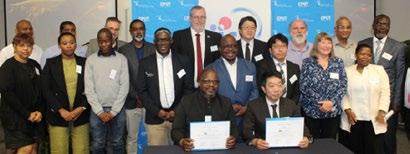
from industry and praised the support received from CPUT management, the Japanese government, and his academic collaborators. The pilot plant is capable of handling carbonation reactions up to one cubic metre in volume, with roadshows planned for later in the year to demonstrate carbon capture potential at selected industrial sites.
Mr Okada reaffirmed the project’s purpose: to develop carbon recycling systems, particularly for reducing CO2 emissions from the cement industry, and advancing mineral carbonation technologies. The project team includes researchers from CPUT, UWC, UCT, the Council for Geoscience, and several Japanese institutions including Tohoku University and SDIs.
Prof Nhlapo acknowledged the commitment of the South African and Japanese teams, saying: “It’s quite a long road that we have
traversed, and I must say I am very proud of the two teams... I would be remiss if I didn’t acknowledge the role played by Prof Leslie Petrik from UWC and Prof Jochen Petersen from UCT.”
Prof Ojumu highlighted the project’s training potential, “Our project addresses several Sustainable Development Goals. While developing this technology, we’re training students at master’s and doctoral levels –locally and in Japan.” Mr Okada thanked CPUT for safeguarding the equipment and pilot plant, and expressed confidence in the researchers’ commitment to achieving tangible results. Minister at the Embassy of Japan in SA, Atsushi Kuwabara, praised the initiative, adding, “Japan and South Africa have strong ties in science and technology, and I hope this project will significantly enhance research capabilities and impact global climate change efforts.”
Researchers from CPUT, UWC, UCT, the Council for Geoscience, and several Japanese institutions
Inaugural Food Security Colloquium highlights student needs ‘One residence, one garden’ project celebrated
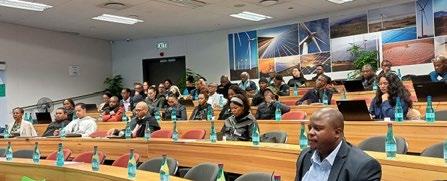
The inaugural Food Security Colloquium in May signalled CPUT’s ongoing commitment to supporting students and addressing hunger on campus. Hosted by the Division of Student Affairs (DSA) and the Centre for Diversity, Inclusivity and Social Change (CDISC), the event centred on the theme ‘Adopting an institutional approach to food security’. Dean of Student Affairs, Ms Nonkosi Tyolwana, called for a multidisciplinary approach to address hunger, noting that research often falls short on solutions. The event aimed to gather immediate, short- and long-term interventions from the CPUT community, and to explore holistic integration of food security strategies.
She cited a HEMIS study indicating that over 60% of CPUT students come from indigent families, with 976 current food requests. She commended the Institutional Transformation Forum, led by Prof Paul Green, for pioneering the university’s food security concept. The plan was approved by Mancom in 2020 and assigned to the DSA for implementation, with support from various internal partners. Prof Chris Nhlapo subsequently established the Institutional Food Security Committee, chaired by Prof Joseph Kioko, to develop a sustainable model.
In keynote addresses, Profs Green and Kioko highlighted the seriousness of student hunger. Prof Green encouraged formalising past initiatives like food gardens, and recommended food banks, voucher systems, and workshops. Prof Kioko tied food security to the UN’s SDGs and discussed plans including land acquisition near Wellington Campus and the purchase of a tractor. Panel and plenary sessions featured student experiences and current hunger relief efforts. Discussions concluded with a call for better coordination, a centralised initiative database, and a structured forum to drive future work.
From leafy spinach to vine-ripened beetroot, the Division of Student Affairs (DSA), in partnership with FAS, the Nautical Company and Convocation, celebrated the success of their joint Green Campus Initiative (GCI) project ‘One residence, one garden’ at the Catsville Residence in December. Earlier in 2024, Dr William Mapena (Chair of the Student Services Council Committee), Prof Gilingwe Mayende (DVC: OPS) and Ms Nonkosi Tyolwana (Dean of Student Affairs) planted the first seedlings at Catsville to mark Mandela Day and to honour President Nelson Mandela’s passion for ending hunger.
For Catsville resident Ms Nikhanye Sitoza, a Marine Engineering student, the project’s success has been a source of pride. She said she was pleased that the residence was chosen as the first case study in District Six for this initiative. “It’s shown that even in a residence with reputation issues, we can make a positive impact and create change.” The project received strong support from Dean of Student Affairs, Ms Nonkosi Tyolwana; Deputy Dean of Student Affairs, Mr Njabulo Maphumulo; residence coordinators; Convex; and FAS, who contributed resources whenever possible.
The initiative is described as a game-changer, fostering a sense of community and cooperation among Catsville residents. Residence Coordinator Mr Xolani Jafta emphasised that the project is significant for both the residence and CPUT, demonstrating a commitment to innovation, sustainability and community development, and providing a model for other residences and institutions to follow. Mr Jafta, a strong advocate of the project, encouraged the CPUT community to continue making a positive impact on the environment. He noted that the GCI project illustrates how small actions can accumulate to create meaningful change. “As a member of the GCI project, I’ve seen firsthand the impact that we can have when we work together towards a common goal. Let’s continue to strive for greatness and make CPUT a better place for everyone.”

Gathering interventions from the CPUT community and exploring holistic integration of food security strategies
Positively impacting sustainability and community development
CPUT joins international effort to tackle mercury emissions
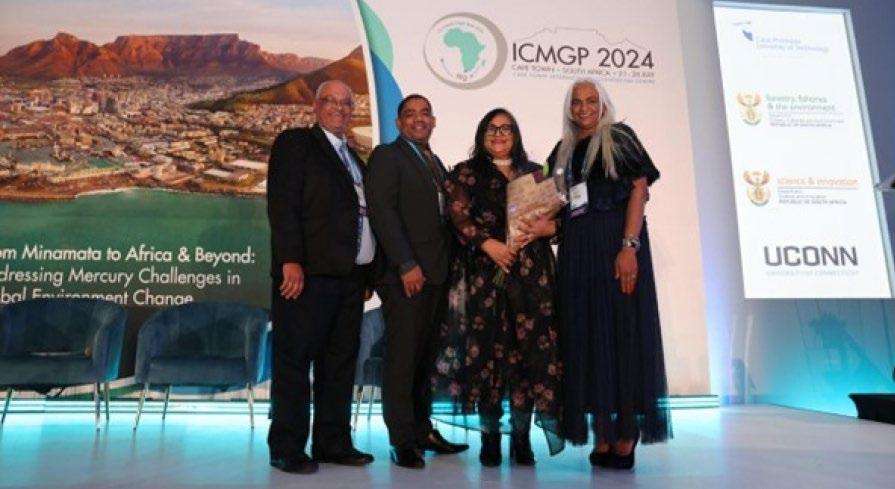
Scientists from across the world gathered in Cape Town in August for the International Conference on Mercury as a Global Pollutant (ICMGP 2024), hosted on the African continent for the first time. Proactive in its approach to environmental management, CPUT took part in the week-long event, which was held at the Cape Town International Convention Centre and managed by Scatterlings PCO (South Africa). Centred on the theme ‘From Minamata to Africa and beyond: Addressing mercury challenges in global environmental change’, the conference brought together experts to examine the
severe risks posed by mercury and other environmental pollutants to ecosystems and human health.
Prof Vernon Somerset, lecturer in the Chemistry Department, explained that mercury is recognised as a highly toxic heavy metal and a global pollutant due to its ability to travel long distances in the atmosphere. “Furthermore, mercury can also be deposited in aquatic and marine ecosystems and bioaccumulate in the aquatic nutrition chain,” he said. Prof Somerset noted that mercury has been
managed under the Minamata Convention since 2013, established to protect human health and the global environment. Together with the Basel, Rotterdam and Stockholm Conventions, the Minamata Convention forms part of a comprehensive international framework for the sound management of chemicals and waste. South Africa is a signatory to the Basel, Rotterdam and Stockholm Conventions and has ratified the Minamata Convention on Mercury.
Western Cape Minister of Local Government, Environmental Affairs and Development Planning, Mr Anton Bredell, said, “This conference will, among other critical issues, focus on how countries are implementing the Minamata Convention on Mercury.” At a provincial level, he emphasised the Western Cape Government’s commitment and proactive approach to environmental management.
Deputy Minister of Forestry, Fisheries and the Environment, Mr Narend Singh, outlined his department’s work on mercury-related issues to protect South Africans. He noted, “Due to South Africa’s primary reliance on coal for energy generation, there has been considerable international interest in the country’s mercury emissions.” Providing a global perspective, Executive Secretary of the Minamata Convention, Ms Monika Stankiewicz, reminded delegates that “it was science that lit the way for community members, photographers, communicators, and policymakers so that Minamata Disease became understood globally, a warning to all. Science that laid the groundwork for the Intergovernmental Negotiating Committee process that culminated in the Minamata Convention.”
The conference was co-chaired by Prof Somerset of CPUT; Dr Lynwill Martin, Senior Scientist at the South African Weather Services; and Dr Joy Leaner, Director of Air Quality Management in the Western Cape Government. The scientific programme featured 400 abstracts, 34 sessions, nine pre-conference workshops, 126 posters and nine special sessions. The next International Conference on Mercury as a Global Pollutant will take place in Hyderabad, India in October 2026.
Addressing mercury challenges in global environmental change
RESEARCH CHAIR
OCEANS ECONOMY AND CENTRE FOR SUSTAINABLE OCEANS
(Faculty of Applied Sciences)
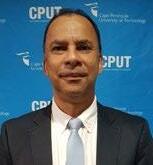
DR CONRAD
SPARKS (A cting )
sparksc@cput.ac.za
Introduction
Dr Sparks is the Acting Research Chair: Oceans Economy and Acting Director of the CPUT Centre for Sustainable Oceans (CSO). The chair and the centre focus on research that underpins regional and global advancements of oceans economies. The strategic attention is on the impacts and effects of plastics on ocean sustainability and economies.
The acting Research Chair focuses on the following objectives:
• Implement the Research Chair Strategy regarding ocean sustainability and economy, focusing on microplastics, plastic litter, and the accounting of plastics in South Africa
• Initiate and maintain research partnerships within CPUT, as well as nationally and internationally
• Supervise postgraduate students
• Engage with marine sectors regarding capacity building and knowledge sharing.
Partnership development
CPUT engagements
• The CSO is collaborating with the Department of Conservation & Marine Sciences, supervising various Marine Science students
• ‘Ecotoxicological impacts of microplastics on marine organisms’, in collaboration with AMHBI
• ‘Microplastic and dioxin content of mussels (Mytilus galloprovincialis and Choromytilus meridionalis) from marine aquaculture systems in Saldanha Bay’, with collaborator Prof Maretha Opperman – an LIMAQUA NRF-funded project
• ‘Reducing the impact of microplastics release from fabrics through finishing, filtration systems and the impact on marine invertebrates and climate’, in collaboration with the Department of Clothing & Textile Technology
• ‘Top surface sea plastic waste detection using satellite images and AI segmentation tools’, in
collaboration with F’SATI
• The CSO participated in the Institutional Industry Forum in June, at the Cape Town Hotel School, Granger Bay Campus
• The centre hosted a visit by Ms Tamzyn Botha, an award-winning artist and environmental advocate, who showcased plastic waste collected from coastal areas, highlighting the pervasive issue of plastic pollution and its impact on marine and coastal ecosystems
• Fifteen students from CPUT, funded by FEDRATI, presented their research at the FEDRATI Research Uptake Seminar held at CPUT’s Bellville Campus in November – the event was supported by SIP
Local and national engagements
• A Strategic Partnership Agreement with the Fisheries Economic Development Research, Advisory and Training Institute (FEDRATI, an industry funded NPO) to fund student bursaries to the value of R900 000
• Development of a Plastics Account for South Africa, in collaboration with NMMU regarding the NRF Ocean Accounts Community of Practice
• Dr Sparks is the Chair of SAIMI’s Fisheries Skills Expert Group
• Emerging Researcher Seminar was hosted by South African International Maritime Institute (SAIMI) at NMMU in March; Dr Sparks was invited
to present a keynote address and master’s student, Ms Rodashia Basson presented her research on behavioural responses of cape fur seals
• Two Oceans Aquarium Student Presentations Day Seminar was held in July; Dr Sparks was invited to give a keynote address to students, academics and industry partners
• NMMU Research Week took place in September; SAIMI held a Research Symposium at the Oceans Sciences Campus, as part of this event; Dr Sparks was invited to present a plenary talk on research being done at the CSO
International engagements
• As a partner of the Nairobi Convention, Dr Sparks attended the Nairobi Convention Focal Points and Partners Meeting in Durban in March
• Supported by SAIMI, Dr Sparks visited the Norwegian University of Science and Technology (NTNU), Trondheim, Norway in June, in order to develop research capacity in conducting research on the ecotoxicological effects of microplastics on marine organisms
• Dr Sparks attended the Nairobi Convention Conference of Parties (COP11) in August, in Antananarivo, Madagascar
• West Africa Marine Litter Training Programme at the University of Cape Coast took place in October in Ghana; the Centre for Coastal
Management organised the training programme on marine litter monitoring and assessment, socio-economic and behavioural research; Dr Sparks was invited to write training material and present the section on coastal litter and microplastics monitoring
• Dr Sparks attended the Global Plastics Treaty Meeting in November, Busan, Republic of Korea
• In collaboration with the Federal University of Technology Akure (FUTA), Nigeria, the CSO measured and analysed the characteristics of microplastics in beverages sold in retailers in Cape Town
Postgraduate graduations
• Ms Rodashia Basson received her Master in Conservation Sciences degree. Her topic was ‘The impacts of swim with seal tourism within marine protected areas’, with supervisor Dr Sparks and co-supervisor Dr Findlay.
• Ms Nicole du Plessis received her Master in Conservation Sciences degree. Her topic was ‘Exploring the ‘Oceans Economies’ of Western Indian Ocean Coastal States’, with supervisor Dr Sparks and co-supervisor Dr Findlay.
Addressing socioeconomic issues and priorities
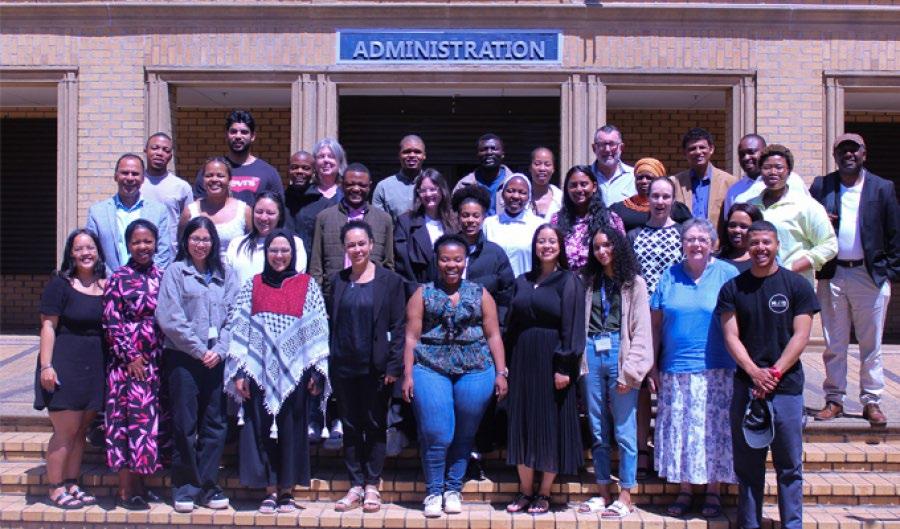
Research is a vital tool in transforming society, with the potential to improve and enrich people’s lives. With this in mind, the Directorate: SIP and the Centre for Sustainable Oceans (CSO) hosted the CPUT–FEDRATI Research Uptake Seminar in November, under the theme ‘Enhancing relevance and research impact’. The event took place on the Bellville Campus. Guests were welcomed by Dr Nelisiwe Maleka,
Manager: Research Uptake, and Prof Felix Nchu from the Department of Horticultural Sciences. Among those in attendance were Dr Nathalie Viljoen, Head of Research at the Two Oceans Aquarium Foundation, along with supervisors of the presenting students.
In his address, Dr Mark Botha, Executive Director of the Fisheries Economic Development Research Advisory and Training Institute
(FEDRATI), explained that the strategic partnership between FEDRATI and CPUT was established to strengthen collaboration between industry and academia. Around 15 bursary recipients, supported by the institute under the CSO, presented their research during the seminar.
Dr Maleka emphasised that, as an engaged institution, CPUT is committed to producing relevant and responsive research that addresses socioeconomic priorities and challenges. She noted that the seminar formed part of ‘Activity 4: Develop and facilitate activities and appropriate systems to promote and support research uptake’ under the UCDG Project 5 for Staff Development Research. The platform enabled postgraduate students to showcase their work, with the aim of embedding research uptake throughout the research cycle. It also encouraged emerging researchers to recognise the value and impact of research uptake.
Speaking on behalf of the CSO, Acting Director and Acting Chair of CPUT Research in Oceans Economy, Dr Conrad Sparks, said, “The CPUT partnership with FEDRATI exemplifies research engagement with communities. We have aligned our research and bursary allocations with FEDRATI. We plan to engage more closely with communities to share CPUT research and develop new projects based on the needs of Cape Town and the Western Cape.” Dr Sparks highlighted that the partnership benefits CPUT by providing student bursaries and fostering cross-disciplinary collaboration. FEDRATI, in turn, benefits from new knowledge on fisheries and related sectors in the Western Cape.
Dr Botha underlined the importance of interdisciplinary research in addressing developmental challenges within the fisheries sector. He noted that FEDRATI, supported by Brimstone Investment Corporation and Sea Harvest Corporation, provides financial assistance to CPUT students, thereby strengthening ties between industry and academia. This support, he added, enables students to articulate their research succinctly while contributing meaningfully to the maritime industry.
Strengthening collaboration between industry and academia
Research outputs
DHET-accredited peer-reviewed journal articles
• ‘Stormwater outlets: A source of microplastics in coastal zones of Cape Town, South Africa’, Marine Pollution Bulletin, 198, 115800 https://doi.org/10.1016/j. marpolbul.2023.115800
• ‘Microplastic concentrations and risk assessment in water, sediment and invertebrates from Simonstown, South Africa’, Heliyon, e28514 https://doi. org/10.1016/j.heliyon.2024.e28514
• ‘Microplastic pollution and risk assessment in surface water and sediments of the Zandvlei Catchment and estuary, Cape Town, South Africa’, Environmental Pollution, 342, 122987 https://doi.org/10.1016/j.envpol.2023.122987
• ‘Comparative review of remote sensing methods for ocean plastic litter detection’, IEEE Access, 12, 166126–166161 https://doi.org/10.1109/ ACCESS.2024.3494660
• ‘Monitoring plastic pollution using bioindicators: A global review and recommendations for marine environments’, Environmental Science: Advances https://doi.org/10.1039/D4VA00174E
• ‘A review of southern hemisphere humpback whaling by period and catch location’, Journal of Cetacean Research and Management, 25, 123-162 https://doi.org/10.47536/jcrm.v25i1.859
• ‘Migratory movement of photo-identified humpback whales Megaptera novaeangliae along the southeastern coast of Africa’, African Journal of Marine Science, 46(3), 191-203 https://doi-org.ezproxy.cput.ac.za/10.2989/1 814232X.2024.2380882
Policy briefs
• ‘Paint – A key source of microplastics to the environment: Fate, effects of microplastics in paints and mitigation strategies’, Working Paper, September https://ikhapp.org/news-and-event/working-papersdeveloped-by-members-ofthe-scientists-coalition/
• ‘Microfibres from textiles – A key source of microplastics to the environment: Fate, effects, and mitigation strategies’, Working Paper, September https:// ikhapp.org/news-andevent/working-papers-developed-by-members-of-thescientists-coalition/
• ‘Addressing microplastic pollution via the Global Plastic Treaty’, Zenodo https:// doi.org/10.5281/zenodo.13332873
Conference and keynote research presentations
• Dr Sparks presented ‘Concentration, characteristics and risk assessment of Microplastics in Rocky Shore Echinoderm species along the Western Cape coastline, South Africa’ at the SETAC Europe 34th Annual Conference in Seville, Spain
• Ms Aldea Easu (master’s student) presented ‘Abundance and characteristics of microplastics at Zandvlei Estuary, Cape Town, South Africa’ at the South African Society of Aquatic Scientists (SASAQs) joint SETAC Conference in Johannesburg
• Dr Sparks and Ms Mathabo Malange (doctorate student) presented various talks at the 5th Global Dialogue on Sustainable Ocean Development in Bali, Indonesia
• Dr Sparks was a session chair at the international MICRO 2024 Conference: Plastics Pollution, from Macro to Micro in Lanzerote, Spain
RESEARCH CHAIR
GOVERNANCE & ECONOMICS FOR WATER & SANITATION INSTITUTIONS (NRF SARCHI CHAIR) and the CENTRE FOR WATER & SANITATION RESEARCH (CWSR)
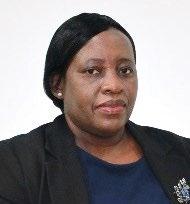
PROF BONGANI NCUBE
ncubeb@cput.ac.za
Introduction
CPUT was awarded the SARChI Research Chair in Governance & Economics for Water & Sanitation Sector Institutions after a competitive review process in 2021. The chair is hosted at the Centre for Water and Sanitation Research (CWSR). In 2024, Prof Bongani Ncube continued leading the Research Chair and implementing the Head of Centre responsibilities at the CWSR.
The CWSR was established in the early 2000s with a focus on:
- Identification and establishment of waterrelated activities based on regional and national priorities
- Facilitation and execution of interdisciplinary research projects which generate outputs, income and postgraduate opportunities
- Development and maintenance of partnerships on behalf of CPUT in the water sector regionally, nationally and internationally
SARChI Research Chair objectives
The SARChI Research Chair is funded by the DSI, the WRC and the NRF. The Research Chair focuses on seven main objectives:
- Development and implementation of the Research Chair strategy focusing on governance, financial and economic viability, and security for water sector institutions
- Establishment of research partnerships that advance the programme of the Research Chair
- Supervision of master’s and doctoral degrees
- Organisation and facilitation of seminars, colloquia and symposia
- Enhancement of staff research capacity for both the Research Chair and CWSR
- Development of intellectual and knowledge synergies with the host faculty and department
- Facilitation of sectoral knowledge transfer
In achieving the research objectives, the Research Chair explores factors such as the impact of extreme events, financial sustainability models, and economic regulation of the water and sanitation sector in terms of service delivery, pricing and tariff impacts. This also includes financial modelling, data science and benchmarking to improve municipal financial systems. The Research Chair is guided by frameworks and policies such as the UN’s SDGs 2030; the South African National Development Plan (NHP 2012); the Water Research, Development and Innovation Roadmap (RDI 2015–2025), and other prevailing national policies, legislation and strategies.
Highlights for 2024
The SARChI Research Chair hosted a seminar on ‘Extreme weather and climate in southern Africa: A risky future in November, in collaboration with UL. Prof Hector Chikoore presented on southern Africa’s increasing exposure to extreme weather patterns, including heatwaves, droughts, and cyclones, which threaten ecosystems, agriculture, and infrastructure.
Prof Ncube co-hosted a special session titled ‘Water governance for sustainable catchment management in South Africa – Challenges and opportunities’ at the 25th WaterNet/WARFSA/GWP-SA Symposium in November. The session was hosted in collaboration with UKZN, the WRC, the International Water Management Institute, and Inkomati-Usuthu Catchment Management Agency. The session focused on water governance at the catchment level, analysing the current challenges and opportunities, key regulatory instruments, and institutional arrangements. Practical implementation of water governance in South Africa was presented, including gaps in catchment-level water governance.
Prof Ncube and a team of researchers from the CWSR were invited to host a session at the South African Institute of Agricultural Engineers (SAIAE) and Pan African Society of Agricultural Engineering (PASAE) International Symposium in October. The session emphasised the vital link between water governance, infrastructure, and climate resilience for smallholder farmers.
The SARChI Research Chair hosted a seminar with CIRAD partners, Prof Damien Jourdain (South Africa) and Dr Aymeric Ricome (France), in April. The main objectives were to share research and discuss future collaborations.
The Second NRF/WRC Research Advisory Committee Meeting of the SARChI Chair on Governance and Economics for Water and Sanitation Sector Institutions was held in April. The committee was pleased with the progress the team was making.
The WRC-funded research project titled ‘Water governance, institutions, and infrastructure integration for climate-resilient pathways for smallholder farming
systems in the Western Cape, South Africa’ continued this year. The penultimate reference group meeting was held in June. Two technical project-linked reports were submitted in February and August.
New projects
Community of practice (CoP) in water governance and economics
The ‘CoP in water governance and economics’ project was approved by the NRF, with conditions, after a successful application led by Prof Ncube. Collaborating institutions include UCT, UP, UL, UKZN, the WRC, CIRAD, and the University of Waterloo. The CoP is valued at R7 000 000, and it will commence in 2025.
Governance and economics of non-sewered sanitation in South Africa
The WRC awarded a new project ‘Governance and economics of non-sewered sanitation in South Africa: Challenges and opportunities’ after a successful application by the project leader, Prof Ncube. The project is worth R1 000 000, and is a collaboration between the Department of Water and Sanitation, the Department of Basic Education, the South African Local Government Association, UKZN, the Development Bank of Southern Africa, and Bosch Holdings. It will commence in early 2025.
Partnership development
The Research Chair continued setting up and establishing new partnerships and finalising those that were started in 2023.
A partnership document was signed with UL. The collaboration will focus on joint proposals and research, student exchange and co-supervision activities.
A partnership was also signed with the Stellenbosch University Water Institute. The aims are collaborative research, technical and training cooperation, and facilitating capacity development cooperation between the two institutions.
Lastly, a partnership was signed with the University of Pretoria, focused on joint research, raising research funds, proposal writing, training, postgraduate cosupervision, and staff and student exchange.
Publications
DHET-accredited peer-reviewed journal articles
• ‘Effect of zeolite application on soil enzyme activity of potted sandy soil cultivated with Swiss chard and cabbage’, Eurasian Journal of Soil Science
• ‘Cooperation in common property resource management: A group engagement approach’, Journal of Psychology in Africa
Book chapters
The intersection of Agenda 2063 (Goal 11) and Sustainable Development Goal 6: Exploring the ‘harder’ obligations for wetland management strategies in selected African countries, in WIT Transactions on Ecology and the Environment
Technical reports
• Report on the performance of water governance
and institutional arrangements, WRC Project: ‘Performance of water governance and institutional arrangements for smallholder farmers in the Western Cape, South Africa’
• Report on climate-resilient pathways for water resource management and agricultural production, WRC Project: ‘Performance of water governance and institutional arrangements for smallholder farmers in the Western Cape, South Africa’
• Research was conducted on drought and access to agricultural water in the Western Cape for AgriProbe
Keynote and plenary addresses, panels, special sessions
• Special session convenor and chair: ‘Water governance for sustainable catchment management in South Africa: Challenges and opportunities’, 25th WaterNet/WARFSA/GWP-SA Symposium, Maseru, Lesotho
• Panellist: ‘Skills for a water-wise future – Blending innovation with indigenous wisdom’, EWSETA (virtual)
• Session keynote: ‘The Environment, Climate Change & Sustainability – Focus Area 4’, CPUT Research Festival, Cape Town
• Keynote speaker: ‘Challenges and opportunities in water and sanitation in Africa’, 3rd Southeast Regional Water Conference, NWRCBNet, Akwa, Nigeria
• Seminar presentation: ‘Role of community involvement in addressing the challenges of the water, agriculture and climate change nexus’, SLU Global Seminar, Swedish University of Agricultural Sciences (virtual)
• Workshop convenor: ‘Fresh and marine water management for food security and water
democracy in the context of climate change and regional policy in South Africa and Sweden’, SASUF Research & Innovation Week and Sustainability Forum, Lund and Malmö, Sweden
• Panel speaker: ‘Digital transformation of agriculture in Africa’, Centre for African Leaders in Agriculture (CALA) (virtual)
• Conference co-convenor, facilitator and session chair: Interdisciplinary Conference on Drought Resilience and Governance in the Southern African Region, Johannesburg
• Panellist: ‘Key challenges in policy and regulatory environment’, SASTEP WRC NGS School Sanitation Colloquium, Pretoria
• Plenary speaker: ‘Water and sanitation in South Africa – Challenges and opportunities’, International Conference on Water in Africa (ICWA), Nsukka, Nigeria
Conferences and presentations
• ‘Water quality deterioration and treatment cost implications of land use activities in the Overberg water supply system, South Africa’, 25th WaterNet/WARFSA/GWP-SA Symposium, Maseru, Lesotho
• ‘Public perceptions and impacts of equity in water pricing in South Africa: A case of low-income households and irrigating farmers’, 25th WaterNet/ WARFSA/GWP-SA Symposium, Maseru, Lesotho
• ‘The role of water governance in smallholder farming systems in the Western Cape’, 25th WaterNet/WARFSA/GWP-SA Symposium, Maseru, Lesotho
• ‘Water access conflicts among smallholder farmers in historical towns in the Western Cape, South Africa’, 25th WaterNet/WARFSA/GWP-SA Symposium, Maseru, Lesotho
Experts advocate for regional cooperation in water governance
Advancing sustainable water management in southern Africa
The SARChI Research Chair in Governance and Economics for Water and Sanitation Sector Institutions, Prof Bongani Ncube, led a team of students and staff from the Centre for Water and Sanitation Research (CWSR) at the 25th WaterNet/WARSFA/GWP-SA Symposium, held from 30 October to 1 November 2024 at the Avani Maseru Hotel in Maseru, Lesotho. Organised by the National University of Lesotho and WaterNet, the symposium was themed ‘Enhancing sustainability: Upscaling innovations and best practices for integrated catchment water resource management (ICWRM) in eastern and southern Africa – Leaving no one behind’. The event brought together over 200 experts, policymakers and advocates dedicated to promoting sustainable water management across the region.
CPUT research contributions
The CWSR team made significant contributions to the discussions, sharing insights into water governance and sustainable water resource management in South Africa. Dr Evans Shoko, a postdoctoral fellow, presented a paper titled, ‘Water access conflicts among smallholder farmers in historical towns in the Western Cape, South Africa’. This study, presented under the theme ‘Water governance for sustainable, equitable, and affordable water services’, examined the socio-political factors that influence water access, proposing equitable solutions to enhance governance in local water distribution.
Mr Kudzai Mugejo, a PhD candidate, shared insights from his ongoing research, ‘The role of water governance in smallholder farming systems in the Western Cape’. His work focuses on developing adaptive strategies to help smallholder farmers manage water scarcity in response to climate change, ultimately supporting regional water resilience. Ms Refiloe Maphiri, also a PhD candidate, presented her PhD proposal titled, ‘Raw water quality deterioration and treatment cost implications of land use activities in the Overberg water supply system, South Africa’. Her research aims to inform cost-effective treatment practices by focusing on pollution sources in the Sonderend River, thereby improving water quality in the Overberg Water Supply System.
Special session on water governance
Prof Ncube chaired a special session on ‘Water governance for sustainable catchment management in South Africa: challenges and opportunities’. Co-convened by CPUT and several key partners, this session explored the complexities of catchment-level water governance in South Africa. Over 30 participants attended, including the Board Chairperson of the Water Research Commission (WRC).
Presentations from experts at the session included Mr John Dini (WRC), who discussed regulatory frameworks and institutional challenges for catchment management. Dr Tendai Sawunyama (Inkomati-Usuthu Catchment Management Agency) explored opportunities in local water governance and called for a review of funding
models. Dr Barbara Van Koppen (International Water Management Institute) highlighted the overlap between statutory and customary water governance, arguing for the recognition of customary laws. Professor Maxwell Mudhara (UKZN) explored formal and informal governance challenges within small irrigation schemes, while Ms Virginia Molose (WRC) presented on the Giyani Local Scale Climate Resilience Programme.
The closing remarks were delivered by Prof Larry Swatuk from the University of Waterloo, Canada. He advocated for regional cooperation in water governance, called for training future water managers through WaterNet, and encouraged the creation of water research organisations similar to South Africa’s Water Research Commission across Africa.
In conclusion
The contributions of the SARChI Research Chair and CWSR team, along with the regional and international expert insights, underscore the necessity of collaborative and evidence-based solutions for advancing water security. The symposium left participants inspired and ready to tackle future water challenges, confident that ongoing research and partnerships will foster a more resilient and sustainable water future for the region.
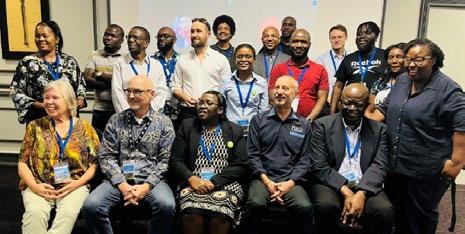
Presenters (seated) and some of the participants of the special session led by Prof Ncube at the 25th WaterNet/WARSFA/GWP-SA Symposium
• ‘Water governance and infrastructure integration for climate change adaptation for smallholder farmers in the Western Cape, South Africa’, South African Institute of Agricultural Engineers and 6th Pan African Society for Agricultural Engineering International Symposium, Grabouw
• ‘The status of agricultural water infrastructure in smallholder farming systems in the Overberg District, Western Cape’, South African Institute of Agricultural Engineers and 6th Pan African Society for Agricultural Engineering International Symposium, Grabouw
• ‘Water availability and infrastructural management in the Goedverwacht settlement, West Coast District, South Africa’, South African Institute of Agricultural Engineers and 6th Pan African Society for Agricultural Engineering International Symposium, Grabouw
• ‘Understanding the effects of climate change on agricultural production in smallholder farms in the Overberg District, Western Cape’, South African Institute of Agricultural Engineers and 6th Pan African Society for Agricultural Engineering International Symposium, Grabouw
• ‘Future casting climate-resilient strategies for water resource management and agricultural production for smallholder farmers in the Western Cape, South Africa’, South African Institute of Agricultural Engineers and 6th Pan African Society for Agricultural Engineering International Symposium, Grabouw
• ‘Availability and performance of water infrastructure in smallholder farming systems in Western Cape, South Africa’, 8th U6+ International Conference: Research, Innovation and Technology for African Development, Cape Town
• ‘The impacts of climate change on smallholder farm productivity in the Overberg District Municipality, South Africa’, 8th U6+ International Conference: Research, Innovation and Technology for African Development, Cape Town
• ‘Smallholder farmers’ experiences during droughts in the Western Cape, South Africa’, Interdisciplinary Conference on Drought Resilience and Governance in the Southern African Region, Johannesburg
Postgraduate students
Mr Simphiwe Dube received his MEng: Civil Engineering. His thesis title was ‘Condition assessment of sewerage infrastructure in selected townships in Cape Town, South Africa’. Prof Ncube was his supervisor.
PhD student Mr Kudzai Mugejo was awarded the Vice-Chancellor’s Prestigious Achievers Award.
Through the SARChI Research Chair, the NRF awarded three master’s and five PhD scholarships that will commence in 2025.
FUNDING
New funding approved
IN10869/20000338 WRC Trav Claim Water
IN11471/ 20000338 C2022/2023-00845 Water
SARChI Chair SARChI Chair
RESEARCH OUTPUT
RESEARCH CENTRE
FLOW PROCESS & RHEOLOGY CENTRE (FPRC)
(Faculty of Engineering & the Built Environment)
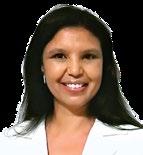
PROF VERUSCHA FESTER
festerv@cput.ac.za
The Flow Process & Rheology Centre (FPRC) was founded in 1995. The centre applies the fundamental principles and techniques of rheology to solve industrial problems such as deformation and flow under different shear, material structures and process flow conditions. Since its inception, FPRC has produced over 100 peer-reviewed publications.
The centre’s core activities include:
• Rheological characterisation and modelling of concentrated emulsions, suspensions, solutions and polymer melts and wastewater sludge, and modelling of the phenomena of micro- and nanostructural evaluation involved in the mixing, pumping, transportation and storage processes of multiphase systems
• Modelling non-Newtonian flows in pipes, fittings, open channels, tanks and pumps
• Instrumentation systems to measure in situ concentration and particle velocity in settling slurry and coarse particle flow, as well as visualisation in pipes and complex geometries
• Application of rheology in renewable energy processes
The core team members are Prof Veruscha Fester and Dr Nsenda Tshilumbu supported by postdoctoral fellows, master’s and doctoral students.
Highlights for 2024
FPRC is expanding its footprint to promote rheology at universities and in industries across Africa. This year, an MoU was signed with the University of Lubumbashi (UNILU) during a visit by their academic delegation. This collaboration is particularly significant as rheology is a research focus area at UNILU, where it is vital for manufacturing electric vehicle (EV) batteries. By ensuring the relevant skills are available in Africa, we are helping to build the continent’s future capacity. As part of this new partnership, the first cohort of five students was welcomed to the FPRC for training in electrolyte synthesis and rheology.
With over two decades of expertise in complex fluid characterisation, noninvasive pipeline diagnostics, and rheological innovation, the FPRC is now positioning itself to launch a multidisciplinary platform. This platform will empower Africa’s future through indigenous, industrial, and sustainable gel technologies.
The rheology laboratory continues to offer its services to companies such as Tetra Pak and the Sustainable Food Systems Development Research Centre at the University of the Free State.
Members of the centre attended the Southern African Society of Rheology (SASOR) and ThermSA Webinar on Thermal Analysis and Rheology, which was hosted online.
RESEARCH
GROUP
ENVIRONMENTAL CHEMISTRY, TOXICOLOGY & REMEDIATION
(Faculty of Applied Sciences)
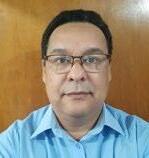
PROF JAMES ODENDAAL
odendaalj@cput.ac.za
The Environmental Chemistry, Toxicology and Remediation research group focuses on the chemical and biological assessment and monitoring of environmental pollution. It also develops remediation techniques to manage pollution, alongside conducting environmental and human health risk assessments.
Research projects span various academic disciplines, from environmental sciences to biology. Plants and animals are used as biomonitors to assess the effects of pollution on biota inhabiting diverse environments. Some student projects are based in aquatic ecosystems, investigating metal pollution and bioaccumulation in rivers and estuaries. Other projects focus on the effects of pollutants in soil environments.
Research highlights for 2024
A study that concluded this year examined the impact of urban pollution on an estuary in Cape Town. It focused on metal contamination in water and sediment, as well as bioaccumulation in algae. The project also identified point and non-point pollution sources affecting the estuary and their impact on local algal populations.
Another ongoing investigation is exploring historical changes in the pollution profile of a river system over several years. The aim is to assess the evolving influence of increasing anthropogenic activity in Cape Town on this river.
Two master’s students are examining the effects of illegal solid waste dumping in a nearby informal settlement, focusing on microbial and metal contamination in the soil. Soil contamination may render land unsuitable for food gardening and elevate health risks to local residents, particularly children.
Another project investigated historical trends of lead (Pb) contamination in soil along a major Cape Town highway. Since leaded petrol was banned in South Africa in 2006, one might expect Pb to be a less significant pollutant. However, due to its environmental persistence, it remains necessary to investigate long-term soil contamination to evaluate Pb’s continued relevance as a pollutant.
The research group aims to contribute to the body of scientific knowledge on a range of critical environmental concerns. The hope is that these research efforts will deepen our understanding of the impacts of human activity on natural ecosystems. Ultimately, through its research outputs, the group seeks to inform the development of environmental policy, legislation, and guidelines for South Africa.
RESEARCH UNIT
FUNCTIONAL MATERIAL RESEARCH UNIT (FMRU)
(Faculty of Engineering & the Built Environment)

DR MAHABUBUR CHOWDHURY
chowdhurym@cput. ac.za
The Functional Materials Research Unit (FMRU) was established this year within FEBE, evolving from the former Nanomaterials Research Group under the leadership of Assoc Prof Mahabubur Rahman Chowdhury.
FMRU focuses on developing functional materials for applications in health diagnostics, environmental monitoring, and renewable energy technologies. Its research covers metal oxide thin films, nanomaterials and sensor technologies, addressing challenges such as biomarker detection and gas sensing.
The unit promotes interdisciplinary collaboration, hosting postgraduate students, research associates, and postdoctoral fellows from diverse fields, including Chemical Engineering, Physics, Chemistry, Biomedical Engineering, and Environmental Science. FMRU also engages with industry partners to translate research into practical solutions with societal impact.

Aligned with CPUT’s Research, Technology and Innovation (RTI) Strategy, FMRU aims to drive innovation, develop sustainable technologies, and contribute to national and continental priorities in health, energy, and environmental sustainability. To find out more about the group, please scan the QR code below.

Research
that matters
FMRU focuses on developing innovative and sustainable technologies with real-world impact. Current research highlights include:
Biodegradable sensor substrates
We are developing eco-friendly, high-performance sensor platforms. These are designed to minimise electronic waste while enabling applications in health diagnostics and environmental monitoring.
Sustainable functional materials from indigenous plants
This research explores novel bio-resources from South African indigenous plants. The goal is to synthesise functional materials for electrochemical sensors and hybrid supercapacitors, supporting the development of low-cost and energy-efficient technologies.
Valorisation of spent coffee waste for photocatalytic applications
This project converts spent coffee waste, a widely available organic byproduct, into functional photocatalytic materials for environmental remediation. This demonstrates an innovative approach to waste valorisation and supports a circular economy by enabling the efficient degradation of waterborne pollutants.
SCAN ME
FOCUS AREA 5 Human, Health & Social Dynamics
Introduction by Prof Dirk Bester
besterd@cput.ac.za
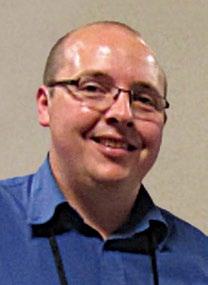
The Human, Health & Social Dynamics (HHSD) research and innovation focus area at CPUT intersects with the UN’s SDGs 1, 2, 3, 4, 5, 8, 10, 11, 16 and 17. These address an array of social, economic, health, political, legal, scientific and technological issues. They stimulate trans/multi/ interdisciplinary thinking to challenge South African researchers, industry and policy developers to answer existing questions and create new disciplines and develop new, relevant and applicable technologies.
This focus area contributes to greater global understanding and builds knowledge of shifting human, health and social dynamics. This supports trans/multi/interdisciplinary collaborative research, and responds to the needs of our South African society. Opportunities include the integration of strong theoretical and empirical links, enabling the following multidisciplinary research approaches to integrate personal, societal and environmental transformation in order to:
• Promote humanity and humaneness in the 21st century
• Create spaces where researchers collaborate and conduct research in a trans/multi/interdisciplinary manner across disciplines, faculties and units at CPUT
• Develop the capacity to deconstruct boundaries and interrogate the ways in which members of society may intersect with and reinforce one another
• Create a social and structural justice orientation which enables work towards a transformed society
In addition, and more specifically, the word ‘technology’ in our ‘One Smart CPUT’ brief provides us with a special focus on research into human, health and social dynamics. Technology necessarily entails a close relationship between the university and society, which includes working life and creating a sense of human-centredness. Technology enables this new description.
Human, health and social science research at a UoT would then, firstly, serve to problematise and improve the relationship between university curricula and practices and those of broader society, e.g., through integrated learning initiatives. Secondly, research can highlight how technology and new ideas may be taken up by society in different ways (i.e., accepted, changed, shelved or rejected), and how changes in human, health and social innovations can be harnessed for the benefit of society.
Potential research niche areas
• Connecting societies: Crossing boundaries, inside and outside the university, developing and bridging people for wellbeing and social cohesion
- Sustainable Development Goals: 1, 3, 4, 5, 8, 10, 16 and 17
- National Development Plan chapters: 8, 9, 10, 12, 13 and 15
• Empowerment: Purposive agency, care and the ethics of care, services and practices, transformation and 21st century innovations such as the 4th Industrial Revolution
- Sustainable Development Goals: 1, 3, 4, 5, 8, 10, 16 and 17
- National Development Plan chapters: 8, 9, 10, 11, 12, 13 and 15
• Human Rights: Freedom, health, equality, dignity, Ubuntu, access to service and justice, and ethics
- Sustainable Development Goals: 1, 2, 3, 4, 5, 8, 10, 11, 16 and 17
- National Development Plan chapters: 7, 8, 9, 10, 11, 12, 13 and 15
• Health and Well-being: Quality of life, wellness in communities, service delivery, social determinants of health, food security, technology for well-being
- Sustainable Development Goals: 1, 2, 3, 4, 5, 8, 10, 11, 16 and 17
- National Development Plan chapters: 7, 8, 9, 10, 11, 12, 13 and 15
The Division of Student Affairs (DSA) concluded Africa Month with a vibrant celebration at the Granger Bay Campus, showcasing African artefacts. Guests donned diverse traditional attire and shared the significance of Africa Day. The DSA event, held in June, aimed to honour Africa Day and reaffirm CPUT’s Vision 2030 commitment to promoting ‘oneness and smartness’.
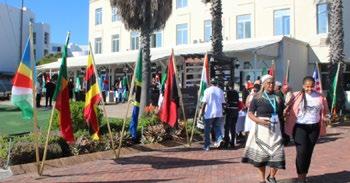
Mr Njabulo Maphumulo, Deputy Dean of Student Affairs, said, “In our quest to partner with relevant stakeholders to strengthen relationships between local and international students, Africa Day provided a platform to discuss continental issues through conversations, exhibitions, and opportunities that benefit students and staff.”
The outdoor festivities featured a marimba band, traditional African dance groups, craft stalls, and exhibitions from various African countries. A screening of Preserving Khwe/Xam Heritage offered creative expression. In his opening address, Prof Chris Nhlapo remarked that Africa Day is an exciting annual occasion where the institution joins others in celebrating the mother continent –its rich resources, remarkable beauty, and profound cultural diversity. “It’s an opportunity to reaffirm our commitment to work collectively with other institutions on the continent and promote responsible internationalisation.”
Prof Simphiwe Sesanti from UWC’s Faculty of Education addressed the audience on the importance of Africa Day in higher education. Representatives from the diplomatic community, including Zimbabwe, Mozambique, and Angola, also expressed support. The keynote address was delivered by the Honourable Mr Alvin Botes, Deputy Minister of International Relations and Cooperation, who emphasised the role of education, innovation, and culture in celebrating Africa Day.
Mr Alfonce Ngasirmoi (Kenya) and Ms Milka Bazeka (DRC) shared their personal experiences as students and staff in higher education. Reflecting on the event, Mr Maphumulo described it as a distinctive initiative that integrated the academic efforts of Cape Town Hotel School hospitality students, who showcased their culinary talents by preparing African cuisine throughout the day.
CPUT celebrates the mother continent
Celebrations on the Granger Bay Campus
CDISC hosts crucial conversation on inclusivity
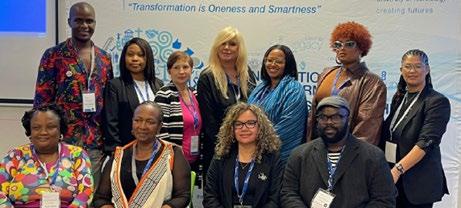
The Centre for Diversity, Inclusivity and Social Change (CDISC), in collaboration with the Institutional Gender-Based Violence Committee (IGBVC) and Pillar 6: Research and Information Management Systems, held the first Crucial Conversation of 2024 in May under the theme ‘Voices and spaces: Creating inclusive spaces’ (#RecognitionOfVoices). Held at SARETEC, the event welcomed organisations including Triangle Project, Gender Dynamix, the Commission for Gender Equality, NSP GBVF Localisation, Transgender Advocates, the Kinsey Institute, Indiana University, CPUT Queer Unicorns, the CPUT Student Representative Council, and various CPUT staff and students.
The gathering aimed to:
• Encourage open and respectful dialogue among diverse groups
• Ensure accessibility for all, including people with disabilities
• Address systemic barriers to full participation
• Promote inclusive space design through collaboration
• Foster belonging among CPUT’s diverse community
Stream Coordinator: Gender Equality, Diversity and Inclusivity, Mr Tumiso Mfisa, stressed the importance of holding the institution accountable for inclusive spaces, with measurable strategies in place. The event offered a holistic perspective on diversity and inclusion in higher education, drawing from both local and international contexts. Mr Mfisa encouraged attendees to carry the conversation into their own spheres. CDISC extended thanks to the wider CPUT community and international guests who joined in person and online via the CPUT YouTube channel.
Annual media mingle celebrates African innovation
Dr Candice Bailey, journalist, author, and proud CPUT alumna, was the guest speaker at the VC’s Media Mingle in the CPUT Business Lounge in November. The event drew journalists across the city, including Deputy Press Ombudsman Dr Tyrone August and former Ombudsman Ms Pippa Green. Dr Bailey coauthored We Were Always Here – Stories of Black Inventors across the African Diaspora, celebrating Africans’ pioneering inventions. The discussion focused on African innovation and inspiration in the ordinary. VC Prof Chris Nhlapo expressed pride in Dr Bailey’s connection to CPUT and praised her topic. He highlighted the institution’s numerous technologies and patents, announcing plans for a satellite mission next year. “We are really happy about where we are going as an institution,” Prof Nhlapo stated, commending the attendance of many CPUT alumni journalists.
Dr Bailey shared stories from the book, including Richard Turere’s Lion Lights System that protects livestock from lions. The book features 40 innovators who solved everyday problems. Reflecting on her journey since starting at the Cape Argus in 2003, Dr Bailey remarked, “I never thought that as a young brown girl from the gang-infested Kensington, I’d have the power to inform the narrative.” She expressed disbelief over being among the two percent of women in the country with PhDs and prompted the audience with, “How are you going to encourage black and brown girls and boys to find inspiration in the ordinary?”
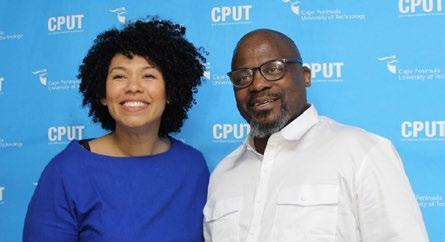
Voices and spaces: Creating inclusive spaces
Dr Candice Bailey and Prof Chris Nhlapo
Under the theme ‘DigitALL: Digital innovation and technology for gender equality’, CPUT hosted an Annual International Women’s Day celebration in March. The event was spearheaded by the Division of Student Affairs and the Centre for Diversity, Inclusivity & Social Change, in partnership with HERS-SA and FID.
VC Prof Chris Nhlapo opened the event, stating, “It’s a fact that women are grossly underrepresented in STEM fields in Sub-Saharan Africa. If we don’t change this, women will remain in low-paying and less impactful jobs and jobs likely to be replaced by technology. We need more girls in Africa in STEM.” Prof Driekie Hay-Swemmer, Executive Director: Office of the VC, reflected on women’s achievements and ongoing challenges. She noted, “This day reminds us of the remarkable progress women have made in various fields. The VC’s Prestigious Schools STEM Project plays a pivotal role in achieving Sustainable Development Goal 5: Gender Equality.”
SRC President, Ms Sinelizwi Notshikila, addressed the unique struggles faced by young black women in the digital landscape. “For centuries, women have fought against discrimination and inequality. While strides have been made, we must continue to advocate for those who still face systemic barriers.” The keynote speaker, Dr Kolosa Madikizela – a CPUT alumna and seasoned leader in construction and engineering –emphasised the importance of such days, noting, “Women were often not even on the bus, never mind at the back of it. If we take up the baton as pioneers and bring other women along, the fight can be won.”
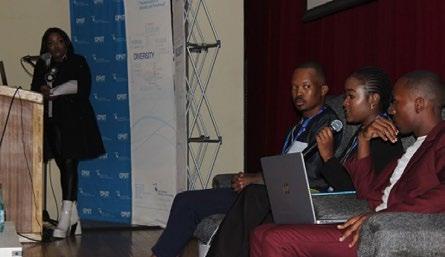
Additional speakers included: Prof Tembisa Ngqondi, Dean: FID, who spoke on ‘Bridging the gender-digital divide through mentoring and brightness’; Ms Brightness Mangolothi, Director: HERS-SA, who addressed ‘Coaching and mentoring as an integral part of young women’s development’; Ms Louise Banahene, the University of Leeds, whose presentation was titled ‘Student inclusivity: A case of Leeds University using a gendered lens’. There was also a panel discussion with Ms Thandekile Ndlovu (SRC), Mr Ayabonga Sawula (HeForShe ambassador), and Mr Tshitso Mosolodi (Snake Nation Africa).
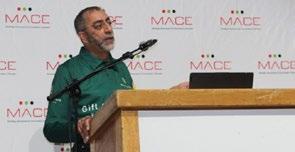
CPUT proudly hosted the 2024 Annual Marketing, Advancement and Communication in Education (MACE) Conference on the Bellville Campus in November. Themed ‘Maximising impact: Innovative strategies for transformative higher education marketing, communication and advancement’, the two-day event attracted nearly 300 delegates from higher education institutions across South Africa.
In his official welcome, delivered via video, VC Prof Chris Nhlapo emphasised the critical role of marketing, communication, and advancement professionals. “You have a critical role to ensure that higher education remains relevant. We can never be ignorant of the changing environment around us. I challenge you to find the synergies in this room to ensure that most students are served appropriately while also maintaining the quality of the offerings at international standards.”
The keynote address was delivered by Dr Imtiaz Sooliman, founder of the NGO Gift of the Givers Foundation. Speaking on ‘Making education relevant in building south Africa together’, Dr Sooliman noted that the country is in decline in terms of ethics, compassion, professionalism, kindness and care. He stressed the need for universities to teach relevant, impactful subjects with clear career pathways, thereby improving graduates’ job prospects.
CPUT hosts annual MACE Conference
CPUT celebrates International Women’s Day
Dr Imtiaz Sooliman, founder of Gift of the Givers Foundation
DigitALL: Digital innovation and technology for gender equality’ IN THE NEWS
Community Connectors engage with community library
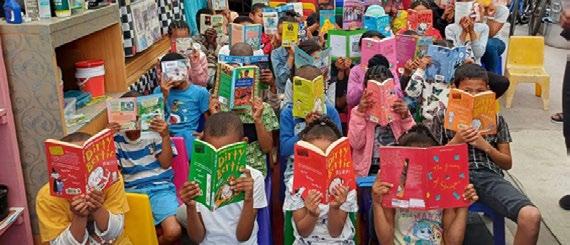
The Community Engagement Student Academy (CESA) project team, known as the Community Connectors, visited the Siyafunda Community Library in Lavender Hill in November. The academy enables student groups to design programmes and activities that engage community organisations, aligning with CPUT’s Vision 2030 and fostering meaningful partnerships.
Excitement was clear among the Community Connectors as they prepared activities for local learners. Ms Jacqui Scheepers, Manager: CCEWIL, said, “What impressed me was that the students researched and rehearsed their stories, developed quizzes, and made props for their enactments. I continue to be inspired by communities who remain hopeful despite socioeconomic challenges.”
At the Siyafunda Library, students used storytelling and drama to promote literacy and knowledge. Community Engagement
Academy alumnus and CESA student assistant, Mr Sydney Hlongwane, fourth-year Project Management, reflected, “Saturday’s project was great. We performed skits, distributed books, and spent time with amazing kids. I was impressed by their curiosity and smart questions. They were eager to learn, and it made me happy to see them smile and have fun. These kids are talented and are going to do great things.”
Ms Scheepers added, “The Service-Learning and Civic Engagement Units (SLCE) will strive to positively impact communities through the dedication of CESA leaders and alumni.” She also commended CPUT Libraries for their generous book donations. Mr David Haarhoff, also of SLCE, remarked, “As a university, we have a corporate social responsibility to bring hope to these situations. We want to inspire children to rise above their circumstances and believe in a successful life.”
CPUT strengthens ties with Wellington communities
In a bid to reinforce CPUT’s presence, contribution and impact in Wellington and its surrounding areas, the Wellington Campus established an Advisory Committee in April, comprising strategic stakeholders and community leaders. Chaired by VC Prof Chris Nhlapo, the committee includes faculty deans (FAS, FBMS and Education), HoDs and senior campus staff. Community members include representatives from local schools, the museum, the Breytenbach Centre, the agricultural sector, safety and security organisations, local government and residents. The committee’s purpose is to shape the campus’s future, expand its reach, improve its relevance and sustainability, and contribute to the safety of the wider Wellington community.
A highlight of the meeting was the official signing of a Service-Learning Agreement between CPUT and Drakenstein Correctional Services (DCS), which will pave the way for deeper collaboration. “This is still a work in progress, and we are learning as we go,” said Prof Hanlie Dippenaar, Assistant Dean in the Faculty of Education. The committee will meet twice a year, during the first and fourth terms. Prof Dippenaar reflected on how a seed was planted during the 2016 #FeesMustFall campaign, when Dr Chris Hattingh and Dr Ivan November approached DCS to provide exam facilities for Education students. This initial step has since evolved into exciting projects, including tutoring at Hawequa Correctional Facility and initiatives in human movement studies and literacy.
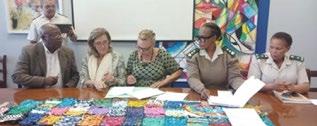
Community Connectors positively impacting young lives at the Siyafunda Community Library in Lavender Hill
Expanding Wellington Campus’s reach, improving its relevance and sustainability, and contributing to the safety of the wider community
CPUT and ASEZCo spark STEAM passion in Atlantis
In a collaborative initiative to promote Science, Technology, Engineering, Arts, and Mathematics (STEAM) among Atlantis youth, CPUT and the Atlantis Special Economic Zone Company (ASEZCo) hosted a certificate ceremony and competition at Saxonsea Secondary School in March.
About 40 Grade 8 learners from five local schools participated in the STEAM Project, which offered hands-on training in entry-level electronics, programming, robotics, physical computing, and artificial intelligence. The programme aimed to foster innovation, curiosity, and cross-disciplinary problemsolving through real-world application and a learn-by-doing approach. The final event featured a friendly robotics competition, with learners competing to become the STEAM champions of Atlantis.
ASEZCo Business Development Executive, Mr Jarrod Lyons, emphasised his company’s commitment to meaningful community impact, saying, “This change will come through an enabling ecosystem that prioritises skills and enterprise development.” Prof Driekie Hay-Swemmer, Executive Director: Office of the VC, commended the Advancement Department for their role in the project’s success and encouraged learners: “You’ve already proven you can do it. Don’t settle for less. CPUT is proud of you and will follow your journey with interest.” Prof Bennett Alexander, Deputy Dean: FID, introduced learners to career pathways in the IT industry, while Prof Andile Mji, Dean: Education, urged parents to support Maths and Science over Maths Literacy. Project beneficiary, Ms Chanelle September, expressed gratitude, “This has been an incredible experience. We’ve learned a lot from extraordinary people.”
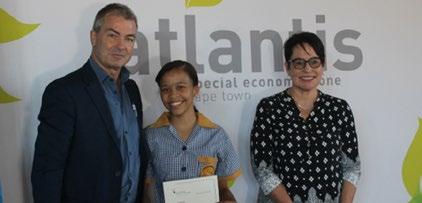
Three CPUT women finalists for prestigious awards
Three exceptional CPUT academics have been recognised as finalists in the 2024 HERS-SA Higher Education Women Leaders (HEWL) Awards. The awards celebrate South African women in higher education who inspire, motivate and lead others within and beyond their institutions, while also serving as role models and advancing gender transformation in the sector.
The three CPUT finalists
Prof Kareemah Najaar, senior lecturer in the Department of Emergency Medical Sciences, was nominated in the Women in STEM category. She leads a longrunning community project that assists Life Sciences matric learners from disadvantaged schools in preparing for their final examinations. The initiative, now in its sixth year, has grown into a service-learning project with FHWS and an inter-institutional collaboration with UWC’s Department of Medical Biosciences.
Dr Gunjan Gupta, senior lecturer in the Department of Electrical, Electronics and Computer Engineering and the French South African Institute of Technology (F’SATI), was nominated for the Emerging Young Women Leaders (Academic) Award. Dr Gupta has published extensively in accredited journals, peer-reviewed conference proceedings and book chapters. Her research focuses on LoRa Networks (reliability and accuracy), LPWAN technologies, IoT devices for air quality monitoring, LoRa in satellite communication (CubeSats), and satellite systems mission design. She is also investigating the integration of LoRaWAN and 5G for IoT, LoRa direct-to-satellite applications, and IoT ground stations.
Dr Ekaterina Rzyankina, lecturer in the Department of Maritime Studies, was also nominated for the Emerging Young Women Leaders (Academic) Award. Her research explores STEM education in engineering, with a focus on using digital technology to enhance student learning. Her work is grounded in Cultural Historical Activity Theory, which she applies to analyse and improve teaching practices.
The winners in eight categories were announced at the Awards Gala Dinner, held at the Two Oceans Aquarium in August. Recipients included women leaders from UP, Rhodes, UWC, NWU, UJ and TUT.
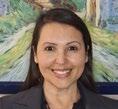
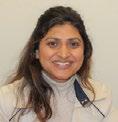
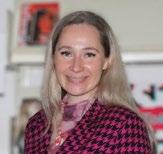

CPUT offers hands-on training in entry-level electronics, programming, robotics, physical computing and AI
RESEARCH CHAIR
TEACHER EDUCATION AND GLOBAL INSTITUTE FOR TEACHER EDUCATION AND SOCIETY (GITES) (NRF SARCHI CHAIR)
(Faculty of Education)
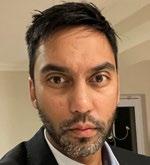
PROF ZAYD WAGHID
waghidz@cput.ac.za
Prof Zayd Waghid is the Interim Leader for the NRF’s SARChI Chair in Teacher Education, as well as Acting Director of the Global Institute for Teacher Education and Society (GITES). Prof Waghid is an NRF-rated researcher, a recipient of the CHE-Heltasa National Teaching Excellence Award (Commendation) and a Fulbright Alumnus.
GITES was officially established in 2023, following its successful approval by the Senate and the Council of CPUT. The institute aims to enhance teacher education and contribute to educational research and policy development. The institute is known for its interdisciplinary approach, addressing issues of social and cognitive justice in education.
The GITES research programme covers four research streams with supporting research projects:
• Quality teachers for equitable and quality education for all in South Africa
• Teacher experiences of continuing teacher professional development (CPD)
• The future of progressive education and social policy in South Africa
• Education interventions – Quality and equitable education for all
GITES focuses on generating knowledge about initial teacher education, continuous professional development, public–private partnerships, and teaching and learning during crises and disruptions.
The institute is invested in developing research capacity among emerging and established researchers in the faculty, and among postgraduate students, postdoctoral fellows and research fellows. The institute does this through workshops, writing retreats, monthly seminars and an annual symposium on teacher education. The institute comprises the research chair, postdoctoral fellows, research associates and other staff involved in research and supervising postgraduate students.
In its third phase, this SARChI chair builds on the innovative and relevant research agenda established during its first and second phases. The chair and institute continue to contribute to scholarships in teacher education nationally, regionally and globally. Its research programme encompasses the following key themes:
• Initial teacher education
• Continuing professional teacher development
• Teacher pedagogy study
• Public-private partnerships and teacher education Source
(NRF): SARChi Chairs 2 830 975
Redressing inequalities in education
CPUT proudly opened its doors for the Global Institute for Teacher Education and Society (GITES) Annual Symposium of Teaching for Social Justice. The theme of the symposium, held at the Cape Town Hotel School in July, was ‘Examining and envisioning education in SA from current inequalities to future equities: Addressing social justice and inclusivity in pursuit of a good society’.
Prof Zayd Waghid, acting Director: GITES, delivered the opening remarks at the conference, outlining the role of GITES. Prof Waghid reminded that this annual symposium started in 2023 with the intention of providing a platform “for experts in the field of social justice education to engage in discourse around the need to transform society through pragmatic and innovative ways at the micro, meso, and macro levels”. The yearly event aims to unite undergraduate and postgraduate students, in-service teachers, and government officials in a space that bridges theory and rigorous research with practice and policy.
Keynote speakers included Prof Jonathan Jansen (SU), Prof Thaddeus Metz (UP), and Dr Savo Heleta (DUT). Prof Jansen gave reasons why professors of education should not teach future teachers. “We are far removed from the routines of management and teaching in working-class schools.” Dr Heleta presented on ‘Eurocentric education under coloniality and neoliberalism: How to envision a socially just and decolonised education in South Africa?’. He remarked that decolonisation was not even a footnote. “Epistemic decolonisation became a buzzword in South African higher education (2015–2016), primarily due to student activism under the #RhodesMustFall and #FeesMustFall banners.” Prof Metz, a research professor of philosophy, addressed the topic of ‘Being excluded from knowledge for its own sake: An underappreciated injustice’.
Reflecting on the event, Dr Yohana William articulated the existing juncture where South Africa, like many other developing countries, “is still battling with redressing the existing inequalities in education for future equities and pursuit of a good society as the symposium theme suggests”.
Dr Andrew Wambua commented, “Education should reach the masses and should not be offered just for the sake of it... There is a need for critical pedagogy and decoloniality to resist neoliberalism, coloniality, and Eurocentric hegemony.” Dr Adedayo Theodorio elaborated, “Challenges such as the absence of justice, oppression, and dissociations in SA’s society remain a sickening root cause of inequality in the society and higher education. South African universities could consider collaborating with local universities instead of entirely collaborating with foreign universities.”
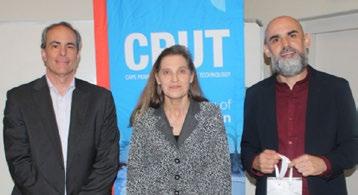
Prof Thaddeus Metz (UP), Dr Wendy Smidt (Postdoc fellow GITES) and Dr Savo Heleta (DUT)
RESEARCH CHAIR
WORK-INTEGRATED LEARNING IN TVET COLLEGES (ETDP SETA WIL CHAIR)
(Faculty of Education)

PROF NOTHEMBA
JOYCE NDUNA
ndunaj@cput.ac.za
ETDP SETA WIL Chair research activities during 2024
The focus of the WIL Research Chair in 2024 was to develop a mechanism for the ETDP SETA to facilitate the development of an improvement plan for the practice of five challenging WIL areas in TVET colleges. These areas that were identified through previous studies of the Research Chair as posing challenge in terms of practice, are:
• the preparation of students for workplace learning
• the placement of students in workplaces
• monitoring of students’ workplace learning
• assessment of students’ workplace learning
• building and maintenance of WIL partnerships
The WIL staff of ten South African TVET colleges, along with their associated workplace mentors, participated in action research, reflected on their practice across five challenging areas, and developed ten individual college action plans. These were consolidated into a single comprehensive action
plan intended for use across the entire TVET sector. Group meetings and workshops facilitated reflection, presentations, and group discussions.
The Participatory Action Research (PAR) cycle –comprising continuous planning, acting, observing, reflecting, and replanning – was used to produce the consolidated action plan. This was presented by the TVET colleges at the 2024 WIL Africa Conference, powered by the Southern African Society for Cooperative Education (SASCE) and hosted by CPUT in partnership with West Coast College. The implementation of the consolidated action plan, along with process evaluation research, is scheduled for 2025.
Findings and conclusions
The findings and conclusions derived from group discussions and presentations by staff from the ten TVET colleges revealed the following:
1. The involvement of TVET college staff in PAR motivated the colleges to actively participate in planning the improvement of WIL activities.
To enhance student preparation for workplace learning, the colleges recommended the introduction of structured and timetabled work-readiness programmes, making use of technology and simulated workplace environments.
To increase workplace learning opportunities, the colleges suggested encouraging SMMEs to host students – particularly in rural areas where host employers are limited – exploring alternative ways of providing students with WIL, determining the number of students to be placed each semester, and generating statistical reports on student placements. They also proposed securing additional funding and establishing new stakeholder partnerships.
To improve the monitoring of students’ workplace learning, the colleges emphasised the need to develop standardised monitoring tools, guidelines, and processes; to recognise workplace learning as ‘learning’ rather than ‘employment’; and to encourage more college staff to continuously monitor students during their workplace learning.
For the enhancement of WIL assessment practices, the colleges suggested identifying effective existing models for assessing workplace learning and developing standardised assessment tools and processes.
To build and maintain WIL partnerships effectively and efficiently, it was recommended that colleges hold regular stakeholder engagement meetings to discuss ways of integrating work practice with the learning outcomes of academic programmes. Additionally, they proposed establishing well-equipped Partnership Units to liaise with external partners, as well as setting up Advisory Boards to involve external stakeholders in advising on WIL curriculum matters.
2. The allocation of small research grants to the TVET colleges, along with formalised research partnership agreements signed by CPUT’s DVC: RTIP and the principals of the ten TVET colleges, helped facilitate the involvement of associated workplaces in the development of college action plans.
Annexure B of the MoA required each college to involve at least four workplaces. This requirement led to improved workplace participation in WIL research – an area previously identified as a challenge in earlier studies conducted by the Research Chair.
Highlights
• Majuba TVET College in KZN awarded CPUT a First Category certificate for forming research partnerships with TVET colleges.
• The ETDP SETA WIL Research Chair achieved all the deliverables and generated an amount of R22 000 through submitting CPUT invoices for four
tranche payments by the ETDP SETA during the 2024 project.
• An amount of R72 000 supported a master’s student in the Faculty of Education who was involved in the Research Chair activities, as per the requirements of the ETDP SETA.
• Another amount of R78 000 was used to support a PhD student in the Faculty of Education who is co-supervised by the Research Chair.
• An article on the 2024 research project was submitted to the International Journal of Learning, Teaching and Research for publication, as per the requirements of the ETDP SETA.
• CPUT staff conducted WIL research and capacity building workshops in TVET colleges. These staff members included WIL coordinators and academic staff of the Department of Teacher Professional Development which offers an Advanced Diploma for TVET college lecturers. Other participating WIL coordinators are in the departments of Civil Engineering, Construction Management and Quantity Surveying, and Operations Management in FMBS.
• The TVET Colleges expressed their interest in continuing to participate in Participatory Action Research until March 2026 to execute their consolidated action plan and reflect on the implementation process.
• The presentation of the TVET colleges at the 2024 WIL Africa Conference attracted the attention of an international guest speaker who is based in New Zealand and currently serving as the Chief Editor of the International Journal of Work-Integrated
Learning. International collaboration is being planned as the Research Chair was requested to serve as a member of the International WIL Research Committee which is chaired by the Chief Editor.
• Partnerships were also strengthened with SASCE as the ETDP SETA WIL Research Chair was nominated to serve as a Board member and lead the research and development strategic pillar of SASCE.
The 2024 research project put CPUT on the map, as a leader in the practice of and research in WIL.
Research uptake
As research has shown that the monitoring and assessment of students’ 18-month workplace learning is often left to the workplaces – and is viewed as ‘employment’ rather than ‘learning’ within the National Accredited Technical Education Diploma programmes of the TVET sector –WIL placements have been structured differently for the new occupational qualifications that are being phased in. Under the new model, students will spend some days in the workplace, return to their colleges to reflect, and then return to the workplace to apply their theoretical knowledge.
Research on student preparation for workplace learning has led to the development of structured work readiness programmes, referred to as Workplace Preparation, for the Quality Council for Trades and Occupations Occupational Qualifications within the TVET sector.
Plans are in place for the ETDP SETA to support the implementation of the consolidated action plan – developed through action research – by rolling it out to all 50 public TVET colleges in South Africa.
IN THE NEWS
CPUT researchers contribute to major global study
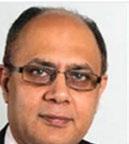
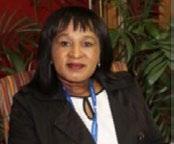

Three researchers from the SAMRC/CPUT Cardiometabolic Health Research Centre (CHRC) have contributed to a groundbreaking global study published in The Lancet in March 2024. The study is titled ‘Worldwide trends in underweight and obesity from 1990 to 2022: A pooled analysis of 3663 population-representative studies with 222 million children, adolescents, and adults’.
Adj Prof Tandi E Matsha, founder and co-director of SAMRC/CPUT/CHRC and former Dean of FHWS at CPUT; Adj Prof Rajiv T Erasmus, Emeritus Professor in Chemical Pathology at SU and Adjunct Professor with SAMRC/CPUT/CHRC; and Prof André Pascal Kengne, Director of the SAMRC’s Non-communicable Diseases Research Unit and collaborator with the SAMRC/CPUT/ CHRC, are among the approximately 1 500 scientists who contributed to the study.
Researchers analysed weight and height data from over 220 million individuals aged five years and older across more than 190 countries. Their findings revealed that while the prevalence of underweight has declined, obesity has surged dramatically. Among children and adolescents, obesity rates in 2022 were
four times higher than in 1990. Among adults, obesity more than doubled in women and nearly tripled in men. In total, the study estimates that 59 million children and adolescents and 879 million adults were living with obesity in 2022.
Further findings indicate that the proportion of children and adolescents affected by underweight declined by around one-fifth among girls and by more than one-third among boys. Among adults, the prevalence of underweight more than halved between 1990 and 2022.
Prof Glenda Davison, HoD: Biomedical Sciences and Interim SARChI Chair: SAMRC/CPUT/CHRC, expressed pride at being part of this collaborative achievement. “This type of collaboration, with world leaders, is a great achievement. The Lancet is a very high-impact journal and is recognised as one of the premier journals in medical and health science. What a fantastic achievement for our unit and for CPUT.”
The study was conducted by the NCD Risk Factor Collaboration (NCD-RisC) in partnership with the World Health Organisation (WHO).
Prof Rajiv Erasmus, Prof Tandi Matsha and Prof André Pascal Kengne
RESEARCH CHAIR
SOUTH AFRICAN MEDICAL RESEARCH COUNCIL/ CAPE PENINSULA UNIVERSITY OF TECHNOLOGY/ CARDIOMETABOLIC
HEALTH RESEARCH CENTRE (SAMRC/CPUT/CHRC)
(Faculty of Health
& Wellness Sciences)
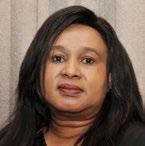
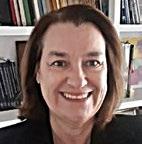
PROF TANDI MATSHA
Chair and Director
matshat@cput.ac.za
PROF GLENDA DAVISON
Interim Chair and Co-Director davisong@cput.ac.za
Non-communicable diseases, including cardiovascular disease and related disorders such as diabetes, hypertension, chronic kidney disease, and cancer, are rising rapidly across Africa and in South Africa. One explanation is the complex interaction between genetic, lifestyle, and environmental factors, which can lead to genetic and epigenetic changes. These changes contribute to chronic inflammation and endothelial dysfunction, which is considered an initiating event in cardiovascular disease. In many communities across the Western Cape, individuals remain undiagnosed and untreated, resulting in poor health outcomes, increased pressure on healthcare services, and reduced economic productivity.
To address this challenge, the SAMRC/CPUT
Cardiometabolic Health Research Centre is mandated to investigate the unique risk factors
driving the rapid increase in cardiovascular disease and to develop early biomarkers to identify individuals at risk. The centre has made significant contributions in this field, with findings that have the potential to enable earlier diagnosis and inform strategies to prevent the onset of cardiometabolic disorders and related complications.
This research is conducted through an integrated approach by a multidisciplinary team of researchers, postdoctoral fellows, and students. Four key focus areas have been identified: the influence of genetic and epigenetic mechanisms; the role of the oral microbiome and its interaction with the immune system; endothelial dysfunction; and the effects of environmental toxins, nutrients, and lifestyle factors. A central aim is to translate these findings into effective strategies for the prevention, early detection, and treatment of cardiovascular disease in South Africa.
The centre also makes a significant contribution to quality higher education by increasing the number of postgraduate students (MSc and PhD) and mentoring emerging academics. This extends to undergraduate medical laboratory science students as well as postgraduate students from other universities.
2024 Highlights
• In April 2024, the centre underwent a five-year review by the SAMRC. The audit was successful, resulting in the centre being elevated to full unit status and receiving an increase in funding.
• Staff and postdoctoral fellows, under the guidance of Dr Saarah Davids, organised and hosted an international point-of-care colloquium at the Cape Town Hotel School, Granger Bay. The event attracted industry professionals, academics, and key role players both locally and internationally.
• In collaboration with UCT, the centre organised a cell culture and miRNA training course. This initiative was funded through the NIH-D43 Fogarty grant, in which the centre’s co-director, Prof Glenda Davison, serves as a collaborator.
• Staff and postdoctoral fellows organised a community event at the Shiloh Centre of Learning. Under the leadership of Dr Shanel Raghubeer, staff, students, and postdoctoral fellows engaged with children on the importance of good nutrition and healthy lifestyle choices.
• Dr Yvonne Prince and Prof Glenda Davison helped raise public awareness of smoking and its impact on the oral biome by writing for The Conversation and participating in both radio and television interviews.
• Prof Tandi Matsha actively contributed to the Non-Communicable Disease Risk Collaboration (NCD-RisC) and the establishment of the Africa Group on Kidney Diseases, which informs global research and clinical practice.
• The centre hosted two students from the Western Norway University of Applied Sciences (HVL) in Bergen. Supervised by Dr Shanel Raghubeer, the students completed an honours-level project, including a thesis write-up for their bachelor’s degree.

Students and postdoctoral fellows
Post doctoral fellows
Four postdoctoral fellows were hosted during 2024. Three were funded by the SAMRC, and the fourth by the Nedbank/NRF SARChI Chair.
Dr Cecil Weale and Dr Dipuo Motshwari completed their fellowships in 2024 and have since secured employment. In addition, two postdoctoral fellows were awarded international research exchange fellowships. Dr Dipuo Motshwari received the IFCC Professional Scientific Exchange Programme (PSEP) award for a threemonth placement at the Department of Pathology and Laboratory Medicine, University of Ottawa, Ontario, hosted by Dr Ronald A Booth. Dr Ndonwi Elvis Ngwa was awarded the Coimbra Research Exchange Fellowship for two months and travelled to Charles University, First Faculty of Medicine, Prague, Czech Republic, where he was hosted by Prof Tomáš Zima and Dr Ivan Šebesta.
Staff and students at the Shiloh Centre of Learning
Master’s and doctoral students
One doctoral student graduated in April 2024. Fourteen MSc students were registered during the year. Three completed their projects, with two expected to graduate in April 2025 and one in December 2025.
BHSc fourth-year projects
Staff and postdoctoral fellows contributed to the supervision of fourth-year students, as well as teaching and facilitating workshops in biostatistics.
Publications and research outputs
The centre published 12 research articles and 5 conference proceedings this year.
Articles
• ‘General and abdominal adiposity and hypertension in eight world regions: A pooled analysis of 837 population-based studies with 7.5 million participants’, The Lancet, 404(10455)
• ‘The effect of cigarette smoking on the oral microbiota in a South African population using subgingival plaque samples’, Heliyon, 10(10)
• ‘A proposed simplified definition of metabolic syndrome in children and adolescents: A global perspective’, BMC Medicine, 22(1)
• ‘Utility of waist-to-height ratio, waist circumference and body mass index in predicting clustered cardiometabolic risk factors and subclinical vascular phenotypes in children and adolescents: A pooled analysis of individual
data from 14 countries’, Diabetes & Metabolic Syndrome: Clinical Research & Reviews, 18(5)
• ‘The protective role of resveratrol against high glucose-induced oxidative stress and apoptosis in HepG2 cells’, Food Science & Nutrition, 12(5)
• ‘Length of stay analysis of Covid-19 intensive care unit admissions using count regression and hurdle regression models: A study in a tertiary hospital, Cape Town, South Africa’, Translational Medicine Communications
• ‘Worldwide trends in underweight and obesity from 1990 to 2022: A pooled analysis of 3663 population-representative studies with 222 million children, adolescents, and adults’, The Lancet, 403(10431)
• ‘Resveratrol attenuates high glucose-induced inflammation and improves glucose metabolism in HepG2 cells’, Scientific Reports, 14(1)
• ‘Investigating the altered expression of miR-4865p and miR-novel-chr1_40444 in dysglycemia in a South African population’, Journal of Diabetes Investigation
• ‘Early recovery of natural killer cells post T-cell depleted allogeneic stem cell transplantation using alemtuzumab ‘in the bag’’, Transplant Immunology, 84
• ‘Dietary intake and nutrients adequacy among young adults with sickle cell disease in Ile-Ife, Southwest Nigeria’, African Journal of Biomedical Research, 27(1)
• ‘The influence of epigenetics and inflammation on cardiometabolic risks’, Seminars in Cell & Developmental Biology, 154
Conference proceedings
• ‘Do fructosamine-3-kinase genetic polymorphisms explain the discordance between HbA1c and other measures of glycaemia?’, Clinica Chimica Acta, 558
• ‘CRY2 (rs11605924) and G6PC2 (rs560887) single nucleotide polymorphisms increase the risk of type 2 diabetes mellitus in a mixed ancestry South African population’, Clinica Chimica Acta, 558
• ‘Resveratrol alters the expression of genes associated with oxidative stress and inflammation in a high glucose liver cell model’, Clinica Chimica Acta, 558
• ‘Assessing the use of body measurements to predict insulin resistance in a South African community’, Clinica Chimica Acta, 558
• ‘CRY2 (rs11605924) and G6PC2 (rs560887) single nucleotide polymorphisms increase risk of type 2 diabetes mellitus’, Biomedical Reports, 23(3)
Keynote, invited speaker and conference presentations
Staff and students were invited to present their work at several conferences which included the International Federation of Clinical Chemistry (IFCC) Congress in Dubai and the African Federation of Clinical Chemistry (AFCC) Congress in Cairo, Egypt.
• ‘Endothelial dysfunction and Type II diabetes’, AFCC Congress, Cairo
• ‘Exploring the diagnostic capabilities of altered miR486-5p and miR-novel-chr1_40444 expression patterns in distinguishing prediabetes and T2DM in South Africans’, AFCC Congress, Cairo
Senior lecturer receives prestigious grant
Senior lecturer in the Department of Biomedical Sciences, Dr Yvonne Prince, described it as an incredible honour to receive the prestigious Self-Initiated Research (SIR) Grant from the South African Medical Research Council (SAMRC) for her work on the oral microbiome. Dr Prince, a researcher with the SAMRC/CPUT Cardiometabolic Health Research Unit, said the grant not only recognised the value of her research but also provided vital support to advance scientific knowledge and improve health outcomes. She explained that the oral microbiome is the secondlargest microbial ecosystem after the gut microbiome, containing more than 700 species of micro-organisms. “Evidence has shown that any disruption in the diversity of the oral biome can be associated with inflammatory conditions such as periodontitis, diabetes, metabolic syndrome, and kidney disease.”
Dr Prince said the SIR grant would build on these findings by expanding the sample size and investigating other habitats within the oral cavity to validate them fully. A key aim is to enrol and mentor two candidates (PhD and MSc), who will join the unit’s postgraduate cohort. They will be trained in DNA and RNA isolation, as well as 16S RNA next-generation sequencing and bioinformatics – a scarce skill in South Africa. “CPUT offers several training courses on various aspects of research, so all students will graduate with the attributes to develop into independent researchers. In addition to training students, young emerging scientists and postdoctoral fellows are mentored in supervision skills,” she added.
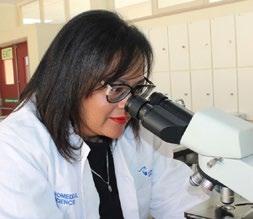
A collaboration has also been formed with the UWC Dental School to further the training of dental and biomedical postgraduate students. Dr Prince expressed her gratitude to the SAMRC, the SAMRC/CPUT Cardiometabolic Health Research Unit, and its directors Prof Tandi Matsha and Prof Glenda Davison, as well as the laboratory manager and research staff in the unit.
• ‘Apolipoprotein and low-density lipoprotein receptors in cardiovascular diseases and Alzheimer’s diseases: African evidence’, AFCC Congress, Cairo
• ‘Point of care in coagulation testing and monitoring’, 4th Point of Care International Colloquium, Cape Town
• ‘Do fructosamine-3-kinase genetic polymorphisms explain the discordance between HbA1c and other measures of glycaemia?’, IFCC WorldLab 2024 (26th International Congress of Clinical Chemistry and Laboratory Medicine), AFCC 2024 (17th Congress of Arab Federation of Clinical Biology), SSCC 2024 (10th Saudi Society for Clinical Chemistry Annual Meeting), 8th UAEGDA International Genetic Disorders Conference (UAE Genetic Diseases Association)
• ‘CRY2 (rs11605924) and G6PC2 (rs560887) single nucleotide polymorphisms increase the risk of Type 2 Diabetes Mellitus in a mixed ancestry South African population’, IFCC WorldLab 2024, AFCC 2024, SSCC 2024, 8th UAEGDA International Genetic Disorders Conference
• ‘Association between rs7903146, rs17817499, rs17782313, rs229616, rs1297034, rs699 and rs4646994 and cardiometabolic diseases in a Black South African population’, IFCC WorldLab 2024, AFCC 2024, SSCC 2024, 8th UAEGDA International Genetic Disorders Conference
• ‘Resveratrol alters the expression of genes associated with oxidative stress and inflammation in a high glucose liver cell model’, IFCC WorldLab 2024, AFCC 2024, SSCC 2024, 8th UAEGDA International Genetic Disorders Conference
• ‘Assessing the use of body measurements to predict insulin resistance in a South African community’, IFCC WorldLab 2024, AFCC 2024, SSCC 2024, 8th UAEGDA International Genetic Disorders Conference
• ‘Importance of ethics in PoCT’, 4th Point of Care International Colloquium, Cape Town
• ‘The role of PoCT in mitigating antimicrobial resistance’, 4th Point of Care International Colloquium, Cape Town
• Prof Rajiv Erasmus (Professor Emeritus at SU and NHLS, and an adjunct professor with the SAMRC/CPUT/CHRC) served as chairperson of a panel discussion at MedLab Africa 2024
Dr Yvonne Prince
Service on panels, committees and boards
Staff and students actively participate in national and international committees and bodies.
• Dr Raghubeer serves as the deputy chairperson of CPUT’s FHWS REC (NHREC: REC- 230408-014) and as a member of the CPUT Staff Quality Desk. She also serves as a corresponding member on the International Federation of Clinical Chemistry and Laboratory Medicine (IFCC) Committee on Evidence-based Laboratory Medicine (C-EBLM) and the IFCC Committee on Education in the Use of Biomarkers in Diabetes (C-EUBD). She is an Editorial Board member of the Electronic Journal of the IFCC (eJIFCC). She also serves as a review editor for Frontiers in Endocrinology
• Dr Saarah Davids serves on the faculty HDC, Faculty Research Innovation Committee and faculty REC.
• Prof Davison serves on the NRF basic health science ratings committee as well as serving as a section editor for The African Journal of Laboratory Medicine (AJLM) and The Journal of Medical Laboratory Science and Technology South Africa (JMLSTSA). She also serves on the Editorial Board of Journal of Public Health in Africa and on the Cellular Analysis and Flow Cytometry Subcommittee of the International Society of Laboratory Haematology.
• Dr Dipuo Motshwari was appointed as the president of the African Federation of Clinical Chemistry Young Scientist Committee.
• Dr Don Matshazi was appointed as the public relations officer of the African Federation of Clinical Chemistry Young Scientist Committee.
• Prof Tandi Matsha, Prof Glenda Davison, Prof Rajiv Erasmus, Dr Saarah Davids, Dr Don Matsha and Dr Shanel Raghubeer were selected to be part of the organising committee of the 4th POCT colloquium, hosted in Cape Town.
• Prof Rajiv Erasmus serves as a representative of the Executive Board of the African Federation of Clinical Chemistry and as an Executive Board Member of the International Federation of Clinical Chemistry and Laboratory Medicine (IFCC).
• Prof Rajiv Erasmus serves as Editor for The African Journal of Laboratory Medicine (AJLM).
FUNDING
YS-IFCC and YS-AFCC Travel
(Dubai, UAE)
PROFESSIONAL EDUCATION RESEARCH INSTITUTE (PERI) AND RESEARCH CHAIR: WORK-INTEGRATED LEARNING (WIL) (NRF SARCHI CHAIR)
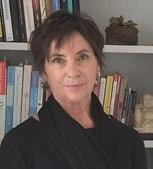
PROF CHRIS WINBERG
winbergc@cput.ac.za
The Professional Education Research Institute (PERI) and the South African Research Chair (SARChI) in WorkIntegrated Learning (WIL) maintained a productive research agenda throughout 2024. The key highlights of the year are briefly reported on below.
Funded projects
PERI members were actively engaged in several funded projects, including core SARChI WIL activities, a PhD in Engineering Education project, a TVET Evaluation project, and projects focusing on the ‘WILof-the-future’, ‘Change Laboratories’, and ‘WIL-CHAT’ collaborations. These projects involved a diverse range of CPUT researchers across the Faculty of Education, FEBE, FBMS, and FHWS, alongside numerous national and international partners.
Student supervision and graduation
PERI continues to foster postgraduate research, with master’s students successfully graduating under the supervision of the research chair. Students contributed to critical areas such as the WIL experiences for students with disabilities and TVET lecturer preparedness for industry. PERI colleagues also undertook a number of external PhD thesis examinations.
Capacity development
A programme of capacity development activities is a cornerstone of PERI’s work. This includes ongoing monthly PERI seminars and workshops, weekly writing groups, and specialised workshops on reviewing research literature, systematic reviews, writing retreats, and writing for publication. These
RESEARCH INSTITUTE
initiatives address the needs of PERI researchers, postgraduates, and academic staff across CPUT, as well as international WIL researchers through collaborations such as the South Africa–Sweden University Forum (SASUF).
Conference engagements
The research group maintained a strong presence at both national and international conferences, presenting at the WACE International Research Symposium, the International LCT Conference, Researching Work and Learning in a Time of Change (RWL13), and the ISCAR Congress. These presentations shared the group’s findings on topics ranging from WIL trajectories to Change Laboratory interventions in African educational contexts.
Peer-reviewed publications
The team continues to contribute to scholarly discourse through peer-reviewed publications in reputable journals, addressing themes such as strengthening TVET college–industry partnerships, the responsible use of generative AI in academic writing, and inclusive formative assessment in WIL.
Strategic partnerships
PERI and SARChI WIL have cultivated a wide network of national and international partnerships with institutions like Virginia Tech, UWC, University of Twente, University of Bath, University of Tampere, NUST, Munster TU, Polytechnic of Porto, University West, and MUT. These collaborations facilitate cosupervision, co-investigation, research mentoring, and co-publication, often supported by formal agreements and funding from various bodies.
International engagements and invitations
Members of PERI are frequently invited to participate in international study visits and deliver keynote addresses, highlighting their standing as leaders in the field. Recent engagements include study visits to Sweden and the Netherlands for WIL-CHAT and SARChI WIL partnerships, and keynote addresses at the WIL-Africa Conference and the FYE Conference.
Journal reviewing
The research chair actively contributes to the academic community by reviewing for prominent journals such as the European Journal of Engineering Education, Engineering Studies, and the African Journal of Research in Mathematics, Science and Technology Education, among others.
These activities collectively showcase the contributions of PERI and the SARChI Chair in WIL, demonstrating the building of a productive research environment committed to advancing knowledge, developing capacity, and fostering international collaboration in work-integrated learning.
RESEARCH CENTRE
CENTRE FOR TOURISM RESEARCH IN AFRICA (CETRA) (Department
(Faculty of Business & Management Sciences)
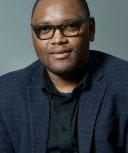
DR GIFT MURESHERWA
Research Coordinator: Tourism & Events Management muresherwag@cput. ac.za
of Tourism & Events Management)
Introduction
The Centre for Tourism Research in Africa (CETRA) is housed in the Tourism and Events Management Department. CETRA places strong emphasis on tourism and events-related research. In alignment with its ethos, the centre’s primary goal is to highlight the institution’s contribution to tourism and hospitality teaching and research, facilitate research activities, unite university researchers and practitioners both locally and internationally, and become a leading provider of research facilities for students and scholars.
The department takes pride in its valuable relationships with industry and stakeholders such as the South African Association for the Conference Industry (SAACI), and membership in international academic associations like the Travel and Tourism Research Association (TTRA) and the Tourism Educators Association of South Africa (TESA). Our industry network includes key partners such as the
V&A Waterfront, Cape Town Tourism, City Sightseeing Bus, The Castle of Good Hope, Cape Town Carnival, and Swissport, among others.
CETRA operates under CPUT’s Research Focus Area 5: Human, Health & Social Dynamics. Departmental staff regularly contribute to national and international platforms including the World Travel Market (WTM Africa) and Meetings Africa, serving as speakers and panellists. The department also benefits from an actively engaged advisory board which supports service-learning projects and partnerships.
Academic and industry collaboration
The Tourism and Events Management Department consists of a diverse team of academics with significant experience in higher education and industry. Recognised for excellence, the department enables students to combine theoretical knowledge
with practical experience aligned with current industry demands. Programmes are designed to prepare well-rounded graduates with strong academic, professional, and interpersonal skills for careers in tourism and events management.
Efforts are currently underway to reposition CETRA through contract research collaborations with institutions in both the private and public sectors. These discussions aim to advance research agendas, address societal challenges, and ensure that the centre becomes financially self-sustaining.
Key initiatives and achievements
Cape Town Carnival research study
Since 2022, CETRA has collaborated with colleagues from CPUT’s Sports Management Department and the University of the Free State on a longitudinal study assessing the impact of a prominent cultural event in Cape Town. This research, made possible through a mutually beneficial partnership with Cape Town Carnival organisers, has led to co-authored publications and presentations at international conferences. Students have also benefited by participating as fieldworkers and in data analysis.
Academic capacity development
Six departmental staff members currently hold doctoral qualifications and are actively engaged in postgraduate supervision and mentoring of emerging researchers. Several others are pursuing their PhDs. Staff are encouraged to attend research development opportunities such as writing retreats and seminars to support increased research output and publication in DHET-accredited journals.
IN THE NEWS
CETRA hosts 7th ICTR Conference
CETRA hosted the 7th International Conference on Tourism Research (ICTR) in March at the Cape Town Hotel School in Granger Bay. The event brought together scholars, practitioners, and experts from 22 countries for critical engagement on tourism research and innovation. In-person participants travelled from countries such as Canada, Portugal, Nigeria, Australia, India, and the USA, while virtual participants joined from Brazil, Oman, Italy, Sri Lanka, and others.
Day 1 featured a welcome address by Prof Rishidaw Balkaran, DVC: TL, while Dean: FBMS, Prof Paul Green, officially opened Day 2.
Keynote speakers included:
• Dr Kamilla Swart (Hamad Bin Khalifa University, Qatar), ‘The future of the Olympic Games – When will it be Africa’s turn?’
• Prof Kaitano Dube (VUT), ‘Opportunities and challenges of AI in tourism and hospitality research’
• Prof Ike Ezeuduji (UNIZULU), ‘Leisure travel reimagined: Implications for research’
• Prof Catheryn Khoo (Torrens University, Australia), ‘Contested HIStory: Representation in heritage tourism’
Dr Swart described the ICTR as a rewarding experience that broadened her perspectives on global tourism and highlighted insights from the Global South. Programme Chair, Dr Chris Hattingh-Niekerk (a senior lecturer in Event Management), said the event encouraged exchange on cutting-edge research and best practices. “The conference aimed to explore emerging trends and develop sustainable solutions that enhance tourism’s impact on communities and economies.” He noted that hosting the ICTR showcased FBMS’ dedication to academic excellence and helped strengthen Cape Town’s reputation as a destination for research, innovation, and sustainable tourism.
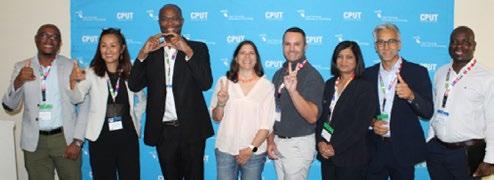
The 7th ICTR Conference brought together local and international experts at the Granger Bay Campus
The department is exploring the appointment of adjunct researchers to strengthen research capacity. At present, there is one associate professor and one senior lecturer in the department, with support and encouragement given to eligible staff to apply for ad hominem promotions.
Departmental research priorities
• Increasing research output remains a key focus, supported through staff mentorship and participation in grant-writing workshops.
• Strengthening collaborations with researchers at regional and national level, including academics from SADC countries and industry partners.
• Expanding interdisciplinary research across faculties and departments in alignment with CPUT’s niche areas.
• Encouraging staff to join professional boards to stay informed about industry trends and enhance teaching and research relevance.
• CETRA is committed to:
- Collaborating with communities on research projects
- Conducting applied research that addresses societal challenges
- Maintaining an annual database of departmental research projects
Recognition
and awards
The Tourism and Events Management Department has earned several accolades this year, including:
• Being named Research Department of the Year
• Senior lecturer Dr Christiaan Hattingh-Niekerk received the Emerging Researcher of the Year Award
• Ms Ilanza Perold (lecturer and student) was awarded Runner-Up Master’s Student of the Year
CETRA conference hosting
CETRA hosted the 7th International Conference on Tourism Research (ICTR) at the Cape Town Hotel School in Granger Bay in March. Participants attended both in person and online, representing 22 countries.
Selected research outputs
• ‘Unlocking the potential of hybrid learning: Tourism student voices in South African universities of technology’, 7th International Conference on Tourism Research (ICTR 2024), Cape Town
• ‘Myths, legends and stories: A South African approach to tourism branding and destination development’, Corporate Entrepreneurship and Innovation in Tourism and Hospitality
• ‘Gender nuances in tourism business operations: A South African perspective’, Routledge Handbook on Gender in Tourism
• ‘Women tourism entrepreneurs in KwaZulu–Natal, South Africa: Capabilities and challenges’, 7th International Conference on Tourism Research (ICTR 2024), Cape Town
• ‘Covid-19 impact on future study choices: Will students consider a tourism qualification post the pandemic?’, 7th International Conference on Tourism Research (ICTR 2024), Cape Town
• ‘Indigenous games as a catalyst for sports tourism development in South Africa’, 7th International Conference on Tourism Research (ICTR 2024), Cape Town
• ‘The socio-economic impact of a major cultural event in Cape Town during and post-pandemic era’, 7th International Conference on Tourism Research (ICTR 2024), Cape Town
• ‘Sustainable tourism practices in the post-Covid era: Lessons from southern Africa’, 7th International Conference on Tourism Research (ICTR 2024), Cape Town
• ‘Towards improving class attendance in higher education: A case study of a university of technology in South Africa’, International Journal of Learning, Teaching & Educational Research, 23(5)
RESEARCH CENTRE
CENTRE FOR SPORT BUSINESS & TECHNOLOGY RESEARCH (CSBTR)
(Faculty of Business & Management Sciences)
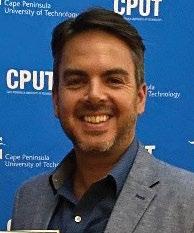

PROF BRENDON KNOTT
Centre for Sport Business & Technology Research
knottb@cput.ac.za
https://orcid.org/0000-00016401-1970
PROF SIMEON DAVIES
HoD: Sport Management
daviess@cput.ac.za
https://orcid.org/0000-00031156-6934
The Centre for Sport Business & Technology Research (CSBTR), physically located within the Sport Performance Laboratory (SPL) at NCG, features world class testing equipment and dedicated research staff and technicians. The site also has a dedicated postgraduate learning and research space with direct access to the Sport Knowledge Hub that has a specialist selection of sport-themed books and online resources. The SPL provides the space and cutting-edge technology to pursue research and enhance education and technical training in terms of sport performance and technology.
The vision of the CSBTR is to be a research entity of outstanding excellence and innovation, in line with ‘One Smart CPUT’, creating leaders in the field of applied sport and leisure research, and finding solutions to South Africa’s scientific and socioeconomic challenges through sport and leisure-related research. The CSBTR engages in transdisciplinary research, primarily aligned with
two institutional key focus areas, namely, FA 1: Bioeconomy & Biotechnology and FA 2: Human, Health & Social Dynamics. This is reflected in the centre’s two core research themes.

The CSBTR’s operational capacity supports the following interrelated research components:
• Research promotion, uptake and engagement (with a focus on postgraduate research and staff capacity building)
Core research themes of the CSBTR
• Sport performance testing and rehabilitation
• Community engagement and internationalisation through research
• 3rd stream income generation through research activities such as grant and funding applications; conference hosting; equipment and venue usage; and technology development and testing
Highlighted activities and projects in 2024
Prof Kamilla Swart was appointed as an adjunct professor to the centre. Prof Swart is an associate professor and the Director of the Masters in Sport and Entertainment Management (MSEM) programme at Hamad Bin Khalifa University, Qatar. Her research interests include sport, tourism and events, with a specific focus on mega-events, event policies, strategies, monitoring and evaluation, legacy, sustainability, and inclusion in sport. Her work focuses on contributing to sport, tourism and event knowledge in the developing context, and in the global South in particular.
The CSBTR signed an MoU with industry partner Boland Cricket. As an initial cooperation, the centre facilitated the ‘Game On’ Sport Management Workshop Series (July-September) to over 40 members of Boland Cricket.
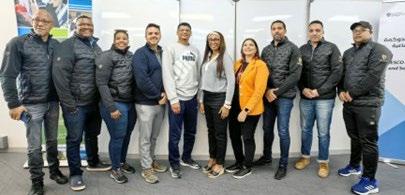
The new Newlands Campus has resulted in several prestigious conferences being planned and hosted through the CSBTR. The Centre will co-host the World Association of Sport Management (WASM) Conference in March 2026.
Senior academics affiliated with the CSBTR are leading a range of activities and projects.
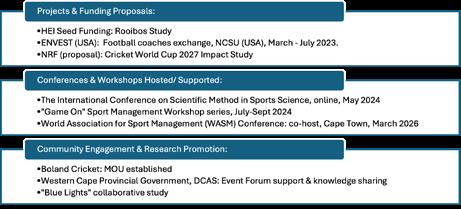
The Rooibos Exercise Study continues as a flagship project, led by Prof Davies of the CSBTR, in collaboration with researchers from CPUT’s AMHBI.
Prof Brendon Knott and Mr Ashley Jacobs participated in the Empowering New Voices through Education and Sports Training (ENVEST) exchange programme. ENVEST is an initiative that uses sport as a vehicle for youth development and social change. Alongside ten youth soccer coaches from across South Africa, the delegation spent two weeks in the USA, attending leadership workshops at North Carolina State University ENVEST project participants

Boland Cricket executive management and representatives with CSBTR ‘Game On’ Sport Management Workshop Series coordinators
Highlighted projects and activities of the CSBTR
in the USA
(NCSU) and gaining the opportunity to observe and run practical soccer sessions at North Carolina Football Club.
In July 2024, the American delegation – comprising ten youth soccer coaches and two sport academics - visited South Africa, where they took part in a programme at the CSBTR and facilitated practical sessions with our industry partner, the Football Foundation in Gansbaai.
Dr Janice Hemmonsbey-Lodewyk led an NRF proposal application for a large-scale sport mega-event impact study with a focus on the ICC Cricket World Cup 2027, in South Africa, Namibia and Zimbabwe.
The International Conference on Scientific Method in Sports Science was a collaborative online event between Malmö University, Linnaeus University (Sweden), UWC and CPUT. It was co-chaired by Prof Sharhidd Taliep. The conference targeted PhD and master’s students in sport studies. Dr Jaron Ras and Ms Rucia November presented papers at the conference.
Ms November participated in a Collaborative Online International Learning (COIL) Project and visit to Linnaeus University in Växjö, Sweden. Focusing on leadership and coach development within a global sports context, the project provided master’s students with an opportunity to engage in cross-cultural discussions, comparative analysis, and reflective practice in sport coaching and leadership.
Dr Ras continues to engage with the fire and rescue services in Cape Town, where he conducts research into various factors contributing towards firefighter early retirement. These projects include psychological stress and resilience, cardiovascular health, musculoskeletal health, and most recently pulmonary health. This forms part of the Blue Lights Project – a collaboration between academics from Sweden, Ireland and South Africa.
Please visit our website for further details of activities and projects: https://www.cput.ac.za/research-technology-and-innovation/centres
IN THE NEWS
Sport Management staff visit USA for youth development
Two staff members from CPUT’s Department of Sport Management, Prof Brendon Knott and Mr Ashley Jacobs, participated in the Empowering New Voices through Education and Sports Training (ENVEST) Exchange Programme in April. ENVEST promotes youth development and social transformation through sport. The initiative supports the skills development of coaches and practitioners working with communities across the globe.
As coordinators, Prof Knott and Mr Jacobs assisted the American organisers in developing online teaching materials and co-creating the programme for the South African delegation’s visit. The two travelled to North Carolina with ten coaches from organisations around South Africa. The delegation spent two weeks attending leadership workshops at North Carolina State University (NCSU), delivering and observing practical soccer sessions at North Carolina Football Club, and touring the NCSU campus and sports facilities. They also attended local sporting events and engaged with their American counterparts in collaborative discussions.
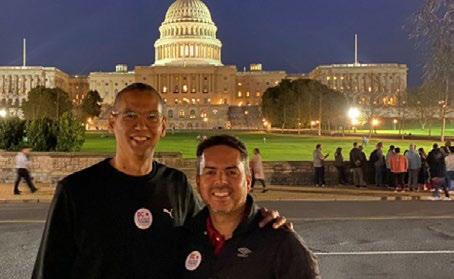
Mr Ashley Jacobs and Prof Brendon Knott at NCSU
TECHNOLOGY STATION
CLOTHING & TEXTILE TECHNOLOGY (TSCT)
(Faculty of Engineering & the Built Environment)
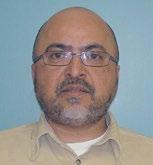
MR SHAMIL ISAACS
isaacssh@cput.ac.za techstation@cput.ac.za www.tsct.co.za
The Technology Station: Clothing and Textiles (TSCT) is located in the Faculty of Engineering & the Built Environment on the Bellville Campus. This technology station provides innovation support to the clothing and textile industry in order to help improve competitiveness.
Support offered to local industry
These specific services are provided to the clothing, textiles and related sectors: Manufacturing advisory services
Examples include manufacturing audits and assessment; industrial engineering services for the improvement of productivity, including process layout, optimising sewing methods and work-study; and advice on the acquisition of new or improved technology.
Technology support centre
The TSCT has a number of specialised technologies available at its Bellville office for research, technology demonstration, prototype development and small-scale manufacturing. Small businesses can use the technology on an appointment basis, and staff at the TSCT also provide advice on the application and use of these machines. Charges are levied for the use of the equipment, but these are largely subsidised.
Product testing and analysis
The laboratory at the TSCT provides product testing and an analysis service to the clothing, textile and related industries, as well as clothing- and textilerelated consulting services, e.g., advice on material use and care, and fabric specification development.
Short courses
The TSCT regularly hosts interns, providing them with the opportunity to work on client projects under supervision. This gives them valuable industry experience. Additionally, the TSCT offers a variety of short learning programmes tailored to the clothing, textiles and related industries.
Product development
Services include clothing product development using CAD software for pattern development; pattern grading (sizing); marker making (maximising the material utilisation before cutting); and 3D body scanning and 3D simulation on an avatar using data extracted from the 3D body scanner.
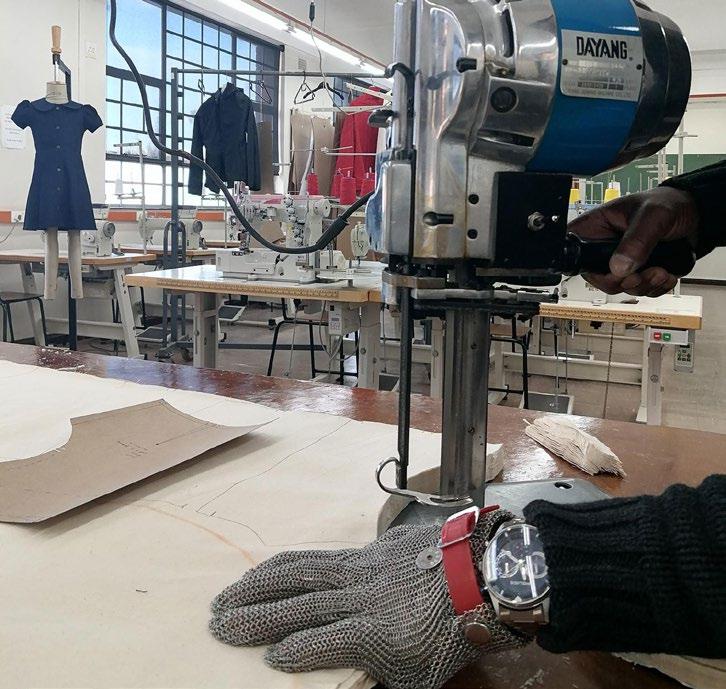
FOCUS AREA 6 The Digital Society
Introduction by Prof Izak van Zyl
vanzyliz@cput.ac.za
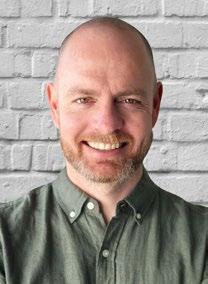
As a leading institution dedicated to advancing the Digital Society, our research delves into its multifaceted complexities, as articulated through our niche areas. We conduct in-depth studies of the Digital Society’s core components described below through our specialised centres (e.g., BIIC and PLMCC) and research hubs (e.g., BDR). As a university of technology, these scientific endeavours aim to develop sustainable solutions to complex (‘wicked’) real-world problems.
Niche Area 1: Artificial Intelligence and Data Science
This niche area encompasses a broad spectrum of artificial intelligence, focusing on solving real-world problems and enhancing human decision-making. The emphasis is on expert systems that operate on predefined knowledge and learning models, emulating human cognitive processes to generate machine-driven solutions. This area also explores how vast amounts of raw data – structured, unstructured, incomplete, skewed or irrelevant – can be managed, manipulated, extracted and interpreted. The critical focus is transforming large datasets and continuous data streams into informed and actionable insights. This niche includes data generated from the Internet of Things (IoT), social media, big data, and the application of machine learning, along with statistical and mathematical modelling methods for data analytics.
Niche Area 2: Sharing Economy
The sharing economy introduces a new approach to distributing goods and services, moving away from the conventional corporate model where companies sell products directly to consumers. Instead, the sharing economy facilitates peer-to-peer sharing and renting assets, such as cars, homes and personal time, primarily through mobile applications. This area has grown to encompass the gig economy – a labour market characterised by short-term jobs, contracts or freelance work rather than permanent employment. This emerging concept strongly emphasises social upliftment and economic growth, providing individuals with new opportunities to participate in the economy.
Niche Area 3: Additive Manufacturing
Additive manufacturing involves joining materials to create objects from 3D model data, typically layer by layer, contrasting with subtractive manufacturing techniques like traditional machining. This niche includes rapid prototyping, additive fabrication, layer manufacturing, freeform manufacturing, and 3D printing, pivotal in revolutionising production processes and enabling innovative product design and development.
Niche Area 4: Distributed Systems
Distributed systems comprise networks of autonomous computers and devices interconnected through distribution middleware. These systems facilitate sharing resources and capabilities, providing users with a seamless and integrated access experience. In the context of Industry 4.0, distributed systems are crucial, encompassing the Cloud, IoT, robotics, automated process simulation, blockchain technologies and cybersecurity. This niche area is essential for managing and integrating information across diverse sources.
Niche Area 5: Information and Communication Technology for Development (ICT4D)
This area leverages ICT-based approaches to address complex societal, ecological, governmental and industrial challenges. It also encompasses aspects of digital citizenship, aiming to enhance user access to information and communication technologies and reduce digital inequalities. Additionally, ICT4D focuses on the ethical and responsible management of digital resources and technologies. Examples include e-government, e-health and e-learning initiatives that contribute to societal upliftment by adopting and developing digital technologies.
Collectively, the core elements of the Digital Society – artificial intelligence, the sharing economy, additive manufacturing, distributed systems, and ICT for development – form the backbone of our research efforts in this focus area, aligned with CPUT’s Vision 2030. Together, our researchers are dedicated to understanding and integrating these components to foster inclusive development, particularly within a fragile global ecosystem.
IN THE NEWS
CPUT researcher fosters African partnerships in food security and AI
Dr Vusi Mshayisa, a leading researcher in CPUT’s DFST, visited Jomo Kenyatta University of Agriculture and Technology (JKUAT) in Kenya in October. Funded by the NRF Thuthuka project, the visit aimed to deepen collaborations on edible insect research and advance educational initiatives across the region. Dr Mshayisa’s keynote address, titled ‘Food security matters: Unravelling the nutritional, structural, and techno-functional properties of edible insects’, captivated staff and students, sparking interest in edible insects as a sustainable protein source. As Africa faces growing food security challenges, this work highlights the need to explore alternative protein sources to address nutritional gaps and promote sustainable practices.
Dr Mshayisa also led a popular webinar, ‘Revolutionising Higher Education: How AI and blended learning are shaping the classroom’, attended by over 144 participants from institutions such as CPUT, Dedan Kimathi University, the University of Nairobi, and Masinde Muliro University. The session examined the impact of artificial intelligence and blended learning on education, emphasising their roles in personalising learning and enhancing student engagement. Dr Mshayisa noted that blended learning’s flexibility and student-centred approach can make education more accessible to diverse populations.
The visit underscored the relevance of AI and blended learning in reshaping education globally, while reinforcing the importance of African academic collaborations in addressing societal challenges such as food security. Dr Mshayisa emphasised that these partnerships not only advance research but also enhance the quality of education through innovative technologies.
CPUT’s engagement with JKUAT is positioning the institution at the forefront of sustainable food production research. Future initiatives will focus on advancing edible insect projects, including joint research publications and student exchange programmes to enhance knowledge and foster innovation. Dr Mshayisa’s visit opened new frontiers in research and education, contributing to the continent’s development and reinforcing CPUT’s role as a hub for cutting-edge, socially relevant scholarship.
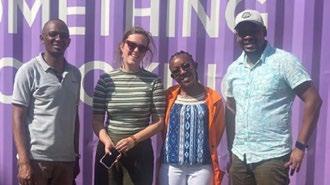
Strengthening African partnerships in research and education at JKUAT
Digital literacy skills for future leaders
Empowering learners through the transformative power of digital education, CPUT hosted the BankSETA Digital Literacy Skills for the Future Awards Ceremony in December. This event marked the graduation of 51 matriculants who completed their digital literacy training in 2024 through the Digital Literacy Skills for the Future Project. Held on the Bellville Campus, the ceremony symbolised a significant step in equipping young learners with the skills needed to thrive in a digital world.
Participants came from Langa High School and Lotus High School. Many entered the programme with little or no digital literacy, often lacking confidence in navigating the digital realm. With the support of CPUT facilitators and encouragement from peers, however, they made remarkable progress, developing technical abilities, selfassurance, and a sense of belonging. Their experience extended beyond learning digital tools – it opened new possibilities and built resilience.
The project’s learning areas included:
• Introduction to computer hardware and software
• Introduction to Microsoft Office programmes
• Cybersecurity and digital citizenship
• Internet and email usage
• Introduction to IT
• Robotic process automation and AI
• Blockchain and cryptocurrency
• Introduction to programming basics
Mr Mandla Maseko, Director: Advancement Department, highlighted the importance of these skills as learners prepare for the next stage of their education. During the ceremony, participants showcased their abilities by building robots and competing in a lively robot race. Lotus High School emerged as the winning team and received prizes, while all learners were presented with certificates and gifted the tablets they had used during their training.
Mr Waldon Hendricks, lecturer in the IT Department, emphasised the value of integrating STEM – science, technology, engineering and mathematics – into learning. He said, “As they move forward, these learners carry with them not just knowledge, but the confidence and courage to pursue whatever career path they choose.”
Langa High School learner Ms Inga Dlephu expressed her gratitude, saying, “I would like to thank BankSETA and CPUT for believing in us and teaching us valuable skills. We’ve learned so much – from
things we didn’t know much about to discovering new interests. This programme didn’t just teach us; it opened doors and created a community where we felt supported.”
Mr Maseko concluded by thanking BankSETA for its continued support. “Thank you for standing by us. We hope to continue this meaningful journey together next year. And to all our incredible learners – thank you for your dedication and resilience, even when faced with challenges. Your hard work truly inspires change.”

RESEARCH CENTRE
CENTRE FOR BUSINESS INNOVATION & INCUBATION (BIIC)
(Faculty of Business & Management Sciences)
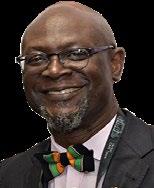
PROF MICHAEL TWUM-DARKO
(Graduate Centre for Management)
darkom@cput.ac.za
Introduction
The year 2024 marked a significant period of consolidation, expansion, and strategic positioning for the Centre for Business Innovation & Incubation (BIIC). As the leading institutional driver of entrepreneurship, disruptive technology adoption, and innovation commercialisation at CPUT and beyond, BIIC continued to strengthen its role as a catalyst for socio-economic transformation in South Africa and across the African continent.
Building on momentum from previous years, BIIC secured its status as the host of the Africa Tourism Innovation Hub (ATIH) – a pivotal development positioning the centre at the forefront of regional tourism innovation. In addition, BIIC was appointed as the host of the South African Entrepreneurship Venture Builder (EVB), serving eight partner universities – six UoTs and two historically disadvantaged
institutions (HDIs). These milestones reinforce BIIC’s commitment to collaborative growth, knowledge exchange, and youth entrepreneurship development.
Key Developments in 2024
Expansion of Strategic Networks
a)
Hosting of the ATIH for Africa
In 2024, BIIC was officially recognised as the institutional host for the Africa Tourism Innovation Hub (ATIH). This continental mandate enables BIIC to incubate tourism-focused ventures, promote cross-border partnerships, and drive digital transformation within Africa’s tourism and creative industries. ATIH offers an innovation platform for ideation, prototyping, and scaling solutions to address tourism-specific challenges across the continent.
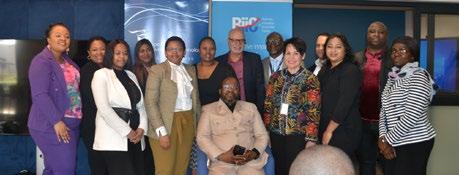
b) Establishment of the South African EVB for eight universities
In collaboration with five UoTs – CPUT, TUT, CUT, DUT, and MUT – along with NUST and two HDIs, Univen and WSU, BIIC now leads the national Entrepreneurship Venture Builder (EVB) initiative. This collaborative ecosystem accelerates student- and graduate-led start-ups, strengthens regional innovation capacity, and supports national goals for inclusive economic development.
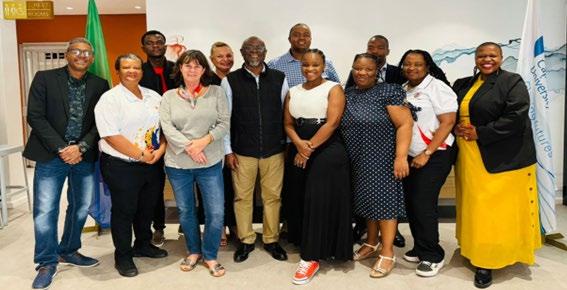
Consolidation of the Advisory Committee
BIIC’s Advisory Committee (AC) continued to provide immense value through strategic oversight, mentorship, and thought leadership this year. The AC played a pivotal role in shaping the centre’s dual hosting responsibilities for ATIH and the EVB, ensuring alignment with industry trends and regional development priorities.
Refinement of BIIC’s value proposition
Informed by input from the AC, BIIC refined its value proposition to emphasise sector-specific innovation hubs, such as Tourism, FinTech, and Digital Ecosystems. It also developed structured venture-building frameworks to bridge the gap between ideation and sustainable commercialisation.
Enhanced selection and screening processes
In response to BIIC’s expanded scope, the project selection criteria were refined to prioritise impact-driven ventures aligned with ATIH and EVB mandates. The improved pipeline now assesses scalability, regional relevance, digital readiness, and socio-economic impact.
Student engagement and innovation showcases
BIIC deepened its engagement with CPUT students and graduates through regular innovation showcases, mentorship bootcamps, and investor-readiness workshops. These platforms enabled promising start-ups to pitch their ideas, build networks, and secure partnerships to scale their Minimum Viable Products (MVPs).

Launch of the Africa Tourism Innovation Hub
Launch of Southern Africa Entrepreneurship Venture Builder with THENSA
CPUT students engaged in entreprenuerial mentorship and coaching
National student innovation showcase and hackathons
BIIC hosted the 2024 National Student Innovation Showcase in April, bringing together over 150 student innovators from across South Africa. The event featured exhibitions, venture pitches, and industry-led mentorship. In collaboration with Celo International and with support from various SETAs, BIIC also facilitated four hackathons on blockchain and financial inclusion, driven by interdisciplinary teams of students from Engineering, Nursing, Design, and IT.
Progress of MVP projects
Several supported ventures made notable progress towards commercialisation in 2024:
a) FinTech platforms: Dropwork, Nimbly, eBoleka, iGrosa, and iTeksi advanced their blockchain-enabled solutions for underserved communities.
b) Digital ecosystem products: eVillage™, Co-Parent™, OKDoc™, and the Student Performance Predictor expanded their pilot testing phases, attracting interest from local municipalities and development agencies.
c) Tourism innovation prototypes:
Under the ATIH umbrella, new tourismfocused MVPs emerged, targeting smart travel experiences, sustainable tourism supply chains, and community-led destination development.
Regional and continental collaborations
As the host of ATIH and EVB, BIIC launched multiple cross-border initiatives this year, including:
• A strategic partnership with NUST to co-deliver tourism innovation mentorship programmes
• Plans for a cross-border tourism start-up accelerator, with hubs in Cape Town, Windhoek, and Nairobi
• Hosting of the first Pan-African EVB Roundtable to align curriculum-based entrepreneurship with national development priorities
Conclusion and future directions
In conclusion, 2024 was a transformative year for the Centre for Business Innovation & Incubation. With the establishment of flagship continental and national programmes, expansion of innovation support frameworks, and the development of high-impact student ventures, BIIC reaffirmed its commitment to driving entrepreneurial transformation in South Africa and across the continent. Looking ahead, the centre aims to further scale its influence through deeper university–industry collaboration and expanded continental outreach, supporting its vision of becoming a premier hub for inclusive innovation and entrepreneurial excellence.
BIIC Head appointed to Africa Tourism Innovation Hub
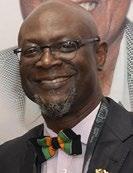
Prof Michael Twum-Darko, head of BIIC and acting head of the Graduate Centre for Management, has been appointed one of the lead strategic partners for the Africa Tourism Innovation Hub (ATIH). The hub was established as a tangible outcome of the 2022 Africa Youth in Tourism Innovation Summit and Challenge (AYTISC), hosted by the Namibian government. It is a collaborative initiative involving Africa Tourism Partners (ATP), the UN World Tourism Organisation (UNWTO), DUT, Namibia University of Science and Technology, and Cornell University.
“As a pan-African initiative, the hub originated from AYTISC in 2019 and has since been hosted in Rwanda, Ghana and Namibia,” said Prof TwumDarko. He explained that the hub aims to foster technological innovation among African travel and tourism start-ups, drive youth employability, and stimulate tourism entrepreneurship. Prof TwumDarko said he was honoured to be appointed Director of the ATIH. He presented the hub’s master plan at the AYTISC in Windhoek, Namibia, during May and June 2024.
IN THE NEWS
Prof Michael Twum-Darko
CPUT and partners launch groundbreaking EVB

CPUT has partnered with the Technological Higher Education Network SA (THENSA) and six other universities to launch the Entrepreneurship Venture Builder (EVB), a pioneering initiative designed to cultivate a thriving entrepreneurial ecosystem in southern Africa. The EVB aims to empower entrepreneurs from universities of technology, historically disadvantaged institutions, and marginalised communities, providing a comprehensive support system to transform innovative business ideas into successful ventures.
At a gathering of the founding members in December, Prof Michael Twum-Darko, EVB Manager, said, “We are dedicated to breaking down barriers and creating pathways for entrepreneurs to flourish in the African market.”
Key features of the EVB include:
• Mentor-in-Residence Programme: Expert mentoring from university staff specialising in technology transfer, innovation, and entrepreneurship
• Incubation and Acceleration: Guidance in navigating the journey from Minimum Viable Product (MVP) to commercialisation
• Focus on Inclusion: Empowering student entrepreneurs and individuals from historically marginalised communities
• Regional Impact: Initially hosted at CPUT’s Business Innovation and Incubation Centre, the EVB will expand into a decentralised model across multiple universities
The other founding institutions are DUT, UNIVEN, TUT, Namibia University of Science and Technology, CUT and WSU. Funded through the Research and Innovation Systems for Africa (RISA) initiative, a UK international development programme, the EVB represents a significant step in strengthening campus- and communitybased innovation, as well as research-to-commercialisation systems across South Africa.
BIIC showcases cashless payment solutions for taxi industry
BIIC in partnership with Celo Africa DAO hosted the Taxi Cash App Hackathon in November, bringing together developers from across Africa eager to transform the South African taxi industry with blockchain-based payment solutions. Under the leadership of Prof Michael Twum-Darko, BIIC promotes entrepreneurship and technical development by collaborating with academic institutions and industry partners to equip students and developers with essential skills and mentorship. The Taxi Cash App Hackathon exemplified this mission, enabling participants to leverage blockchain technology to tackle key challenges in the country’s primarily cash-based taxi sector, such as theft, inefficient cash management, and limited transparency.
The hackathon encouraged the creation of mobile-first decentralised applications (dApps) for MiniPay, a blockchain payment system. “These innovations aim to streamline taxi payments, boost transparency, and harness blockchain’s power for real-world applications,” noted Prof Twum-Darko. Highlights of the event included extensive digital promotion, hands-on training workshops led by blockchain experts to assist in dApp design, and a prize-giving ceremony recognising the top projects.
Three standout projects are poised to transform the taxi industry:
• Taxi Zip – developed by fourth-year IT and second-year Nursing students
• Taxi City – created by a fourth-year Computer Engineering student and a graduate in Mechanical and Mechatronics
• Taxi DApp – designed by third-year IT students
These projects are addressing challenges such as operator revenue tracking, driver management, and cashless payments, demonstrating blockchain’s potential in transportation.
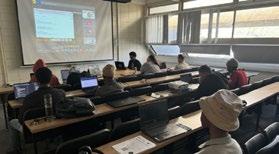
Prof Twum-Darko emphasised that the goal is to enhance functionality and achieve 25 active users per week. “CPUT BIIC remains committed to nurturing these projects and supporting the continued use of blockchain technology to solve local challenges,” he said. The success of the hackathon highlights the growing relevance of decentralised solutions, paving the way for more secure and accessible services in South Africa’s taxi industry and beyond.
Paving the way for safer and more accessible services in South Africa’s taxi industry
BIIC showcases innovative eVillage solution at Harvard’s Growth Lab

Head of BIIC, Prof Michael Twum-Darko, together with the South African research team, presented his pioneering work on economic growth and development policy research at the prestigious Growth Lab of the Harvard Kennedy School of Government in Cambridge, Massachusetts, in July. He showcased his groundbreaking ‘eVillage Solution’, a project informed by two years of empirical research and extensive community engagement in Zwelethemba, near Worcester, in the Breede Valley District Municipality of the Western Cape.
Prof Twum-Darko emphasised that the ‘eVillage Solution’ represents an innovative approach to local economic development. His work focuses on ensuring that economic benefits extend beyond urban centres to rural communities, thereby promoting inclusive growth and prosperity. The research in Zwelethemba has demonstrated the potential of the ‘eVillage Solution’ to transform local economies. He noted that the Growth Lab at Harvard University is renowned for collaborating with policymakers to design actionable
strategies for economic development, using teaching, tools, and publications to foster inclusive prosperity worldwide.
During his time at Harvard, Prof Twum-Darko, a distinguished academic and innovator, engaged with leading economists, policymakers, and researchers, discussing the practical applications of his findings and exploring collaborative opportunities to further refine and implement the eVillage Solution in other regions. Following his visit to Harvard, he was invited to Shenandoah University’s Division of Applied Technology/Virtual Reality in Winchester, Virginia, to learn more about how virtual and augmented reality technologies could enhance the Bridge-in Learning Platform developed by BIIC in collaboration with MTN Chenosis. Shenandoah University’s DAT has recognised the potential of BIIC and has agreed to sign an MoU with BIIC and FBMS. This MoU will pave the way for capacity building, as well as student and staff exchange programmes, fostering an environment rich in technological innovation and practical learning.
BIIC inspires youth in tech
BIIC participated in a vibrant Career Day at Thuto ke Matlaa Comprehensive High School in Tembisa, Johannesburg in April. Co-hosted by MTN Chenosis API Marketplace and Girlcode, the event aimed to inspire learners – especially girls – to explore careers in technology and showcased exciting opportunities in the tech industry.
Prof Michael Twum-Darko, leader of BIIC, explained that the initiative sought to demystify the path to a tech career by highlighting the importance of subjects like mathematics, computer science, and physics in building a strong foundation. Acting as a technology and innovation partner to MTN Chenosis, BIIC captivated learners by showcasing how AI is used to develop mobile apps, demonstrating real-world tech applications. He also introduced BIIC’s Machine Learning and AI online Learner Academy (Bridge-in), designed to bridge the gap between academic knowledge and industry needs. This platform is especially valuable for newly hired graduates at MTN Chenosis, offering hands-on experience and practical training to help them thrive in the evolving tech ecosystem.
Prof Twum-Darko emphasised the power of collaboration among education, industry, and non-profits to foster diversity and inclusivity in technology. “Through such initiatives, we reaffirm our commitment to developing talent and empowering the next generation of innovators and problem-solvers.”
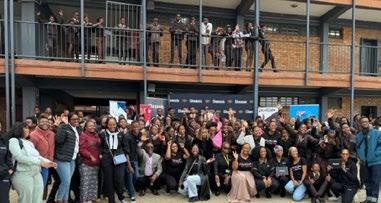
Promoting inclusive growth and prosperity
Inspire learners to explore careers in technology
RESEARCH CENTRE
CENTRE FOR INTELLIGENCE SYSTEMS AND EMERGING TECHNOLOGIES (CISET)
(Faculty of Engineering & the Built Environment)
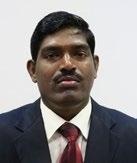

PROF SENTHIL
KRISHNAMURTHY
[Leader]
krishnamurthys@cput. ac.za
CISET is dedicated to advancing research in AI, machine learning, and intelligent systems to benefit industries, communities, and utilities. The centre’s primary and inspiring objective is to enhance knowledge and technological innovation in these fields, foster talent, secure external funding, and disseminate findings. CISET aims to build a state-of-the-art infrastructure for AI-based research and cutting-edge technological tools for energy, environment, and credible cyber-physical systems.
The centre is headed by experienced and dedicated leadership, supported by researchers and postgraduate students who are strongly committed to multidisciplinary research in control and optimisation, sensing and information processing, machine learning, robotics, and automation.
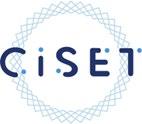
DR EFE
ORUMWENSE
[Deputy Leader]
orumwensee@cput.ac.za
CORE RESEARCH FOCUS AREAS
Intelligent systems and robotics
CISET focuses on developing critical technologies for controlling and optimising complex engineering problems, sensing and information processing, machine learning, robotics, and automation.
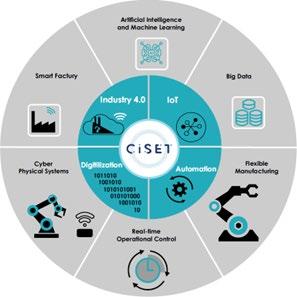
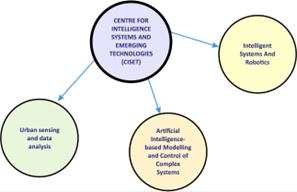
AI-based modelling and control of complex systems
The centre’s research aims to address critical research questions related to improving systems’ intelligence and smartness and optimising their performance in real-world settings.
Urban sensing and data analysis
The centre seeks to conduct interdisciplinary research in the applications of artificial intelligent systems to provide emerging technological solutions to industries and businesses.
CISET STAFF AND RESEARCHERS
Staff and researchers affiliated with CISET in the niche areas include:
Prof Senthil Krishnamurthy Mr Emmanuel Luwaca
Dr Efe Orumwense Ms Nande Fose
Dr Haltor Mataifa
Mr Tabempe Edgar Lesenyeho
Dr Mohammed Esmail Ms Makhetsi Flora Mojela
Prof Bingwen Yan Mr Abuyile Mpaka
Dr Oludamilare Bode Adewuyi
Mr Manduleli Alfred Mquqwana
Dr Olukorede Tijani Adenuga Mr Nkosinathi Vellem
Dr Doudou Luta Mr Vuyolwethu Bakala
Dr Lucrecia Valentine Mr Siphamandla Qayi
Mr Mukovhe Ratshitanga Mr Simthembile Mpaku
Mr Garrett Rose Ms Sisanda Gcinisa
Mr Sikho Ntshiba Mr Siphelele Joseph Mndiya
Ms Ntanganedzeni
Tshinavhe
Mr Mulizi David Ruhaya
Mrs Phaphama Panda Mr Siyabonga Silinga
HIGHLIGHTS FOR
2024
Research awards and NRF rating
During 2024, several CISET staff members and grant holders attained NRF ratings and received departmental and FEBE research awards:
• Prof Senthil Krishnamurthy achieved the NRF C2-rating
• Dr Haltor Mataifa received the FEBE Emerging Researcher Award for completing his doctoral degree
• Prof Senthil Krishnamurthy received the FEBE Bronze Awards for Postgraduate Supervision, Publications, and External Funding
• Prof Senthil Krishnamurthy received the FEBE Teaching Excellence Award
• Mr Mukovhe Ratshitanga received the departmental research awards for Postgraduate Supervision and Publications
Research output
During 2024, CISET staff, postgraduates, and postdoctoral research fellows contributed to research publications with one book chapter, nine journals, and four peer-reviewed conference papers.
Chapters in books
Prof Senthil Krishnamurthy and Mr Emmanuel Idowu
Ogunwole authored ‘Microgrid system design, modelling, and simulation’ in Modelling and Control Dynamics in Microgrid Systems with Renewable Energy Resources,
Academic Press, 345-376, ISBN9780323909891 https://doi.org/10.1016/B978-0-323-909891.00009-9
Journal articles
• ‘Artificial intelligence-based forecasting models for integrated energy system management planning: An exploration of the prospects for South Africa’, Energy Conversion and Management: X, 24 https://doi.org/10.1016/j.ecmx.2024.100772
• ‘Appraisal of viable optimisation techniques for efficient design and control planning of renewable energy-based microgrid systems’, Computers and Electrical Engineering, 20 Part A https://doi. org/10.1016/j.compeleceng.2024.109652
• ‘Analysis and systematic review of harvesting energy from roads’, International Journal of Applied Engineering and Technology, 6(11)
• ‘Performance analysis for predictive voltage stability monitoring using enhanced adaptive neuro-fuzzy expert system’, Mathematics, 12(19)
• ‘Improved control technique for enhancing power system stability in out-of-step conditions’, Energies, 17(16) https://doi.org/10.3390/ en17164086
• ‘Empowering distribution system operators: A review of distributed energy resource forecasting techniques’, Heliyon, 10(15) 10.1016/j. heliyon.2024.e34800
• ‘Particle swarm optimisation for an optimal hybrid renewable energy microgrid system under uncertainty’, Energies, 17(2) https://doi. org/10.3390/en17020422
• ‘Demand-side management as a network planning tool: Review of drivers, benefits and opportunities for South Africa’, Energies, 17(1) https://doi.org/10.3390/en17010116
Peer-reviewed conference proceedings
• ‘Application perturb and observe maximum power point tracking technique for CubeSat power systems’, 32nd Southern African Universities Power Engineering Conference (SAUPEC) , Stellenbosch https://10.1109/ SAUPEC60914.2024.10445093
• ‘Review of planning and optimization of the renewable-energy-based micro-grid for rural electrification’, 32nd Southern African Universities Power Engineering Conference (SAUPEC) , Stellenbosch https://10.1109/ SAUPEC60914.2024.10445088
• ‘Adaptive OOS protection scheme to enhance rotor stability of the system’, 32nd Southern African Universities Power Engineering Conference (SAUPEC) , Stellenbosch https://10.1109/SAUPEC60914.2024.10445082
• ‘Empowering remote regions: Modelling and simulation of a 1.54 MW off-grid fuel-cell unit for sustainable energy independence’, IEEE 4th International Maghreb Meeting of the Conference on Sciences and Techniques of Automatic Control and Computer Engineering (MI-STA) , Tripoli, Libya https://10.1109/MISTA61267.2024.10599707
Workshops and IEEE distinguished lecture
• CISET organised a PG workshop on ‘AIbased optimisation methods for power system applications’ at FEBE in March.
• CISET organised a PG workshop on ‘Energy management and artificial intelligence applications for future power systems’ at FEBE in December.
• Prof Veruscha Fester (FEBE: RTIP) and Prof
Senthil Krishnamurthy (CISET leader) co-hosted the first ‘Regional Eskom peaking technologies seminar’ on the Bellville Campus in July. The seminar provided opportunities for registered professional engineers and technicians to share their knowledge and work experience, and to propose solutions to engineering challenges encountered at Eskom peaking generation stations across the country. Presentations are delivered by technical experts from Eskom industries, as well as academics and postgraduate students from CPUT and UCT, across the fields of Electrical, Mechanical, Civil, and Information Technology.
• CSIET organised the IEEE Distinguished Lecture on ‘Artificial intelligence in the future of smart grids’ in December. This was facilitated by Prof Ganesh Kumar Venayagamoorthy, a Duke Energy Distinguished Professor of Power Engineering and Professor of Electrical and Computer Engineering at Clemson University, USA.
• Prof Krishnamurthy delivered a keynote address at the FEBE Innovative Solution SDG 7 Seminar on ‘Empowering the future for smart grid and demand-side management implementation: Universities as catalysts for sustainable energy transition in Sub-Saharan Africa’ in August.
• Mr Mukovhe Ratshitanga presented at the FEBE Innovative Solution SDG 7 Seminar on ‘Exploration of community-owned energy projects and their socioeconomic benefits’ in August.
Partnerships and collaborations
During 2024, CISET staff, postgraduates and postdoctoral research fellows received and
strengthened strategic partnerships, both locally and internationally, and participated in the following events:
• Ms Nande Fose attended International PhD Week at Hochschule Trier International University of Applied Sciences, Germany in September.
• Mr Mukovhe Ratshitanga attended the academic exchange Erasmus+ Mobility Programme at the Riga Technical University in March, to lecture, participate in student seminars, and intensify research cooperation.
• Prof Krishnamurthy, Mr Ratshitanga, and Dr Efe Orumwense attended the AMEU Western Cape Good Hope Branch Meeting and collaborated with Western Cape municipalities in Veldrift.
• Dr Orumwense presented at the PTDF Professorial Chair in Energy Systems Workshop held at the National Centre for Energy and Environment (Energy Commission of Nigeria), University of Benin.
• Prof Krishnamurthy, Mr Ratshitanga, and Dr Olukorede Adenuga attended an industrial stakeholder engagement meeting with SANEDI JET Project Manager Prof Prathaban Moodley in Sandton.
• Prof Krishnamurthy, Mr Ratshitanga, Dr Adenuga, Mr Luwaca, Mr Mquqwana and Mr Ntshiba visited the Eskom National Control Centre in Germiston for stakeholder engagement on the Eskom–CPUT Smart Grid Research Chair contract research.
• The CISET team actively engaged in professional and developmental growth activities by attending SAUPEC 2024, Power Africa 2024, and the SANEDI 2nd National Energy Conference. All of these events are ECSA CPD-registered.
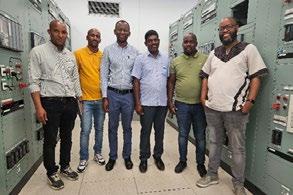
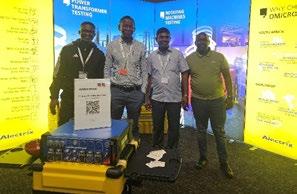
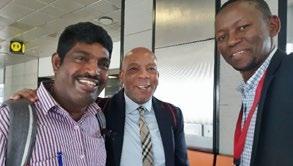
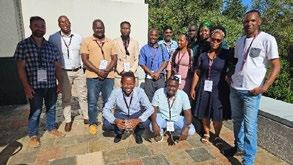
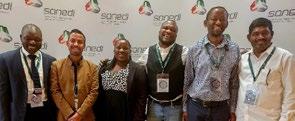
Mr Luwaca, Mr Mquqwana, Mr Ratshitanga, Prof Krishnamurthy, Mr Ntshiba and Mr S Papi at Eskom National Control Centre, Germiston
Prof Krishnamurthy, Dr Ramokgopa and Mr Ratshitanga, at the SANEDI 2nd National Energy Conference, Johannesburg
Dr Adenuga, Dr Dey, Ms Lefoka, Dr Orumwense, Mr Ratshitanga and Prof Krishnamurthy at the SANEDI 2nd National Energy Conference, Johannesburg
Mr Mndiya, Mr Ratshitanga, Prof Krishnamurthy, and Mr Ntshiba at the Power Africa Conference, Johannesburg
Mr Genis, Mr Luthando, Mr Dwaza, Mr Shangase, Dr Mataifa, Prof Krishnamurthy, Mrs Mojela, Dr Periloa, Ms Tshinavhe, Dr Mvandaba, Mr Lumina, Dr Esmail and Mr Ratshitanga, at SAUPEC 2024, Stellenbosch
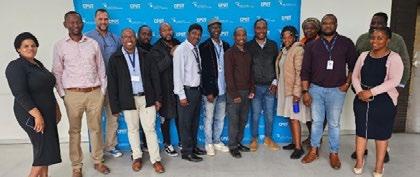
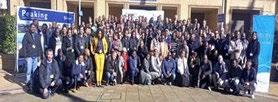
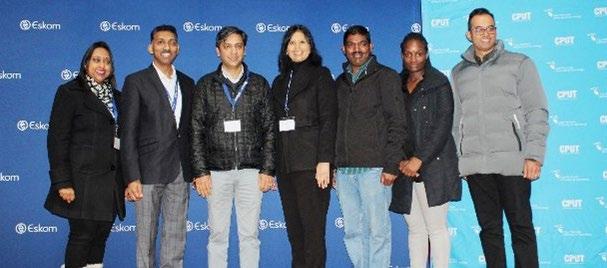
Graduated postgraduate students
During 2024, CISET successfully graduated two DEng and one MEng postgraduate students.
• Dr Emmanuel Ogunwole graduated with DEng: Electrical Engineering in December, supervised by Prof Krishnamurthy.
• Dr Olukorede Tijani Adenuga graduated with DEng: Electrical Engineering in December, supervised by Prof Krishnamurthy.
• Mr Khaya Dwaza graduated with Meng: Electrical Engineering in December, supervised by Prof Krishnamurthy and Dr Mataifa.
• Dr Oludamilare Adewuyi received an NRF postdoc fellowship for the project ‘Developing AI-based model for integrated flexibility management under high renewable energy penetration’, supervised by Prof Krishnamurthy.
CISET funding income
NRF Thuthuka Grant on Study the Impacts of Grid-Connected Hybrid Renewable Energy Systems
Project leader: Prof Senthil Krishnamurthy
000 NRF Rating Grant Prof Senthil Krishnamurthy
Research Fellow Grant: NRF Postdoc
Dr Oludamilare Adewuyi
Supervisor: Prof Senthil Krishnamurthy
SANEDI: Just Energy Transition Project on Demand-Side Management
Project leader: Prof Senthil Krishnamurthy
Project manager: Mr Mukovhe Ratshitanga
Eskom TESP Grant on Developing Smart Grid infrastructure
Project leader: Prof Senthil Krishnamurthy
Eskom TESP Grant on Power Quality Study
Project leader: Mr Mukovhe Ratshitanga
000
000
000
Mrs Fose, Mr Ratshitanga, Mr Rose, Mr Lesenyeho, Mr Ntshiba, Mr Mpaka, Prof Krishnamurthy, Prof Raji, Dr Mataifa, Dr Luta, Ms Selai, Ms Tshinavhe, Dr Orumwense, Mrs Ojela and Dr Esmail, at the CISET Workshop at DEECE
CPUT, in collaboration with Eskom, hosted the National Peaking Engineering Seminar on the Bellville Campus
RESEARCH UNIT
BRAND & DIGITAL RESEARCH (BDR) HUB
(Marketing Department, Faculty of Business & Management Sciences)
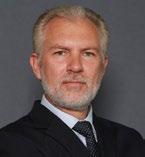
DR PIETER STEENKAMP
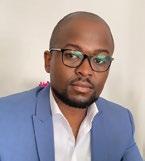
steenkamppi@cput. ac.za DR KUHLE ZWAKALA zwakalak@cput. ac.za
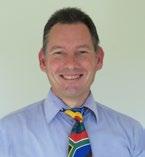
PROF RODNEY DUFFETT
duffetr@cput.ac.za
The main objectives of the BDR Hub are to:
• support the strategic goals of CPUT and FBMS, including focusing on 4IR
• increase awareness of the research projects of the Marketing Department
• explore and develop a pan-Africanist perspective regarding strategic brand and digital media management
• improve the amount of research output
• improve the quality of research output
• attract high-calibre postgraduate students and researchers
• attract high-calibre research projects
• attract internal and external research funding
• increase research and supervision capacity
• foster and leverage industry linkages
Since its inception, the BDR Hub has so far:
• published 41 peer-reviewed academic articles in accredited journals
• graduated 15 postgraduate students (four doctorates and ten master’s - two summa cum laude and three cum laude)
• presented 19 conference papers
• published papers in three conference proceedings
• published eight book chapters and one book (ten book chapters)
In line with the VC’s vision of ‘One Smart CPUT’, and to support the institutional focus on research output and supervision throughput, the Marketing Department consolidated its research efforts into a focus area called the Brand and Digital Research (BDR) Hub in October 2019. With the research emanating from the BDR Hub, the department endeavours to positively contribute to economic growth and 4th Industrial Revolution (4IR) challenges.
• produced one NRF-rated researcher – Prof Rodney Duffett received an NRF C2 rating this year
The BDR Hub’s total published research output units for the 2024 academic year amount to 4.66, with 3.16 produced by academic staff and 1.5 by postgraduate students. Additionally, a master’s student supervised by one of this research unit’s founding members graduated in April.
BDR Hub showcases cutting-edge research at its fourth symposium
The Brand and Digital Research (BDR) Hub held its 4th symposium at the Cape Town Hotel School, showcasing the latest research findings in brand and digital marketing. Over 60 delegates attended the successful event, including representatives from international and local universities, CPUT Marketing Department staff, industry partners, and other dignitaries.
The symposium featured outstanding presentations from guest speakers, including master’s students Mr Ayabonga Mxunyelwa and Ms Boitumelo Sephaka, Dr Harlan Cloete (Chairperson: KC 107.7), Prof Dr Holger J Schmidt (Koblenz University), Mr Sven Wolf (Founder of Black Wolf Agency), Ms Andiswa Mrasi (Manager of Strategic Initiatives), and Ms Sithembile Ntombela (CEO of Brand South Africa), who shared insights from her organisation’s latest research. A well-received panel discussion further enriched the event, fostering dialogue between academics, industry professionals, and students. The symposium also provided valuable networking opportunities, allowing postgraduate students to gain exposure to the industry and showcase their research to a broader audience.

The BDR Hub’s mission is “to advance brand and digital marketing knowledge and skills in higher education and business through technologyled education, research and innovation for the benefit of society”. The hub is currently engaged in 20 active research projects and has completed 26 projects related to brand management and digital interactive media. All research aligns with the SDG 8, which aims to “Promote sustained, inclusive and sustainable economic growth, full and productive employment and decent work for all.”
The BDR Hub’s Fourth Symposium was hosted at the Cape Town Hotel School, on CPUT’s Granger Bay Campus in December. The event aimed to showcase the research unit’s latest research findings and was attended by over 60 delegates, including representatives from international and local universities, staff from the Marketing Department, industry partners, and other dignitaries from CPUT.
The symposium featured engaging presentations from guest speakers as well as master’s students Mr Ayabonga Mxunyelwa and Ms Boitumelo Sephaka. Guest speakers included Dr Harlan Cloete (Chairperson, KC 107.7), Prof Dr Holger J Schmidt (Koblenz University), Mr Sven Wolf (Founder, Black Wolf Agency), Ms Andiswa Mrasi (Manager of Strategic Initiatives), and Ms Sithembile Ntombela (CEO, Brand South Africa).
The event also included a well-received panel discussion. The symposium offered valuable networking opportunities for academics and industry professionals, while providing postgraduate students with exposure to the industry and a platform to showcase their research.
The BDR Hub’s mission is “to advance brand and digital marketing knowledge and skills in higher education and business through technology-led education, research, and innovation for the benefit of society”. The research unit currently has 20 active research projects and has completed 27 to date, all related to brand management and digital interactive media. All research aligns with the UN’s SDG of fostering economic growth and international competitiveness.
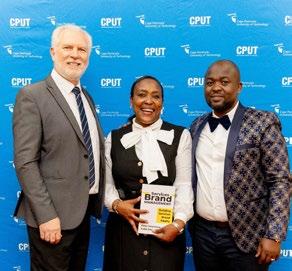
Dr Kuhle Zwakala, Ms Sithembile Ntombela, and Dr Pieter Steenkamp at the BDR Hub’s Fourth Symposium
Ms Sithembile Ntombela (CEO Brand South Africa) delivering her presentation
ACRONYMS
4IR 4th Industrial Revolution
AMHBI Applied Microbial & Health Biotechnology Institute (CPUT)
ATIH Africa Tourism Innovation Hub
ASIC Africa Space Innovation Centre (CPUT)
ATS Agrifood Technology Station (CPUT)
AU African Union
BDR Brand & Digital Research Hub (CPUT)
BIIC Centre for Business Innovation & Incubation (CPUT)
BioERG Bioresource Engineering Research Group (CPUT)
CDPES Centre for Distributed Power and Electronic Systems (CPUT)
CEO Chief Executive Officer
CETRA Centre for Tourism Research in Africa (CPUT)
CHEC Cape Higher Education Consortium (SA)
CHED Centre for Higher Education Development (Fundani, CPUT)
CHRC Cardiometabolic Health Research Centre (SAMRC/ CPUT/CHRC)
CIET Centre for Innovation in Educational Technology (CPUT)
CITE Centre for Initial Teacher Education (CPUT)
ConfCom Conference Committee (CPUT)
CPSR Centre for Power Systems Research (CPUT)
CPUT Cape Peninsula University of Technology (SA)
CRTDS Centre for Real-Time Distributed Systems (CPUT)
CSAEMS Centre for Substation Automation & Energy Management Systems (CPUT)
CSIR Council for Scientific and Industrial Research (SA)
CUT Central University of Technology (SA)
CWSR Centre for Water & Sanitation Research (CPUT)
DEECE Department of Electrical, Electronic & Computer Engineering (CPUT)
DFST Department of Food Science & Technology (CPUT)
DHET Department of Higher Education & Training (SA)
DSI Department of Science & Innovation (SA) (formerly DST)
DUT Durban University of Technology (SA)
DVC Deputy Vice-Chancellor
DVC: RTIP Deputy Vice-Chancellor: Research, Technology Innovation & Partnerships
ECP Extended curriculum programme
EMS Emergency medical services
EVB Entrepreneurship Venture Builder (South Africa)
EU European Union
FBMS Faculty of Business Management Sciences (CPUT)
FAS Faculty of Applied Sciences (CPUT)
FEBE Faculty of Engineering & the Built Environment (CPUT)
FFRU Functional Foods Research Unit (CPUT)
FHWS Faculty of Health & Wellness Sciences (CPUT)
FID Faculty of Informatics & Design (CPUT)
FPRC Flow Process & Rheology Centre (CPUT)
F’SATI French–South African Institute of Technology (SA and CPUT)
GBV Gender-based violence
HDC Higher Degrees Committee (CPUT)
HDIs Historically disadvantaged institutions
HE Higher Education
HEAIDS Higher Education and Training HIV/AIDS Programme
HEIs Higher education institutions
HELTASA Higher Education Learning & Teaching Association of South Africa
HERS-SA Higher Education Resource Services South Africa
HoD Head of Department
HSRC Human Sciences Research Council (SA)
IT Information Technology
ISSTAA Innovative Small Satellite Technology & Applications for Africa
JET Just Energy Transition
KUAS Koblenz University of Applied Sciences (Germany)
MDA Maritime domain awareness
MITS Medical Imaging and Therapeutic Sciences (CPUT)
MoA Memorandum of agreement
MOCAA Museum of Contemporary Art Africa (Cape Town)
MoU Memorandum of understanding
MUT Mangosuthu University of Technology (SA)
NDP National Development Plan (SA)
NGO non-governmental organisation
NMMU Nelson Mandela Metropolitan University (SA)
NPO Non-profit organisation
NQF National Qualification Framework (SA)
NRF National Research Foundation (SA)
NSTF National Science and Technology Forum (SA)
NUST Namibia University of Science and Technology
NWU North-West University (SA)
PERI Professional Education Research Institute (CPUT)
R4M Reading for Meaning (CPUT)
R&D Research & development
REC Research Ethics Committee (CPUT)
RIFTAL Research and Innovation Fund for Teaching and Learning (CPUT)
RITAL Research Innovation in Teaching and Learning Conference
RPL Recognition of Prior Learning
RTIP Research, Technology Innovation & Partnerships (CPUT)
RU Rhodes University (SA)
SA South Africa
SAASTA South African Agency for Science & Technology Advancement
SAMRC South African Medical Research Council
SANEDI South African National Energy Development Institute
SANSA South African National Space Agency
SARChI South African Research Chairs Initiative
SARETEC South African Renewable Energy Centre (CPUT)
SASUF South Africa–Sweden University Forum
SDGs Sustainable Development Goals (UN)
SL Service-Learning
SLCE Service-Learning and Civic Engagement (CPUT)
SRC Student Representative Council
STEM Science, technology, engineering and mathematics
SU Stellenbosch University (SA)
THENSA Technological Higher Education Network of South Africa
THRIP Technology and Human Resources for Industry Programme
TIA Technology Innovation Agency (SA)
TTO Technology Transfer Office (CPUT)
TUT Tshwane University of Technology (SA)
TSCT Technology Station: Clothing & Textiles (CPUT)
TVET Technical and Vocational Education and Training
UCDG University Capacity Development Grant (CPUT)
UCT University of Cape Town (SA)
UFS University of the Free State (SA)
UJ University of Johannesburg (SA)
UKZN University of KwaZulu Natal (SA)
UL University of Limpopo
UP University of Pretoria
UPEC University of Paris East Créteil
UN United Nations
Univen University of Venda
Unisa University of South Africa (SA)
UoT University of technology
UP University of Pretoria (SA)
URF University Research Fund (CPUT)
USAf Universities South Africa
UWC University of the Western Cape (SA)
VC Vice-Chancellor
WIL Work-integrated learning
WITS University of the Witwatersrand (SA)
WRLC Wholesale & Retail Leadership Chair (SA)
WSU Walter Sisulu University (SA)
DEPUTY VICE-CHANCELLOR: RESEARCH, TECHNOLOGY INNOVATION
& PARTNERSHIPS


Prof Marshall Sheldon
Tel: 021 959 6242
Email: sheldonm@cput.ac.za
Room 228, Administration Building, Bellville
DIRECTORATE RESEARCH DEVELOPMENT
DIRECTOR

Prof Dina Burger Director: Research
Ms Liziwe Poni
Secretary to the DVC
Tel: 021 959 6242
Fax: 021 959 6002
Email: ponil@cput.ac.za
Room 228, Administration Building, Bellville

Ms Edwina Pedro Secretary to the Director
Tel Email Address 021 460 3878 burgerd@cput.ac.za
Room 2.8, Administration Building, District Six Campus
Tel Email Address 021 460 3878 pedroe@cput.ac.za
Room 2.8, Administration Building, District Six Campus
MANAGERS



Dr Hester M Burger Manager: Research Integrity
Tel Email Address 082 873 1484
burgerh@cput.ac.za
Room 2.8, Administration Building, District Six Campus
Ms Pumza Makaula Manager: Research Grants
Tel Email Address 021 460 3895 makaulap@cput.ac.za
Room 2.8, Administration Building, District Six Campus
Dr Clement Matasane Manager: Research
Tel Email Address 021 460 3383 matasanec@cput.ac.za
Room 2.8, Administration Building, District Six Campus
COORDINATORS



Ms Luyolo Oyo Coordinator: Research Information Management System (RIMS)
Ms Nikeziwe Ngcani Coordinator: Finance
Ms Lara Lee Smith Coordinator: Research Writing, Information & Publications
Tel Email Address 021 460 3843 kamatil@cput.ac.za Room 2.8, Administration Building, District Six Campus
Tel Email Address 021 460 3539 ngcanin@cput.ac.za Room 2.8, Administration Building, District Six Campus
Tel Email Address 021 460 3328 smithll@cput.ac.za Room 2.8, Administration Building, District Six Campus
TEAM

Ms Elizabeth Gemba Research Assistant Administrator Email Address gembae@cput.ac.za Room 2.8, Administration Building, District Six Campus
Mr Chris Majola Research Finance Administrator (from September 2024)

Ms Sisipho Mbombela DSI-HSRC Intern (from August 2024)
Tel Email Address 021 460 3539 majolamh@cput.ac.za Room 2.8, Administration Building, District 6 Campus
Tel Email Address 021 460 3833 mbombelas@cput.ac.za Room 2.8, Administration Building, District 6 Campus



Ms Shafeeqa Hendricks-Dramat Research Finance Administrator (until August 2023) Research Grants Officer (from September 2023)
Mr Marvin La Meyer Research Finance Administrator
Tel Email Address 021 460 4241 dramats@cput.ac.za Room 2.8, Administration Building, District Six Campus

Ms Sinothando Ndiko DSI-HSRC Intern (from August 2024)
Ms Phathiswa Swaartbooi Research Finance Administrator
Tel Email Address 021 460 3798 lameyerm@cput.ac.za Room 2.8, Administration Building, District Six Campus
Tel Email Address 021 460 3796/021 959 4489 swartbooip@cput.ac.za
CPGS offices, New Library Building, Bellville Campus

Ms Nosipho Tata DSI-HSRC Intern (from August 2024)
Tel Email Address 021 460 3383 ndikosi@cput.ac.za Room 2.8, Administration Building, District 6 Campus
Tel Email Address 021 460 3833 tatan@cput.ac.za Room 2.8, Administration Building, District 6 Campus
Ms Simnikiwe Tamana Project Administrator Assistant

Tel Email Address 021 959 4338 tamanas@cput.ac.za Room 2.8, Administration Building, District Six Campus
Ms Zuzeka Tshayina Research Assistant Administrator Email Address tshayinaz@cput.ac.za Room 2.8, Administration Building, District Six Campus
CENTRE FOR POSTGRADUATE STUDIES
DIRECTOR

Prof Izak van Zyl
Director
COORDINATORS


Dr Thandazile Mhlongo CPGS Coordinator
Tel Email Address 021 953 8455 vanzyliz@cput.ac.za
Centre for Postgraduate Studies
New Library Building, Bellville Campus
Mr Selema Molopa Coordinator: Postgraduate Student Support
Tel Email Address 021 mhlongot@cput.ac.za
Centre for Postgraduate Studies
New Library Building, Bellville Campus
Tel Email Address 021 460 3258 molopas@cput.ac.za
Centre for Postgraduate Studies
New Library Building, Bellville Campus
TEAM

Mr Cyrano Arries Financial Administrator
Tel Email Address 021 9596594 arriesc@cput.ac.za
Centre for Postgraduate Studies
New Library Building, Bellville Campus
Mr Michyle Magerman Administrator (until May 2025)
Tel Email Address 021 mbungez@cput.ac.za
Centre for Postgraduate Studies
New Library Building, Bellville Campus


Ms Phaphama Mhlekwa Evaluation & Monitoring Officer
Ms Mtembukazi Sibindlana Bursary Administrator
Tel Email Address 021 953 8462 mhlekwap@cput.ac.za
Centre for Postgraduate Studies
New Library Building, Bellville Campus
Tel Email Address 021 953 8600 sibindlanam@cput.ac.za
Centre for Postgraduate Studies
New Library Building, Bellville Campus
TECHNOLOGY TRANSFER OFFICE
DIRECTOR

Dr Revel Iyer
Director: Technology Transfer Office
MANAGER

Mr Marlin Fransman
Tech Transfer Manager: Legal
Tel Email Address 021 959 6431
iyerr@cput.ac.za
Technology Transfer Office
Bellville Campus
Tel Email Address 021 959 5605
fransmanm@cput.ac.za
Technology Transfer Office
Bellville Campus
TEAM



Ms Jayde Barends
Senior Tech Transfer Officer: Marketing
Tel Email Address 021 959 5871
barendsj@cput.ac.za
Technology Transfer Office
Bellville Campus
Aviwe Gwayi
Tech Transfer Officer: Business Development
Ms Halimah Rabiu
Tech Transfer Officer: Funding
Tel Email Address 021 959 5871
faraoal@cput.ac.za
Technology Transfer Office
Bellville Campus
Tel Email Address 021 959 6879
rabiuh@cput.ac.za
Technology Transfer Office
Bellville Campus
STRATEGIC INITIATIVES & PARTNERSHIPS (SIP)
DIRECTOR

Dr Tasmeera Singh Director: SIP (from August 2025) Manager: International Relations (until July 2025)

Prof Dina Burger Director: SIP (Acting) (until July 2024)
Email Address singht@cput.ac.za Room 0004, Administration Building, Bellville Campus

Ms Xolelwa Bashala Administrator: SIP
MANAGERS

Dr Elma Nelisiwe Maleka Manager: Research Uptake
Tel Email Address 021 460 3878 burgerd@cput.ac.za Room 2.8, Administration Building, District 6 Campus


Email Address malekae@cput.ac.za Room 0004, Administration Building, Bellville Campus

Mr Dingaan Booi Officer: International Relations
Tel Email Address 021 959 4502
bashalax@cput.ac.za Room 0004, Administration Building, Bellville Campus
Tel Email Address 021 959 6048 booidi@cput.ac.za Room 0004, Administration Building, Bellville Campus
Ms Mercia Bosman Administrative Assistant: International Relations
Ms Hlengiwe Nzama Administrative Assistant: Research Uptake
Tel Email Address 021 959 6595 bosmanm@cput.ac.za Room 0004, Administration Building, Bellville Campus
Tel Email Address 021 959 6407 nzamah@cput.ac.za Room 0004, Administration Building, Bellville Campus

EDITOR
Ms Lara Lee Smith
Directorate Research Development smithll@cput.ac.za

DESIGN CONCEPT & LAYOUT
Bridgette Hunt bahunt@wol.co.za

PROOF-READING
Prof Karien Jooste
JoosteKa@cput.ac.za
TEAM
ACKNOWLEDGEMENTS
The 2024 Research Report is published by the CPUT Directorate Research Development.
The editor acknowledges with thanks the contributions of:
• Colleagues from the Directorate Research Development for a variety of input
• Mr Aphiwe Boyce, Mr Craig Christians, Mr Kwanele Butana, Ms Ilse Fredericks and Ms Lauren Kansley (Communication Department) for news items and photographs retrieved from the CPUT News Archive
• Dr André Steenkamp (Faculty of Education) for the Afrikaans translation of the VC’s foreword
• Dr Xolani Mavela (Sol Plaatje University) for the isiXhosa translation of the VC’s foreword
• CPUT researchers, faculties, support units and research institutes for various contributions and assistance with fact-checking
• Last, but certainly not least, Ms Bridgette Hunt for design concept and layout and Prof Karien Jooste for proof-reading
